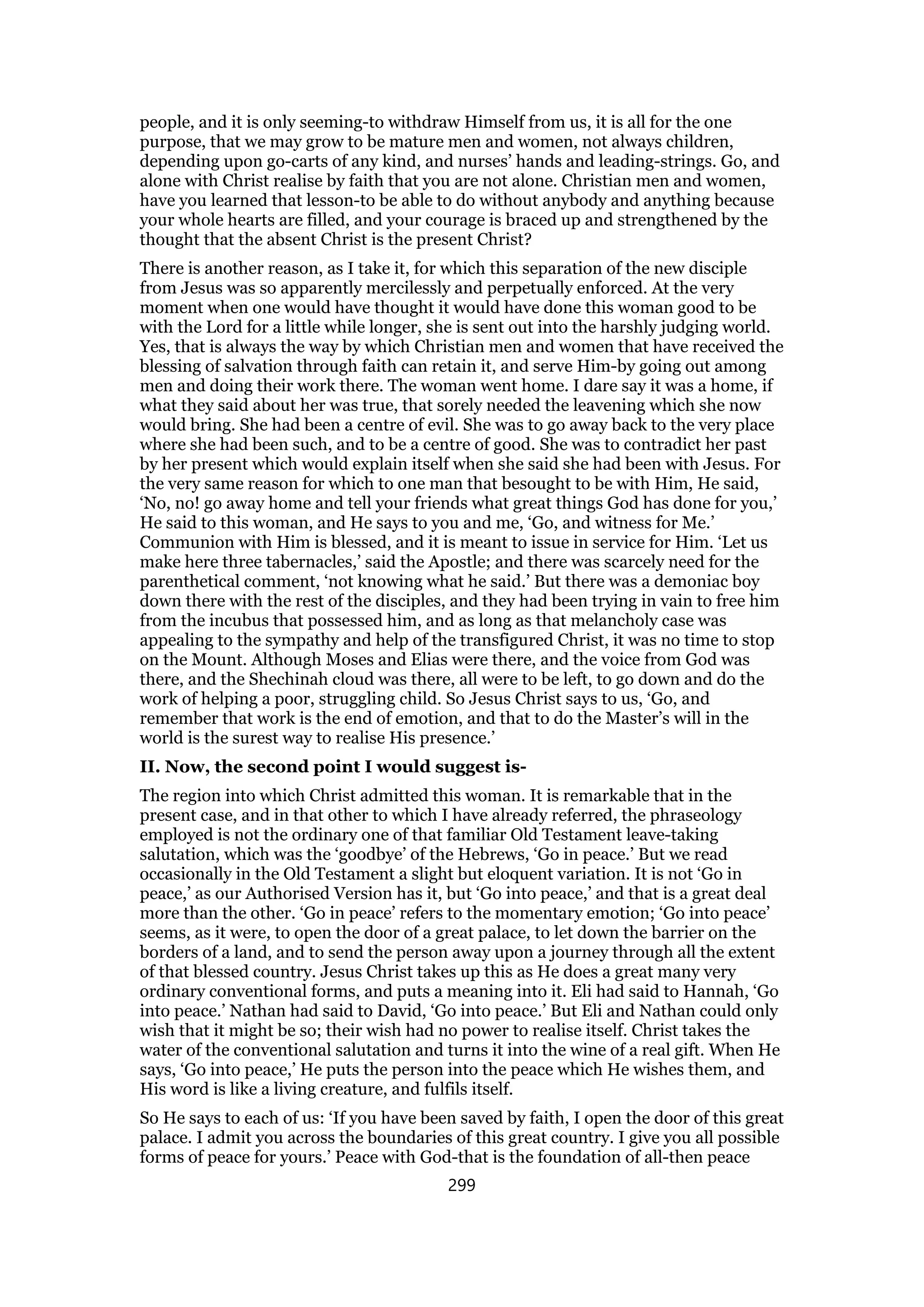The document discusses the healing of a centurion's servant by Jesus in Capernaum, highlighting the centurion's faith, humility, and unique relationship with the Jewish people, which was uncommon for a Roman officer. The narrative emphasizes that Jesus was impressed by the centurion's understanding of authority and faith, stating He had not found such great faith even in Israel. The commentary also reflects on the overall theme of love and compassion that Jesus demonstrated throughout His ministry.




![along with the ethic derived from it, namely, that it is in the love of God and the
love of man that a soul may hope to commend itself to the Lord. First, there is
the centurion who loved his servant (Luke 7:1-10); then, Jesus showed his love
for the bereaved by raising the son of the widow of Nain (Luke 7:11-17); next,
Jesus offered his love of the afflicted and the poor as proof of his Messiahship to
John the Baptist, laying stress on the publicans and harlots who accepted John's
message (Luke 7:24-25); and then, he gave the explanation of how publicans and
harlots were saved and the Pharisees were not, this explanation growing out of a
dinner in the house of a Pharisee (Luke 7:36-50).
THE HEALING OF THE CENTURION'S SERVANT
In my Commentary on Matthew this miracle was referred to as being identical
with the one in Matthew 8:5-13, this view being that of Lamar, Boles, McGarvey,
and many others; and it is reaffirmed here that it may be so interpreted, all of
the variations in the two accounts yielding easily to harmonizing suggested by
many commentators. It should be noted, however, that it is by no means
CERTAIN that Matthew and Luke have recorded the same incident.
More mature study has convinced this writer that the two episodes COULD be
different miracles, and that the higher probability is that they WERE separate
wonders. The Greek words translated "my servant" (Matthew 8:6) are from
terms which are literally "the boy of me,"[1] an expression which MacKnight
affirms would have been translated "my son" except "for the supposition that
the miracles are the same."[2] About the only objection to viewing the miracles
as separate wonders springs from the alleged unlikelihood that there would have
been two centurions, one with a sick son, another with a sick slave, who would
have approached Jesus with approximately the same words, manifesting exactly
the same attitude.
MacKnight, however, suggested that:
There might have been two centurions. Both made the same speech to Jesus, one
through his friends, and the other in person; but this circumstance may be
accounted for. As the faith of the first centurion, who was a heathen, took its rise
from the extraordinary cure wrought on the nobleman's son (John 4:46-54), the
faith of the second centurion might have taken its rise from the success of the
first, which could not fail to be well known both in the town and in the
country.[3]
MacKnight elaborated the above argument in his harmony of the Gospels in
such a manner as to foreclose any logical objections to it. He concluded thus:
To conclude that two centurions should have had, the one his son, the other his
slave, cured in Capernaum with like circumstances, is no more improbable than
that the temple should have been twice purged, the multitude twice fed, and the
fishes twice caught by miracle, and with the same circumstances.[4]
This consideration has been introduced here, not because of any bearing the
question has with reference to interpreting the miracles themselves, but because
of the implications bearing on the two great sermons, the one on the mount, the
5](https://image.slidesharecdn.com/luke7commentary-151222193000/75/Luke-7-commentary-5-2048.jpg)
![other on the plain. The big argument for making those sermons the same
depends upon making these two miracles the same; but it is clear enough that the
uncertainty of their being indeed but one wonder totally removes the principal
argument for viewing Luke's record of the Sermon on the Plain as merely an
abbreviated account of the Sermon on the Mount in Matthew. Significantly,
some of the commentators who treat these two miracles as one refuse to view the
sermons as one (Boles, for example). It appears that it is more logical to view the
miracles also as separate wonders.
[1] The Nestle Greek Text (Grand Rapids, Michigan: Zondervan Publishing
House, 1958), en loco.
[2] James MacKnight, Harmony of the Gospels (Grand Rapids, Michigan: Baker
Book House, 1950), p. 468.
[3] Ibid.
[4] Ibid., p. 469.
After he had ended all his sayings in the ears of the people, he entered into
Capernaum. (Luke 7:1)
The first clause here, according to Boles,
Shows that the discourse which had just been narrated was delivered at one
time, and was not a mere collection of sayings or detached parts of different
discourses.[5]
A great deal of Jesus' teaching was done in Capernaum, which was his residence
for a long while; and the event of our Lord's finishing a discourse at some place
near the city and then returning to the place where he stayed must have recurred
often. Nothing is plainer in the sacred Gospels than the fact that the sum total
recorded by all of them put together was merely the tip of the iceberg, compared
to all that Jesus said and did. The last word that has come down to us across the
long centuries since Jesus walked on the earth is that "the world itself could not
contain the books that should be written" (John 21:25), if men had recorded all
that Jesus did and taught! This monumental truth destroys the conceit which
would explain similar teachings or miracles of Jesus as inaccurate, garbled
accounts of but one event or sermon.
ENDNOTE:
[5] H. Leo Boles, A Commentary on the Gospel according to Luke (Nashville:
The Gospel Advocate Company, 1972), p. 145.
BURKITT, "In our Saviour's miraculous cure of the centurion's servant, we
have several particulars very observable:
1. The person applying himself to our blessed Saviour for help and healing: he
was a Gentile, an Heathen, a Roman soldier, an officer and commander; yet he
6](https://image.slidesharecdn.com/luke7commentary-151222193000/75/Luke-7-commentary-6-2048.jpg)

![poverty! He that came in the form of a servant goes down to visit a sick servant
upon his poor pallet bed, who did not come near the rich couch of the ruler's son.
Observe, 6. The notice and observation which our Saviour takes of the
centurion's faith: he wondered at it from him. Admiration agreed not to Christ
as God, but as man it did. Christ wrought faith as God, and wondered at it as
man. What can be more wonderful than to see Christ wonder? We find not our
Saviour wondering at worldy pomp and greatness: when the disciples wondered
at the magnificence and stately buildings of the temple, Christ rather rebuked
them than wondered with them; but when he sees the gracious act and exercise
of fatih, he is ravished with wonder.
Let it teach us to place our admiration where Christ fixes his; let us be more
affected with the least measure of grace in a good man, than with all the gaities
and glories of a great man; let us not envy the one, but admire and imitate the
other.
Observe, lastly, Christ does not only admire the centurion's faith, but publishes
it: Verily I have not found so great faith, no, not in Israel; that is, amongst the
generality of the Jewish nation.
For, as to particular persons, several had showed a greater faith that this, as
Joseph and Mary. This expression lets us know, that where the means of faith
are but small, the nobler act and exercise of faith are wonderful and soul
amazing.
CONSTABLE, "1. The healing of a centurion's servant 7:1-10 (cf. Matthew
8:5-13)
This incident shows Jesus extending grace to a Gentile through Jewish
intermediaries. It would have helped Luke's original Gentile readers appreciate
that Jesus' mission included them as well as the Jews. It is another case in which
Jesus commended the faith of someone (cf. Luke 1:45; Luke 5:20). Luke
continued to stress Jesus' authority and the power of His word (cf. Luke 4:32;
Luke 4:36). The similarities between this incident and the conversion of
Cornelius are striking (cf. Acts 10).
"His story is thus an example of the fact that God is willing to accept all men
alike and that everyone who fears him and performs righteousness is acceptable
to Him (Acts 10:34 f.)." [Note: Marshall, The Gospel . . ., p. 277.]
The good relations between the Jews and this Gentile also show their
compatibility, an important lesson for early Christians since there were Jewish
Gentile tensions within the early church. Jesus also noted the unbelief that
characterized the Jews generally, another important factor that the early church
had to deal with. In his account of this healing, Matthew, writing to Jews,
stressed the inclusion of Gentiles in God's plan, but Luke, writing to Gentiles,
emphasized the importance of Gentiles loving Jews. [Note: Edersheim, 1:544.]
BI 1-10, "And a certain centurion’s servant, who was dear unto him, was sick, and
8](https://image.slidesharecdn.com/luke7commentary-151222193000/75/Luke-7-commentary-8-2048.jpg)





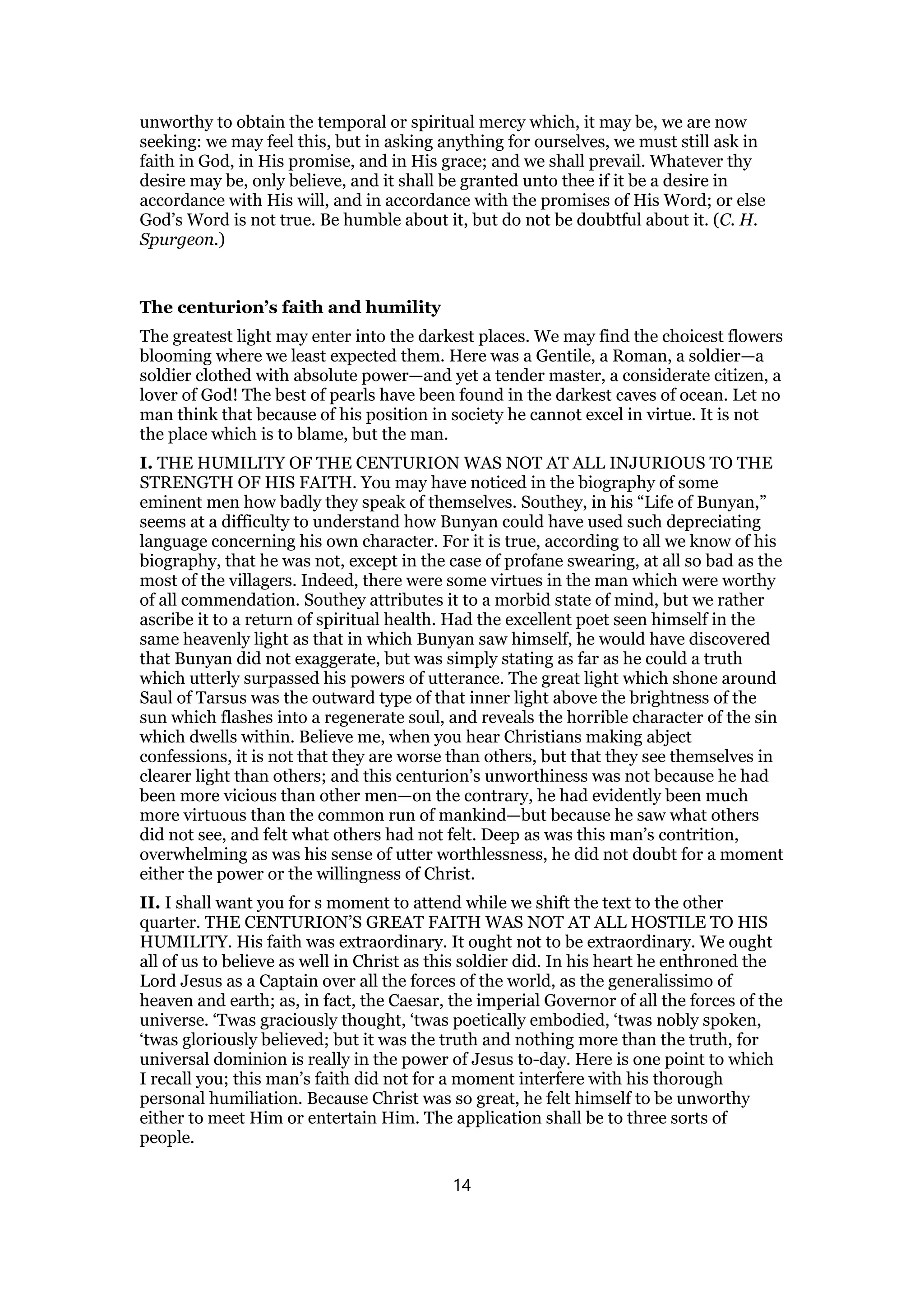
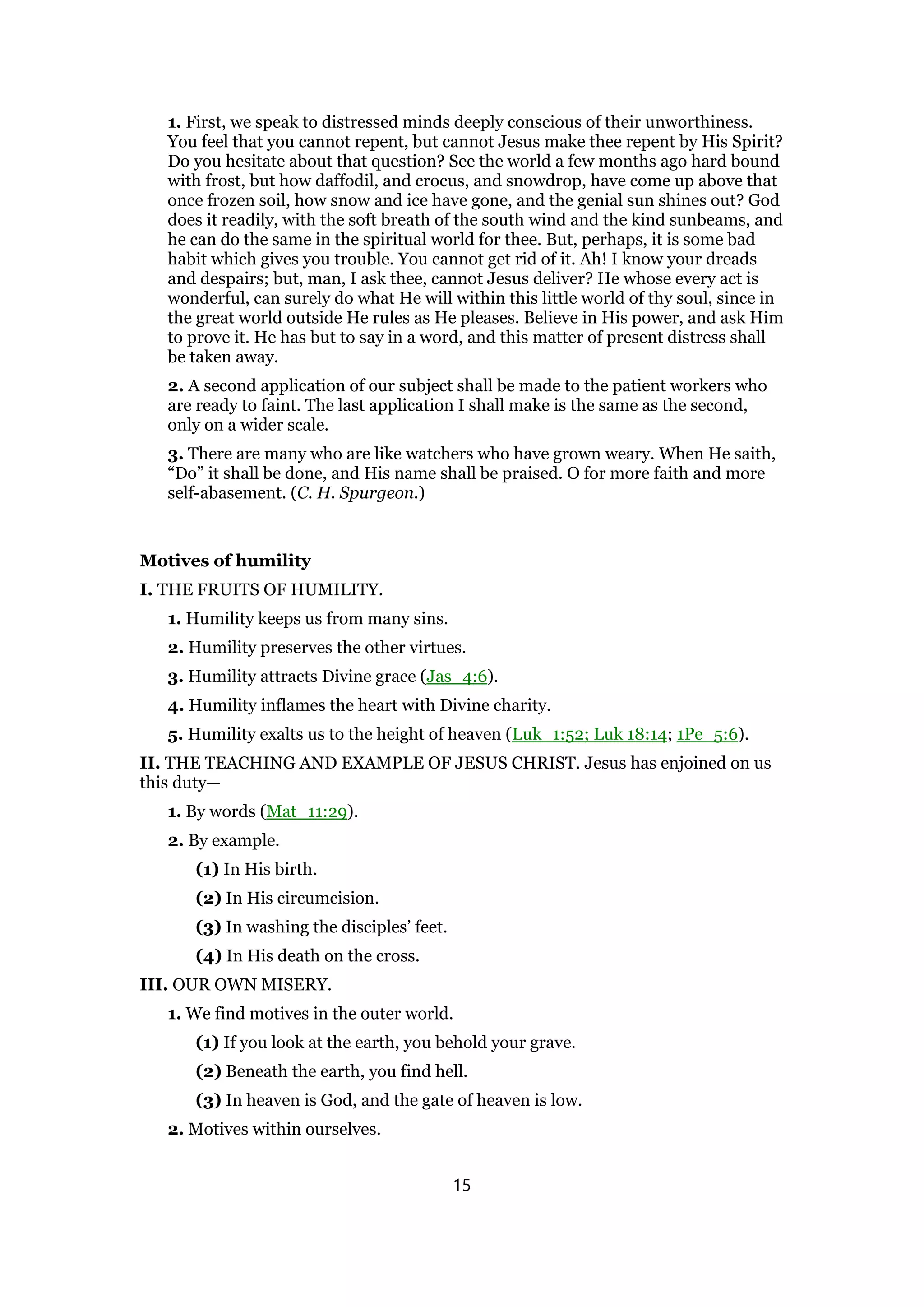

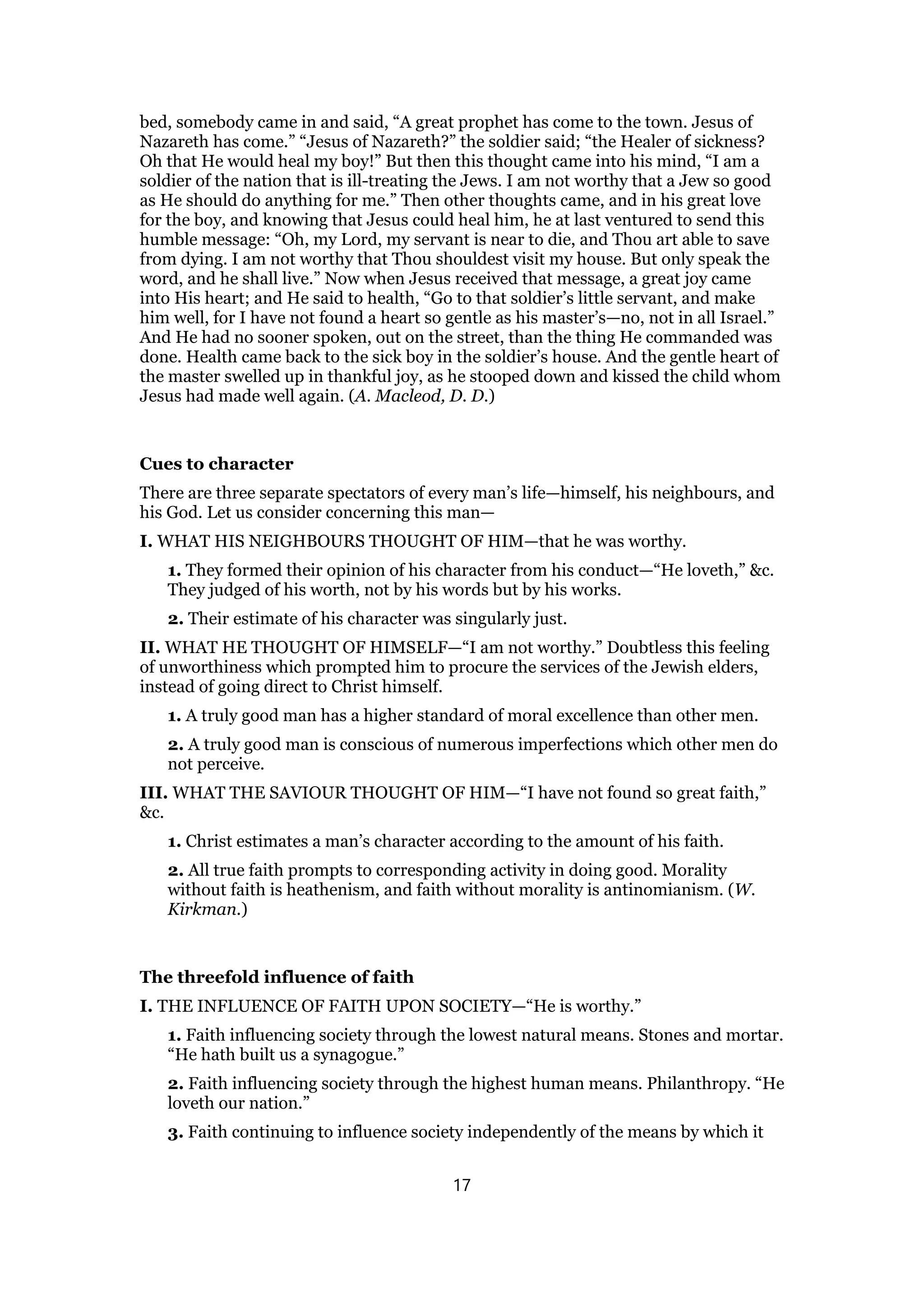



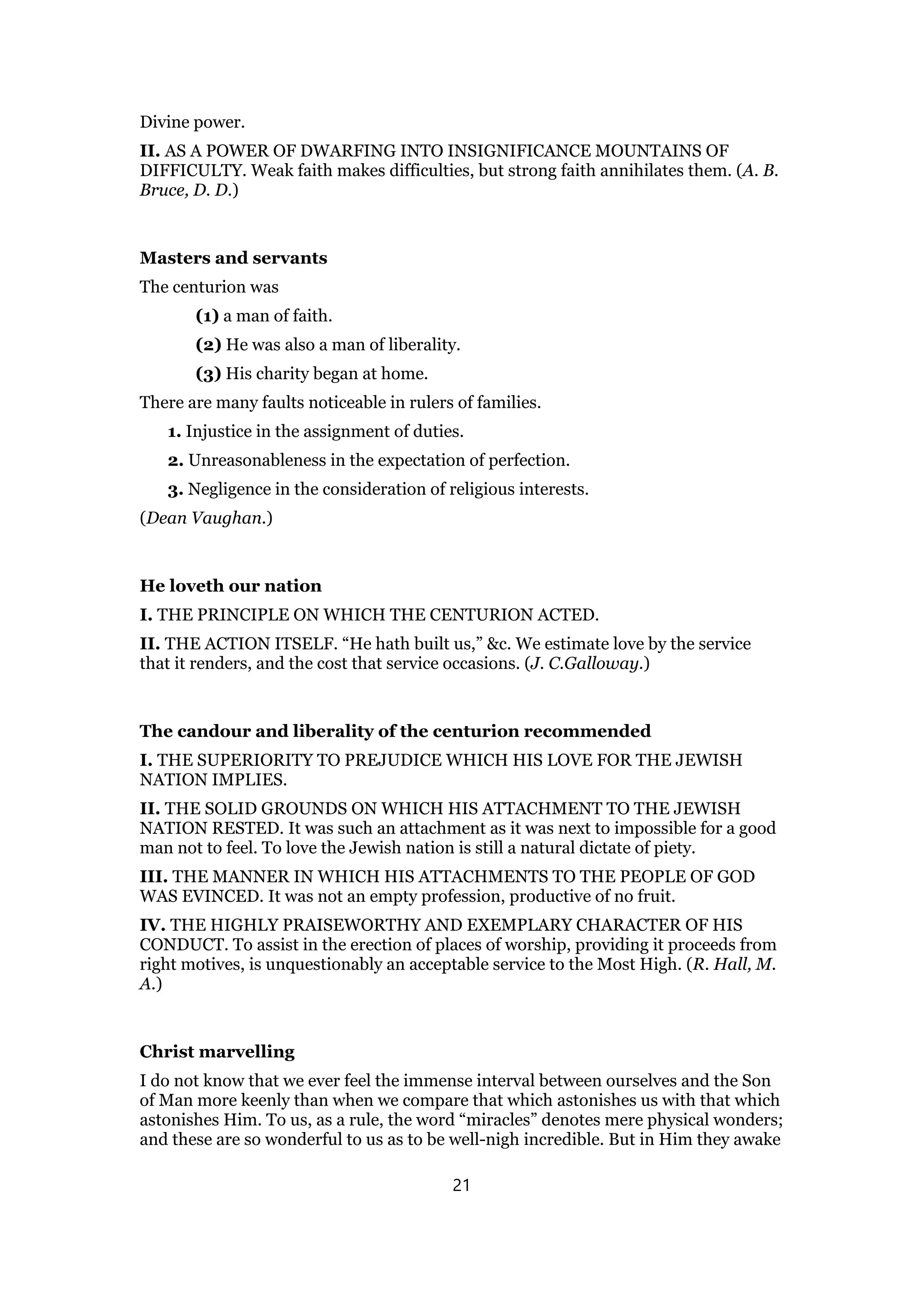





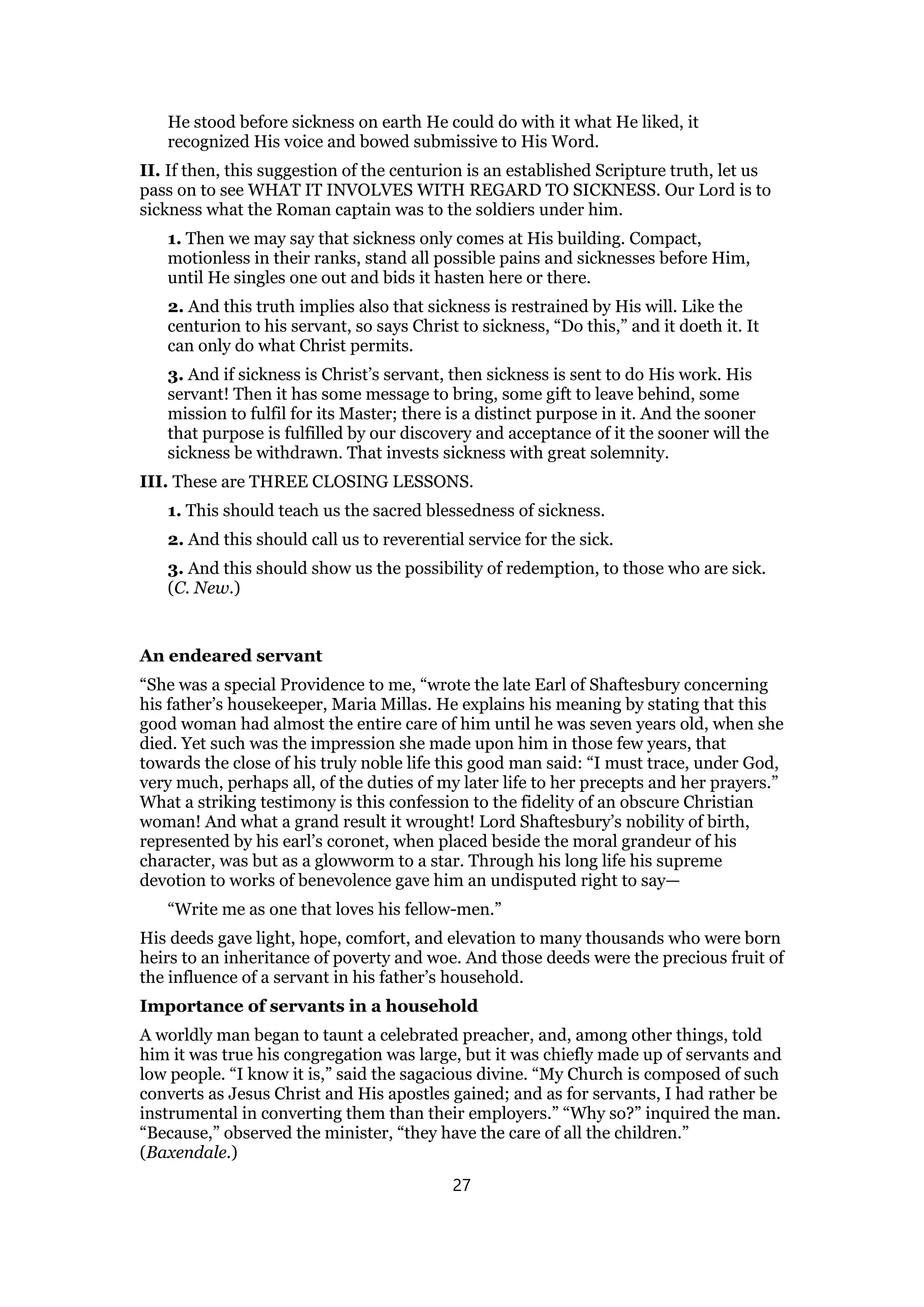
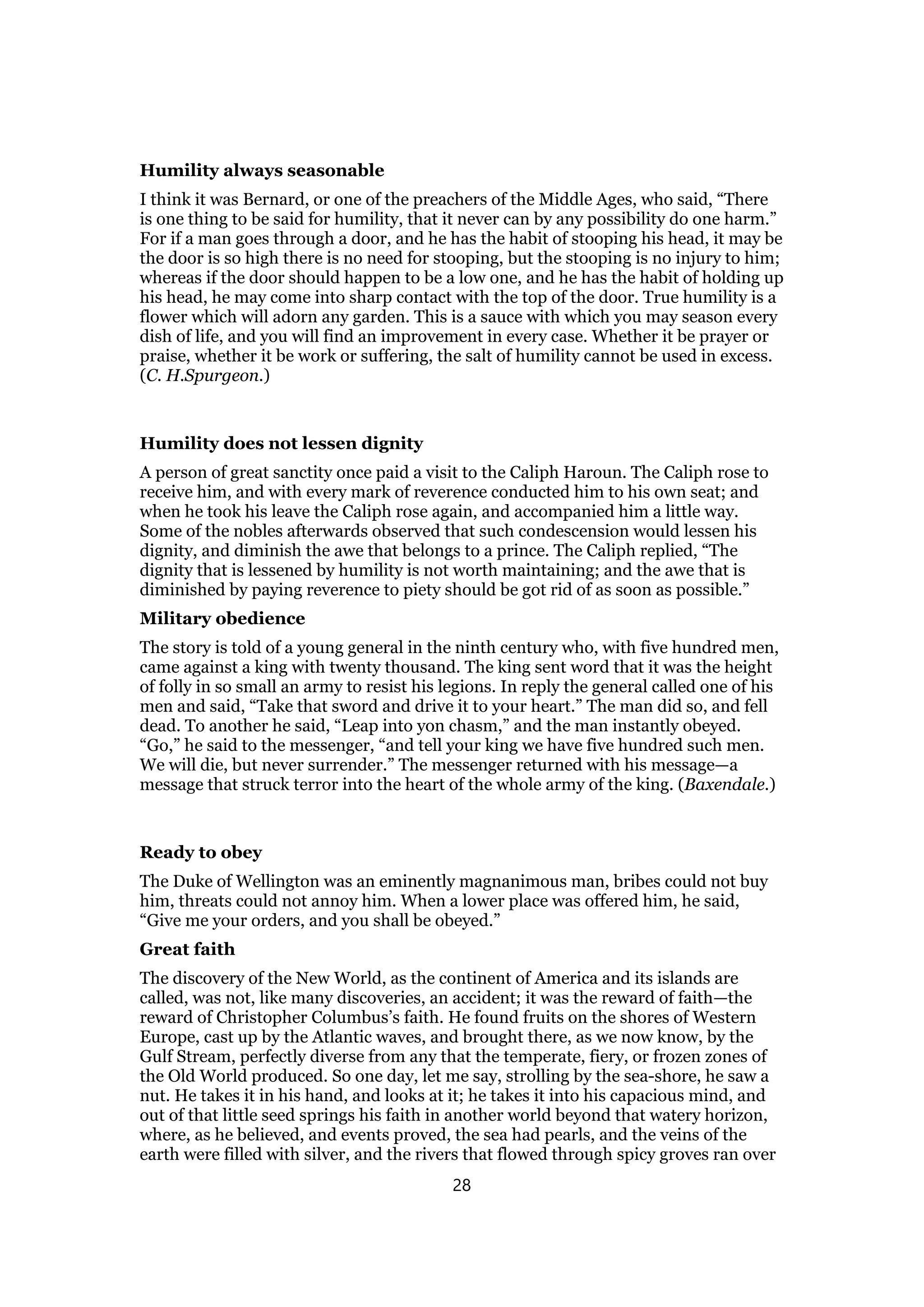
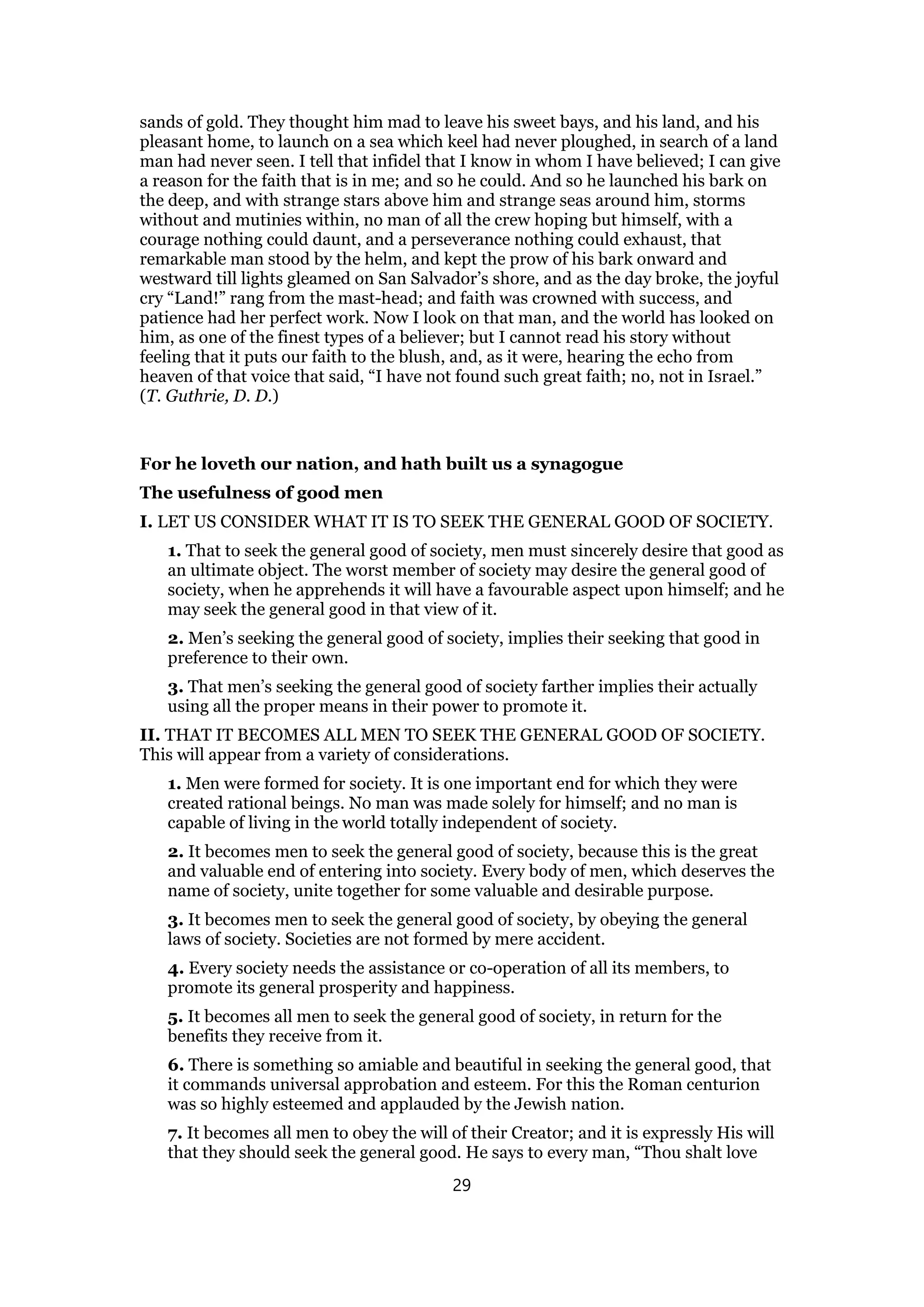


![who was dear unto him; to the centurion, being an honest, upright, faithful, and
obliging servant; as Tabi was to Rabban Gamaliel, of whom his master said (l),
"Tabi my servant, is not as other servants, היה ,כשר "he is upright".''
was sick: of a palsy; see Mat_8:6,
and ready to die; in all appearance his case was desperate, and there was no help
for him by any human means, which makes the following cure, the more remarkable.
HENRY, "I. The centurion's servant that was sick was dear to his master, Luk_
7:2. It was the praise of the servant that by his diligence and faithfulness, and a
manifest concern for his master and his interest, as for himself and for his own, he
recommended himself to his master's esteem and love. Servants should study to
endear themselves to their masters. It was likewise the praise of the master that,
when he had a good servant, he knew how to value him. Many masters, that are
haughty and imperious, think it favour enough to the best servants they have not to
rate them, and beat them, and be cruel to them, whereas they ought to be kind to
them, and tender of them, and solicitous for their welfare and comfort.
COFFMAN, "Centurion ... Even counting the two centurions of these miracles
(the one here, and the other in Matthew) as but one man, there are no less than
eight centurions mentioned in the New Testament; and it is significant that all of
them appear in a favorable light. As Ryle expressed it, "It is worthy of remark
that in no case is there the slightest hint that the profession of a soldier is
unlawful in the sight of God."[6] The list of centurions listed in the New
Testament is:
1. The one whose servant was healed (in this passage).
2. The one who confessed Christ at the cross (Matthew 27:54).
3. The ones who rescued Paul from the mob (Acts 21:32).
4. The one who bore Paul's message to the chiliarch (Acts 22:25).
5. Cornelius, the first Gentile convert (Acts 10:1)
6. Julius, who saved Paul's life on the voyage to Rome (Acts 27:3,43)
7. The centurion who brought Paul's nephew to the chiliarch (Acts 23:17,18).
8. The centurions who escorted Paul to Caesarea (Acts 23:23).SIZE>
Servant ... The word here is "bondservant" or slave; and it is evident that Luke
recorded this for the purpose of showing the centurion's love for such a person.
"He did not despise slaves as other Gentiles commonly did."[7] The character of
this noble soldier was evident, not merely in the love lavished upon a slave, but in
his love for Israel, (Luke 7:5), and in his support of the worship of God (Luke
7:5). Some sought the aid of Jesus for a son, or daughter, or for themselves; but
32](https://image.slidesharecdn.com/luke7commentary-151222193000/75/Luke-7-commentary-32-2048.jpg)
![this man came to Jesus on behalf of a slave.
[6] J. C. Ryle, Expository Thoughts on the Gospels, Luke (Grand Rapids,
Michigan: Zondervan Publishing House), p. 205.
[7] Ibid., p. 200.
COKE, "Luke 7:2. A certain centurion's servant,— In the notes on St. Matthew,
we have spoken largely concerning this miracle, and have given, on Luke 7:13 of
the eighth chapter, the arguments of there who think that the historians relate
different transactions; at the same time harmonizing the accounts, and
endeavouring to shew, according to our own private opinion, that they are one
and the same. See on Matthew 8:5. In confirmation of this opinion, the following
passage from Dr. Heylin is subjoined, nearly in his own words: "The narrative
which St. Luke gives of the centurion's behaviour is larger and more distinct
than that given in St. Matthew; and therefore we will put them both together,
only premising, that as it is not unusual in all languages, so in the Hebrew
particularly it is very usual, to ascribe to the person himself what has been
spoken or done by his order. (See Matthew 11:2-3.) And accordingly, St.
Matthew relates as said by the centurion himself, what was really spoken by
those whom he had deputed to address our Lord on his behalf; which
sufficientlyaccounts for the seeming difference which is found in the evangelists.
The centurion was brought up under the heathen dispensation, but had attained
to the knowledge of the one God; and, finding that fundamental truth so well
established in the Jewish religion, had conceived a great affection to the Jewish
nation, and done them all the good offices which lay in his power. His
improvement also of the light given him under his inferior dispensation, had
prepared him for the reception of the Gospel; and his knowledge of God in a
general way, led him, through grace, by a just transition, to the acknowledgment
of Christ as the God of nature; for whom therefore he had so aweful a
veneration, that when he was to apply to him for the cure of his servant, he had
recourse to the intercession of the elders of the Jewish church, who, at his
request, came to Jesus, to entreat him that he would come and cure the sick
servant, in consideration of his master who had sent them, and to whom they
acknowledged great obligations. (Luke 7:4.) Jesus went along with them, as they
desired; but while he was yet on the way, and not far from the house, the
centurion, who had refrained from addressing Jesus in person, out of a humble
sense of his own unworthiness, (and perhaps too from having observed how the
more religious among the Jews made a scruple of conversing with the heathen,
such as himself still was, to outward appearance;) when he heard that Christ was
actually coming to his house, reflected with himself, upon more enlarged views of
faith, that the intended visit was a needless condescension in our Lord, and
therefore sent some of his friends to prevent it by the following message in his
name, Luke 7:6, &c. 'Lord, do not give thyself farther trouble, for I am not a fit
person that thou shouldst come under my roof; and that indeed was the reason
why I judged myself unworthy to come to thee myself. Do thou but speak the
word only, and my servant will be cured. For although I am under the authority
of others, yet, as I have soldiers under me, I say to one, Go, and he goeth; to
another, Come, and he cometh; and to my servant, Do this, and he doeth it.' As if
33](https://image.slidesharecdn.com/luke7commentary-151222193000/75/Luke-7-commentary-33-2048.jpg)


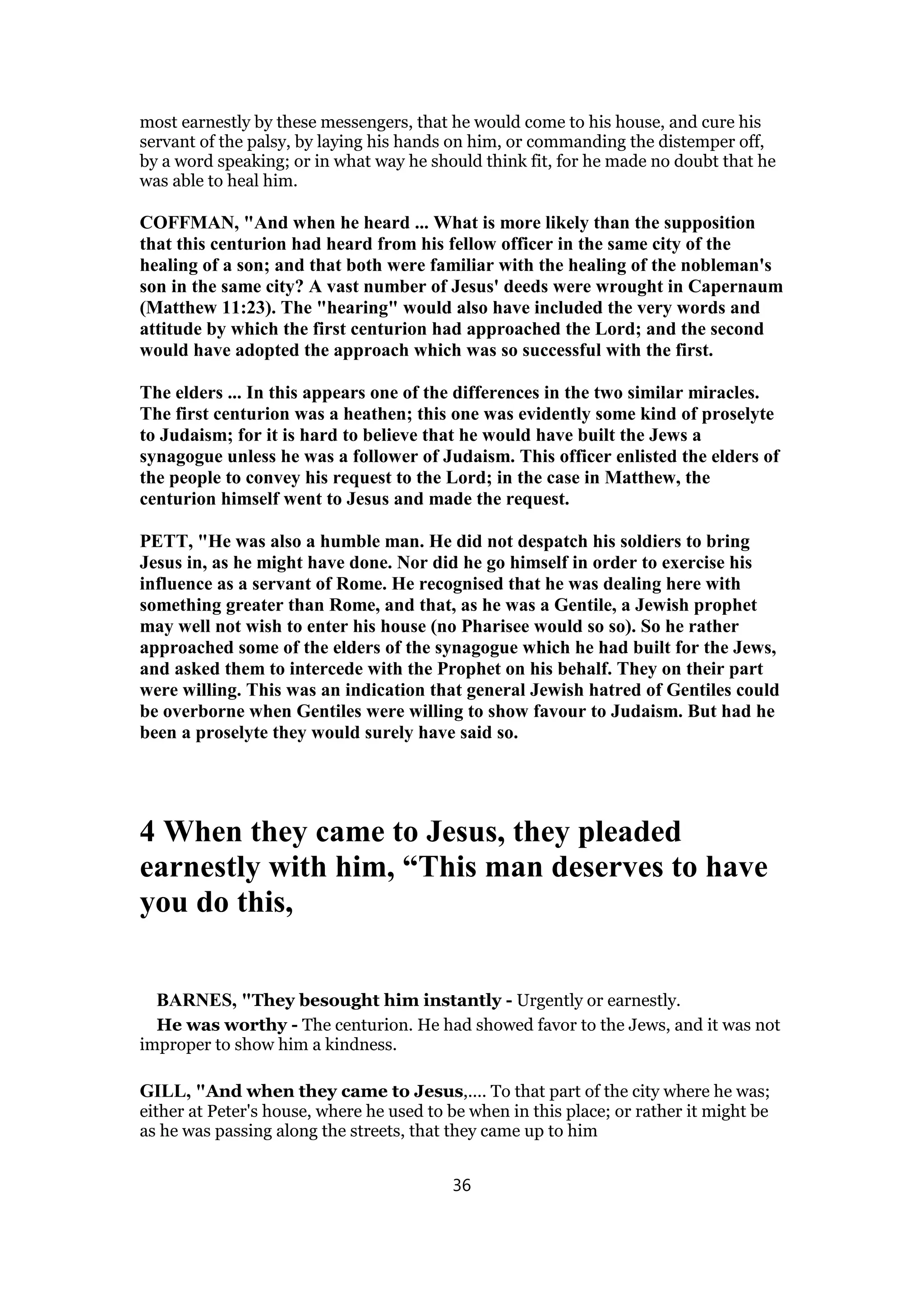
![they besought him instantly; or with great vehemence and importunity; very
studiously and carefully they urged the case, and pressed him much to it:
saying, he was worthy for whom he should do this; or, "for whom thou
shouldst do this", as the Vulgate Latin, Syriac, Persic, and Ethiopic versions read, and
some copies; and which reading connects the words best. This speech of theirs
savours of their "pharisaic" tenet and notion of merit, and is very different from the
sense the poor centurion had of himself.
HENRY, “IV. The elders of the Jews were hearty intercessors for the centurion:
They besought him instantly (Luk_7:4), were very urgent with him, pleading for the
centurion that which he would never have pleaded for himself, that he was worthy
for whom he should do this. If any Gentile was qualified to receive such a favour,
surely he was. The centurion said, I am not so much as worthy of a visit (Mat_8:8),
but the elders of the Jews thought him worthy of the cure; thus honour shall uphold
the humble in spirit. Let another man praise thee, and not thy own mouth. But that
which they insisted upon in particular was, that, though he was a Gentile, yet he was
a hearty well-wisher to the Jewish nation and religion, Luk_7:5
JAMISON, "he was worthy — a testimony most precious, coming from those
who probably were strangers to the principle from which he acted (Ecc_7:1).
COFFMAN, "Clearly, the centurion had remained at home (Luke 7:6), and the
Jewish elders actually bore the request to Jesus.
Our synagogue ... McGarvey wrote that:
The ruins of Capernaum show the ruins of a synagogue. It was a beautiful
structure, built of white limestone, shows by its architecture that it was built in
the time of the Herods, and there is little doubt that it is the one which this pious
Gentile erected, and in which Jesus taught and healed.[8]
Thus, God raised up a devout Gentile to provide a platform from which many of
the marvelous teachings of the Lord would be announced (see John 6:59).
How strange it is that this Roman centurion, a Gentile, and an officer in the
hated army of the oppressors, should have received such a commendation as the
Jewish elders in Capernaum delivered to Jesus on his behalf. He was one of a
class of persons who rose above the base morals of the ancient empire and who
rejected the vanity and falsehood of the pagan religions.
He was one among the proselytes, whom the providence of God had so
wonderfully prepared in all the great cities of the Greek and Roman world as a
link of communication between Gentile and Jew, in contact with both - holding
to the first by their race, and to the latter by their religion; and who must have
materially helped in the early spread of the faith.[9]
[8] J. W. McGarvey, The Fourfold Gospel (Cincinnati, Ohio: Standard
Publishing Company, 1914), p. 271.
[9] Richard Trench, Notes on the Miracles of Our Lord (Old Tappan, New
Jersey: Fleming H. Revell Company, 1953), p. 241.
37](https://image.slidesharecdn.com/luke7commentary-151222193000/75/Luke-7-commentary-37-2048.jpg)
![PETT 4-5, "The Jews were very impressed by good works. It was something for
which Jews were well known. To them this, together with his reverent attitude
towards the God of Israel, made the centurion commendable. It is made clear,
however, that in the end what commended him to Jesus was his faith in Him. It
did illustrate, however, that a tree is known by its fruit, and that a man of faith
will also be a man of works.
Accordingly the elders came to Jesus and put to him the centurion’s plea,
assuring him that he was a deserving man having built a synagogue for the Jews.
The remains of a synagogue have been discovered in the area which might well
be a synagogue built on the site of this very one (which would have been
destroyed by Titus).
CONSTABLE, "Verse 4-5
The village leaders explained to Jesus why they were interceding for the
centurion. Their affection for him is obvious and quite untypical, as was a
Roman soldier's affection for the Jews. Any person in this centurion's position
could have enriched himself honestly. [Note: B. S. Easton, The Gospel according
to St. Luke, p. 95.] Consequently the fact that he was so generous with the Jewish
residents of Capernaum shows his selfless concern for their welfare. Early
Jewish Christian readers should have concluded that since Jews thought this
Gentile worthy of Jesus' help they should see no problem with accepting similar
people into the church.
MACLAREN, “WORTHY—NOT WORTHY
A Roman centurion, who could induce the elders of a Jewish village to approach
Jesus on his behalf, must have been a remarkable person. The garrison which held
down a turbulent people was not usually likely to be much loved by them. But this
man, about whom the incident with which our texts are connected is related, was
obviously one of the people of whom that restless age had many, who had found out
that his creed was outworn, and who had been drawn to Judaism by its lofty
monotheism and its austere morality. He had gone so far as to build a synagogue,
and thereby, no doubt, incurred the ridicule of his companions, and perhaps the
suspicions of his superiors. What would the English authorities think of an Indian
district officer that conformed to Buddhism or Brahminism, and built a temple? That
is what the Roman officials would think of our centurion. And there were other
beautiful traits in his character. He had a servant ‘that was dear to him.’ It was not
only the nexus of master and servant and cash payments that bound these two
together. And very beautiful is this story, when he himself speaks about this servant.
He does not use the rough word which implies a bondservant, and which is employed
throughout the whole of the rest of the narrative, but a much gentler one, and speaks
of him as his ‘boy.’ So he had won the hearts of these elders so far as to make them
swallow their dislike to Jesus, and deign to go to Him with a request which implied
His powers at which at all other times they scoffed.
Now, we owe to Luke the details which show us that there was a double deputation to
our Lord-the first which approached Him to ask His intervention, and the second
which the centurion sent when he saw the little group coming towards his house, and
a fresh gush of awe rose in his heart. The elders said, ‘He is worthy’; he said, ‘I am not
38](https://image.slidesharecdn.com/luke7commentary-151222193000/75/Luke-7-commentary-38-2048.jpg)
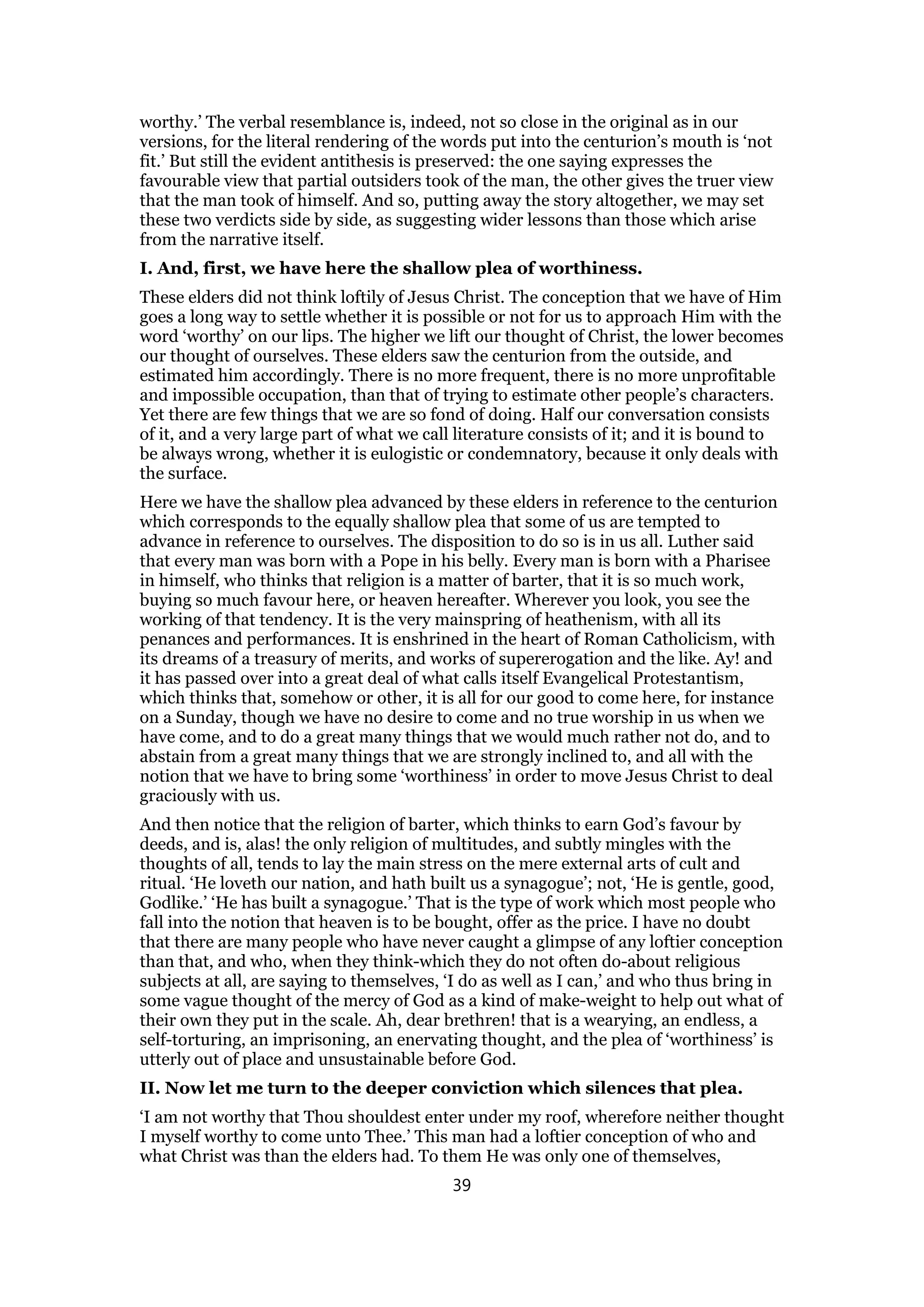
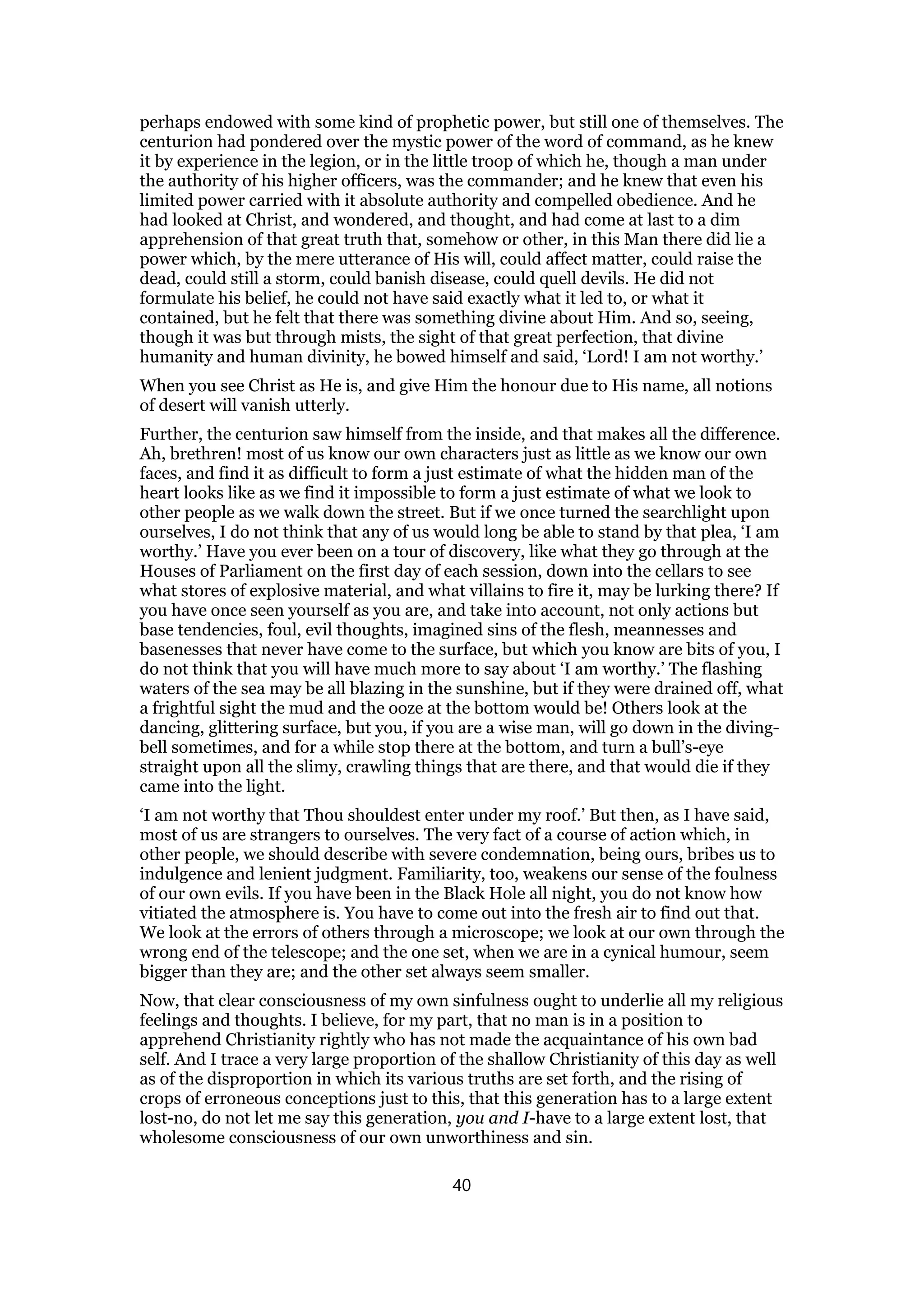

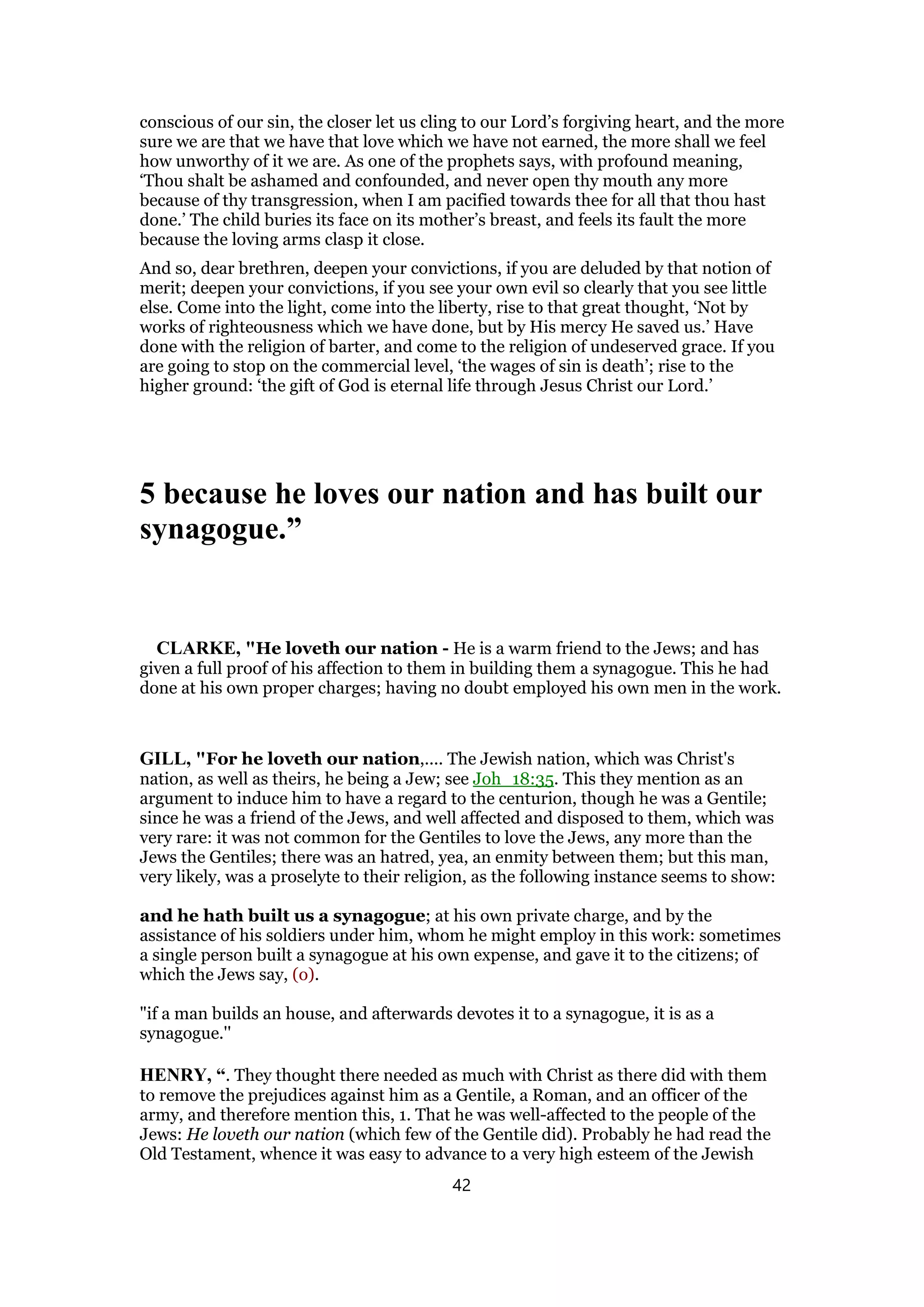


![could bid sickness to come, to go, and to behave, as this soldier ordered his
slaves. Jesus only needed to issue an authoritative command, as the centurion
gave orders, and the sickness would depart. All they had to do was say the word
and things happened. This man not only viewed Jesus as having authority over
sickness, but he even believed that Jesus' spoken word would be sufficient to
heal.
SIMEON, "THE CENTURION’S SERVANT HEALED
Luke 7:6-7. Then Jesus went with them. And when he was now not far from the
house, the centurion sent friends to him, saying unto him, Lord, trouble not
thyself: for I am not worthy that thou shouldest enter under my roof: wherefore
neither thought I myself worthy to come unto thee: but say in a word, and my
servant shall be healed.
NOTHING makes a wider breach among men than a difference in political and
religious opinion: but mutual good offices would greatly counteract this evil.
Though we can never hope to soften the rancour of all, we may by persevering
kindness conciliate the esteem of many. We have before us a remarkable instance
of the efficacy of such conduct. The centurion was a heathen, an officer of a
hostile nation, stationed in Jud ζa to keep the Jews in subjection; but instead of
oppressing the Jews he had shewed them much favour. He, in his turn, needed
their good offices on behalf of his servant; and they gladly became his advocates
and intercessors; they even prevailed on Jesus to work a miracle on his behalf.
To elucidate this miracle we shall consider,
I. The centurion’s character—
Soldiers, for the most part, are unfavourably circumstanced with respect to
religion; but here was one, though a heathen, whose character may well put to
shame the greater part of the Christian world. We may observe,
1. His love to his fellow-creatures—
[His servant was grievously afflicted with the palsy nigh unto death [Note:
Compare Matthew 8:6. with Luke 7:2.]. In this disorder, persons can do nothing
for others, or even for themselves; and in such a state, even dear friends and
relatives are ready to think the care of one a heavy burthen; yet this Centurion
administered to his servant with the tenderest affection, and interested all he
could in the promotion of his welfare [Note: He applied to some of the Jewish
elders to use their interest with Jesus on his behalf.]. What could the servant
himself have done more for the kindest master?]
2. His piety towards God—
[He had not embraced either the doctrines or discipline of the Jewish Church;
but he had learned to acknowledge the only true God; and he was glad to
promote the worship of God, even though he himself did not acquiesce in the
45](https://image.slidesharecdn.com/luke7commentary-151222193000/75/Luke-7-commentary-45-2048.jpg)
![peculiar mode in which he was worshipped. He even built a synagogue for the
Jews at his own expensed [Note: ver. 5.]. What an admirable pattern of liberality
and candour! How different from those who will not do any thing without the
pale of their own Church! Surely he never afterwards regretted that he had so
applied his wealth.]
3. His low thoughts of himself—
[He did not arrogate any thing to himself on account of his rank and authority;
nor did he value himself on his benevolence to man and zeal for God. While
others judged him worthy that a miracle should be wrought for him, he
accounted himself unworthy of the smallest favour. This was the reason of his
forbearing to wait on our Lord in person [Note: On our Lord’s near approach to
the house, the same humility that had kept the Centurion from going to him,
compelled him, as it were, to go, lest he should seem guilty of disrespect.
Compare Matthew 8:13. with the text.]. How lovely does such an one appear in
the eyes of God and man!]
4. His exalted thoughts of Christ—
[He judged our Lord to be too holy to admit of converse with a heathen. He
believed also that Jesus could effect whatsoever he pleased, by a word, and at a
distance, without the intervention of any means [Note: ver. 7.]. Nor did he doubt
but that universal nature was subject to his will far more than the most obedient
soldier could be to the commands of his officer [Note: ver. 8.]. Thus did he
ascribe to Jesus a power proper to God alone [Note: Deuteronomy 32:39.]. Well
might our Lord’s address to the discreet Scribe have been applied to him [Note:
Mark 12:34.].]
Such a character as this could never meet with a repulse from Jesus.
II. The kindness vouchsafed to him by our Lord—
Instantly at the request of the elders Jesus set off to the Centurion’s house. He
who, though repeatedly importuned, declined to visit a nobleman’s son [Note:
John 4:46-50.], went, at the very first summons, to attend upon a centurion’s
servant; and no sooner met the centurion, than he richly recompensed his
assiduity—
1. He expressed his admiration of the centurion’s faith—
[We never hear of Jesus admiring the things of this world: he rather checked in
his Disciples such ill-judged veneration [Note: Mark 13:1-2.]: but when he
beheld the Centurion’s faith, “he marvelled at it.” Not that such exercise of grace
was really unexpected by him. Jesus both knew what was in the Centurion’s
heart [Note: John 2:25.], and had planted there the very grace which he
exercised [Note: John 1:16.]; but Jesus, as our exemplar, would teach us what to
admire, and shew us that the smallest portion of true faith cannot be estimated
too highly [Note: 2 Peter 1:1.]. Our Lord declared in his very presence, that this
46](https://image.slidesharecdn.com/luke7commentary-151222193000/75/Luke-7-commentary-46-2048.jpg)
![faith had not been equalled by any even of the Israelites themselves [Note: ver.
9.]. Such approbation from his mouth could not fail of comforting the afflicted
Centurion.]
2. He wrought the desired miracle in confirmation of his
faith—
[By a simple act of his Will he restored the servant to perfect health, and told the
Centurion that it should “be to him according to his faith.” Thus he removed the
distress of the family in an instant. Thus too he confirmed the faith which had
shone forth so nobly, and shewed that we could never expect too much at his
hands. What advantage for eternal life did the Centurion derive from hence!
With what lively hope might he apply to Jesus for the healing of his soul! We can
never suppose that such love and piety, such humility and faith, were left to
perish. No, verily; that declaration shall be found true to all eternity [Note: 1
Samuel 2:30.]—]
3. He declared that many such persons should be saved,
while many, with clearer light and higher privileges, should be cast out—
[They who profess the true religion may be called “the children of the kingdom.”
But how many of them are destitute of the attainments this heathen had made!
How many would have imitated that vile Amalekite rather than him [Note: 1
Samuel 30:13.]—! How many grudge the necessary contributions for keeping up
the houses of God [Note: What a contrast to him who, entirely at his own
expense, erected a synagogue for people of another communion!]! What
doubting of Christ’s power and grace, yea, what a proud conceit too of their own
worthiness, is to be found among professing Christians! Surely what our Lord
said respecting the unbelieving Jews shall be realized in Christians of this
character [Note: Matthew 8:12.]: and the humbler heathens, who walked
agreeably to the light that they enjoyed, shall be preferred before them. Nor can
we doubt but that the Centurion, in reference to whom these things were spoken,
shall be among that blessed number.]
Application—
[Let us then learn to plead earnestly for ourselves; nor let a sense of
unworthiness keep us from carrying our wants to Jesus — — — Let us also
sympathize with, and intercede for, others. Job, like the Centurion, found benefit
from his own intercessions [Note: Job 42:10.]: nor shall our supplications be in
vain, either for ourselves or others.]
7 That is why I did not even consider myself
worthy to come to you. But say the word, and
47](https://image.slidesharecdn.com/luke7commentary-151222193000/75/Luke-7-commentary-47-2048.jpg)
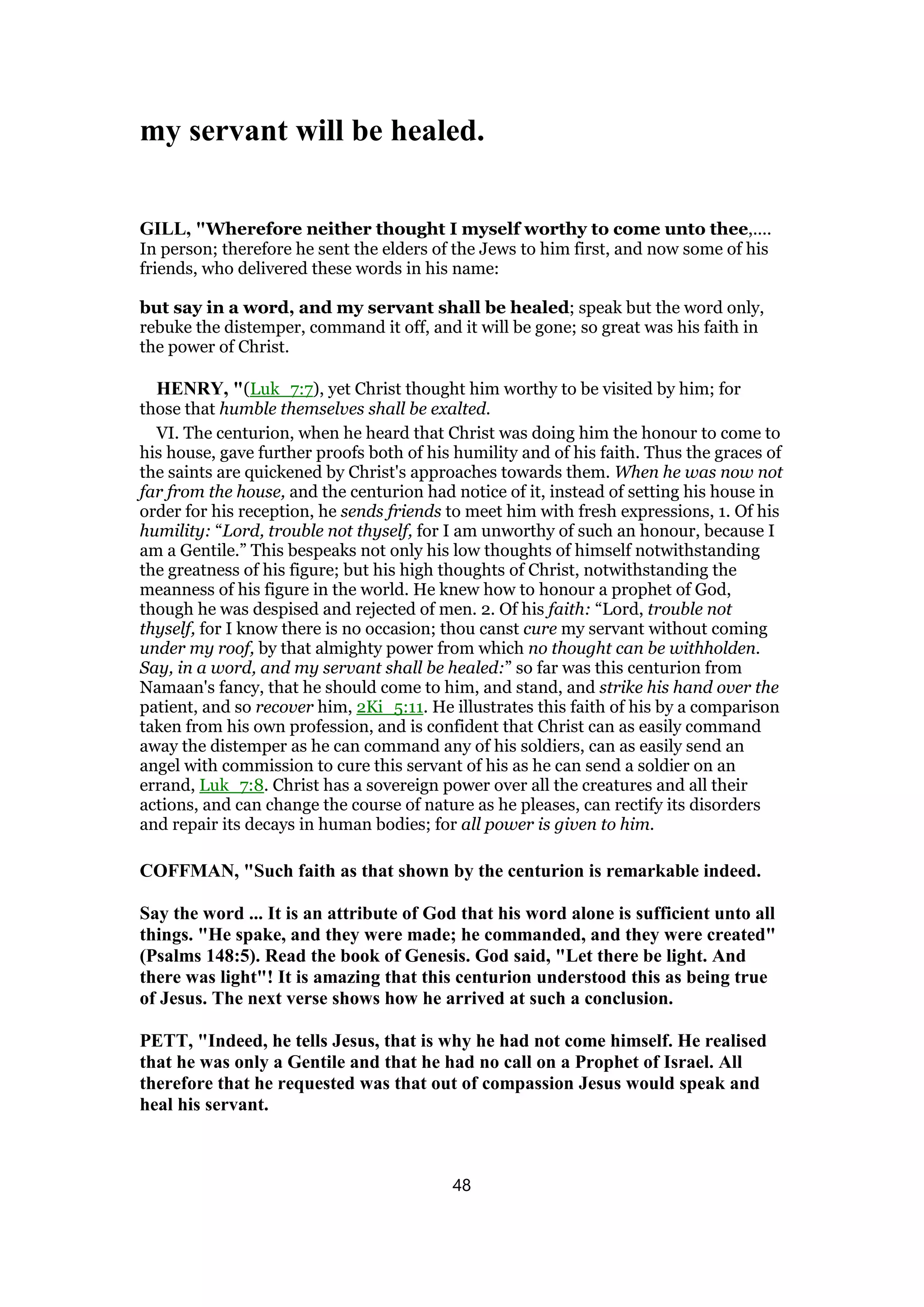
![8 For I myself am a man under authority, with
soldiers under me. I tell this one, ‘Go,’ and he
goes; and that one, ‘Come,’ and he comes. I say
to my servant, ‘Do this,’ and he does it.”
GILL, "For I also am a man set under authority,.... Of the Roman senate; "or
belonging to the emperor", as the Arabic version renders it; and under the command
of a tribune, as a centurion was: so that this is not an amplification, but a diminution
of his office; and his sense is, that even he who was but an inferior officer, yet had
such power as after related:
having under me soldiers; an hundred, or more:
and I say unto one, go, and he goeth, and to another, come, and he
cometh, and to my servant, do this, and he doth it; as this his servant used to
do, and whom he may intend, who now lay sick, and therefore was dear unto him.
His meaning is, that Christ could as easily command, and call off a distemper, add it
would obey him, as he could command obedience from his soldiers and servant, and
have it, and more so.
HENRY, “ He illustrates this faith of his by a comparison taken from his own
profession, and is confident that Christ can as easily command away the distemper as
he can command any of his soldiers, can as easily send an angel with commission to
cure this servant of his as he can send a soldier on an errand, Luk_7:8. Christ has a
sovereign power over all the creatures and all their actions, and can change the
course of nature as he pleases, can rectify its disorders and repair its decays in
human bodies; for all power is given to him.
COFFMAN, "Having in his possession the knowledge of how Jesus' word had
wrought many cures, this centurion, like his fellow officer, had come to recognize
God come in the flesh. As Ryle observed:
A greater miracle of healing than this is nowhere recorded in the Gospels.
Without even seeing the sufferer, without touch of hand, or look of eye, our Lord
restored health to a dying man. He spoke and the sick was cured. He
commanded, and the disease departed. No apostle or prophet did a miracle like
this. We see here the finger of God.[10]
ENDNOTE:
[10] J. C. Ryle, op. cit., p. 200.
PETT, "He assured Jesus that he had no doubt that He could do this because he
knew that He was a man who enjoyed the authority of God. So just as he himself
49](https://image.slidesharecdn.com/luke7commentary-151222193000/75/Luke-7-commentary-49-2048.jpg)
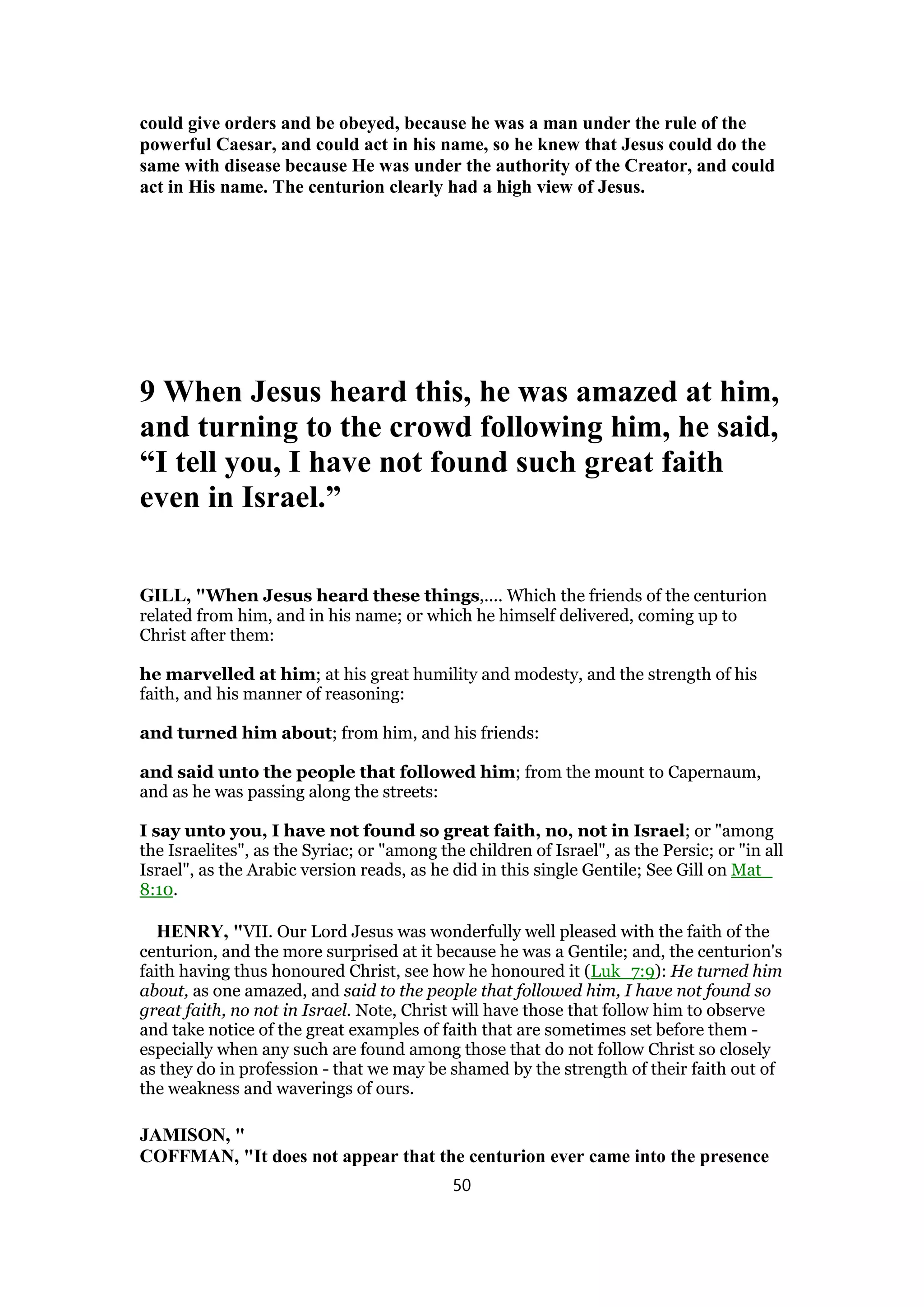
![of the Lord, physically; but, disclaiming for himself any worthiness that Jesus
might come under his roof, he nevertheless received him in his heart, which was
a far more glorious reception.
No, not in Israel ... That Jesus placed this centurion's faith above ALL that he
had seen in Israel is significant. As Taylor said:
This centurion placed Jesus on the throne of the universe, regarding him as the
ruler of the world, and as having all things under his command. He saw him, not
merely as Messiah, but as God Incarnate, and therein lay the superiority of his
faith to that of any of the Israelites. Not even any of the apostles, at that time,
had reached the lofty altitude on which this Gentile soldier stood.[11]
He marvelled ... For an article on the "Marvel of Unbelief," see my Commentary
on John, index. It is not recorded very often that Jesus marveled; but his
marveling here contrasts with his marveling at unbelief (Mark 6:6). It was an
inherent condition of the incarnation that Jesus should have experienced
amazement and wonder. How would the Lord, to whom all things were known,
have wondered, or marveled? Trench called this question "One of the hardest in
the whole domain of theology."[12] Every student of the Holy Scriptures must
confess the awareness of the mystery in this which is beyond all human
comprehension; but by faith we receive the answer supplied by the apostle who
wrote that "He emptied himself, and took upon him the form of a servant"
(Philippians 2:6-8).
Accepting this account as a second miracle wrought for the benefit of a centurion
would also fit the evident purpose in Luke of giving TWO instances of Jesus'
mightiest deeds, rather than merely one. Thus he recorded TWO instances of
Jesus' raising the dead (no other Gospel did this), the OTHER genealogy (that of
Mary), a SECOND anointing, ANOTHER sermon similar to the one on the
mount, a SECOND version of the prayer Jesus taught his disciples to pray, the
cure of a second woman who had long been afflicted (Luke 13:10); a SECOND
lament over Jerusalem, a SECOND parable of the slighted invitation, and even
recorded very significant utterances of Jesus from the cross which were not even
hinted in the other Gospels. This is clearly a characteristic of this Gospel.
[11] William M. Taylor, The Miracles of Our Saviour (New York: Richard R.
Smith, 1930), p. 167.
[12] Richard Trench, op. cit., p. 246.
PETT, "When Jesus heard these words he marvelled. Here was a man with a
high view of God, and a high view of Him, higher than any He had come across
before. And a man whose high view also included genuine faith. Indeed greater
faith than any that Jesus had yet found in man. For this man believed in Him
implicitly.
We are not told so but we can assume that Jesus immediately spoke the word of
healing. The Creator spoke and the disease vanished.
51](https://image.slidesharecdn.com/luke7commentary-151222193000/75/Luke-7-commentary-51-2048.jpg)
![CONSTABLE, "Verse 9-10
Jesus' comment did not slander the faith of the Jews. One would expect them to
have faith since they had the prophecies about Messiah in Scripture, but the
Gentiles did not have that light. The centurion believed that Jesus could heal His
servant, not that He would heal him. The only two instances of Jesus
"marveling" at people are here, on account of faith, and at Nazareth, because of
unbelief (Mark 6:6). The centurion's belief in Jesus' authority was unusual,
apparently because it rested on reports, and perhaps personal observation, of
Jesus' previous ministry. Jesus rewarded his faith by healing his servant.
"Here was one, who was in the state described in the first clauses of the
'Beatitudes,' and to whom came the promise of the second clauses; because
Christ is the connecting link between the two, and because He consciously was
such to the Centurion, and, indeed, the only possible connecting link between
them." [Note: Edersheim, 1:549.]
Jesus did not limit His healing ministry to people who believed that He was the
divine Son of God. He evidently healed some people who expressed no
understanding of His true identity simply because He felt compassion for them
and chose to bless them (cf. John 9:11; Acts 10:38). Even the Twelve did not
understand that Jesus was both God and man until God revealed that to Peter at
Caesarea Philippi (Matthew 16:16). It may therefore be incorrect to conclude
that this centurion became a believer in Jesus' deity here, though He may have.
He did believe that Jesus was at least a prophet of God, and probably he believed
that Jesus was the Jewish Messiah. Jesus rewarded his faith because he
responded as he should have to the information about Jesus that he had. That is
essentially what Jesus had been teaching his disciples to do in the Sermon on the
Mount. That is what Luke wanted his readers to do too. [Note: See Zane C.
Hodges, "The Centurion's Faith in Matthew and Luke," Bibliotheca Sacra
121:484 (October-December 1964):321-32.]
10 Then the men who had been sent returned to
the house and found the servant well.
CLARKE, "Found the servant whole - This cure was the effect of the faith,
prayer, and humility of the centurion, through which the almighty energy of Jesus
Christ was conveyed to the sick man. But these very graces in the centurion were the
products of grace. It is God himself who, by the gifts of his mercy, disposes the soul
to receive its cure; and nothing can contribute to the reception of his grace but what
is the fruit of grace itself. The apostle says, The grace of God that bringeth salvation
hath appeared unto all men, Tit_2:11. It should therefore be our concern, not to
resist the operations of this grace: for though we cannot endue ourselves with by
52](https://image.slidesharecdn.com/luke7commentary-151222193000/75/Luke-7-commentary-52-2048.jpg)
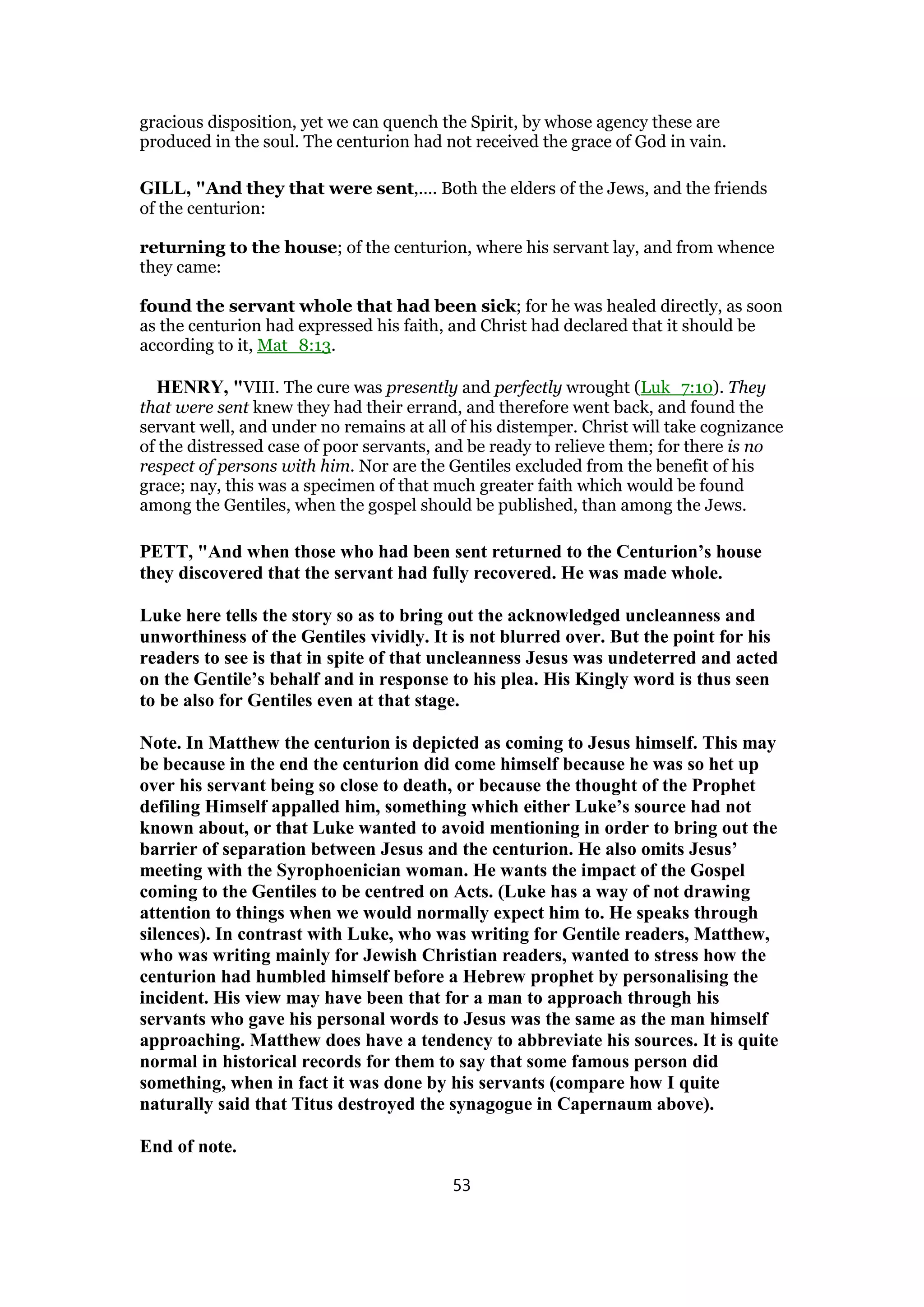




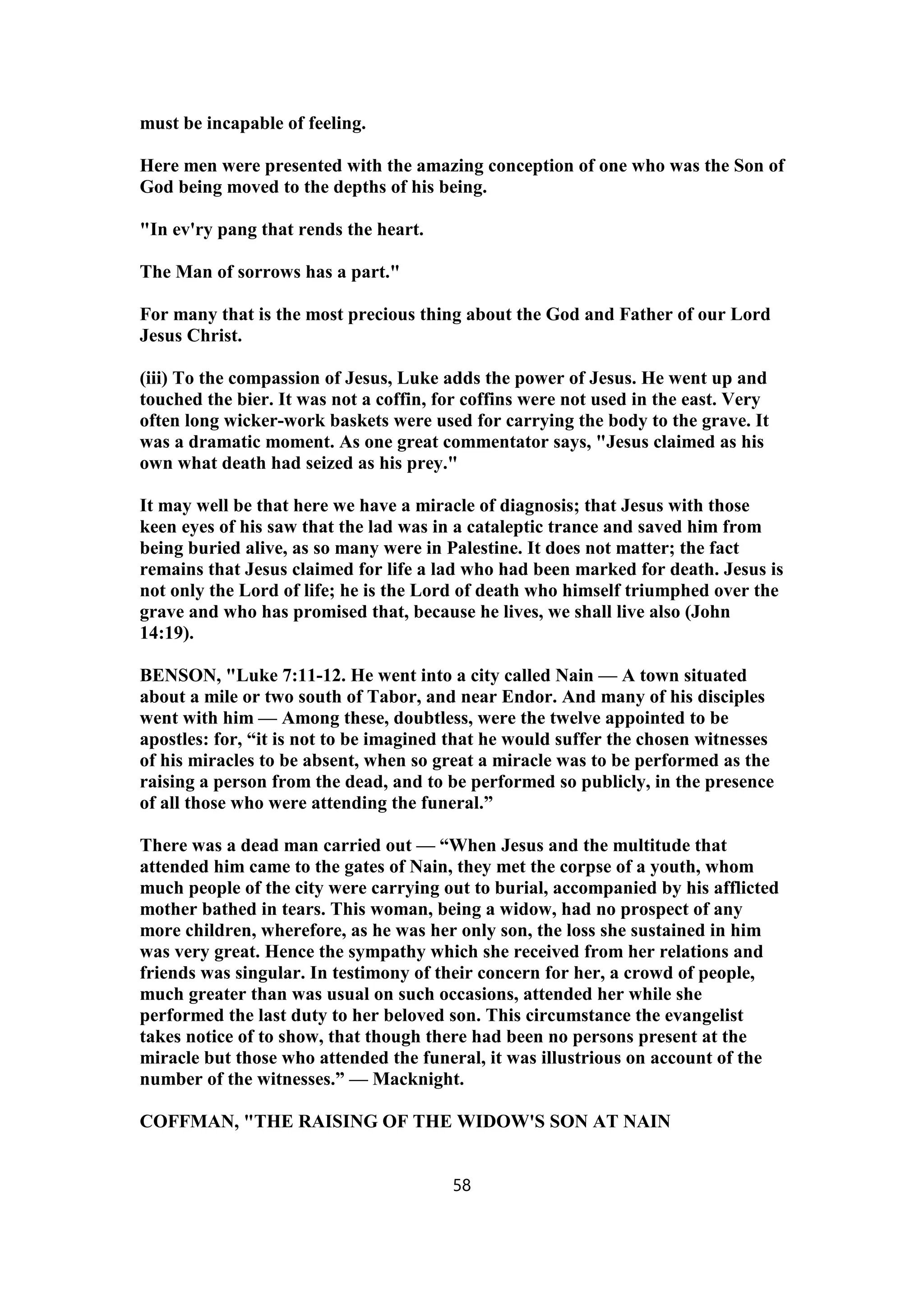
!["There are many ancient remains of Nain, proving that the place was once of
considerable size."[13] It is located "on the northwestern edge of `Little
Hermon,' where the ground falls into the plain of Esdraelon."[14] Just east of the
city are the remains of rock sepulchres; and the extensive ruins disprove the
notion that the place was merely "a humble village of mud-built houses near
Nazareth."[15] Luke was altogether correct in calling the place a "city." Today
the village is a rather insignificant place called Nein.
Soon afterwards ... may mean "the very next day," as this place reads in some
ancient authorities (English Revised Version (1885), margin). Amazingly, only
Luke recorded this wonder, the sacred authors having been most certainly
restrained by the Spirit of God in what they included or left out.
[13]; ISBE, p. 2111.
[14] F. N. Peloubet, A Dictionary of the Bible (Philadelphia: The John C.
Winston Company, 1912), p. 433.
[15] Roland de Vaux, The World of Jesus (Washington, D.C.: The National
Geographic Society, 1967), p. 304.
PETT, "Jesus’ popularity with the ordinary people continued, and a great crowd
followed Him as he and His disciples approached Nain. Nain is the modern Nen
in the plain of Jezreel six miles SSE of Nazareth and on the slope of Little
Hermon. Its ancient gates have not yet been discovered, if it had any, but
insufficient work has as yet been done on the site to be sure. However ‘gate’ can
indicate simply an entrance thought of metaphorically as a gate. The fact that so
obscure a place as Nain is mentioned is a clear indication that some genuine
wonder occurred there that made men remember it..
BURKITT, "There were three persons raised from death to life by the powerful
word of Christ's mouth; namely, Jairus's daughter, mentioned by St. Matthew;
Lazarus recorded by St. John; and here the widow's son, only taken notice of by
St. Luke.
The place where the miracle was wrought was the city of Nain; out of their cities,
and not within them, the Jews were wont to bury their dead. Our Saviour at the
gate of the city meets with the sad pomp of a funeral, a sorrowful widow
attended with her mournful neighbors, following her only son to the grave.
Where note, 1. The doleful and distressed condition of the widow: there were
many heart-piercing circumstances in her affliction.
1. It was the death of a son. To bury a child rends the heart of a parent; for what
are children but the parent multiplied? But to lay a son in the grave, which
continues the name and supports the family, is a sore affliction.
2. This was a young man in the strength and flower of his age, not carried from
the cradle to the coffin. Had he died an infant, he had not been so much
59](https://image.slidesharecdn.com/luke7commentary-151222193000/75/Luke-7-commentary-59-2048.jpg)

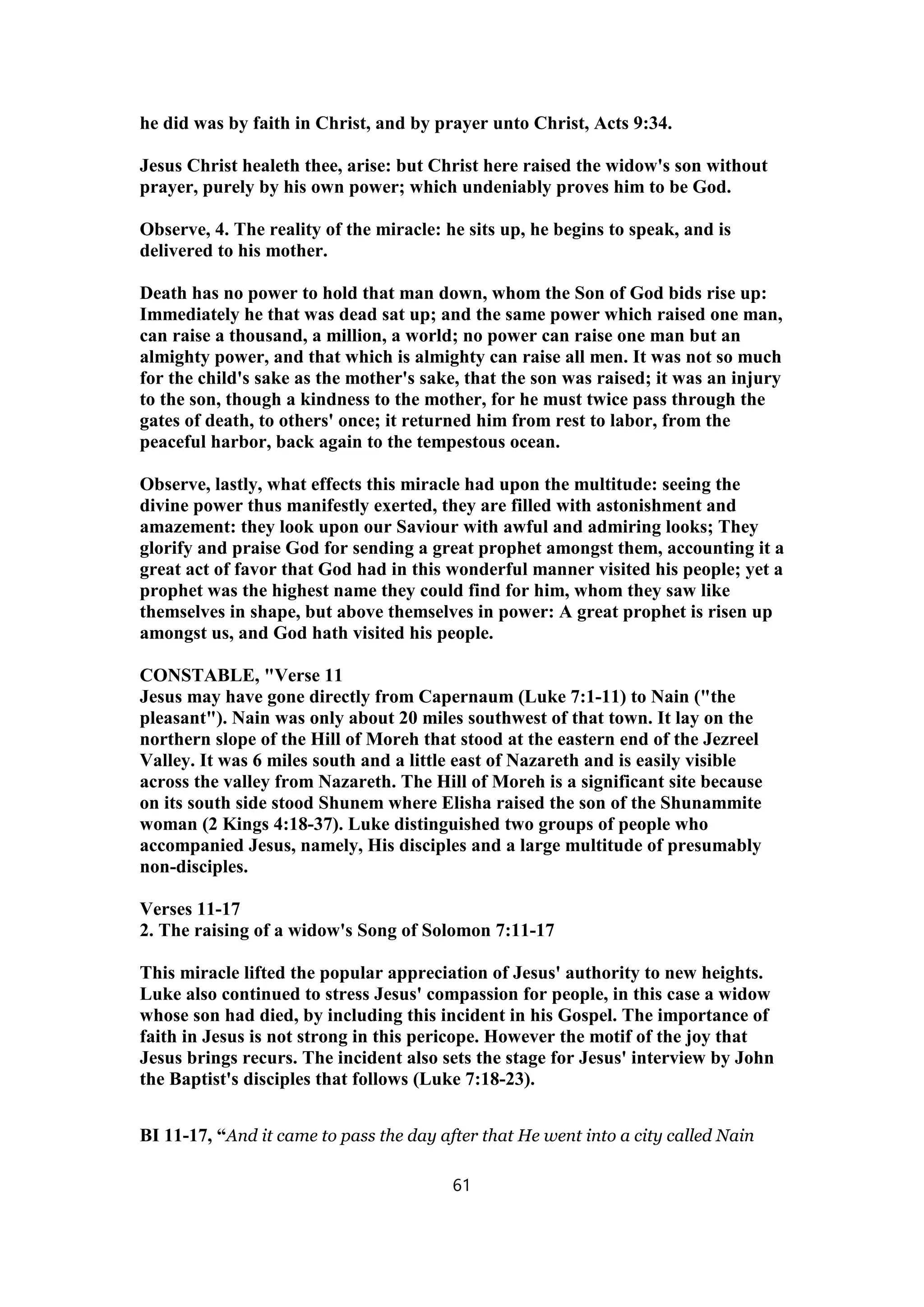
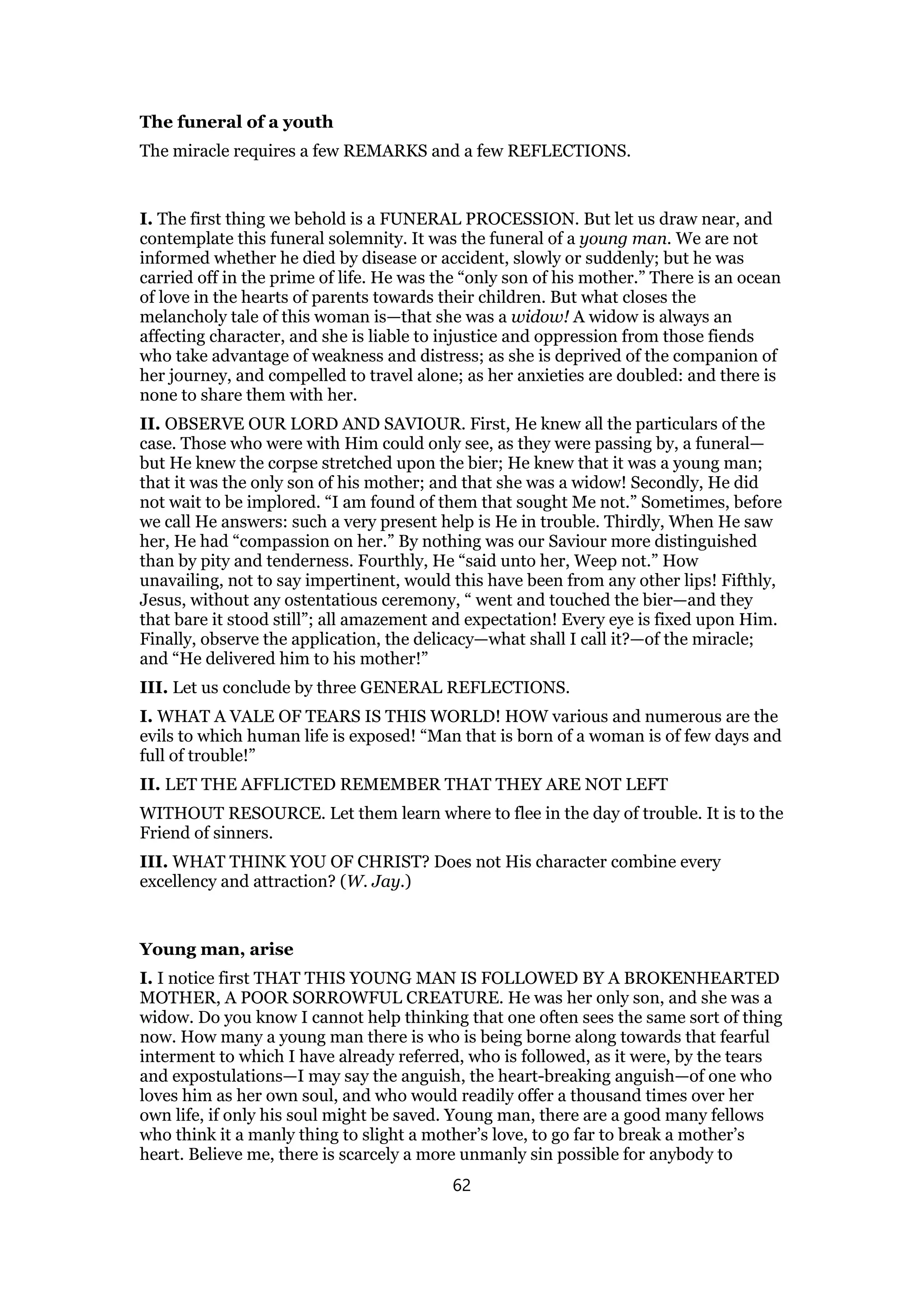
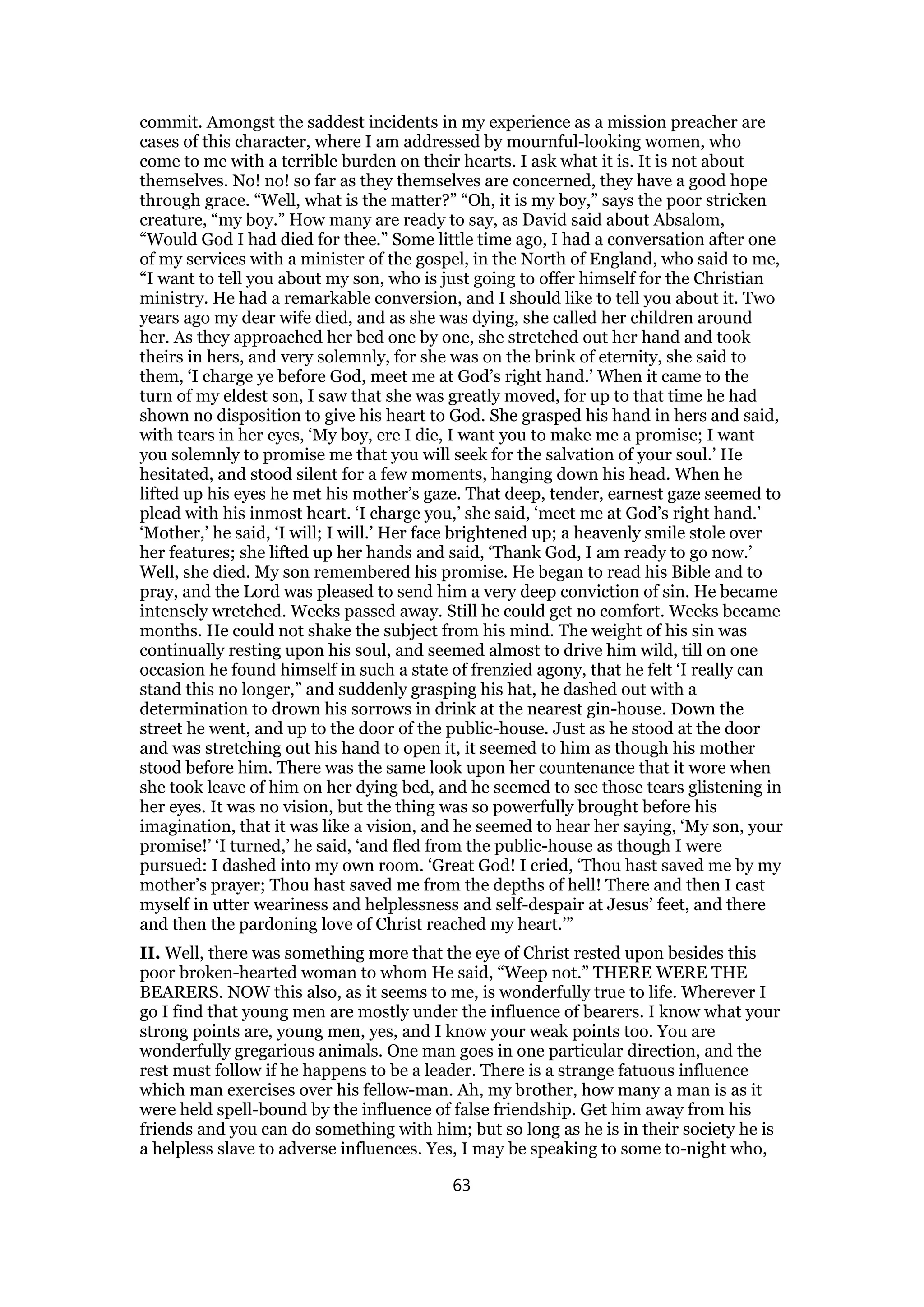

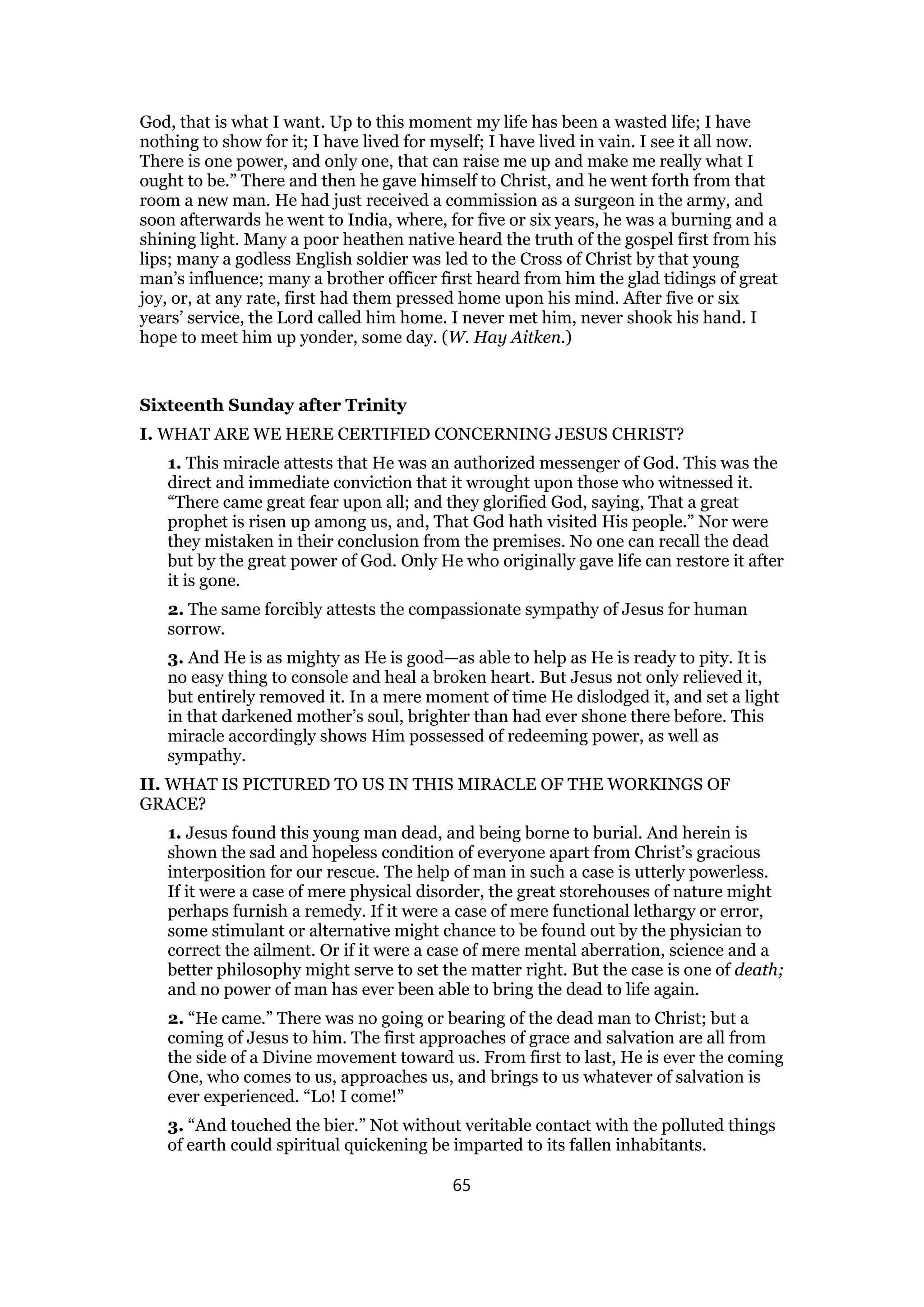
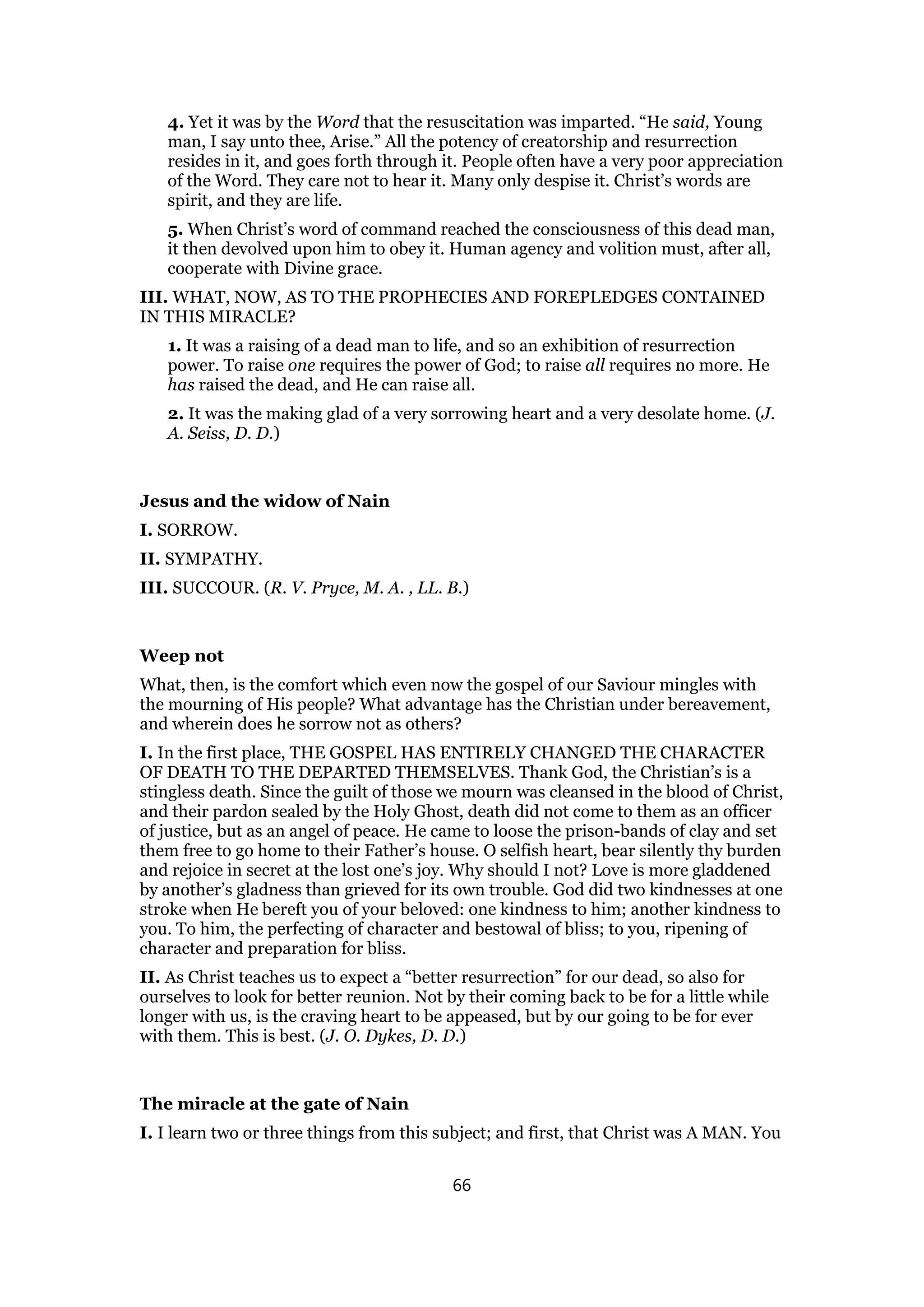
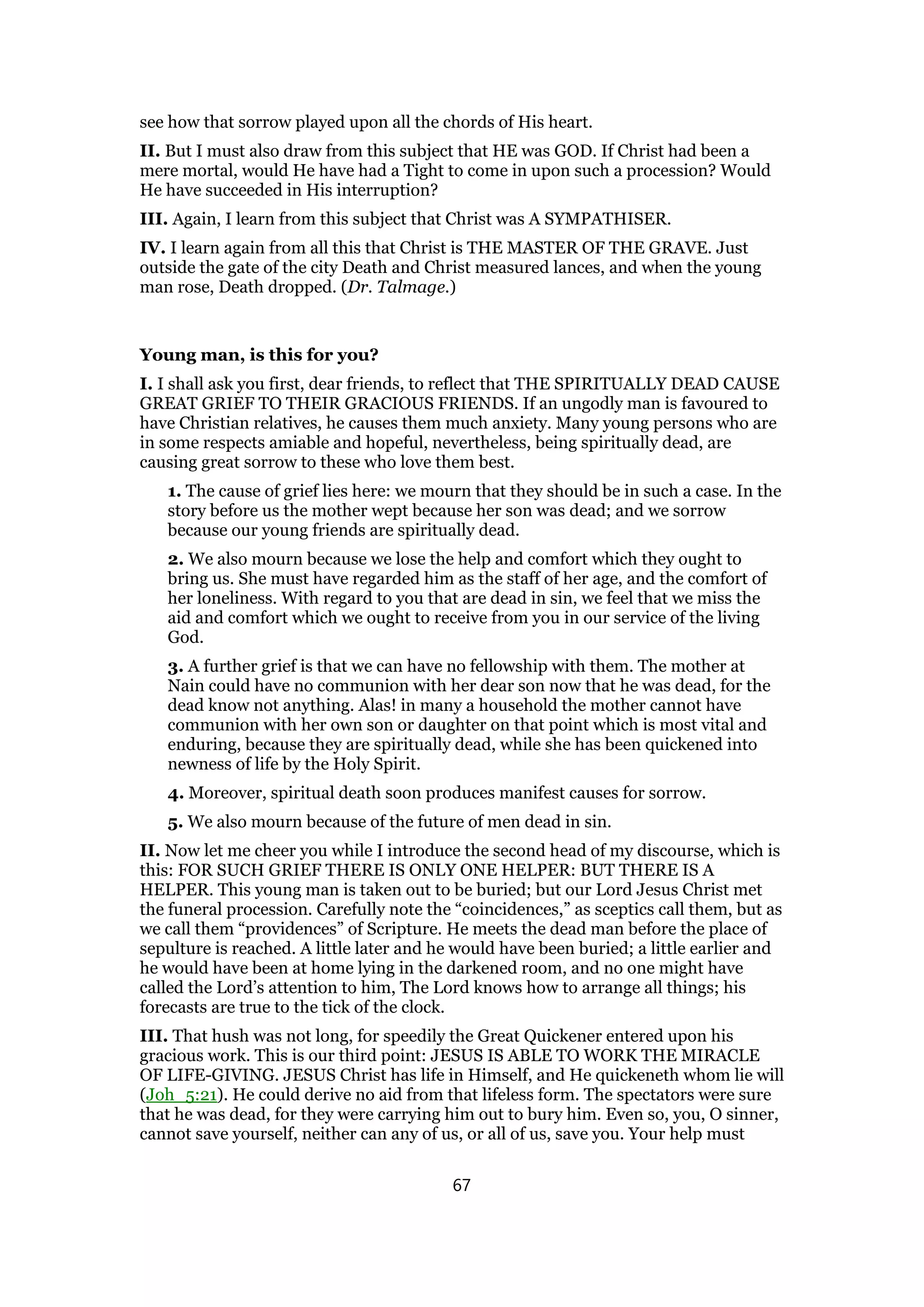


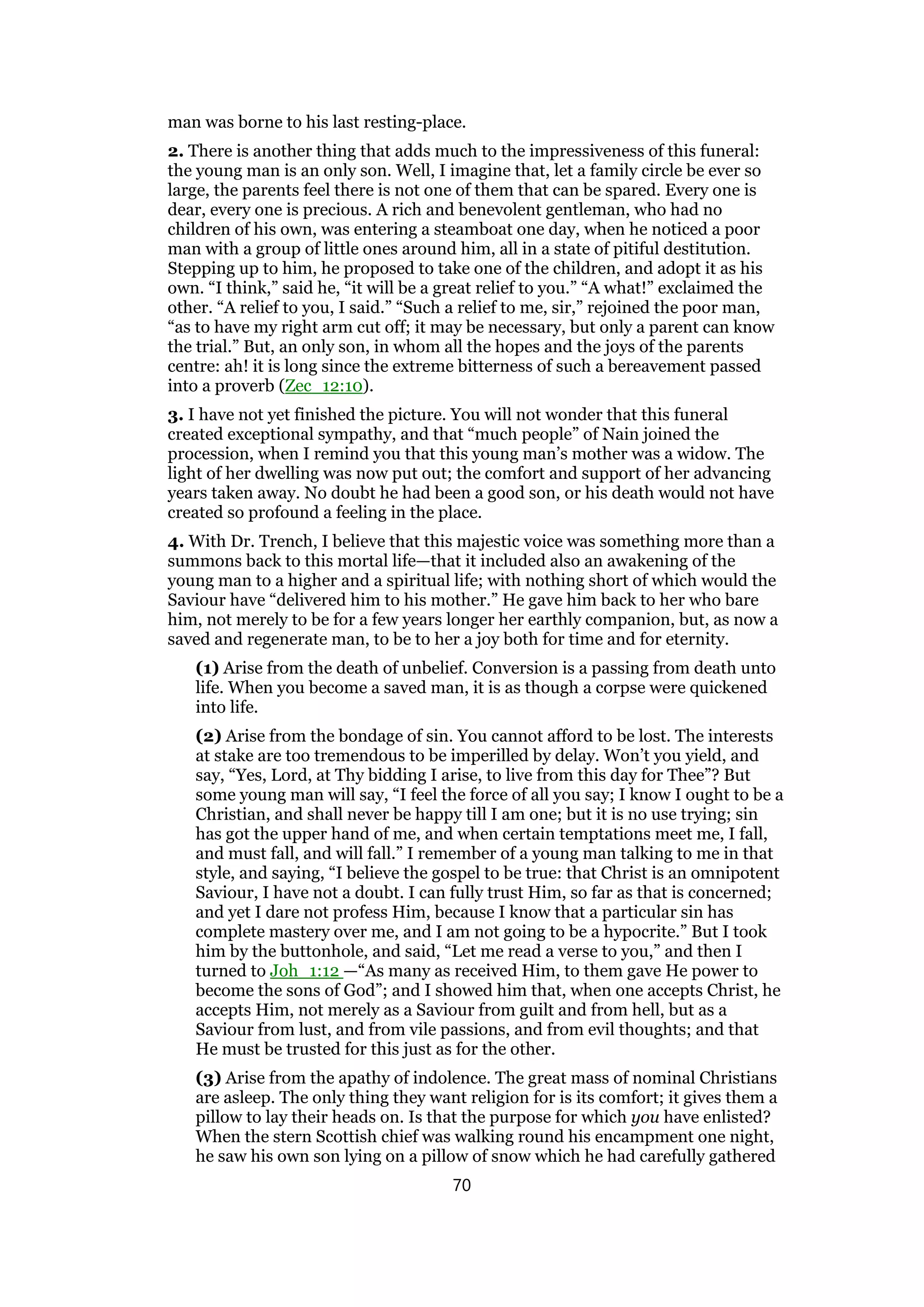
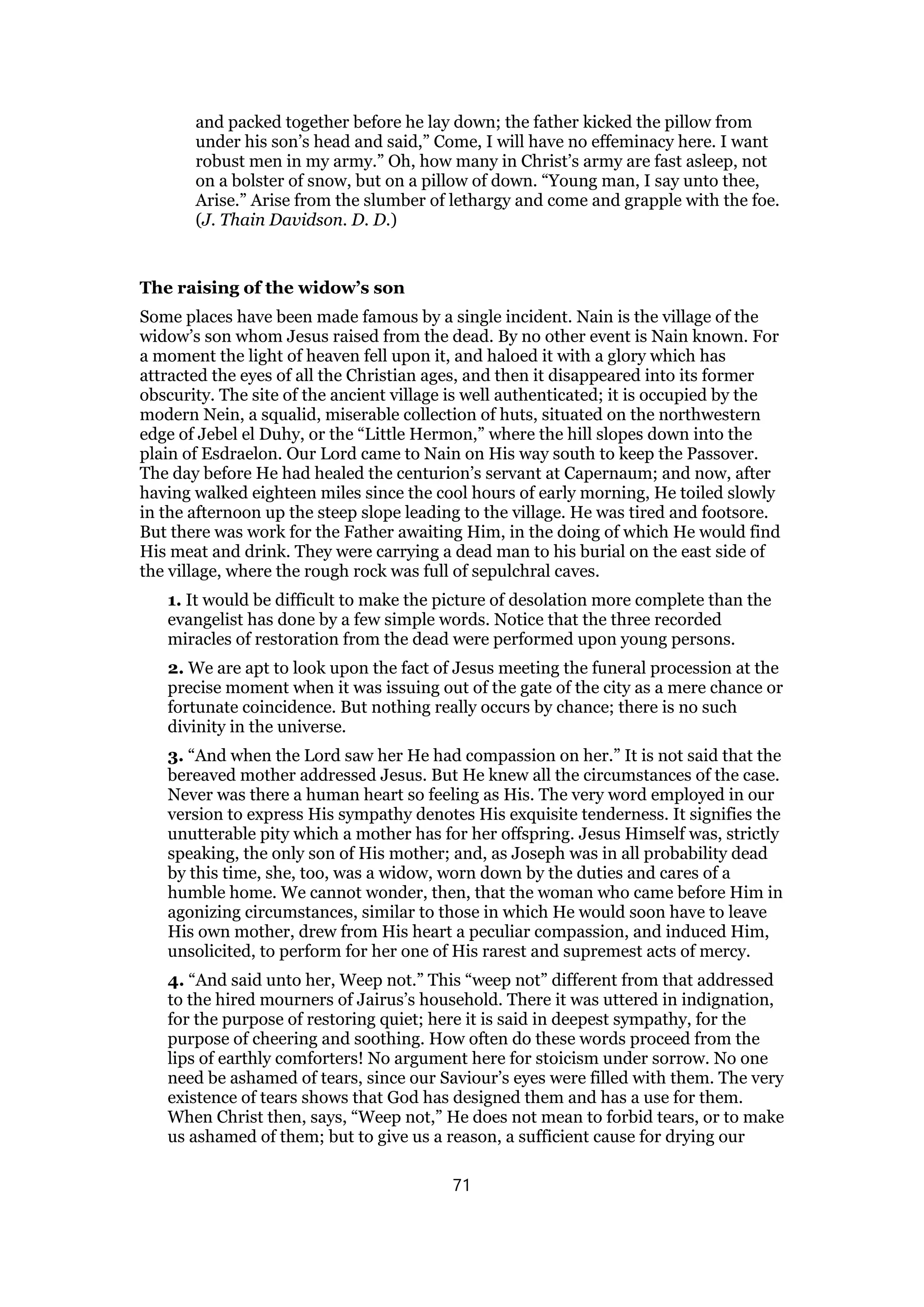


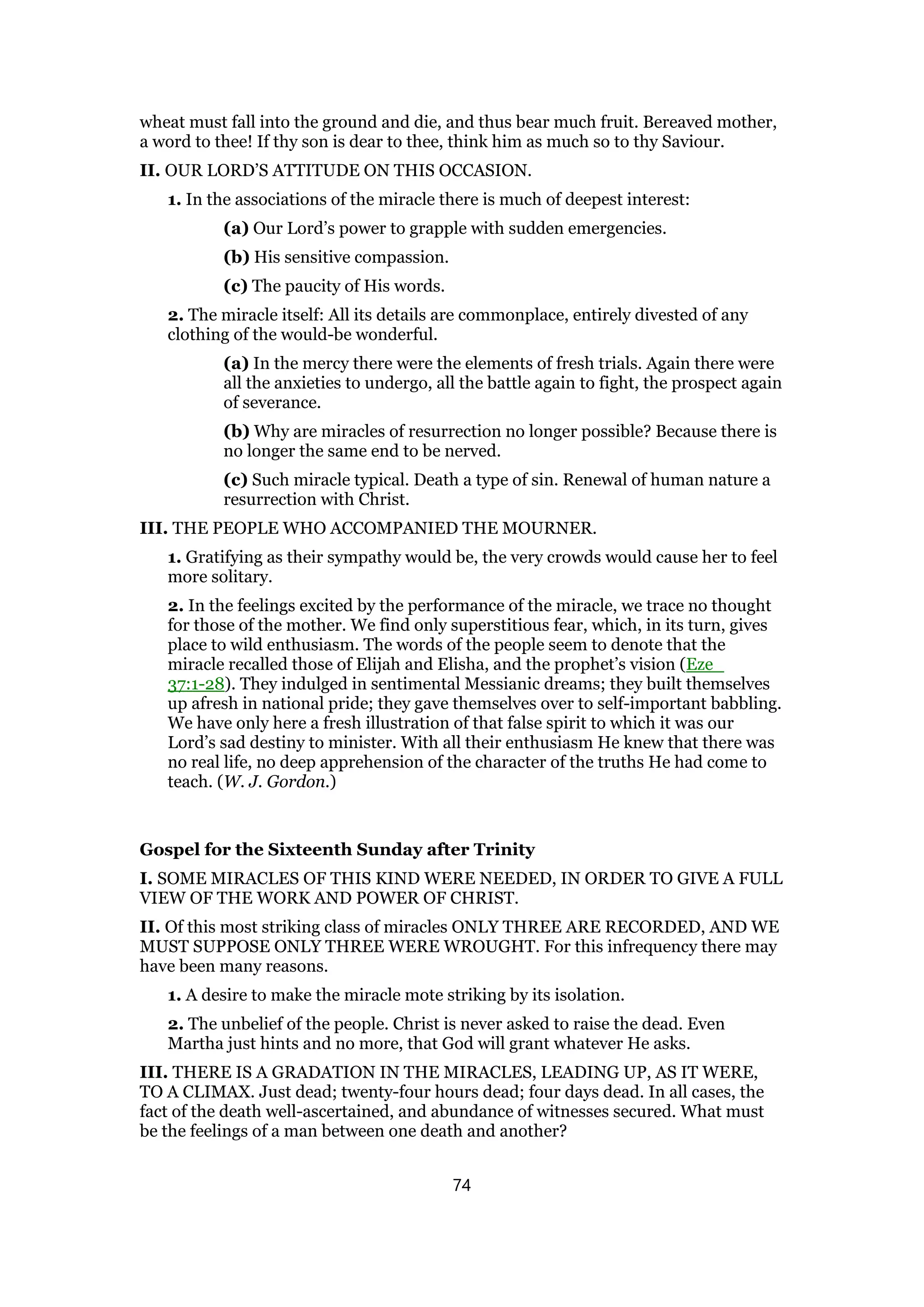

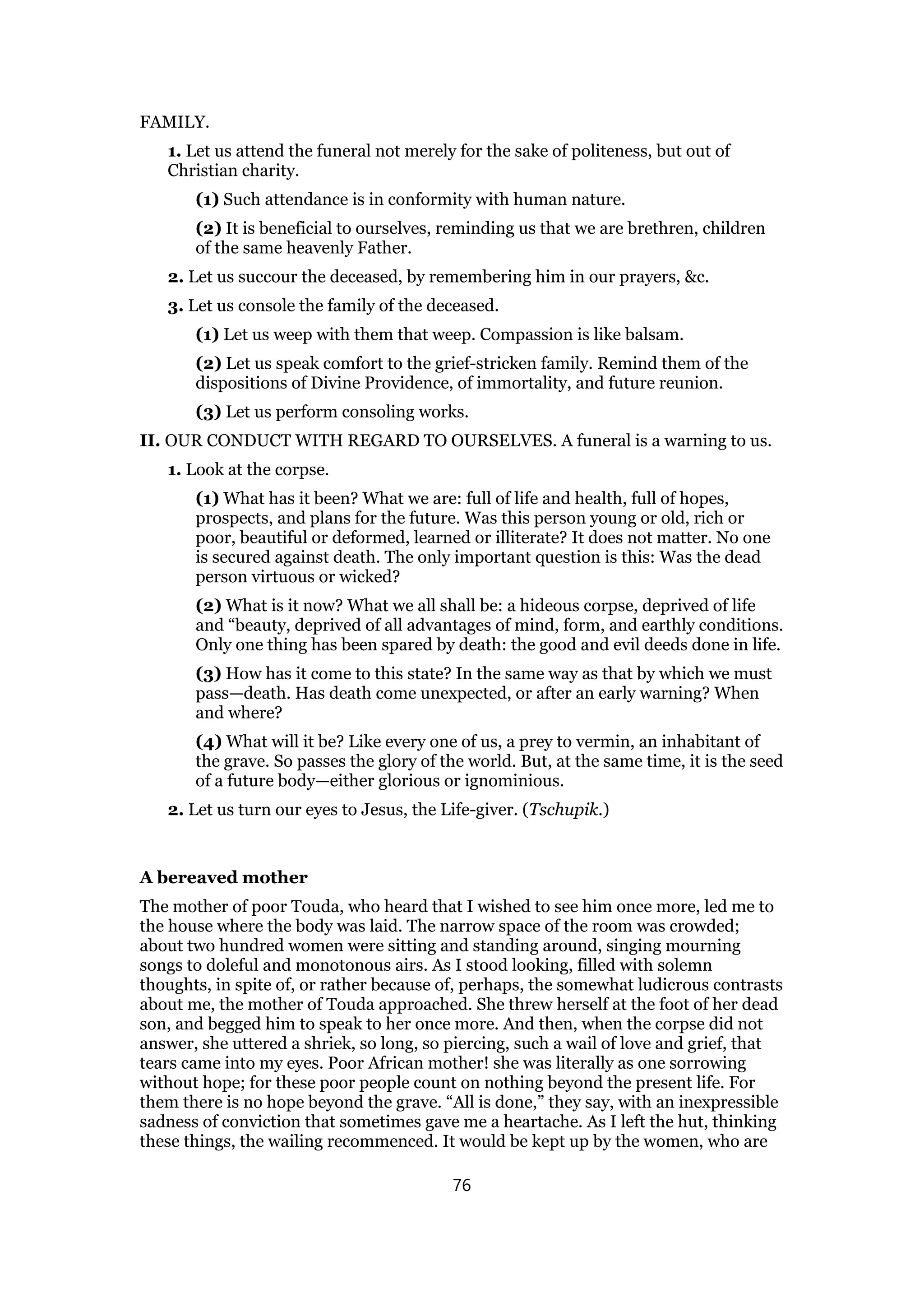




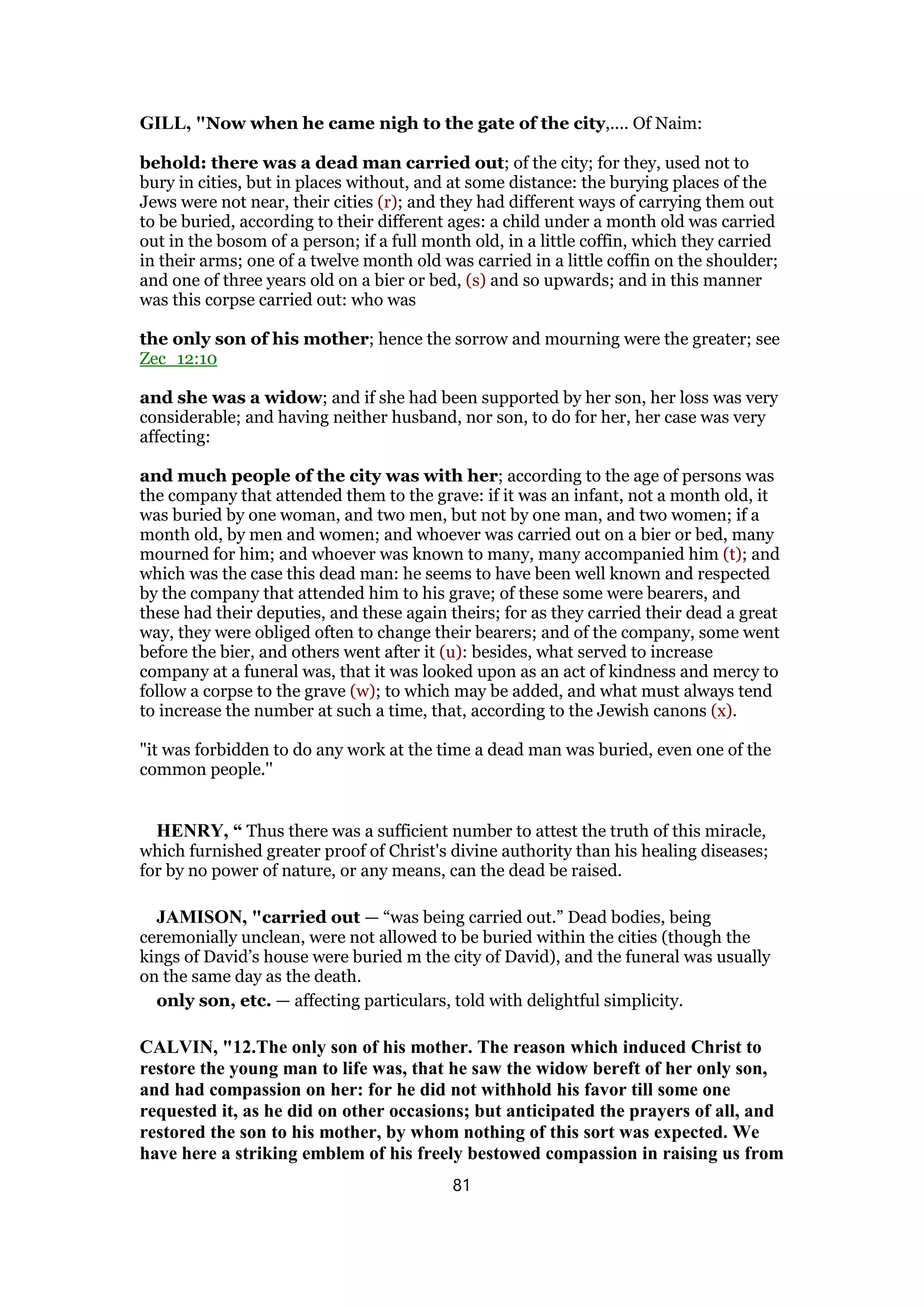


![shall rise in glory; and therefore we must not sorrow as those that have no hope,
1Th_4:13. Let Rachel, that weeps for her children, refrain her eyes from tears, for
there is hope in thine end, saith the Lord, that thy children shall come again to their
own border, Jer_31:17. And let our passion at such a time be checked and claimed by
the consideration of Christ's compassion.
JAMISON, "the Lord — “This sublime appellation is more usual with Luke and
John than Matthew; Mark holds the mean” [Bengel].
saw her, he had compassion, etc. — What consolation to thousands of the
bereaved has this single verse carried from age to age!
BENSON, "Luke 7:13-15. When the Lord saw her, he had compassion on her,
&c. — Jesus, whose tenderness made him susceptible of the strongest
impressions from occurrences of this kind, knowing that the mother’s affliction
was bitter, and the occasion of it real, was greatly moved with compassion at the
sorrowful scene. Here was no application made to him for her, not so much as
that he would speak some words of comfort to her; but, ex mero motu, purely
from the goodness of his nature he was troubled for her, and said unto her, Weep
not. Observe, reader, Christ has a concern for mourners, for the miserable, and
often prevents them with the blessings of his goodness. He undertook the work of
our redemption and salvation in his love and in his pity, Isaiah 63:9. What a
pleasing idea doth this give us of the compassion of the Lord Jesus, and the
multitude of his tender mercies, which may be very encouraging to us, when at
any time we are in sorrow! Let poor widows comfort themselves in their sorrows
with this, that Christ pities them, and knows their souls in adversity; and, if
others despise their grief, he does not. Christ said, Weep not; and he could give
her a reason for it, which no one else could; weep not for a dead son, for he shall
presently become a living one. This was a reason peculiar to her case; yet there is
a reason, common to all that sleep in Jesus, (which is of equal force against
inordinate and excessive grief for their death,) that they shall rise again, shall
rise in glory, and therefore we must not sorrow as those that have no hope, 1
Thessalonians 4:13. Let Rachel, that weeps for her children, refrain her eyes
from tears; for there is hope in thine end, saith the Lord, that thy children shall
come again to their own border, Jeremiah 31:17. And let our passion at such a
time be checked and calmed by the consideration of Christ’s compassion. And he
came and touched the bier — Which he could do without contracting pollution.
The people of the East bury their dead without coffins, but they carry them to
the grave on a bier that is shaped like one. By touching this, Jesus intimated to
the bearers that they should not proceed. And he said, Young man, I say unto
thee, Arise — And no sooner had he uttered this command than he that was dead
sat up — Without any human help, having received life from Jesus, which was
thus evinced, as it was also by his beginning to speak. Thus, when Christ
communicates spiritual life to a person who had been dead in trespasses and sins,
he instantly arises out of the state of insensibility, darkness, and death, in which
he had lain, and his lips are opened in prayer and praise. And he delivered him
to his mother — Christ did not oblige this young man, to whom he had given a
new life, to go along and continue with him, as his disciple to minister to him,
though he owed him much, even his own self; much less as a trophy of his
dominion over death, to get honour by him; but presented him to his mother, to
84](https://image.slidesharecdn.com/luke7commentary-151222193000/75/Luke-7-commentary-84-2048.jpg)

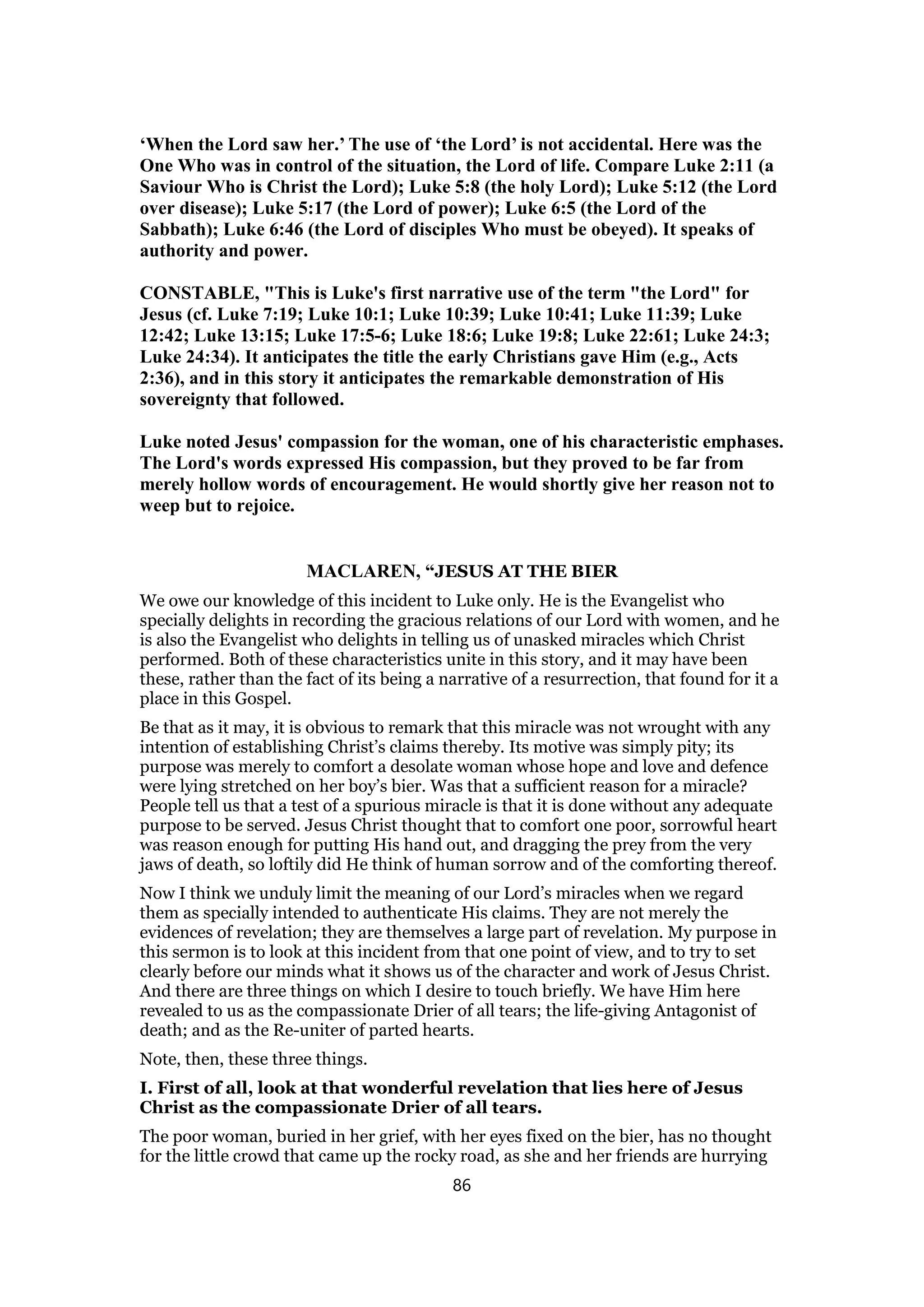
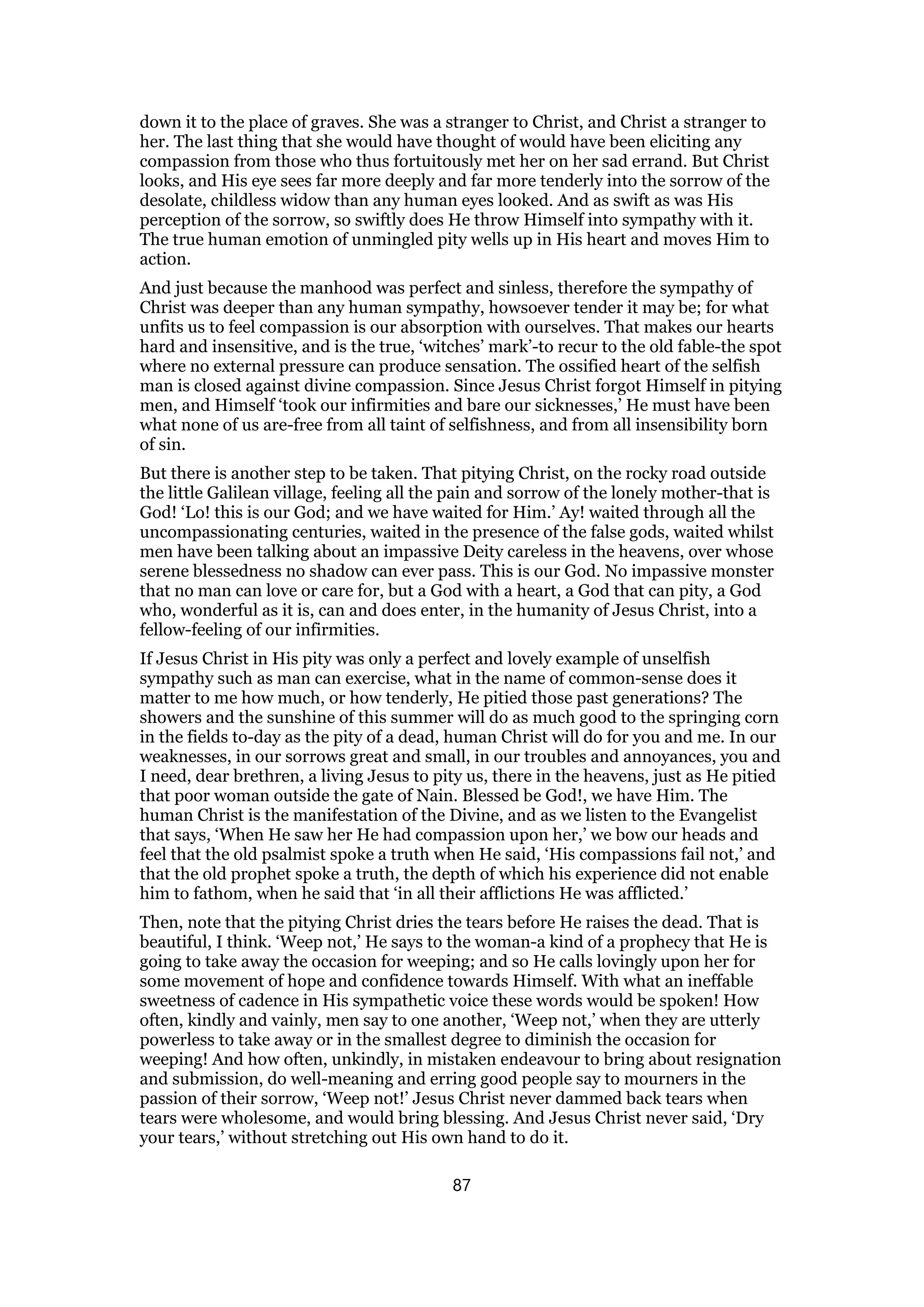


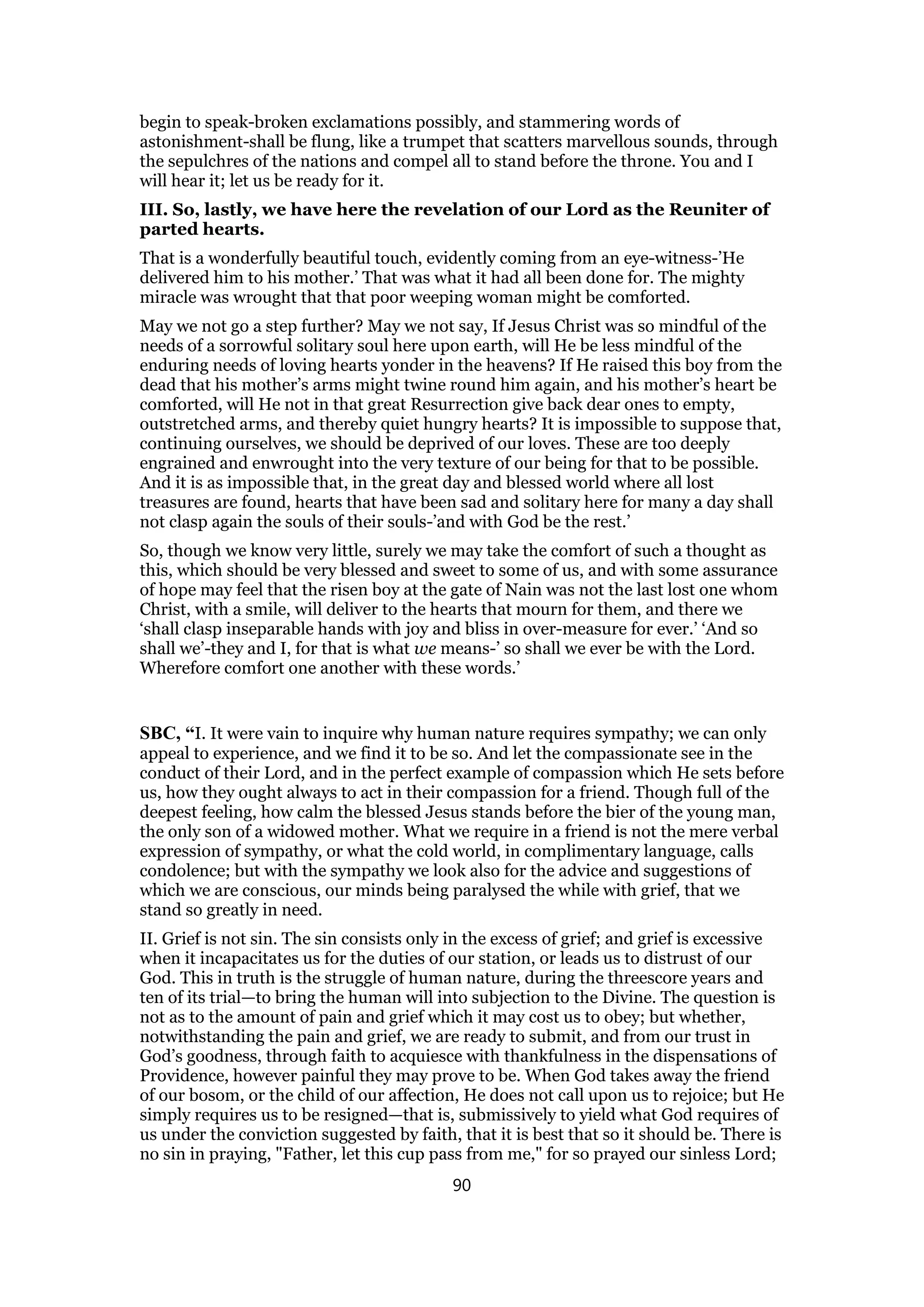

![forbidden to put on their sandals, lest the latchet of any one of them should fail, and
should be found to hinder him doing his duty.''
And elsewhere it is said (g),
"the bearers of the bed, or bier, and their deputies, and their deputies' deputies, both
before the bier and after it, find whoever the bier stood in need of, were free;''
i.e. from reading the Shema, or, "hear, O Israel", &c. and from prayer: the reason of
their having so many bearers was, because they carried the dead a great way to be
buried. King Herod was carried after this manner two hundred furlongs from
Jerusalem, to the castle of Herodion (h):
and he said, young man, I say unto thee, arise. The Ethiopic version adds,
"and he arose": Christ spoke as one that had the keys of death and the grave; and
divine power went along with his words, which raised the dead man to life; and full
proof this is of the true and proper deity of Christ.
HENRY, "(2.) See how triumphant his commands are over even death itself
(Luk_7:14): He came, and touched the bier, or coffin, in or upon which the dead
body lay; for to him it would be no pollution. Hereby he intimated to the bearers that
they should not proceed; he had something to say to the dead young man. Deliver
him from going down to the pit; I have found a ransom, Job_33:24. Hereupon they
that bore him stood still, and probably let down the bier from their shoulders to the
ground, and opened the coffin, it if was closed up; and then with solemnity, as one
that had authority, and to whom belonged the issues from death, he said, Young
man, I say unto thee, Arise. The young man was dead, and could not arise by any
power of his own (no more can those that are spiritually dead in trespasses and sins);
yet it was no absurdity at all for Christ to bid him arise, when a power went along
with that word to put life into him. The gospel call to all people, to young people
particularly, is, “Arise, arise from the dead, and Christ shall give you light and life.”
JAMISON, "What mingled majesty and grace shines in this scene! The
Resurrection and the Life in human flesh, with a word of command, bringing back
life to the dead body; Incarnate Compassion summoning its absolute power to dry a
widow’s tears!
CALVIN, "14.Young man, I say to thee. By this word Christ proved the truth of
the saying of Paul, that God calleth those things which are not, as they were,
(Romans 4:17.) He addresses the dead man, and makes himself be heard, so that
death is suddenly changed into life. We have here, in the first place, a striking
emblem of the future resurrection, as Ezekiel is commanded to say, O ye dry
bones, hear the word of the Lord, [Ezekiel 37:4.] Secondly, we are taught in what
manner Christ quickens us spiritually by faith. It is when he infuses into his
word a secret power, so that it enters into dead souls, as he himself declares,
The hour cometh, when the dead shall hear the voice of
the Son of God, and they who hear shall live, (John 5:25.)
CONSTABLE, "The "coffin" (Gr. sorou) was a litter that carried the shrouded
corpse. By touching it Jesus expressed His compassion, but His act also rendered
92](https://image.slidesharecdn.com/luke7commentary-151222193000/75/Luke-7-commentary-92-2048.jpg)
![Him ritually unclean (Numbers 19:11; Numbers 19:16). Probably His action told
the bearers that He wanted to do something. So they stopped. Undoubtedly the
residents of Nain knew Jesus, and His reputation was probably another reason
they stopped. This was the first time Jesus restored to life someone who had died,
according to the Gospel records. Again the simple but powerful word of "the
Lord" proved sufficient to effect the miracle.
SIMEON, "THE WIDOW’S SON RAISED
Luke 7:14-16. And he came and touched the bier: and they that bare him stood
still. And he said, Young man, I say unto thee, Arise. And he that was dead sat
up, and began to speak. And he delivered him to his mother. And there came a
fear on all: and they glorified God, saying, That a great prophet is risen up
among us; and, That God hath visited his people.
THE more faithful any servant of God is, the more he will abound in labours. Of
those who were men of like passions with us, none ever equalled St. Paul; but our
blessed Lord far exceeded all the children of men. No day elapsed without fresh
manifestations of his power and compassion. He had on the preceding day raised
the Centurion’s servant from a bed of sickness; now we behold him employed in
restoring a dead man to life. We shall consider,
I. The miracle—
The Jews used to bury their dead without the precincts of their cities. At the gate
of the city of Nain Jesus met a funeral procession: the principal mourner tnat
followed it engaged his attention—
[She was a mother following her own son to the grave. How afflictive is such an
event to a tender parent! This son had grown up to the estate of manhood. We
may see in David’s lamentations for Absalom what an affliction this is! Her loss
was further aggravated in that this was her only child. If one out of many had
died, she would have been deeply grieved: how much more in losing him, in
whom her affections had so long centered! That which added ten-fold poignancy
to her sorrow was, that she was a widow. When her husband had died she had
been consoled by her surviving child; but now she had none left to be the support
and comfort of declining years. Destroyed both root and branch, she had no
prospect but that her name would be extinct in Israel.]
Filled with compassion he wrought a miracle on her behalf—
[Jesus, addressing himself to the mourning widow, bade her not weep. How vain,
how impertinent had such advice been, if given by a common man! But, from
him, it came as a rich cordial to her fainting spirit. He then stopped the
procession, and said to the dead man, Arise. Nor were the hopes, occasioned by
his interference, disappointed. On other occasions he wrought his miracles at the
request of others [Note: Intercession was made for Jairus’s daughter, by her own
father; for the Centurion’s servant, by his friends; for the paralytic, by his
neighbours; but none besought him for this distressed widow.]. This he
93](https://image.slidesharecdn.com/luke7commentary-151222193000/75/Luke-7-commentary-93-2048.jpg)
![performed spontaneously, and unsolicited by any. Nothing moved him to it but
that very compassion which brought him down from heaven: nor did he exercise
this power in the name of another [Note: Elijah and Elisha obtained this power
by prayer, 1 Kings17:21. 2 Kings 4:33.; and Peter wrought his miracles in the
name of Jesus, Acts 3:6; Acts 9:34.]. He spake authoritatively, as one who could
quicken whom he would [Note: John 5:21.]: nor did he merely recall the soul
without renovating the body [Note: 2 Kings 4:34-35.]; the restoration to life and
vigour was effected perfectly, and in an instant [Note: “He sat up, and began to
speak.”]. To complete the mercy, “he delivered the man to his mother;” and
preferred the comfort of the widow to the honour he himself might have gained
in retaining such a follower.]
Such a stupendous miracle could not fail of exciting suitable emotions—
II. The effect it produced—
There is little in the Scriptures to gratify our curiosity. Hence we are not told
what the man spake, or how the mother was affected at the first interview with
her son; but, if once she forgat her pangs, for joy that he was born, how much
more her sorrows now, that he was restored to life? Doubtless the scene must
have been inexpressibly interesting—
[We may conceive Jesus, meekly majestic, delivering the man to his mother: but
it is not so easy to conceive the first emotions of their minds. Nature would
stimulate the reunited relatives to expressions of mutual endearment. Grace, on
the other hand, would rather lead them first to admire and adore their
Benefactor. Perhaps, looking alternately on Jesus and on each other, they might
stand fixed in silent astonishment. We need not however dwell on that which, at
best, is mere conjecture.]
The effect produced on the multitude is recorded for our instruction—
1. They were all filled with fear—
[The people that attended Jesus, and those who followed the funeral, meeting
together, the concourse was very great; and one impression pervaded the whole
body. The fear which came upon them was a reverential awe: this is natural to
man, when he beholds any signal appearance of the Deity. It is equally produced
whether God appear in a way of judgment or of mercy [Note: Compare Acts 5:11
and Luke 1:65.]. Somewhat of this kind is felt by the seraphim before the throne
[Note: Isaiah 6:2.]: and it would be more experienced by us, if we realized more
the Divine presence [Note: Jeremiah 10:6-7.]. When it is excited only by some
visible display of the Deity, it will generally vanish with the occasion; but when it
is caused by faith, it will abide and influence our whole conduct. Happy would it
be for us if we were continually thus impressed [Note: Proverbs 28:14.].]
2. They glorified God—
[They did not know that Jesus was indeed a divine person; but they manifestly
94](https://image.slidesharecdn.com/luke7commentary-151222193000/75/Luke-7-commentary-94-2048.jpg)
![saw that he was “a great prophet,” and that God, after suspending all
miraculous interpositions for above three hundred years, had again “visited his
people.” In these tokens of God’s favour they could not but rejoice. Doubtless
they congratulated each other on this glorious event, and gave vent to their
gratitude in devoutest adorations. We have reason indeed to fear that these
impressions were soon effaced. Happy had they been if they had retained this
heavenly disposition; but who has not reason to regret, that mercies produce too
transient an effect upon his mind? Let us at least profit by the example they then
set us, and labour to “glorify God” for the inestimable mercies he has conferred
upon us.]
Improvement—
1. This history may teach us to sit loose to the things of
this life—
[If we possess personal and family mercies, let us be thankful for them. The
continuance of them is no less a favour than the restoration of them would be:
but let us not inordinately fix our affections upon any created good. We know
not how soon our dearest comforts may become the occasion of our deepest
sorrows. The case of Job affords a striking admonition to men in all ages [Note:
Job 1:13-19.]. Let us then endeavour to practise that advice of the Apostle [Note:
1 Corinthians 7:29-31.], and place our affections on those things which will never
be taken from us [Note: Colossians 3:2.].]
2. It shews us whither we should flee in a season of deep
affliction—
[As no physician could restore the widow’s son, so none could heal her wounded
spirit; but there was one at hand, when she little thought of it, that could do
both. That same Almighty Deliverer is very nigh unto us, and calls us to him-self
when we are bowed down with trouble [Note: Psalms 50:15. Matthew 11:28.].
Let us then call upon him under every spiritual or temporal affliction, and,
above all, under the guilt and burthen of our sins — — —. And, with a
conviction of his all-sufficiency, let us say with Peter [Note: John 6:68-69.]—]
3. We may take occasion from it to bless God for the
preached Gospel—
[The word of Christ is as powerful now in his Gospel as ever it was in the days of
his flesh. It quickens many who were dead in trespasses and sins: it rescues them
from the second death, and awakens them to an eternal life. How many have seen
the souls, over which they had long mourned, called forth to life by the almighty
voice of Jesus!. Let the whole multitude of us then “fear the Lord and his
goodness [Note: Hosea 3:5.]?.” Let us “glorify him” for sending us such an
adorable Saviour: and let us seek, both for ourselves and others, fresh displays of
his power and grace.]
95](https://image.slidesharecdn.com/luke7commentary-151222193000/75/Luke-7-commentary-95-2048.jpg)
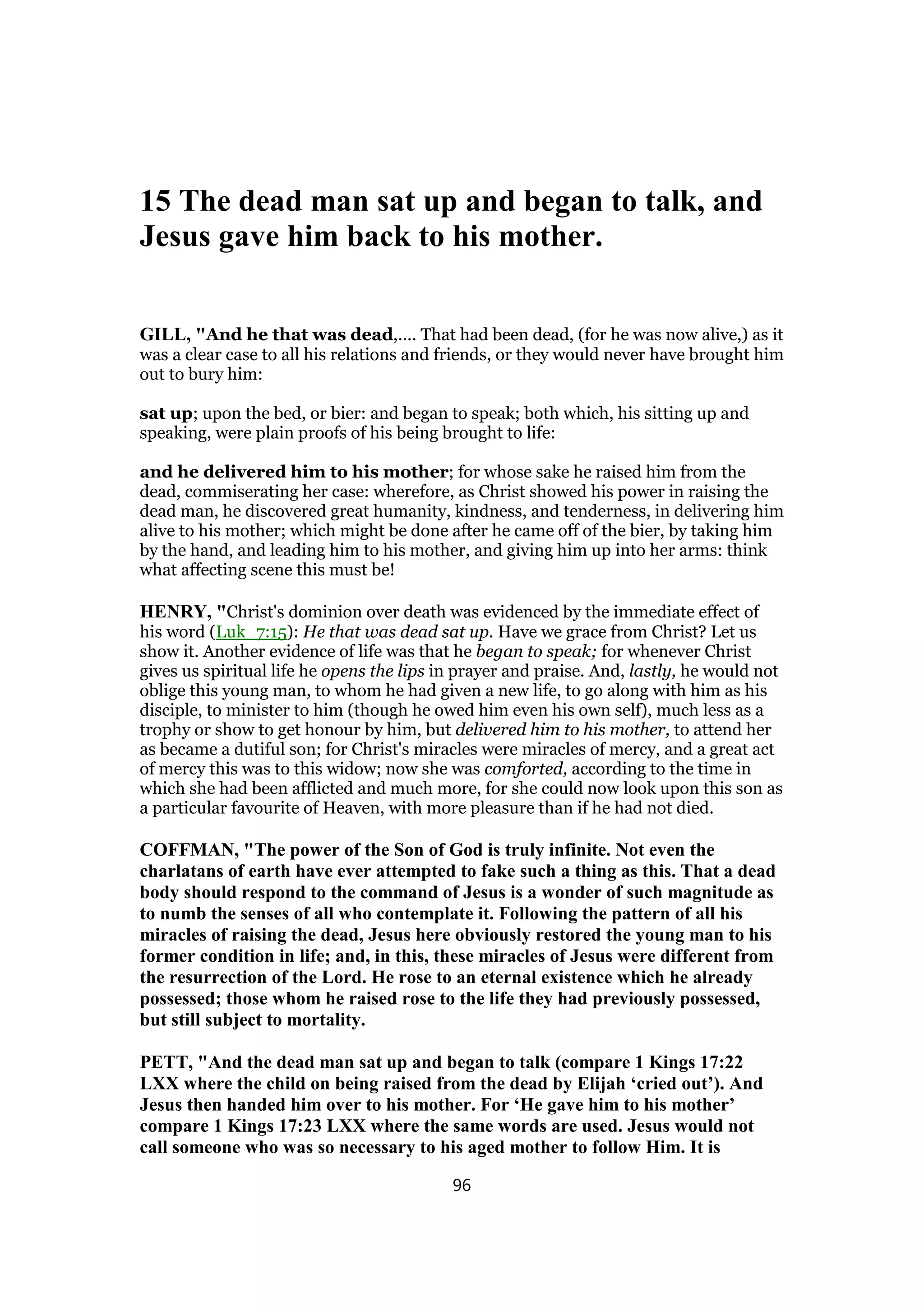


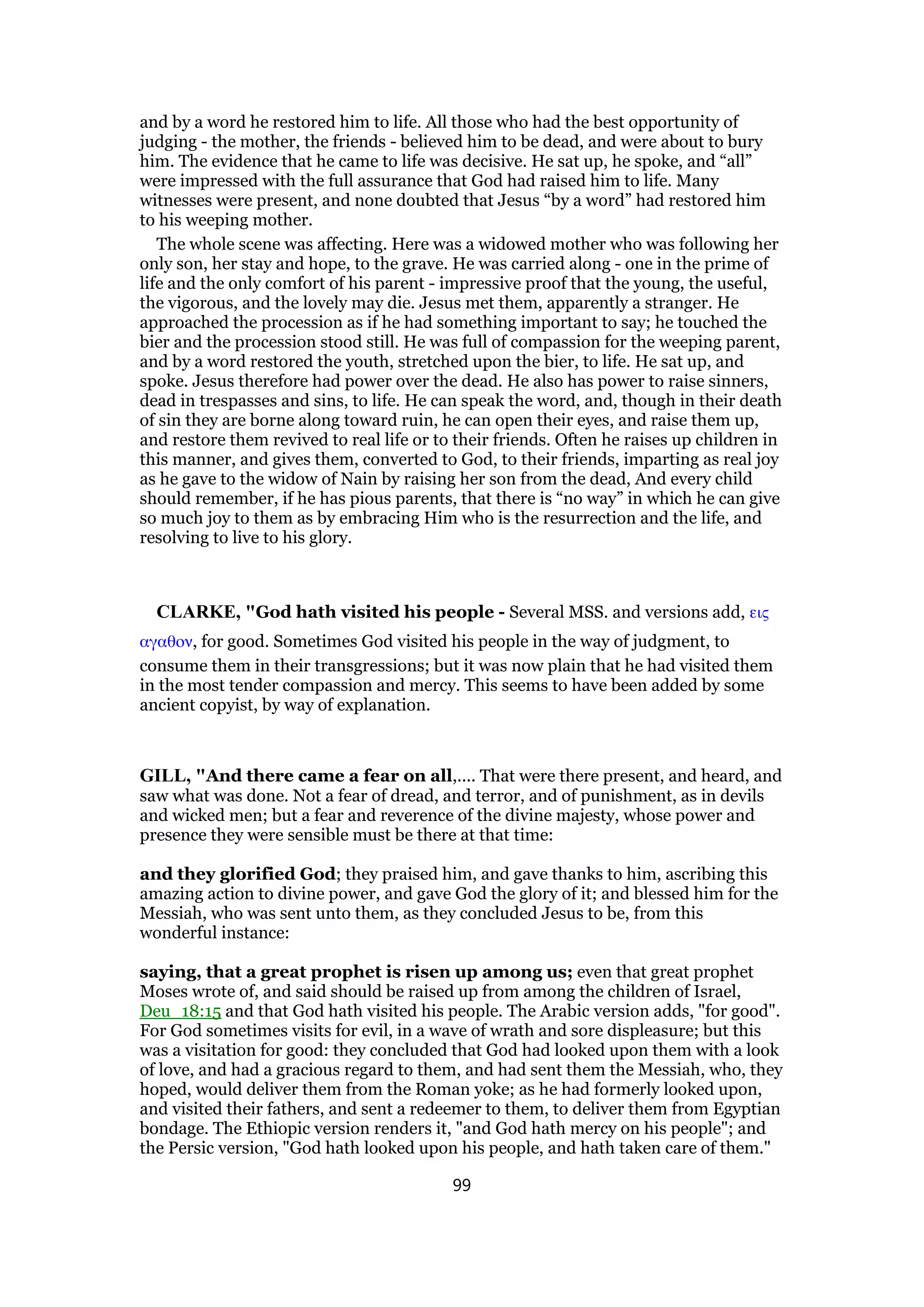
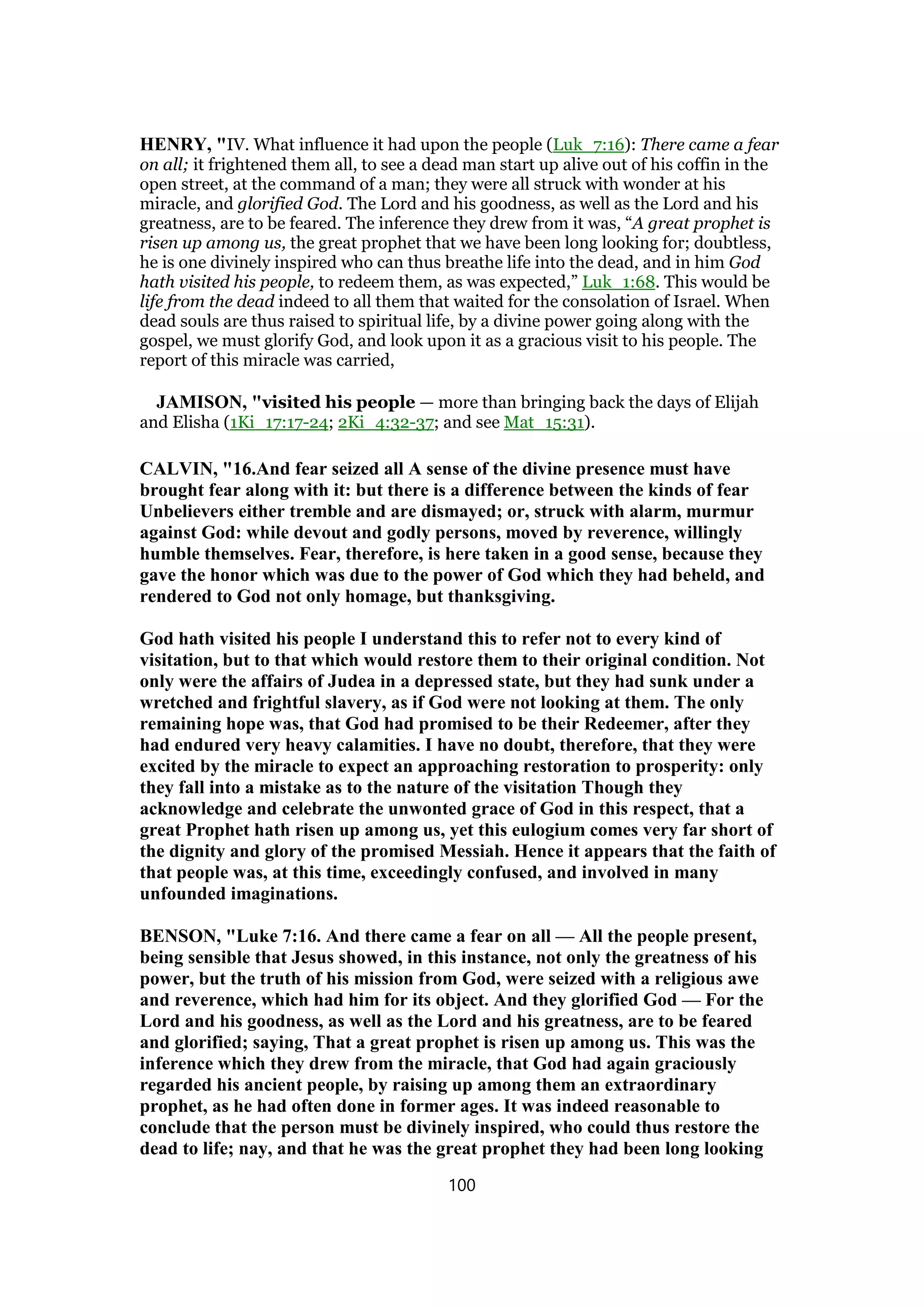

![17 This news about Jesus spread throughout
Judea and the surrounding country.
GILL, "And this rumour of him,.... Or the report of this surprising miracle in
raising a dead man to life, that was carrying to his grave,
went forth throughout all Judea, and throughout all the region round
about; not only Judea, and the several cities, towns, and villages in it, but all the
country round about it, especially Galilee. The Persic version reads, "all countries
which are round about Jordan"; see Mat_3:5.
HENRY, ". In general, all the country over (Luk_7:17): This rumour of him, that
he was the great prophet, went forth upon the wings of fame through all Judea,
which lay a great way off, and throughout all Galilee, which was the region round
about. Most had this notice of him, yet few believed in him, and gave up themselves
to him. Many have the rumour of Christ's gospel in their ears that have not the
savour and relish of it in their souls. 2. In particular, it was carefully brought to John
Baptist, who was now in prison (Luk_7:18): His disciples came, and gave him an
account of all things, that he might know that though he was bound yet the word of
the Lord was not bound; God's work was going on, though he was laid aside.
COFFMAN, "The whole of Judaea ... is inclusive of the entire domain of the
Herods (Antipas and Agrippa I) with "all the region round about," thus having
reference to the whole of what is today called Palestine. There is no way for men
to stretch their minds to fully comprehend the impact of such a miracle as Jesus
performed, shocking the entire eastern half of the Roman empire.
Nor should it be left unnoticed that this miracle was wrought within a very few
miles of Nazareth, whose citizens refused to believe in Jesus. This miracle was
close enough that they could not have avoided knowing it happened; and thus
Jesus gave his home village another chance to believe on him whom they had
despised.
There is a progression in the New Testament resurrections. The daughter of
Jairus had been dead but a little while; this son of the widow was dead a longer
period, the body being carried to the tomb; and Lazarus was dead and buried
four days! All of the resurrections Jesus wrought (except his own) have this in
common, that no word has come down to posterity of what any of them said
concerning the state of death from which they were rescued. As Taylor said,
"They uttered no word concerning the state from which they had been recalled.
It was not theirs to bring light and immortality to light."[17]; THAT was
102](https://image.slidesharecdn.com/luke7commentary-151222193000/75/Luke-7-commentary-102-2048.jpg)
![reserved for Christ.
ENDNOTE:
[17] William M. Taylor, op. cit., p. 182.
PETT, "Verse 17-18
‘And this word went forth concerning him in the whole of Judaea, and all the
region round about, and the disciples of John told him of all these things.’
So the word of what He was doing, and especially of the raising of the dead,
spread around the whole of Palestine (Judaea in its widest sense) and even
beyond. And by means of his disciples it reached John in prison.
Note Luke’s continual emphasis on this spreading of the word (which will be
repeated regularly in Acts). After the exorcism in the synagogue at Capernaum,
'word about him was going out to every place in the surrounding region' (Luke
4:37). After the healing of the leper, 'so much the more the word went abroad
concerning Him' (Luke 5:15). Following this the Pharisees and teachers of the
Law were present 'from every village of Galilee and Judaea and from Jerusalem'
(Luke 5:17). And this is surpassed in Luke 6:17-18, where we hear of 'a great
multitude of the people from all Judaea (the land of the Jews) and Jerusalem and
the seacoast of Tyre and Sidon, who came to hear him and be healed.' And now
we are told that 'And this word about Him went out in the all the land of the
Jews and in all the neighbouring region.’ The news is spreading widely and
rapidly.
John the Baptiser Sends An Appeal To Jesus (7:17-23).
Meanwhile, while all this was going on, John the Baptiser was languishing in
prison. But he was regularly being visited by some of his brave disciples, and
heard reports of what was going on and what was being said.
It is clear, however that he was puzzled. Why was something not happening?
Surely if Jesus was God’s Coming One now was the time to act. Why was He
hesitating? Perhaps he thought in terms of an insurrection and the deliverance of
the people from the tyranny of Rome and Herod, but if so the idea had never
appeared in his preaching, and so it must be doubtful. Probably he rather
expected that he would face up to the authorities with signs and wonder of an
awasome kind. That would explain why Jesus answered in the way that He did,
saying to John, ‘There are signs and wonders, but they are acts of compassion,
not of belligerences, for I have come to obtain My way in peace’
We, of course, know the answer tp John’s problesm, for Luke has revealed it to
us. We have just seen the word of Jesus heal a dying man at a distance, and then
raise a man from the dead. We know that Jesus has come to act through His
word. But lying in a cell with nothing to do but think and pray John does not
have our advantage.
103](https://image.slidesharecdn.com/luke7commentary-151222193000/75/Luke-7-commentary-103-2048.jpg)


![multitude of the people from all the Jewish land and Jerusalem and the seacoast
of Tyre and Sidon, who had come to hear him and be healed.' We reach the
climax of this development in Luke 7:17 : 'And this statement about him went
out in the whole Jewish country and all the neighboring region.'" [Note:
Tannehill, 1:85-86.]
In Acts the spread of the news about Jesus would go from Jerusalem to the ends
of the earth (Acts 1:8).
This incident doubtless became the basis for many people concluding that Jesus
was either the fulfillment of the prophecy about Elijah's return (Malachi 4:5-6)
or Elijah himself (Luke 9:8). Hopefully it brought others into saving faith in
Him.
Jesus and John the Baptist
18 John’s disciples told him about all these
things. Calling two of them,
CLARKE, "The disciples of John showed him, etc. - It is very likely that
John’s disciples attended the ministry of our Lord at particular times; and this, we
may suppose, was a common case among the disciples of different Jewish teachers.
Though bigotry existed in its most formidable shape between the Jews and
Samaritans, yet we do not find that it had any place between Jews and Jews, though
they were of different sects, and attached to different teachers.
GILL, "And the disciples of John showed him of all these things. The
miracles that were wrought by Christ; particularly the healing of the centurion's
servant, and the raising from the dead the widow of Naim's son, and what fame and
reputation Christ got every where by his doctrine, and mighty works. John was now
in prison, when these his disciples came and related these things to him; see Mat_
11:2 and they spoke of them, not as commending Christ for them; but as envying,
grieving, and complaining, that he carried away all the honour and glory from John
their master, for whom they had the greatest regard.
HENRY, “In particular, it was carefully brought to John Baptist, who was now in
prison (Luk_7:18): His disciples came, and gave him an account of all things, that he
might know that though he was bound yet the word of the Lord was not bound;
God's work was going on, though he was laid aside.
106](https://image.slidesharecdn.com/luke7commentary-151222193000/75/Luke-7-commentary-106-2048.jpg)


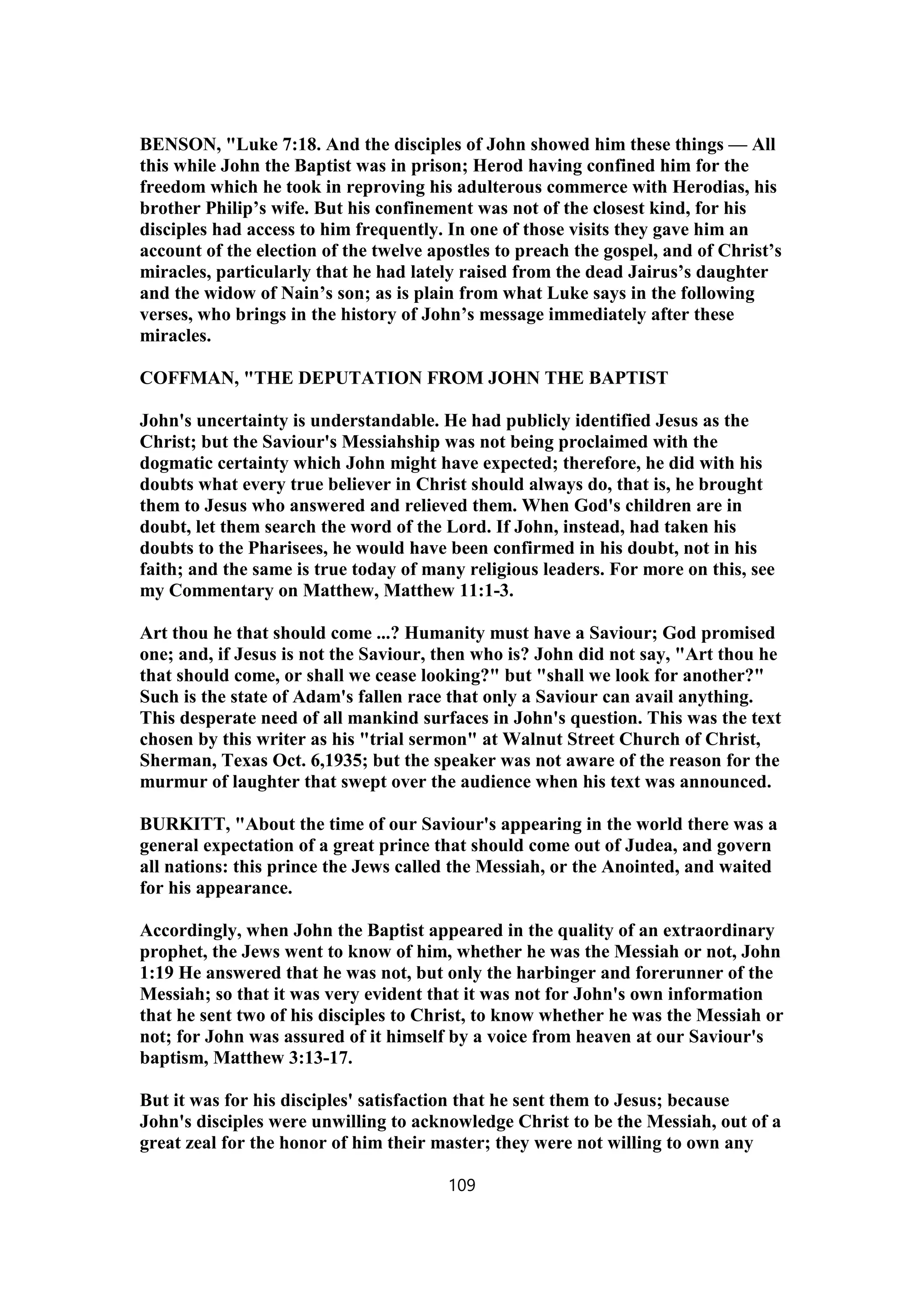
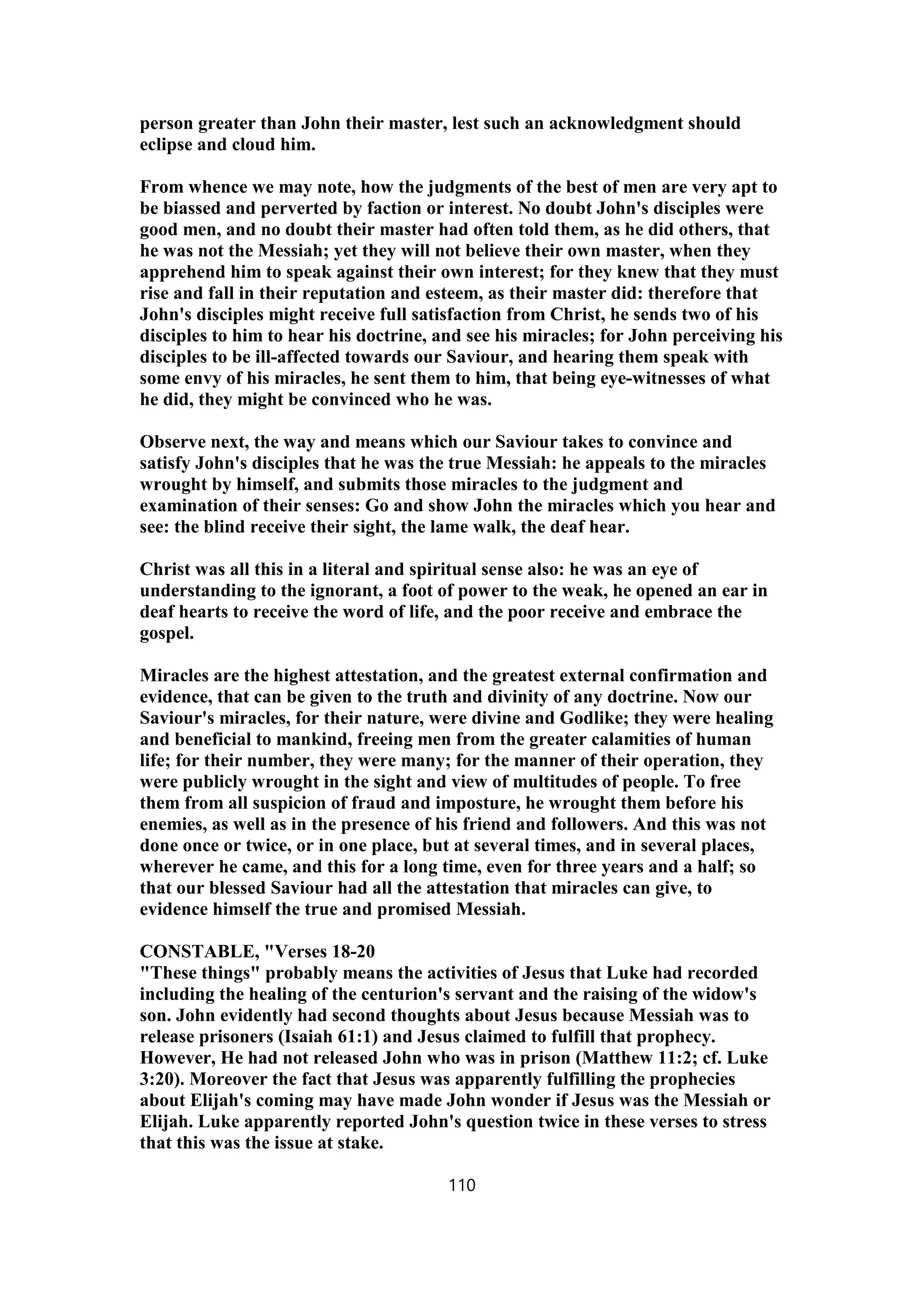
!["Disappointment often calls us to a deeper, less self-focused walk with God."
[Note: Bock, Luke, p. 215. See also Philip Yancey, Disappointment with God.]
CONSTABLE, "3. The confusion about Jesus' identity 7:18-35
It was only natural that these people had questions about who Jesus really was.
Was He a prophet? Was He Elijah? Was He another former prophet? Was He
"the Prophet" that Moses had predicted (Deuteronomy 18:18)? Was He the
Messiah? Was He Immanuel, "God with us" (Isaiah 7:14)? Even John the
Baptist began to have questions. On the one hand Jesus was fulfilling prophecy
that indicated He was the Messiah. He was preaching righteousness, healing the
sick, casting out demons, even raising the dead. However, He was not fulfilling
other Messianic prophecies such as freeing the captives (John was one), judging
Israel's enemies, and restoring the Davidic dynasty to power.
Luke included much about the controversy over Jesus' identity because it
authenticates Jesus' identity and strengthens the confidence of disciples in their
Savior. As witnesses of Jesus Christ, Luke's readers faced many hostile
challengers of Jesus' identity. This section enables disciples to counter these
challenges more effectively.
BI 18-28, “JOHN'S DOUBTS AND CHRIST'S PRAISE
We take three stages in this passage-the pathetic message from the prisoner, Christ’s
double answer to it, and His grand eulogium on John.
I. The message from the prisoner.
Had mists of doubt crept over John’s clear conviction that Jesus was the Messiah?
Some have thought it incredible that the man who had seen the descending dove, and
heard the voice proclaiming ‘This is My beloved Son,’ should ever have wavered. But
surely our own experience of the effect of circumstances and moods on our firmest
beliefs gives us parallels to John’s doubts. A prison would be especially depressing to
the desert-loving Baptist; compelled inaction would fret his spirit; he would be
tempted to think that, if Jesus were indeed the Bridegroom, he might have spared a
thought for the friend of the Bridegroom languishing in Machaerus. Above all, the
kind of works that Jesus was doing did not fill the rôle of the Messiah as he had
conceived it. Where were the winnowing fan, the axe laid to the roots of the trees, the
consuming fire? This gentle friend of publicans and sinners was not what he had
expected the One mightier than himself to be.
Probably his disciples went farther in doubting than he did, but his message was the
expression of his own hesitations, as is suggested by the answer being directed to
him, not to the disciples. It may have also been meant to stir Jesus, if He were indeed
Messiah, to ‘take to Himself His great power.’ But the most natural explanation of it
is that John’s faith was wavering. The tempest made the good ship stagger. But
reeling faith stretched out a hand to Jesus, and sought to steady itself thereby. We
shall not come to much harm if we carry our doubts as to Him to be cleared by
Himself. John’s gloomy prison thoughts may teach us how much our faith may be
affected by externals and by changing tempers of mind, and how lenient, therefore,
should be our judgments of many whose trust may falter when a strain comes. It may
111](https://image.slidesharecdn.com/luke7commentary-151222193000/75/Luke-7-commentary-111-2048.jpg)





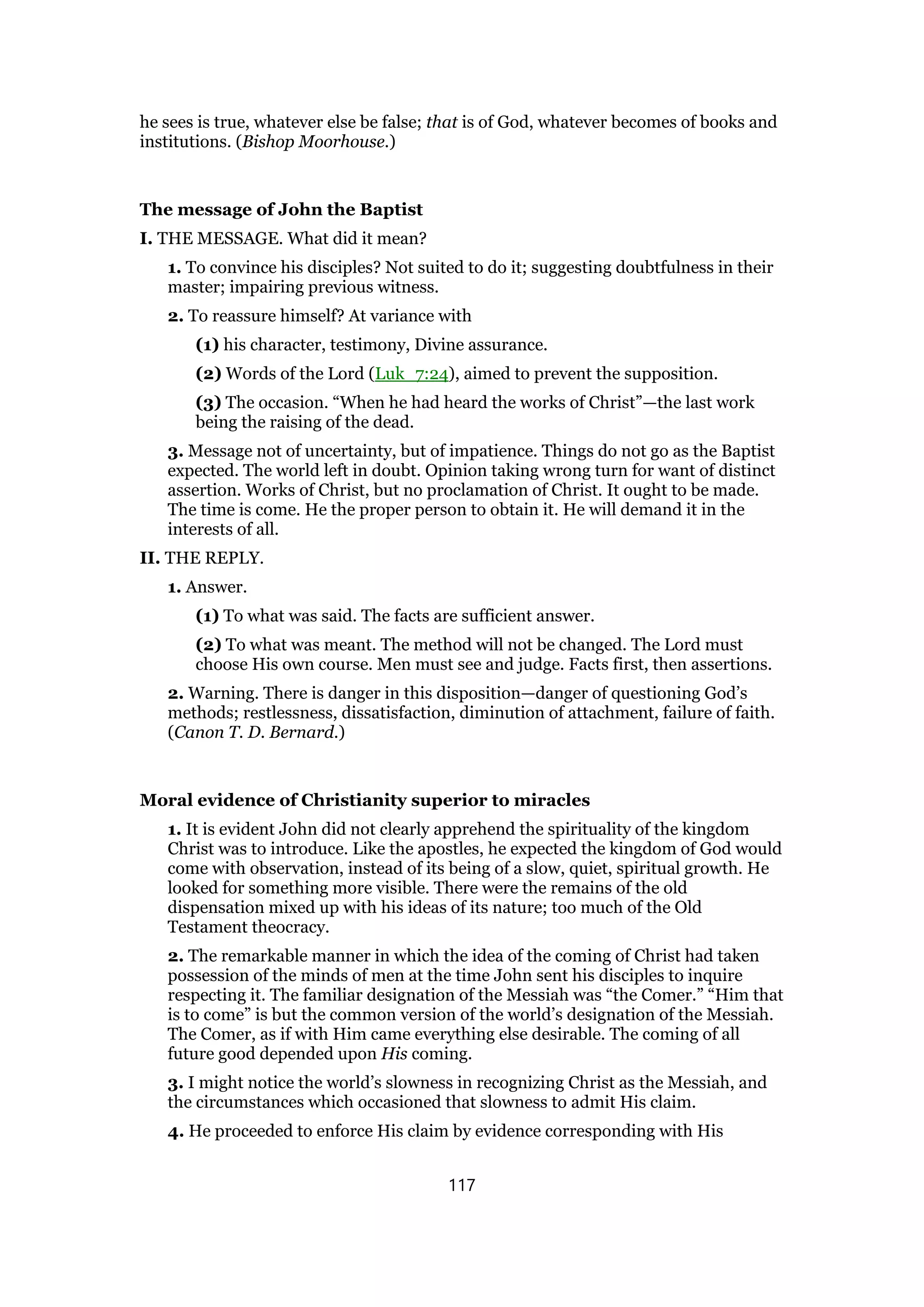

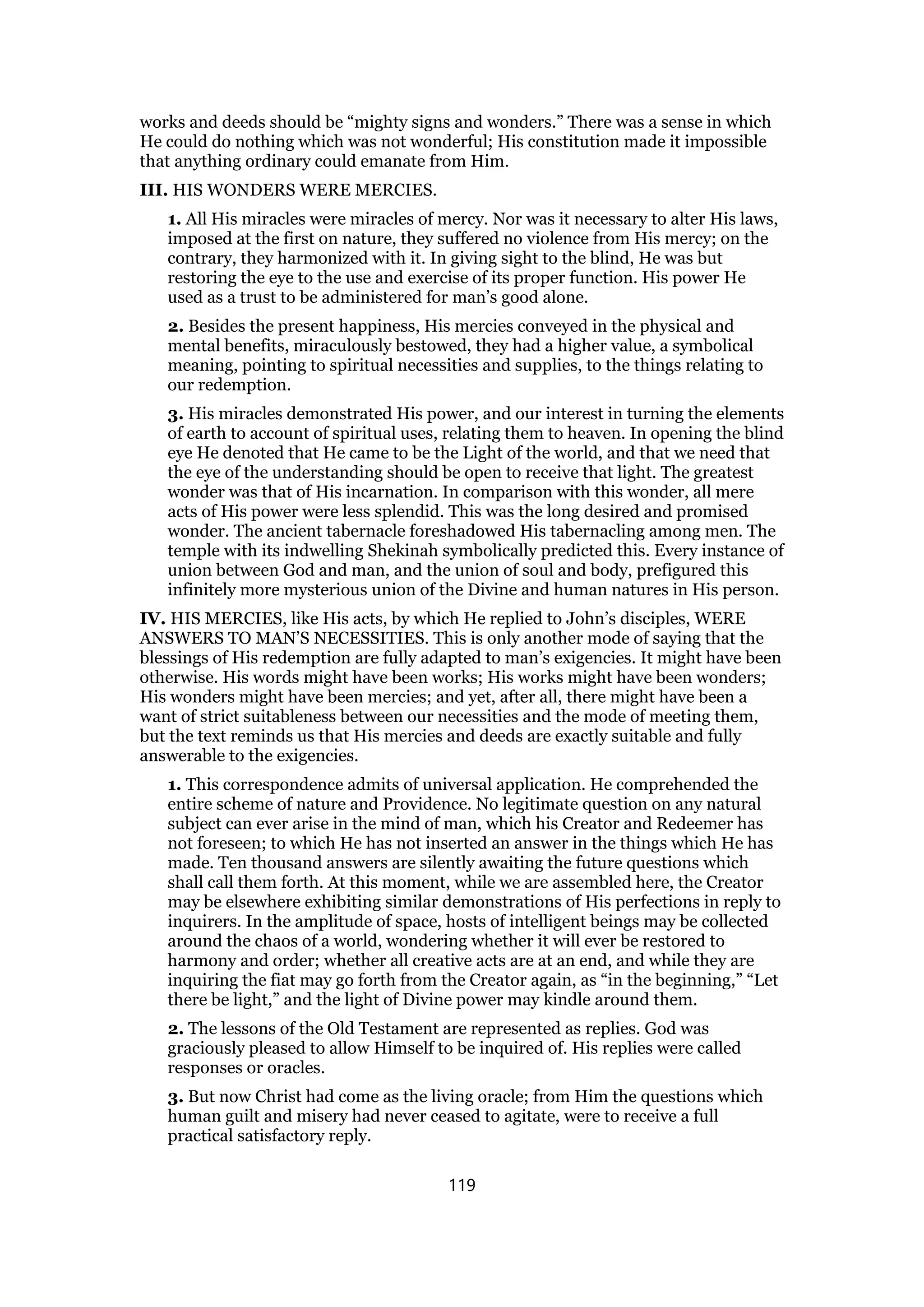

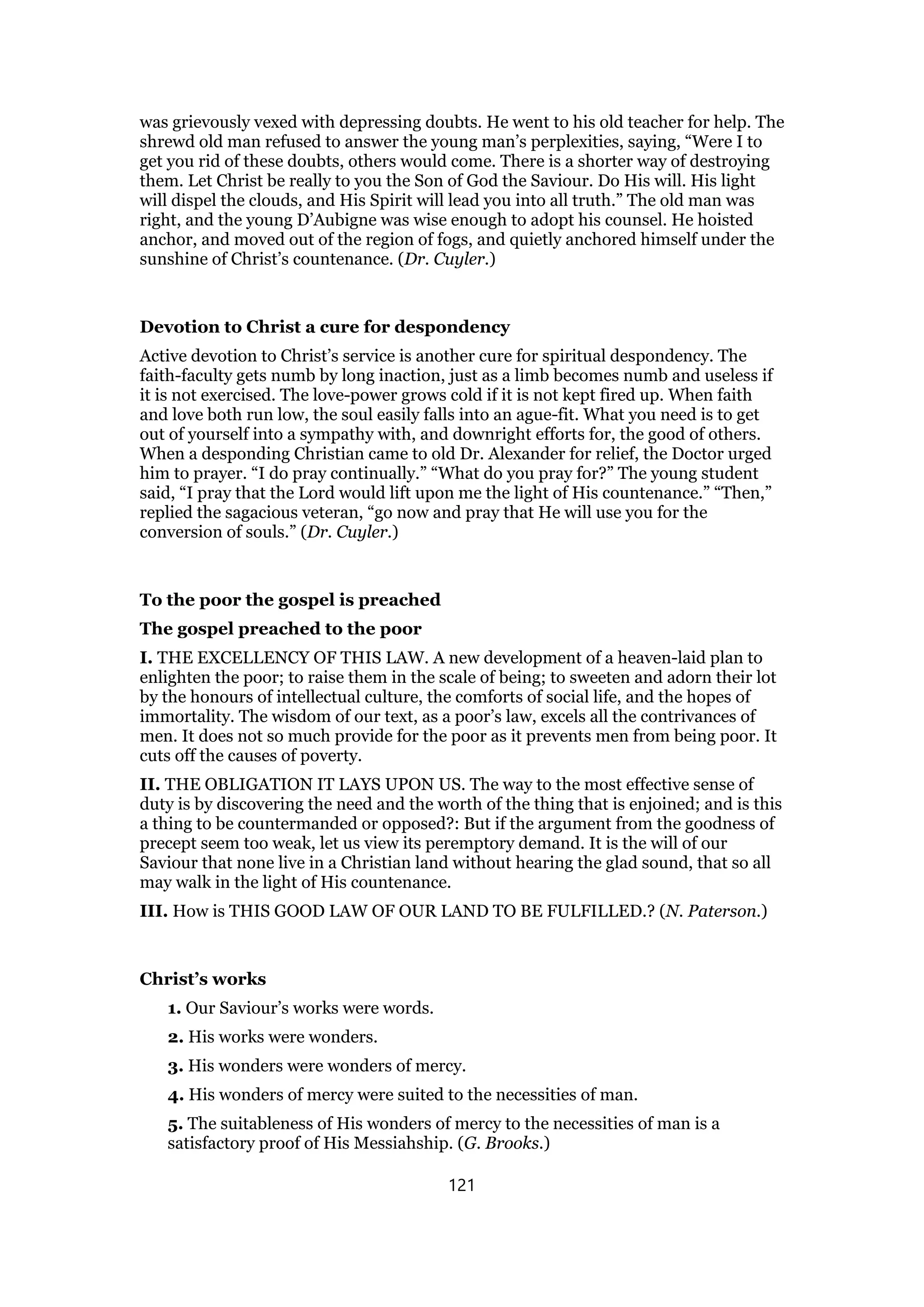
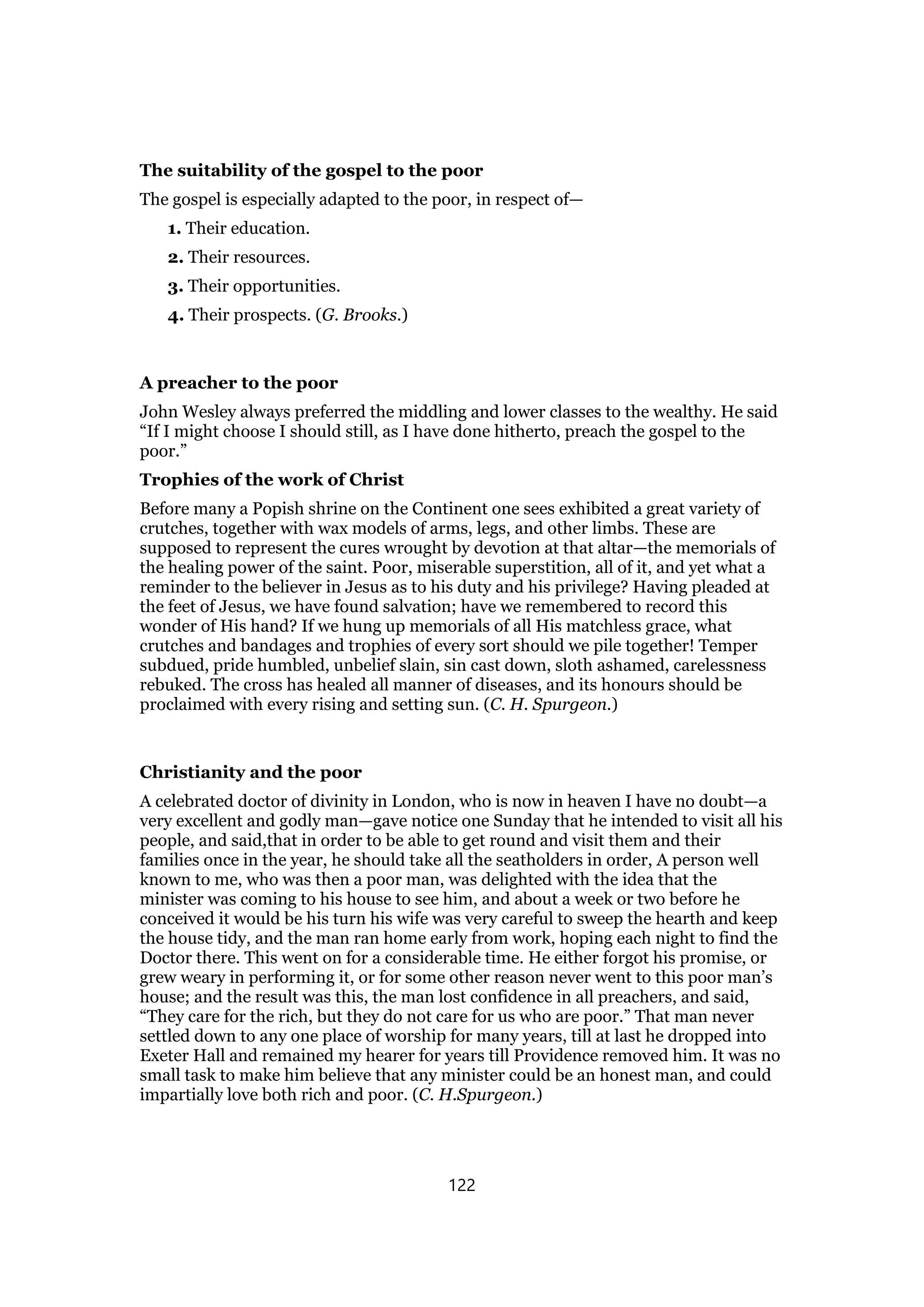
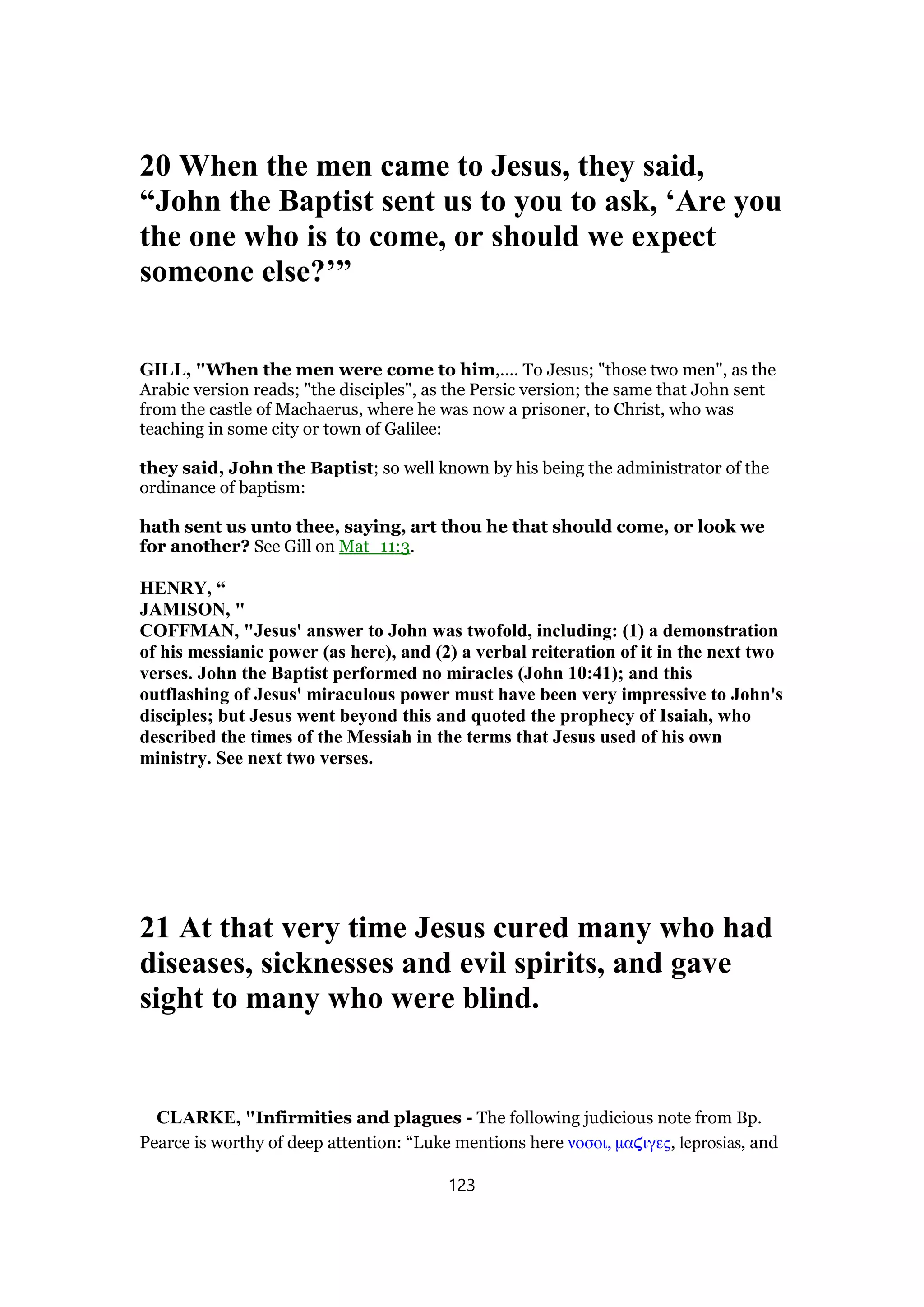
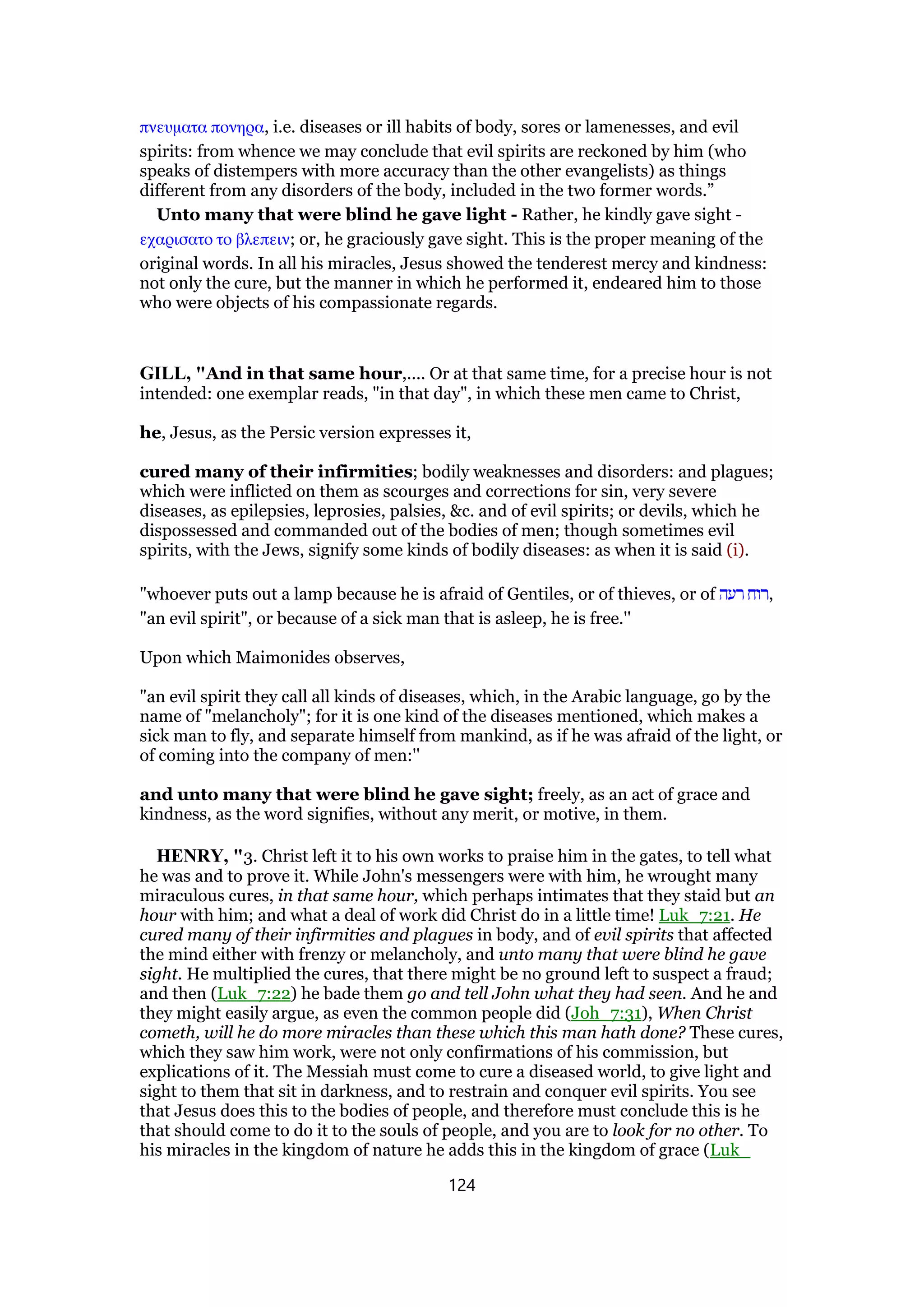
![7:22), To the poor the gospel is preached, which they knew was to be done by the
Messiah; for he was anointed to preach the gospel to the meek (Isa_61:1), and to
save the souls of the poor and needy, Psa_72:13. Judge, therefore, whether you can
look for any other that will more fully answer the characters of the Messiah and the
great intentions of his coming.
CONSTABLE, "Verses 21-23
Luke recorded and Jesus listed several messianic works that He had done (cf.
Isaiah 29:18-19; Isaiah 35:5-6; Isaiah 42:7; Isaiah 61:1). Isaiah did not predict
that Messiah would cleanse lepers. Perhaps Jesus mentioned that because His
ministry fulfilled Elisha's ministry, and he cleansed a leper (cf. 2 Kings 5).
Acts of judgment are conspicuously absent from this list since that was not the
time for judgment. Apparently in Jesus' day the Jews believed that Messiah
would not claim to be the Messiah before He performed many messianic works.
[Note: R. Longenecker, The Christology of Early Jewish Christianity, pp. 71-74.]
Jesus pronounced "blessed" those who accepted the evidence that He presented
and concluded that He was the Messiah rather than stumbling over it. John was
in danger of stumbling, namely, drawing the wrong conclusion and thereby
falling into a trap (Gr. skandalisthe, cf. Isaiah 8:13-14). Stumbling is the opposite
of believing here.
"There is a difference between doubt and unbelief. Doubt is a matter of the
mind: we cannot understand what God is doing or why He is doing it. Unbelief is
a matter of the will: we refuse to believe God's Word and obey what He tells us
to do." [Note: Wiersbe, 1:196-97.]
22 So he replied to the messengers, “Go back
and report to John what you have seen and
heard: The blind receive sight, the lame walk,
those who have leprosy[a] are cleansed, the deaf
hear, the dead are raised, and the good news is
proclaimed to the poor.
GILL, "Then Jesus answering said unto them,.... "To the disciples", as the
Persic; to both, as the Arabic: when he had wrought these cures, he turned himself to
the disciples of John, and made answer to their question. The Vulgate Latin leaves
out the word "Jesus", rendering it, "and he answering"; in the following words:
go your way, and tell John what things ye have seen and heard. They had
125](https://image.slidesharecdn.com/luke7commentary-151222193000/75/Luke-7-commentary-125-2048.jpg)
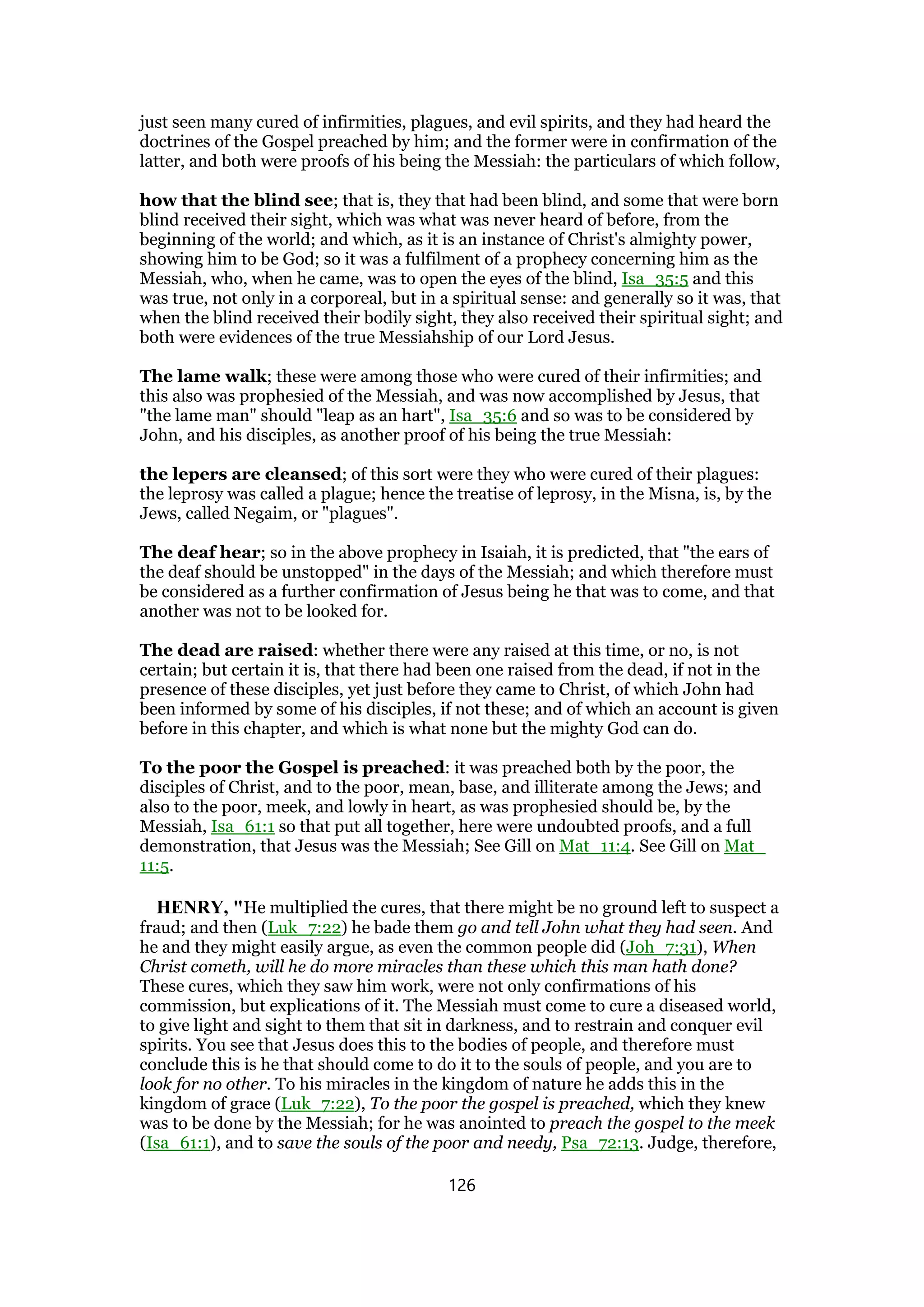
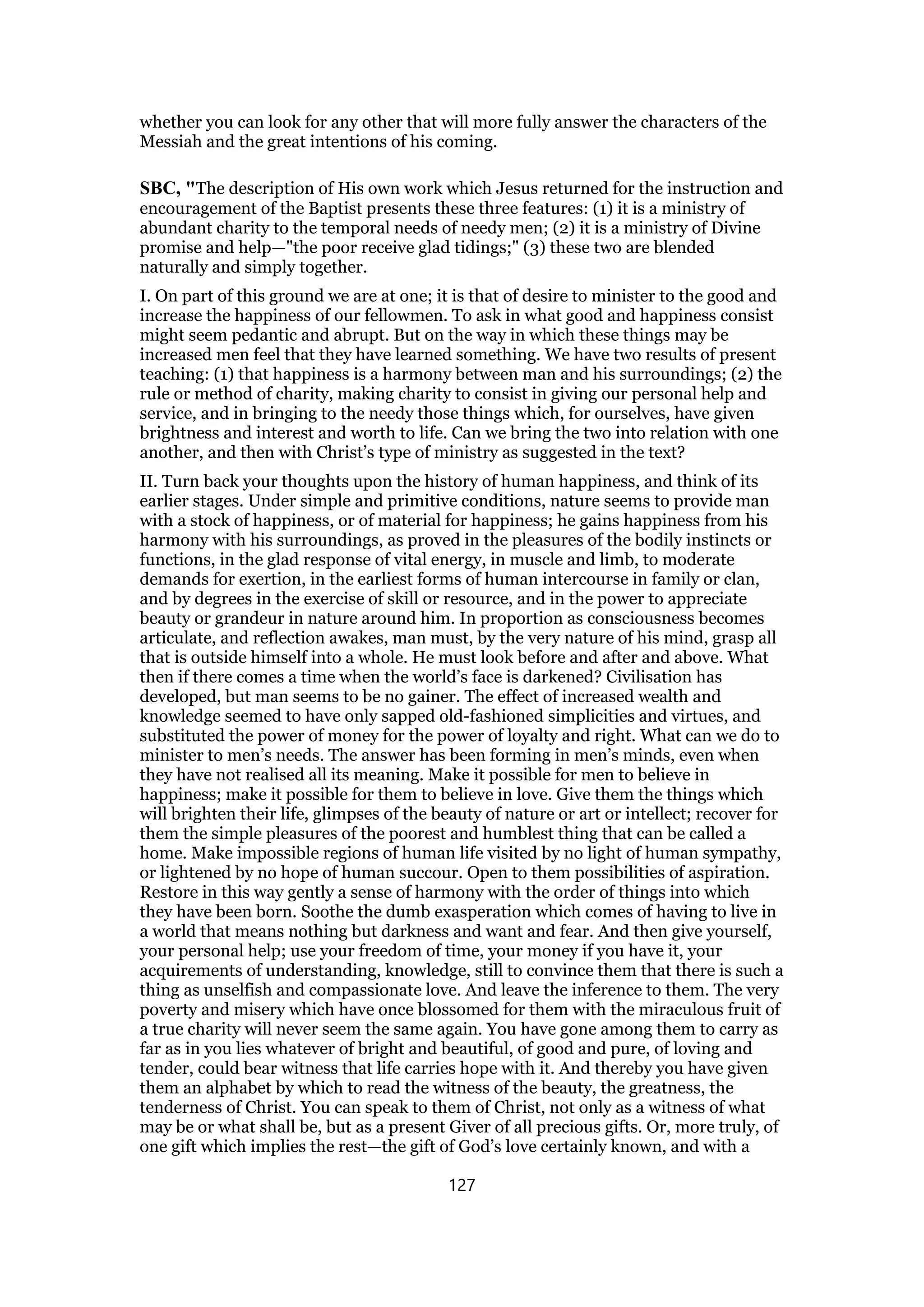
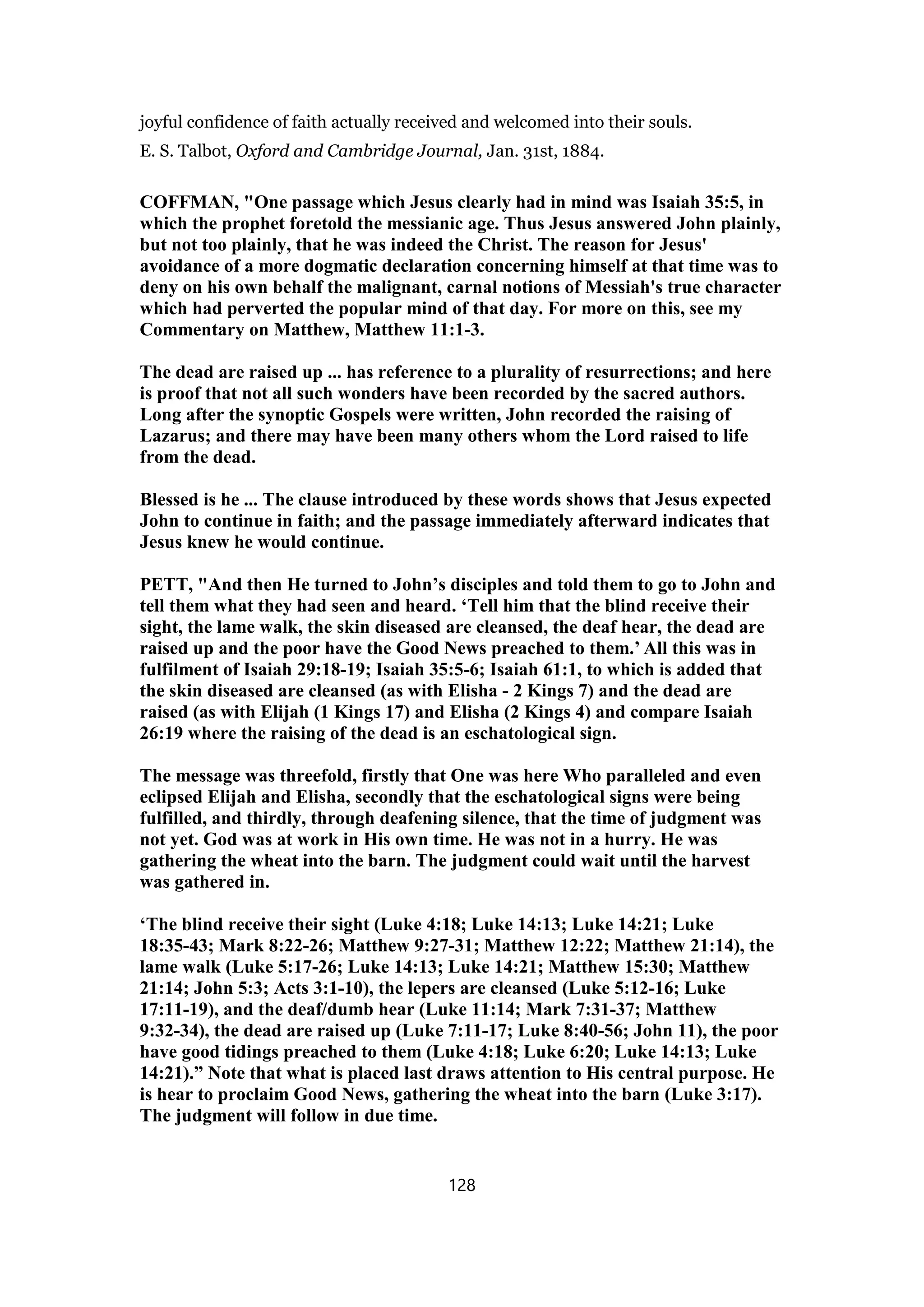

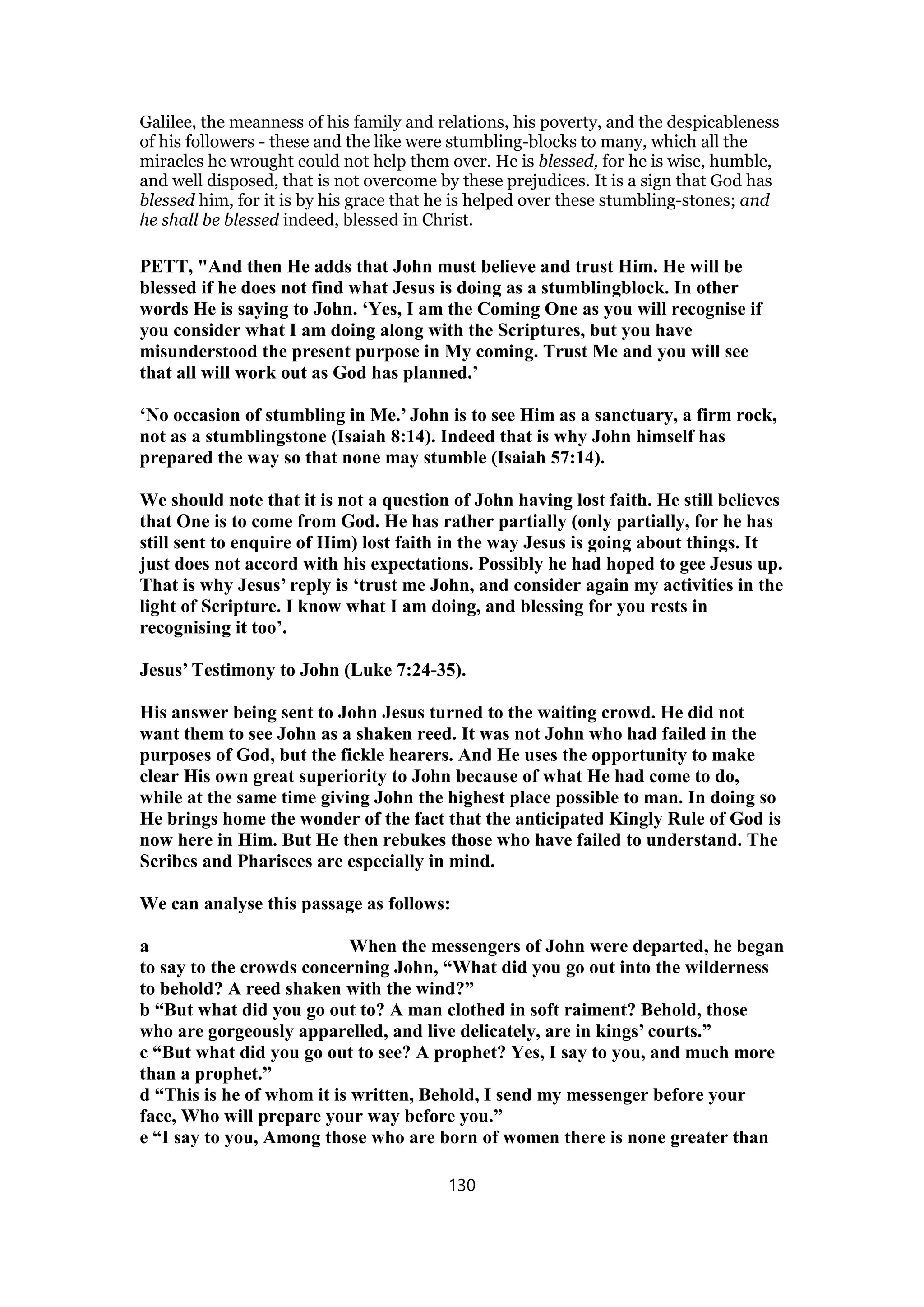


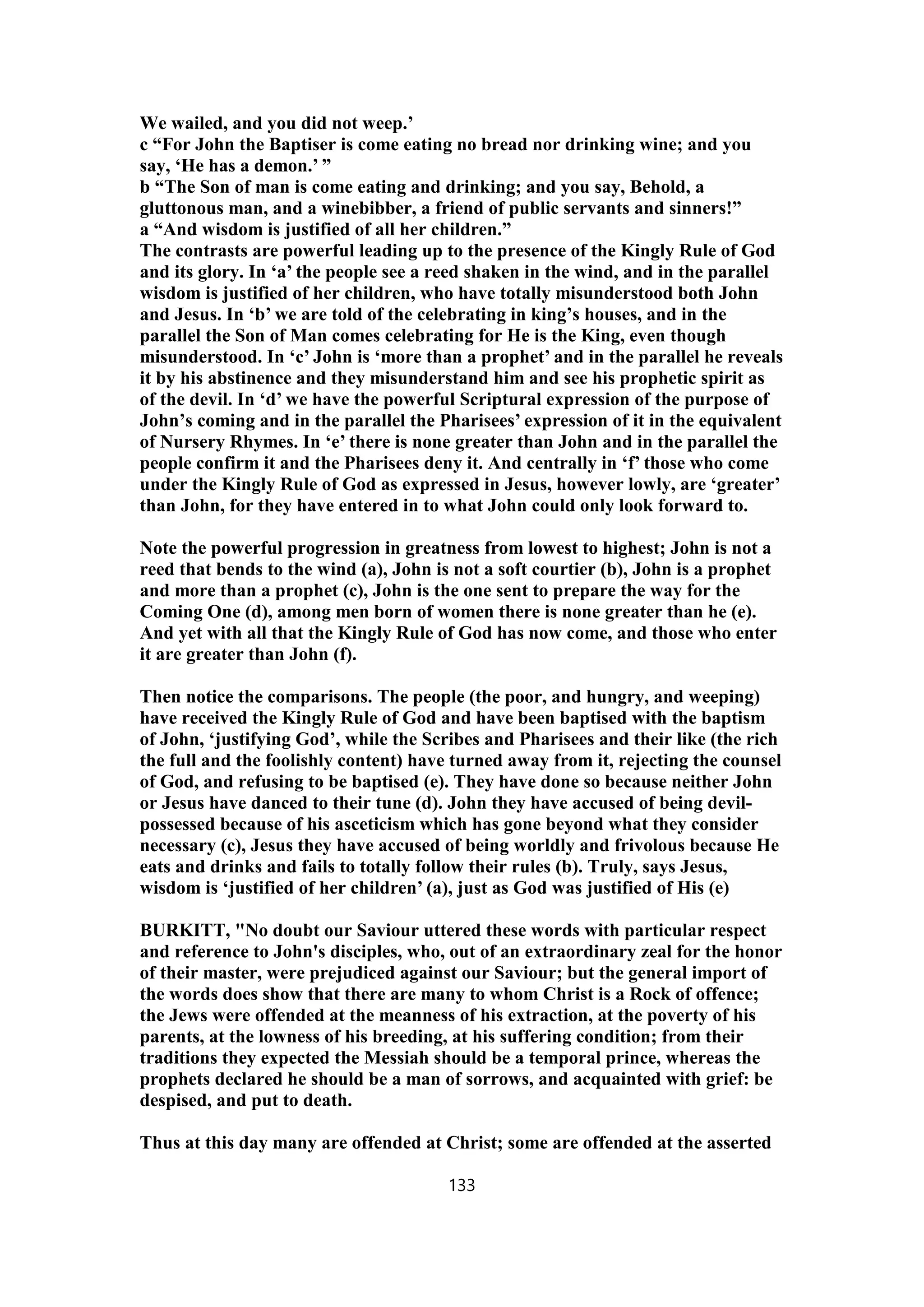

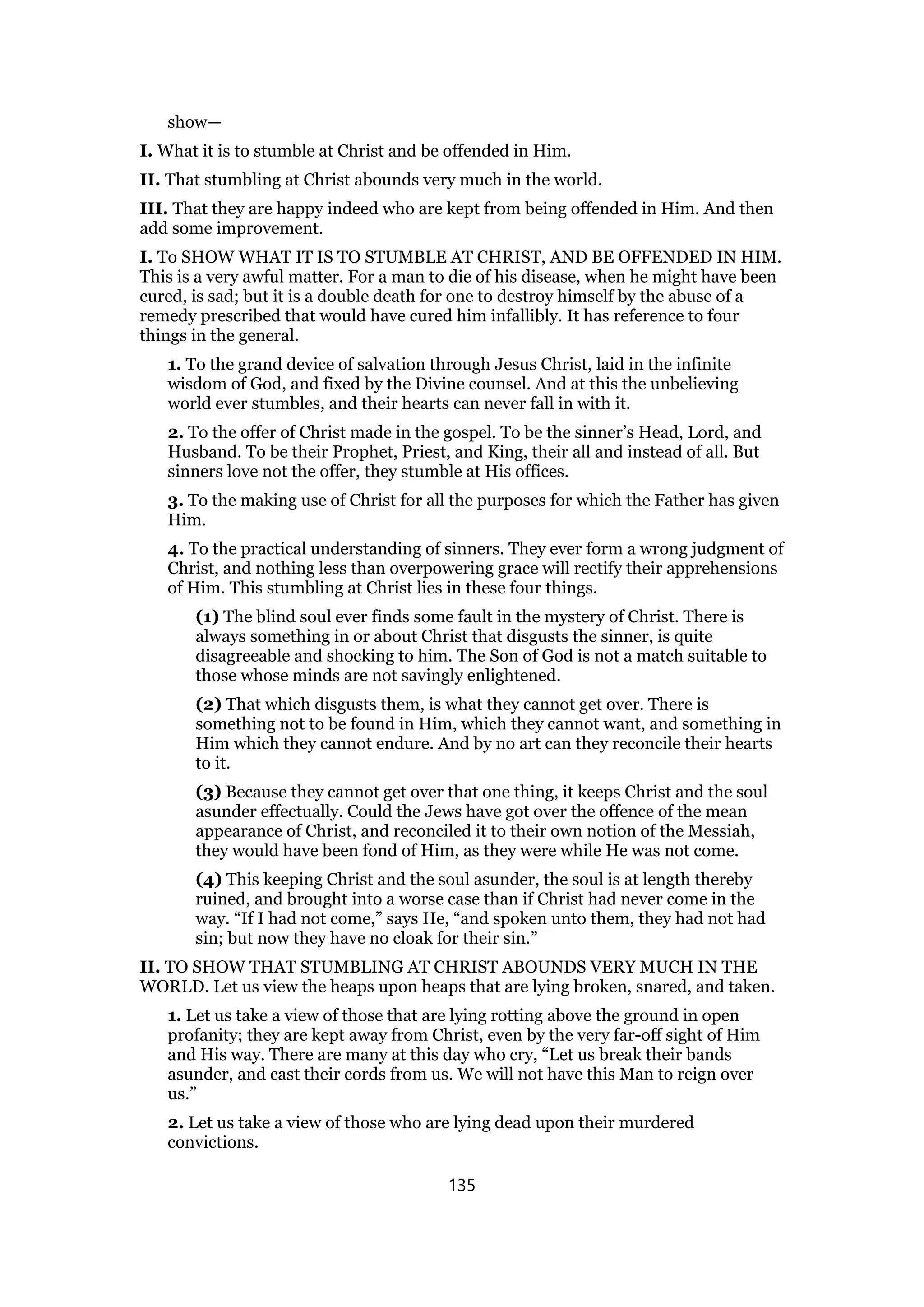
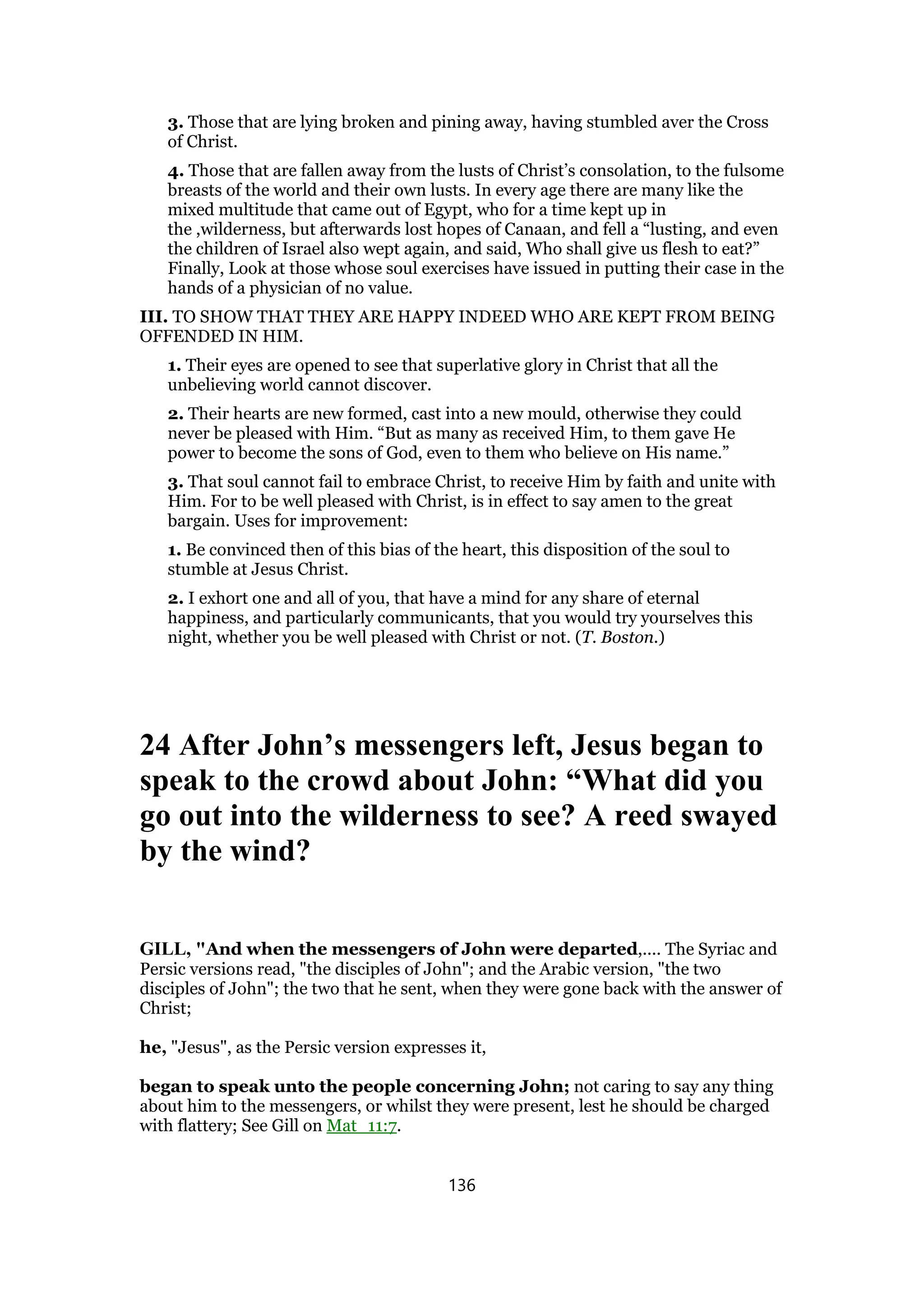

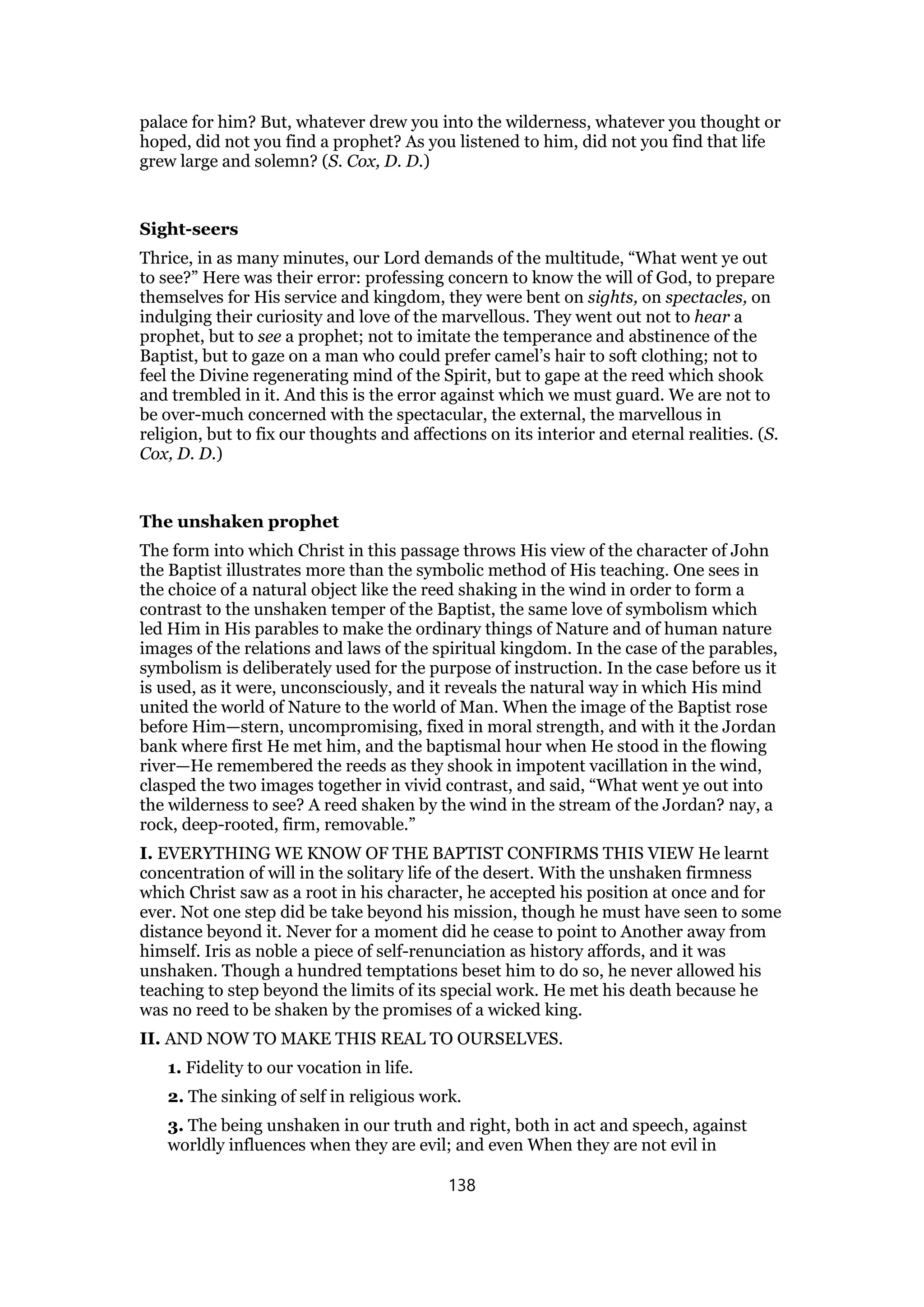
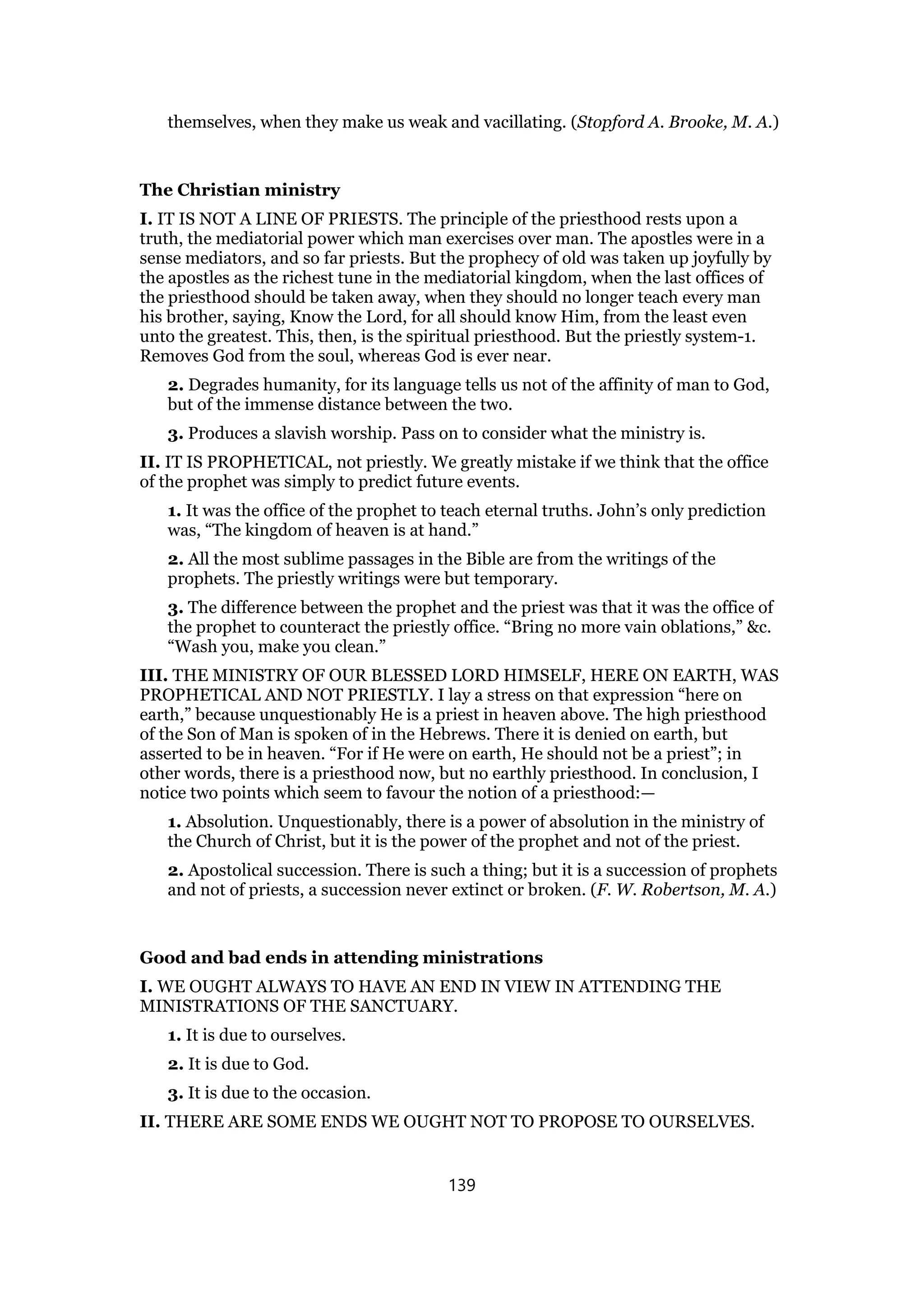
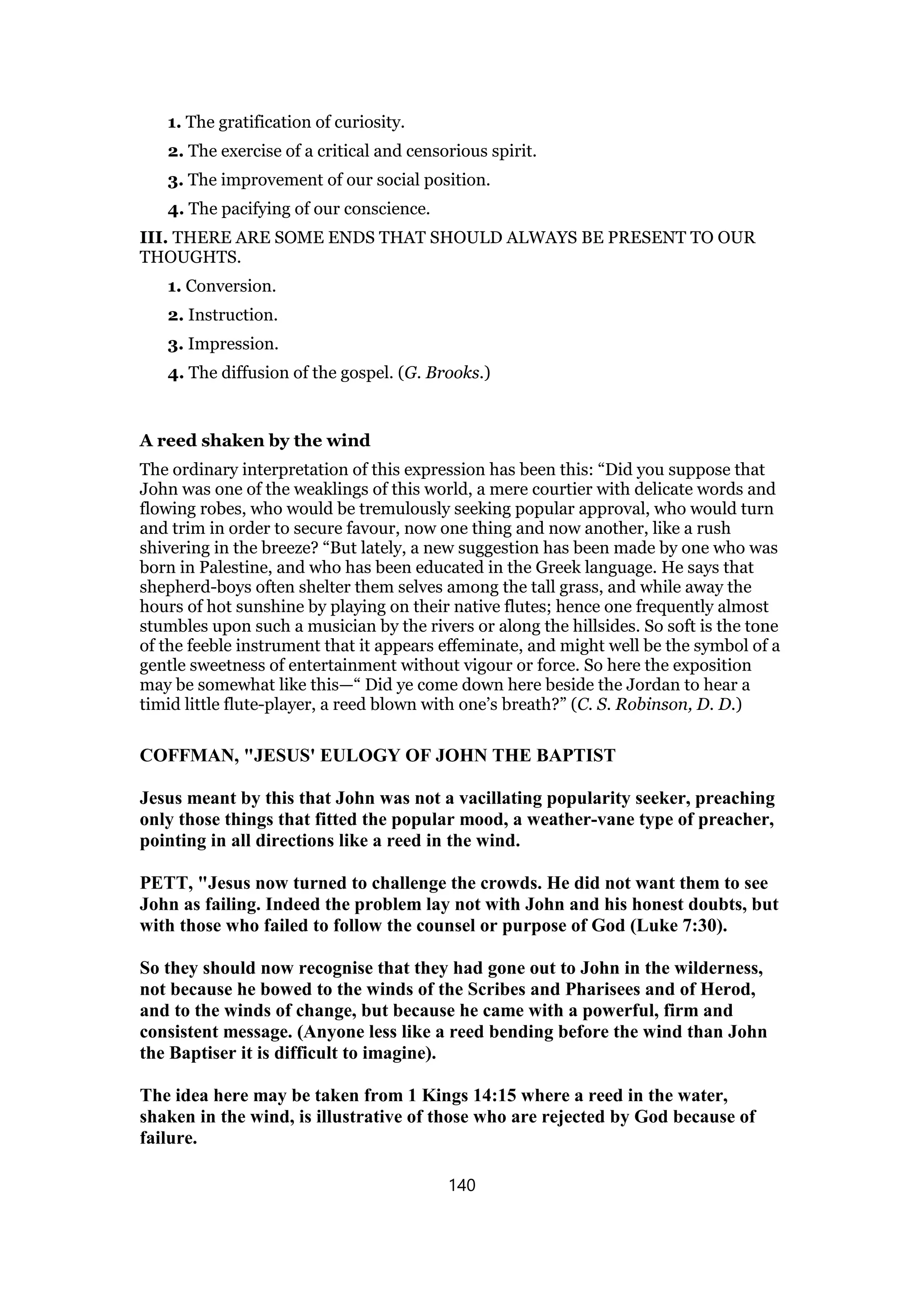
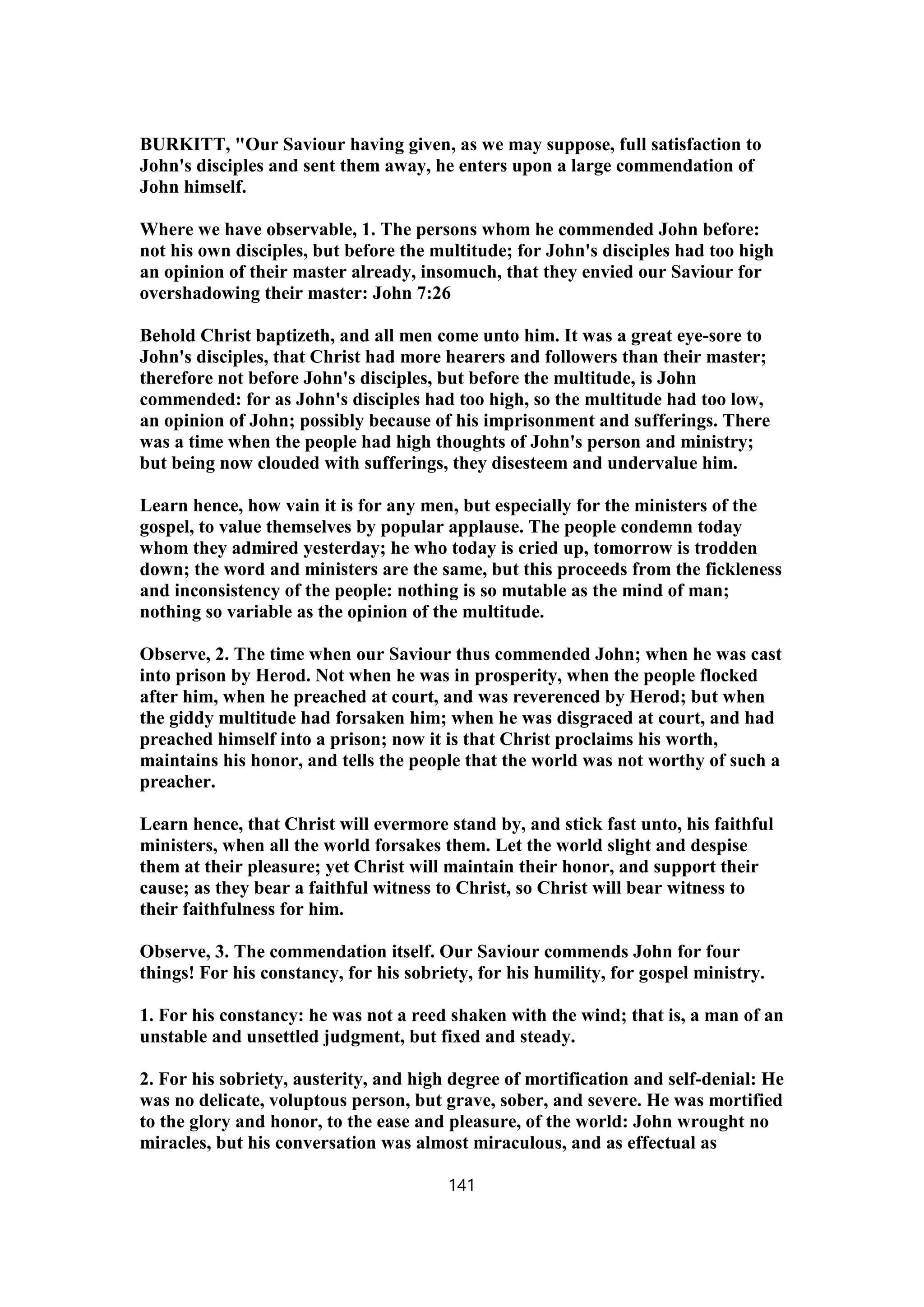
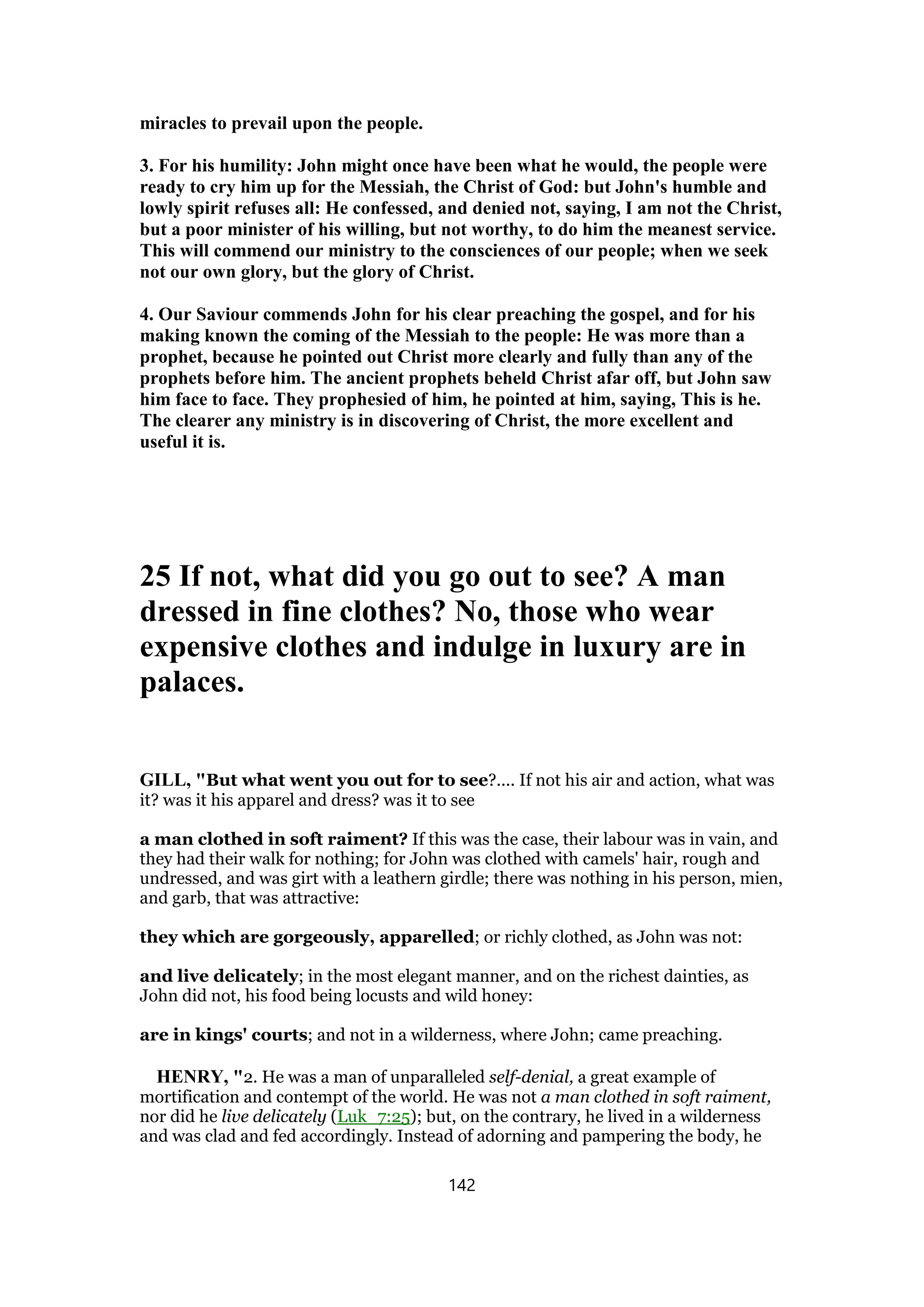

![‘More than (just) a prophet.’ He was the Elijah who was for to come (Matthew
11:14), the one who came in the spirit and power of Elijah (Luke 1:17), although
not strictly Elijah himself (John 1:21).
27 This is the one about whom it is written:
“‘I will send my messenger ahead of you,
who will prepare your way before you.’[b]
GILL, "This is he of whom it is written,.... In Mal_3:1. See Gill on Mat_11:10.
See Gill on Mar_1:2.
HENRY, "4. He was the harbinger and forerunner of the Messiah, and was
himself prophesied of in the Old Testament (Luk_7:27): This is he of whom it is
written (Mal_3:1), Behold, I send my messenger before thy face. Before he sent the
Master himself, he sent a messenger, to give notice of his coming, and prepare people
to receive him. Had the Messiah been to appear as a temporal prince, under which
character the carnal Jews expected him, his messenger would have appeared either
in the pomp of a general or the gaiety of a herald at arms; but it was a previous
indication, plain enough, of the spiritual nature of Christ's kingdom, that the
messenger he sent before him to prepare his way did it by preaching repentance and
reformation of men's hearts and lives. Certainly that kingdom was not of this world
which was thus ushered in.
5. He was, upon this account, so great, that really there was not a greater prophet
than he. Prophets were the greatest that were born of women, more honourable than
kings and princes, and John was the greatest of all the prophets. The country was not
sensible what a valuable, what an invaluable, man it had in it, when John Baptist
went about preaching and baptizing. And yet he that is least in the kingdom of God is
greater than he. The least gospel minister, that has obtained mercy of the Lord to be
skilful and faithful in his work, or the meanest of the apostles and first preachers of
the gospel, being employed under a more excellent dispensation, are in a more
honourable office than John Baptist. The meanest of those that follow the Lamb far
excel the greatest of those that went before him. Those therefore who live under the
gospel dispensation have so much the more to answer for.
PETT, "For he was the one of whom God had said that he was His messenger,
sent before His very eyes, to prepare the way for God to act and to enable Israel
to behold its God (Malachi 3:1; compare Isaiah 40:3-5 as in Luke 3:4-6).
The actual quotation is a combination of the Hebrew text for Malachi 3:1 slightly
altered and with a slight addition from Exodus 23:20. The messenger will come
from God, and like God he will go forward to prepare their way. The same
144](https://image.slidesharecdn.com/luke7commentary-151222193000/75/Luke-7-commentary-144-2048.jpg)
![combination is found in Mark 1:2; Matthew 11:10. Possibly it was as contained
in a list of prophecies or proof texts compiled by the early church or produced by
the Apostles.
CONSTABLE, "Verse 27-28
These verses are almost identical to Matthew 11:10-11. Jesus identified John as
the forerunner of Messiah predicted in Malachi 3:1. As Messiah's forerunner,
John enjoyed a role greater than any other prophet, even those who gave
messianic prophecies. However even the most insignificant participant in the
messianic kingdom is superior to John because John only anticipated it.
"Being least in the kingdom is better than being the best anywhere else." [Note:
Bailey, p. 117.]
28 I tell you, among those born of women there
is no one greater than John; yet the one who is
least in the kingdom of God is greater than he.”
GILL, "For I say unto you----here is not a greater prophet,.... The word
"prophet" is left out in the Arabic and Ethiopic versions, as in Mat_11:11. See Gill on
Mat_11:11.
SBC, "What can these words mean? Well, let us consider what constituted the
highest, that is, the spiritual greatness of the prophets, and try to discover whether in
relation to all these things it is not true that the very least in the kingdom of heaven is
greater than the greatest of the prophets.
I. They were inspired men. Some of them had great natural genius. All of them
received the supernatural illumination of the Holy Ghost. They had revealed to them
the eternal principles of righteousness by which God governs the world. But your
knowledge and view of the Divine character and will is far larger than theirs was. The
very least knows what they did not know—the story of the Lord Jesus Christ, God
manifest in the flesh.
II. But the prophets, you may say, were illustrious for their sanctity. How can the
very least in the kingdom of heaven be greater than they were? Here again we must
distinguish between what may be called the natural force of moral character and
supernatural holiness. There is a genius in some men for heroic forms of goodness,
as there is genius in others for poetry, music, eloquence, and art. The magnificent
energy of Elijah, the chivalry of David’s better days, the stately dignity of Abraham—
these may not be ours; but the very least in the kingdom of heaven has an element
and a spring of holiness which did not belong to any of them. In the sense in which
145](https://image.slidesharecdn.com/luke7commentary-151222193000/75/Luke-7-commentary-145-2048.jpg)








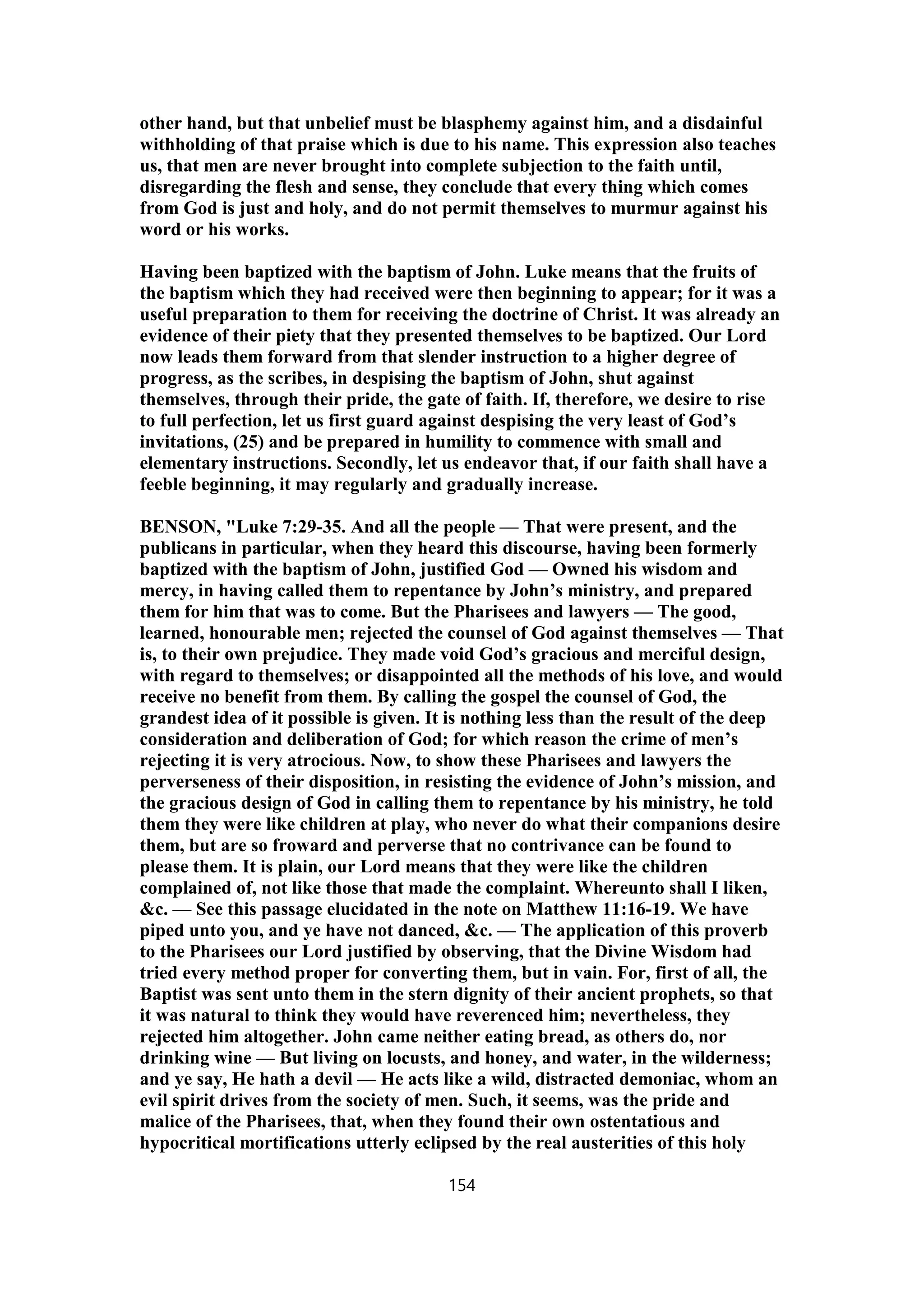


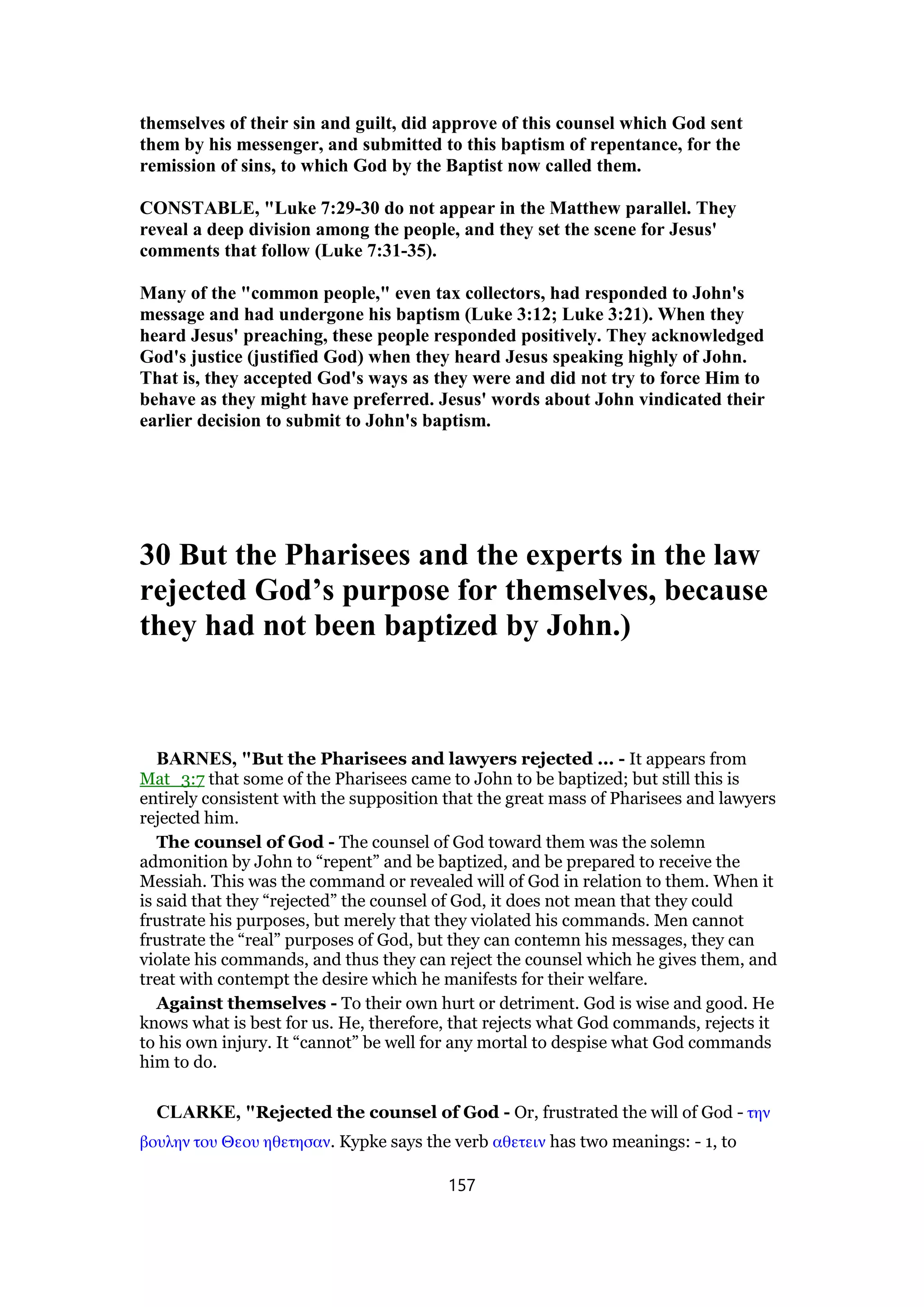
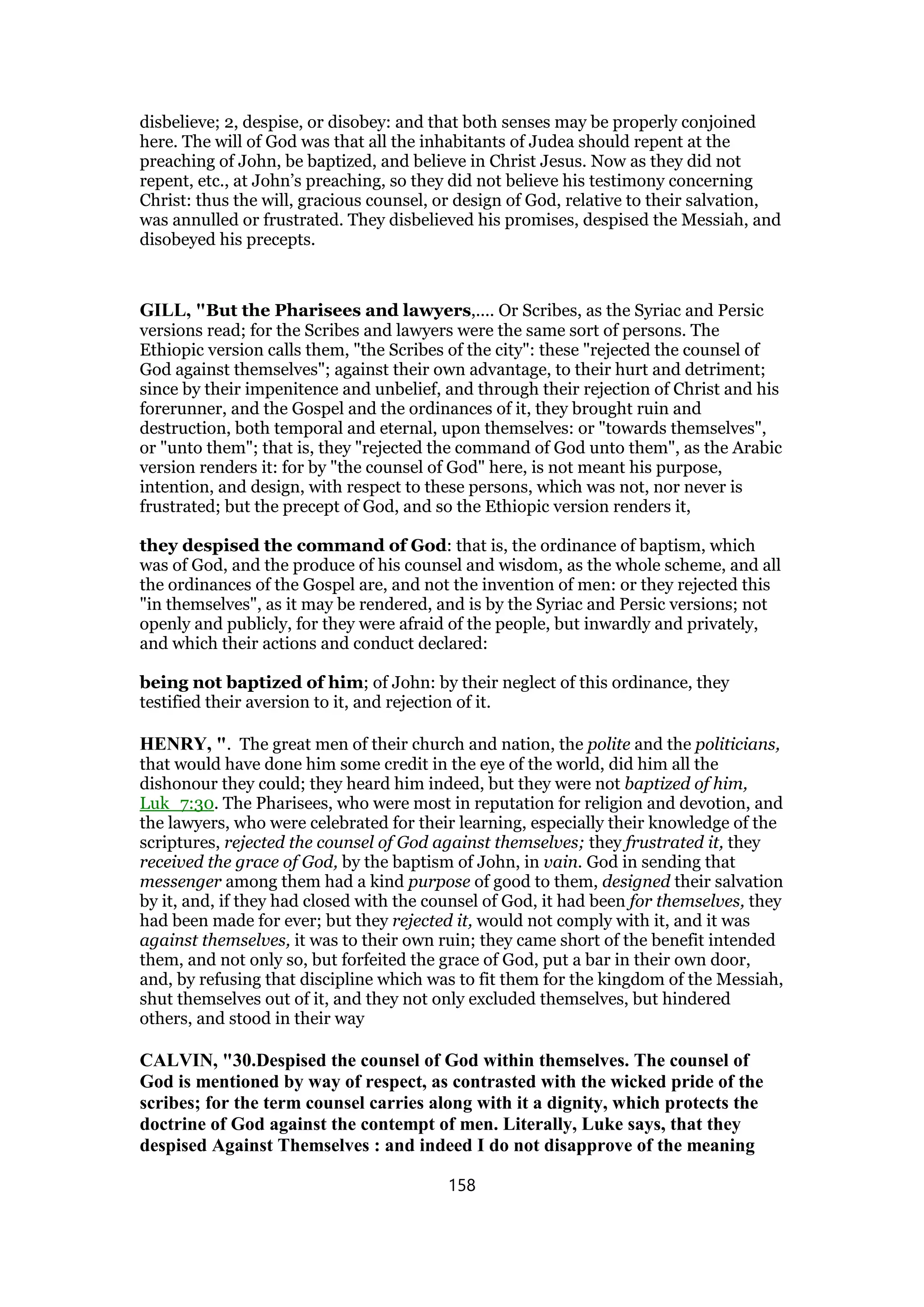


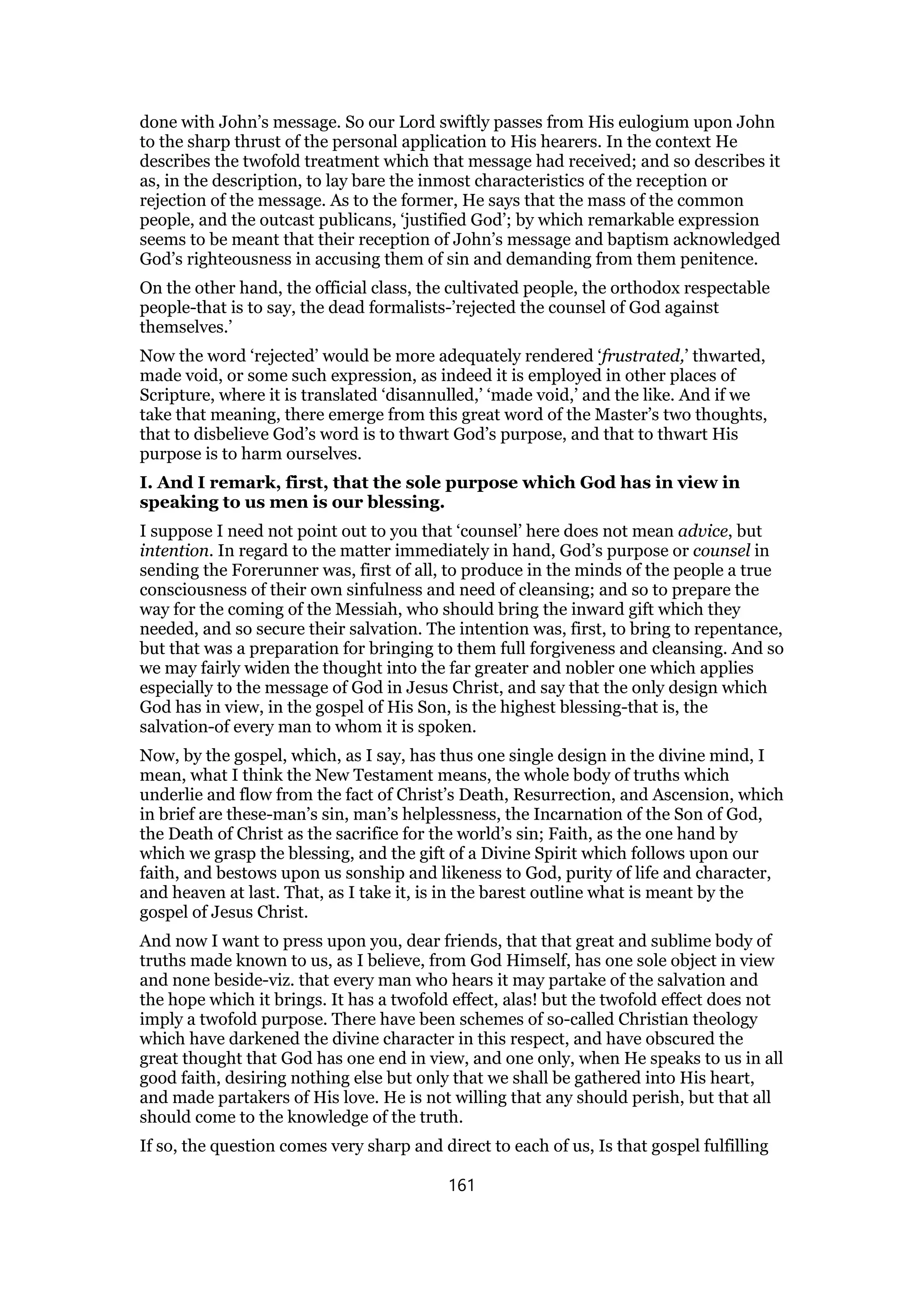

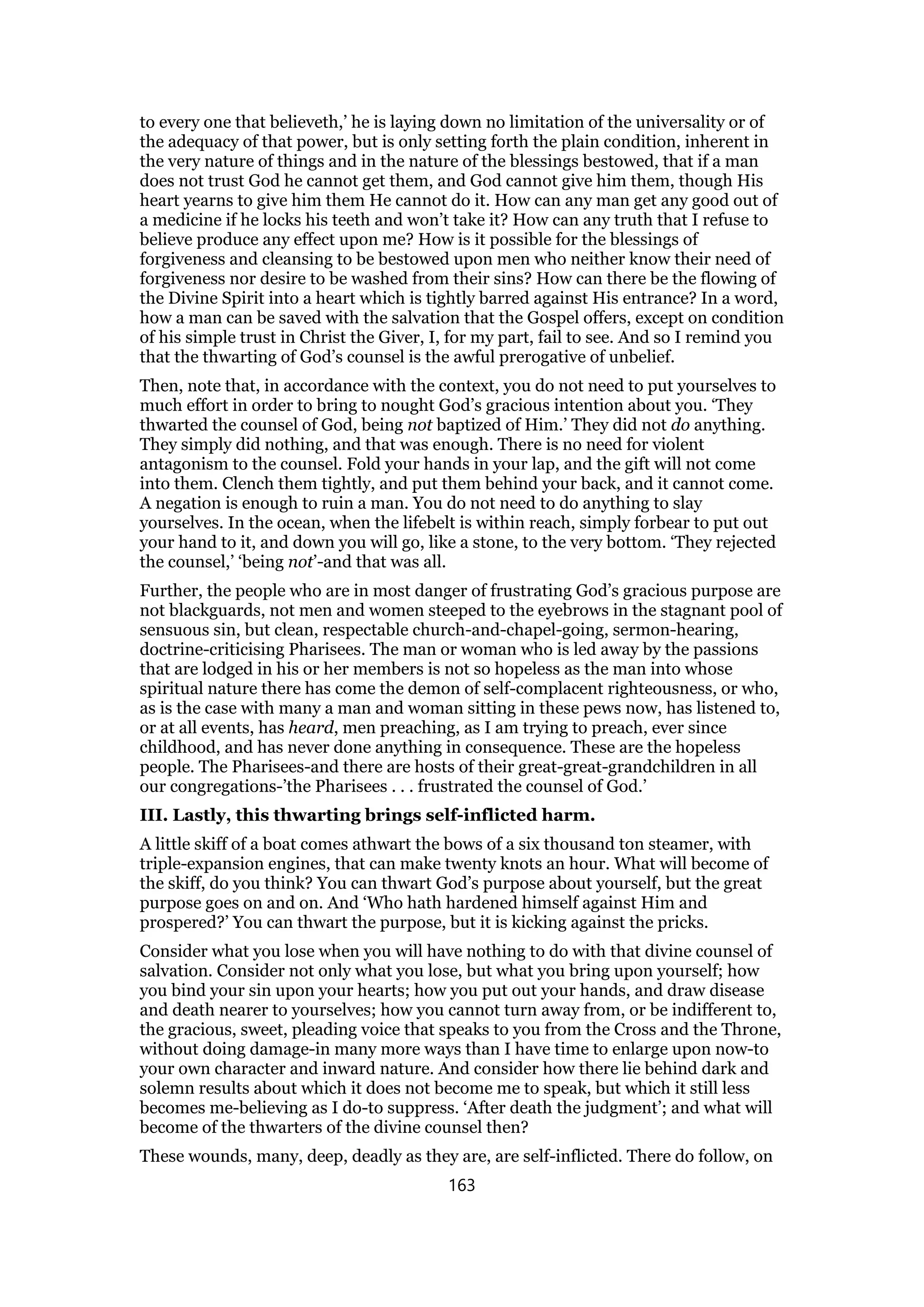
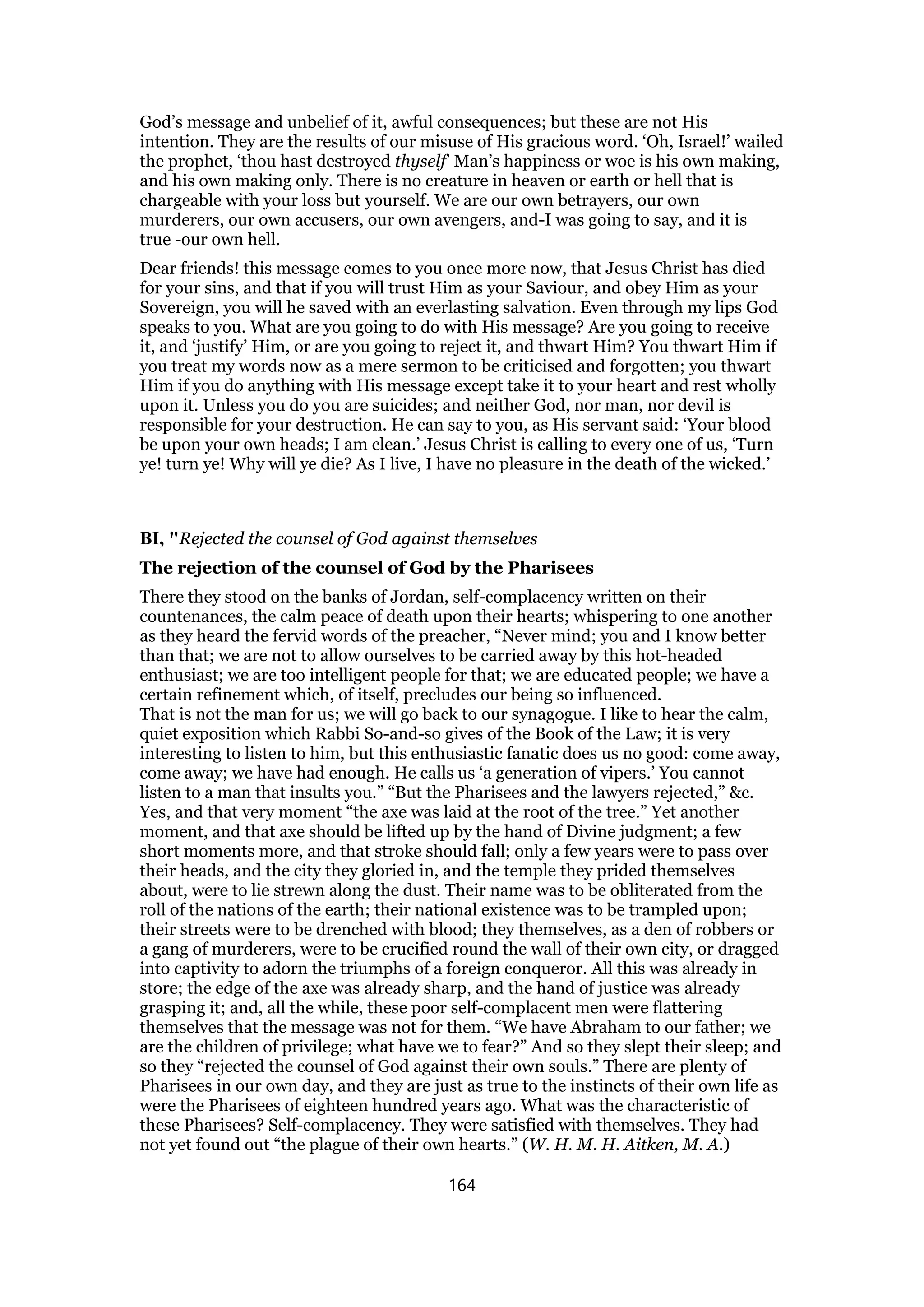




![and afterwards the lamentations of a funeral: in neither of which could they get
their companions to join them.].
In this parable our Lord intimates,
I. The reception which his Gospel meets with—
God has used a great variety of means in order to recommend his Gospel—
[He published it to the Jews under types and shadows, and gradually unfolded it
to them in a long series of prophecies. When the time came for its more general
promulgation, he sent the Baptist to prepare their minds, and the Messiah
himself to preach it to them, and to confirm his word by miracles without
number. He endued also a few poor fishermen with miraculous powers, and sent
them to publish the glad tidings, that their divine mission being unquestionable,
their testimony might be universally received. Nothing was wanting that could in
any wise promote the acceptance of the truth.]
But in every place the Gospel has been rejected by those to whom it has come—
[The Jews rested in the letter of their law, but hated the spirit of it; they
embraced the shadow, but rejected the substance. By whomsoever the Gospel
was preached, or under whatsoever form, the great majority of that nation could
not be prevailed upon to receive it. Thus at this day, the truth of God is generally
disregarded and despised. Men, it is true, profess to be followers of Christ, and
to approve of his religion: but they are not suitably affected with it in any
respect; they neither rejoice in its promises, nor are humbled by its threat-
enings; “if we pipe to them, they will not dance; and if we mourn to them, they
will not lament.” Notwithstanding there is such a transcendent excellence in the
Gospel, and such an exact suitableness to men’s necessities, yet we still have
reason to complain, “Lord, who hath believed our report?”]
It is a matter of no small importance to ascertain,
II. The true ground of this reception—
The ostensible ground is, that the Gospel is not properly administered—
[The Jews could not confute the arguments of the Baptist or of Christ; but they
took occasion from the peculiarities of each to reject their testimony. John,
agreeably to the dispensation under which he ministered, was austere in his
manners; and Christ, agreeably to the dispensation which he came to introduce,
was affable and social: yet, so far were the people from being pleased with either,
that of one they said, “He hath a devil;” and of the other, “He is a glutton and a
drunkard.”
Thus it is at this time: men will not say, “I hate the Gospel, and therefore will not
attend to it;” but they will find fault with the persons who administer it; and
make their peculiarities a plea for despising their message. At one time they
169](https://image.slidesharecdn.com/luke7commentary-151222193000/75/Luke-7-commentary-169-2048.jpg)
![represent the ministers of Christ as speaking too much about faith, and thereby
depreciating morality: at another time, as insisting so strongly on good works,
that they drive men to despair. Sometimes they will object to the truth because it
is not read to them from a written discourse: and sometimes because of the
earnest and impressive manner in which it is delivered. Even the virtues whereby
ministers endeavour to adorn and recommend the Gospel, are often made
occasions of offence; and the strictness of their lives, the condescension of their
manners, and their assiduity in labours, are stated as grounds of heavy
complaint. And as no terms were too opprobrious to be applied to the Baptist
and to Christ, so there is no name so ignominious, nor any treatment so harsh,
but it is thought a proper portion for every faithful servant of the Lord.]
The true ground, however, must be found in the perverseness of mankind—
[We, at this distance of time, see clearly enough the perverseness of the Jews in
their treatment of Christ and his Apostles: but we are not aware of the same
principle operating in ourselves. Nevertheless the truth is, that we have imbibed
notions, which we do not like to have controverted; and have adopted practices,
from which we will not recede. The Gospel proposes humiliating doctrines which
we are too proud to receive; and self-denying rules of conduct which we cannot
endure to follow. Hence we must either acknowledge that we ourselves are
wrong, or find some reason for rejecting the truth. But we cannot altogether
profess ourselves infidels and despise the Gospel as a fable; we therefore are
constrained to blame the mode in which it is administered, and to condemn the
preachers of it in order to justify ourselves. But the real ground of our conduct
is, that “we love darkness rather than light;” and, if Jesus Christ himself were
again to preach to us, the same conduct which he formerly pursued would give
the same offence to his hearers, and be made a pretext for rejecting his
testimony.]
But in the close of the parable, our Lord suggests,
III. The encouragement which ministers, notwithstanding
this reception, have to preach the Gospel—
The Gospel of Christ, when justly stated, is the truest “wisdom”—
[It is called by St. Paul, “The wisdom of God in a mystery:” and the wisdom of
God does indeed beam forth in every part of it, whether we consider the
mysteries it reveals, or the mode of its administration. Who can contemplate the
method prescribed by God for effecting our reconciliation with him, or for fitting
us to enjoy his presence, and not be filled with rapture and amazement? The
more we consider the satisfaction of Christ, or the agency of the Spirit, the
nature of faith or the beauty of holiness, or, in a word, the union of God’s glory
and man’s happiness in the whole scheme of redemption, the more shall we be
overwhelmed with wonder at the depths of wisdom contained in it.
The progressive steps also by which it has been dispensed, together with the
means by which it has been confirmed and propagated, yea, even the manner in
170](https://image.slidesharecdn.com/luke7commentary-151222193000/75/Luke-7-commentary-170-2048.jpg)
![which it has been brought home with power to our own hearts and consciences,
will furnish abundant matter to increase our admiration.
And must not the consideration of this be a rich encouragement to ministers
under all the contempt and obloquy with which they and their ministrations are
regarded? Yes, they know that what the world account foolishness is indeed the
wisdom of God [Note: 1 Corinthians 1:23-24.]; and that “if they be beside
themselves, it is to God [Note: 1 Corinthians 4:10 and 2 Corinthians 5:13.].”]
Moreover, the children of wisdom will assuredly receive their testimony—
[They are “the children of wisdom” who are willing to “sit at wisdom’s gates,”
and to obey her dictates; and, such are to be found in every place,
notwithstanding the generality prefer the ways of sin and folly. Now “of all
these” the Gospel will be approved, embraced, “justified.” They will shew to the
world, both by their profession and conduct, that it is indeed “worthy of all
acceptation.” While others pour contempt upon it, these will be nourished by it;
and while others make it a stumbling-block, over which they fall and perish,
these will be rendered by it “wise unto salvation.”
What can a faithful minister wish for more? He knows that his labours shall not
be altogether in vain, but that there shall be some who shall be saved by his
means, and be “his joy and crown of rejoicing” for evermore: and this far
outweighs all the injuries and insults, which in the discharge of his office, he
meets with at the hands of a perverse ungrateful world.]
To improve this subject, observe,
1. What enemies are men to their own happiness!
[What end had the Baptist or Christ in view, when they preached to the people?
Was it to raise a party? to get a name? to gratify their own vanity? Was it not
rather to instruct and save mankind? Yet, men every where set themselves
against them. And of what concern was it to John or Christ that they were called
by opprobrious names? But to those who thus despised them it was of infinite
moment; because they thereby ensured and aggravated their own eternal
condemnation. Thus it is of small concern to us to be loaded with ignominy and
reproach: but to those who thus requite our labours, it is an awful matter; for
they despise their own mercies, and accomplish their own ruin. Let those who
are thus disposed, remember, that they are far greater enemies to themselves
than they are to us.]
2. What a blessing is “an honest and good heart!”
[They alone who possess this gift can profit from the Gospel. With such a
disposition men will overlook the little peculiarities which there may be in those
who minister the word, and will endeavour to derive benefit from the word they
hear. They will consider that every minister has his proper gift; and that the
method which they disapprove, may be well suited to others. They will be
171](https://image.slidesharecdn.com/luke7commentary-151222193000/75/Luke-7-commentary-171-2048.jpg)
![thankful that the glad tidings are sent to them; and will receive the word with the
affections suited to it [Note: Acts 17:11.]. They will either “dance or weep”
according as the subject calls for humiliation or joy. Thus, instead of rejecting
the counsel of God against themselves, they will “justify God [Note: ver. 29, 30.]”
by an unfeigned acknowledgment of his truth, and a ready compliance with his
will.
Let us then cultivate this disposition; so shall that which is to many “a savour of
death unto death, be to us a savour of life unto life [Note: 2 Corinthians
2:15-16.].”]
BI 31-34, “Whereunto then shall I liken the men of this generation
The Baptist and Christ
In the metaphor of the reed shaking in the wind, we traced that close observation of
nature which enabled Christ to interpret so much of human life to man.
In the similitude He uses here we trace His close observation of the ordinary aspects
of human life, and the use which He made of them to interpret to men His own
thoughts, and the times in which He lived. Every one knows from pictures, from
descriptions, the general appearance of the market-place of an Eastern town. One
may image the quiet figure of Christ moving through the throng, enjoying its
humours, with now a gentle smile, and now an inexplicable sadness on His face, as if
all things spoke to Him of far-off analogies. One sight He often saw—the children at
play in the unoccupied spaces and corners of the markets. They had their games in
and out among the serious doing of the place, and one of these games is often spoken
of in Eastern tales. It is the acting of childish dramas which the children themselves
invent. Often three or four exhibit their little talents for the rest, while now and then
a bearded man or a veiled woman loiter by to watch the sport. Sometimes the
invented story is sportive, sometimes sorrowful, and the acting of them is good or
bad, according to the sympathy given to the children. One such scene, at least,
remained vividly in His mind (and He uses it with astonishing force), when the little
band of actors, having tried to win the favour of their comrades with tiny tragedy,
and then with tiny comedy, failed in their hopes, and said, “We have piped unto you,
and ye have not danced; we have mourned to you, and ye have not wept.” In this
slight scene Christ saw a picture of the religious state of Palestine. There was no
moral depth in that society, no vital strength to carry out in a life the wavering
feelings of repentance. At first they tried the Baptist, but they soon had enough of
that resolute teaching. They turned away with indignation, and said, “He hath a
devil.” They were mourned unto, and they had not lamented. All the same, they could
not get rid of the religious impulse in their hearts. It seemed that Christ required no
ascetic life, that He did not wish them to separate themselves from the world. “ This
is the teacher for us,” they said, and they sought Him out and followed Him. “We will
dance to His piping,” was their thought, “and possess a religion.” But the result was a
still more complete failure.
1. The religion of the Baptist had been too hard for them because of its stern
morality. It demanded outward purity. “We shall be better off with Christ,” they
thought. And they found themselves worse off than before. It was bad enough to
hear that the whole of the outward life had to be reformed; it was ten times worse
to hear that the inward life had to be reformed.
2. The religion of the Baptist had been too hard for them because of its demand
for self-sacrifice. And lo! Christ was ten times more severe on this point than
172](https://image.slidesharecdn.com/luke7commentary-151222193000/75/Luke-7-commentary-172-2048.jpg)

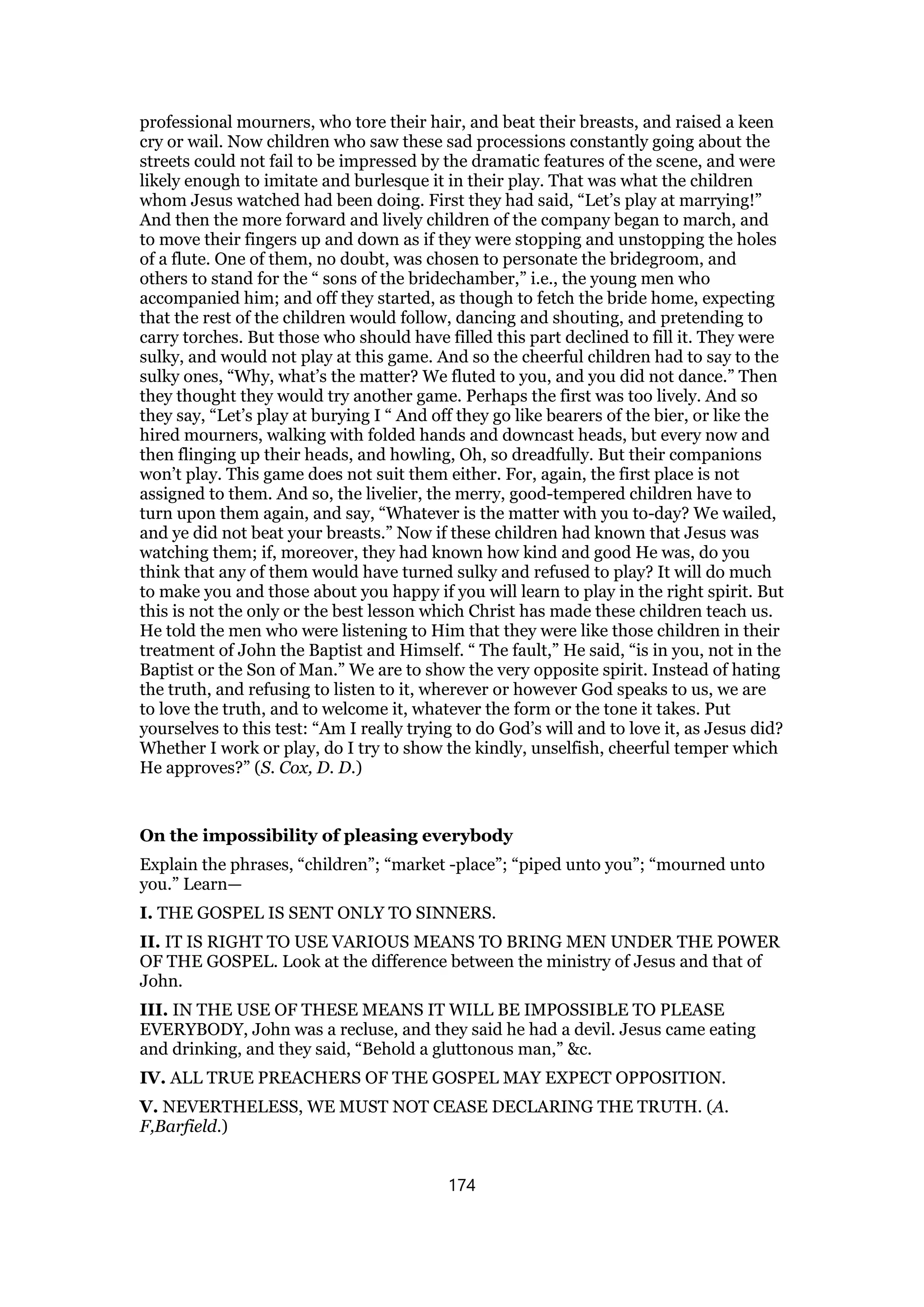


![disciples on the shore of Tiberias, when He accosted them with the words, “Children,
have ye any meat? “ and then, leading the way to a fire, “with fish laid thereon and
bread,” said to them, “come and dine.” Christ never bids us give up anything that is
good, unless it would keep us from something that is better. “The Son of man came
eating and drinking.” Ay, the very Man of Sorrows refused to join in the irrational
worship of pain. (A. W. Momerie, M. A. , D. D.)
The Son of man
This title is in the New Testament significantly enough used, with one exception
[Stephen], by Christ alone. It emphasizes the humanity of Him who bears it, but a
humanity that accomplishes a Divine work, creates and controls a society which is so
finely human because so entirely a realization of the thought or mind of God as to
man. Schleiermacher rightly said: “Christ would not have adopted this title had He
not been conscious of a complete participation in human nature. But His use of it
would have been meaningless had He not had a right to it which other men could not
possess.” The Son of man is the bond between earth and heaven, belongs in an equal
degree to both; He is the medium through which God reaches man and man reaches
God. The title, so often and so emphatically used, enables us to see what Christ
conceived Himself to be, and where He believed Himself to stand; He affirmed that
He possessed our common human nature.
But He also affirmed His pre-eminence—
“The Son of man.”
Other persons had been, or were, sons of individual men, members of particular
nations or families; but Jesus, as “the Son of man,” was no man’s son, but the child of
humanity; belonged to no age, but to all ages; to no family or people, but to mankind.
He is, as the Divine idea realized, universal and everlasting, an individual who is, in a
sense, humanity. (A. M. Fairbairn, D. D.)
Divine friendship
In the Bible Christ is presented to us in many aspects—as a Judge, a Saviour, a
Counsellor; as Brother, Prophet, Priest, and King. In this passage He stands forth in
the light and garb of a Friend. I do not intend to analyse friendship, and enumerate
its elements. I will only suggest one or two of the more prominent.
I. CONSTANCY.
II. IMPARTIALITY. Not a friend only to the good.
III. SYMPATHY.
IV. THE SPIRIT OF HELPFULNESS. Christ was the friend of those who were
morally all wrong. It is to those whose lives have been a failure, whose natures,
spiritually considered, are all in ruins, that Jesus comes in the spirit of friendly
assistance. (W. H. H. Murray.)
Sinners wilful and perverse
I. THE COMPANIONS OF THESE PERVERSE CHILDREN EMPLOYED VARIOUS
MEANS TO CONQUER THEIR OBSTINACY AND PERSUADE THEM TO JOIN IN
177](https://image.slidesharecdn.com/luke7commentary-151222193000/75/Luke-7-commentary-177-2048.jpg)



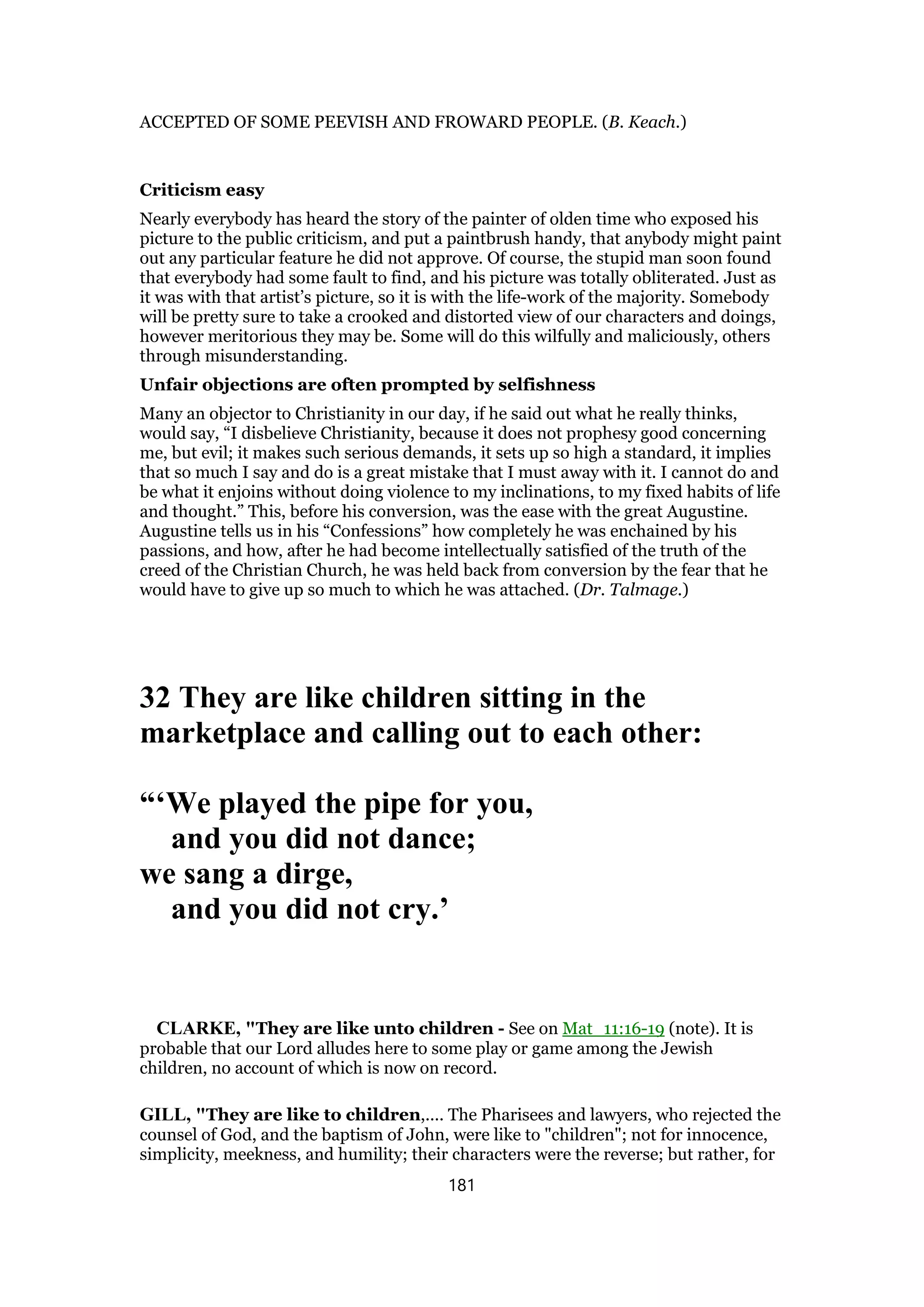

![great austerity of life, and frequent fastings, yet John was too abstemious for them,
and they could not agree with his doctrine nor method of living; See Gill on Mat_
12:18.
CALVIN, "33.For John the Baptist came. Leading an austere life, he thundered
out repentance and severe reproofs, and sung, as it were, a plaintive song; while
the Lord endeavored, by a cheerful and sprightly song, to draw them more
gently to the Father. Neither of those methods had any success, and what reason
could be assigned except their hardened obstinacy? This passage also shows us,
why so wide a difference existed, as to outward life, between Christ and the
Baptist, though both had the same object in view. Our Lord intended, by this
diversity, and by assuming as it were a variety of characters, to convict
unbelievers more fully; since, while he yielded and accommodated himself to
their manners, he did not bend them to himself. But if the men of that age are
deprived of every excuse for repelling, with inveterate malice, a twofold
invitation which God had given them, we too are held guilty in their persons; for
God leaves not untried any sort of pleasing melody, or of plaintive and harsh
music, to draw us to himself, and yet we remain hard as stones. They called John
a demoniac, just as persons of unsound mind, or whose brain is disturbed, are
usually called madmen.
CONSTABLE, "Verse 33-34
These unbelieving religious leaders did not like John because he was too much of
an ascetic. He would not "dance" for them. However they did not like Jesus
either. They believed He was too much of a libertine as they defined that term,
too joyful. Jesus would not "weep" for them. Because John ate locusts and wild
honey instead of bread and wine, the unbelieving Pharisees and lawyers accused
him of having a demon. His fanatical behavior also suggested this to them. Jesus,
on the other hand, took part in feasts eating and drinking freely. They accused
Him of gluttony and drunkenness. The Old Testament described an Israelite who
was a glutton and a drunkard as worthy of stoning (cf. Deuteronomy 21:20).
Furthermore Jesus associated with people whom the Jewish leaders regarded as
apostates.
"People who want to avoid the truth about themselves can always find something
in the preacher to criticize." [Note: Wiersbe, 1:197.]
John and Jesus were both living parables. John taught the importance of
repentance, and Jesus offered joy and blessing. However the Jewish religious
leaders missed the points of both their messages because John and Jesus did not
"dance to their tunes." Jesus probably referred to Himself as the Son of Man
here because this title always stresses His deity (Daniel 7:13-14). This would
heighten the seriousness of the religious leaders' rejection.
34 The Son of Man came eating and drinking,
183](https://image.slidesharecdn.com/luke7commentary-151222193000/75/Luke-7-commentary-183-2048.jpg)
![and you say, ‘Here is a glutton and a drunkard,
a friend of tax collectors and sinners.’
BARNES, "The son of man is come eating and drinking,.... That is, eating
bread and drinking wine, as other people do; and shuns no man's company, goes to a
wedding, dines with a Pharisee, and eats with publicans and sinners, and carries it
freely and courteously to all men:
and ye say, behold a gluttonous man and a wine bibber; an epicurian, a
drunkard, a mere sot, one that gives up himself to sensual pleasures:
a friend of publicans and sinners; a good fellow, a boon companion, that sits
with them, and encourages them in their revellings and drunkenness: such an ill use
did the Jews make of our Lord's free, harmless, and innocent conversation with men;
and in such a horrid manner did they traduce and vilify him, who was holy in his
nature, harmless in his life, separate from sinners, knew no sin, nor ever committed
any.
GILL, "The son of man is come eating and drinking,.... That is, eating bread
and drinking wine, as other people do; and shuns no man's company, goes to a
wedding, dines with a Pharisee, and eats with publicans and sinners, and carries it
freely and courteously to all men:
and ye say, behold a gluttonous man and a wine bibber; an epicurian, a
drunkard, a mere sot, one that gives up himself to sensual pleasures:
a friend of publicans and sinners; a good fellow, a boon companion, that sits
with them, and encourages them in their revellings and drunkenness: such an ill use
did the Jews make of our Lord's free, harmless, and innocent conversation with men;
and in such a horrid manner did they traduce and vilify him, who was holy in his
nature, harmless in his life, separate from sinners, knew no sin, nor ever committed
any.
HENRY, "(2.) They still found something or other to carp at. [1.] John Baptist
was a reserved austere man, lived much in solitude, and ought to have been admired
for being such a humble, sober, self-denying man, and hearkened to as a man of
thought and contemplation; but this, which was his praise, was turned to his
reproach. Because he came neither eating nor drinking, so freely, plentifully, and
cheerfully, as others did, you say, “He has a devil; he is a melancholy man, he is
possessed, as the demoniac whose dwelling was among the tombs, though he be not
quite so wild.” [2.] Our Lord Jesus was of a more free and open conversation; he
came eating and drinking, Luk_7:34. He would go and dine with Pharisees, though
he knew they did not care for him; and with publicans, though he knew they were no
credit to him; yet, in hopes of doing good both to the one and the other, he conversed
familiarly with them. By this it appears that the ministers of Christ may be of very
different tempers and dispositions, very different ways of preaching and living, and
yet all good and useful; diversity of gifts, but each given to profit withal. Therefore
none must make themselves a standard to all others, nor judge hardly of those that
do not do just as they do. John Baptist bore witness to Christ, and Christ applauded
184](https://image.slidesharecdn.com/luke7commentary-151222193000/75/Luke-7-commentary-184-2048.jpg)





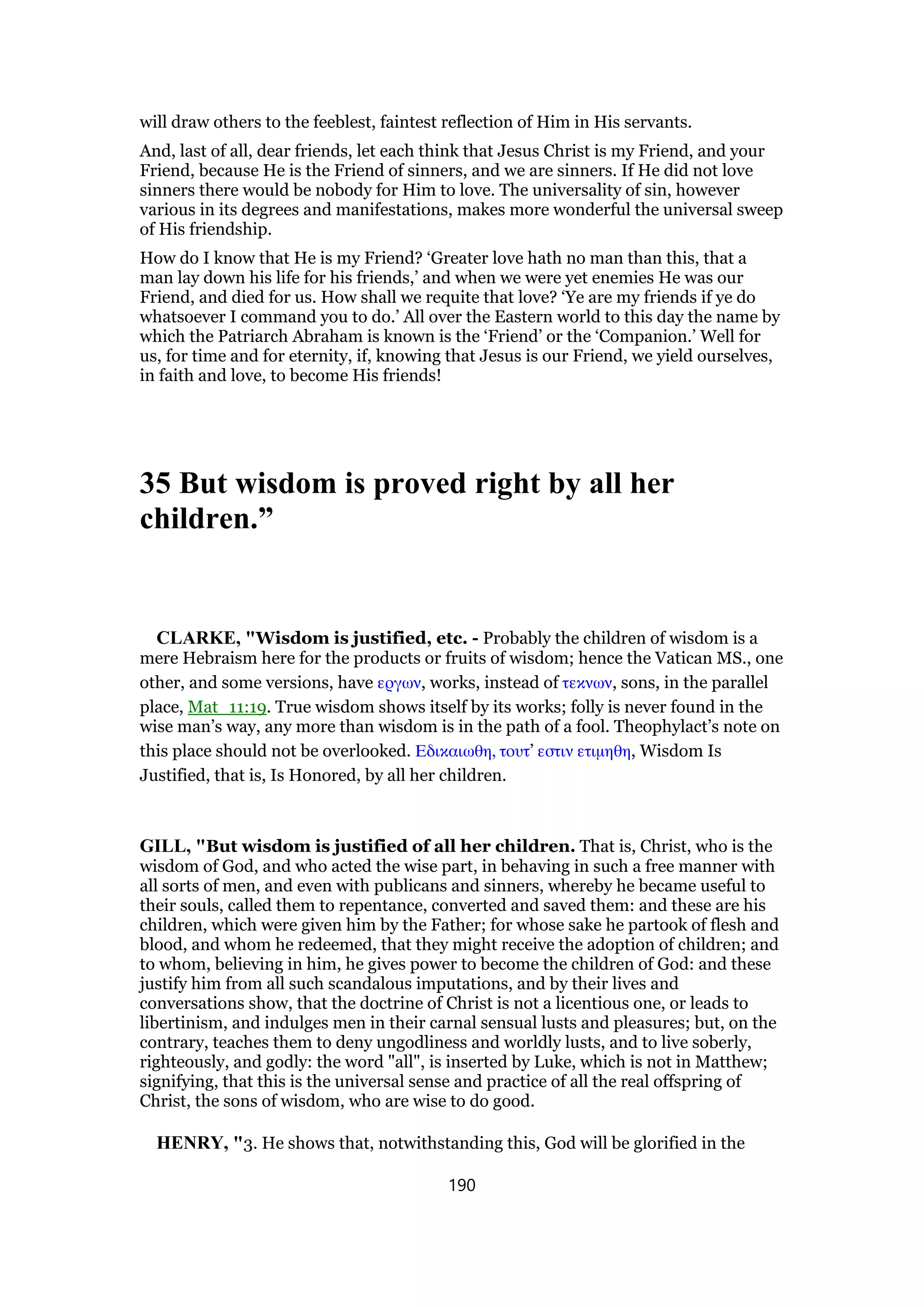



![parallel reveals how the woman has loved the most. And in the centre the point is
made that it is the one who is forgiven the most, who loves the most.
Perhaps before we look at the text in more detail we should consider the logic
behind the story. And central to it, and clearly shown, is the fact that she was
NOT forgiven because she loved Jesus. Rather she loved Jesus because she was
forgiven. That is the point of the parable. Each debtor loved because he was
forgiven, and the one who was forgiven the most loved the most. This is then
made clear by the fact that it is her faith which has saved her. Thus her
forgiveness has come through faith.
And that brings out that when Jesus saw this disreputable woman come towards
Him to touch Him He knew at once the reason why. It wasbecause she had been
listening to His preaching and had repented and had received forgiveness, and
now wanted to reveal her gratitude. That is why He did not rebuke her.
CONSTABLE, "Despite the rejection of the Jewish leaders, those who accept
God's plan (Luke 7:30) as John and Jesus announced it demonstrated its
rightness. Their lives were testimonies to the truthfulness of what they had
believed, which John and Jesus had proclaimed. Jesus stated this truth as a
principle. The behavior of good children (i.e., disciples) normally points to their
having wise parents (i.e., John and Jesus). John and Jesus had also behaved as
good children of God and had vindicated His wisdom by their behavior.
Luke's account of these condemnatory words is fuller than Matthew's. Luke
focused on the religious leaders' rejection whereas Matthew applied Jesus' words
to all the unbelieving Israelites that He faced more generally.
SIMEON, "THE PERVERSE CHILDREN
Luke 7:31-32; Luke 7:35. And the Lord said, Whereunto then shall I liken the
men of this generation? and to what are they like? They are like unto children
sitting in the market-place, and calling one to another, and saying, We have
piped unto you, and ye have not danced; we have mourned to you, and ye have
not wept. …But wisdom is justified of all her children.
THOUGH man is distinguished from all other animals by the faculty of reason,
he is far from submitting readily to its dictates. In things that are agreeable to his
mind he is easily persuaded: but where he is at all swayed by prejudice, or
passion, or interest, he cannot be prevailed upon, even by the clearest arguments,
to embrace truth, or to fulfil his duty. Thus it was with the Pharisees in our
Lord’s time; on which account he compared them to perverse children, who
could not be induced by their companions to participate in their amusements,
notwithstanding every endeavour on their parts to accommodate themselves to
their wishes [Note: It was customary to use pipes both at marriages and at
funerals; at the one in cheerful, at the other in plaintive strains. And the
children, in their play, are supposed to represent first the festivity of a marriage,
and afterwards the lamentations of a funeral: in neither of which could they get
their companions to join them.].
194](https://image.slidesharecdn.com/luke7commentary-151222193000/75/Luke-7-commentary-194-2048.jpg)
![In this parable our Lord intimates,
I. The reception which his Gospel meets with—
God has used a great variety of means in order to recommend his Gospel—
[He published it to the Jews under types and shadows, and gradually unfolded it
to them in a long series of prophecies. When the time came for its more general
promulgation, he sent the Baptist to prepare their minds, and the Messiah
himself to preach it to them, and to confirm his word by miracles without
number. He endued also a few poor fishermen with miraculous powers, and sent
them to publish the glad tidings, that their divine mission being unquestionable,
their testimony might be universally received. Nothing was wanting that could in
any wise promote the acceptance of the truth.]
But in every place the Gospel has been rejected by those to whom it has come—
[The Jews rested in the letter of their law, but hated the spirit of it; they
embraced the shadow, but rejected the substance. By whomsoever the Gospel
was preached, or under whatsoever form, the great majority of that nation could
not be prevailed upon to receive it. Thus at this day, the truth of God is generally
disregarded and despised. Men, it is true, profess to be followers of Christ, and
to approve of his religion: but they are not suitably affected with it in any
respect; they neither rejoice in its promises, nor are humbled by its threat-
enings; “if we pipe to them, they will not dance; and if we mourn to them, they
will not lament.” Notwithstanding there is such a transcendent excellence in the
Gospel, and such an exact suitableness to men’s necessities, yet we still have
reason to complain, “Lord, who hath believed our report?”]
It is a matter of no small importance to ascertain,
II. The true ground of this reception—
The ostensible ground is, that the Gospel is not properly administered—
[The Jews could not confute the arguments of the Baptist or of Christ; but they
took occasion from the peculiarities of each to reject their testimony. John,
agreeably to the dispensation under which he ministered, was austere in his
manners; and Christ, agreeably to the dispensation which he came to introduce,
was affable and social: yet, so far were the people from being pleased with either,
that of one they said, “He hath a devil;” and of the other, “He is a glutton and a
drunkard.”
Thus it is at this time: men will not say, “I hate the Gospel, and therefore will not
attend to it;” but they will find fault with the persons who administer it; and
make their peculiarities a plea for despising their message. At one time they
represent the ministers of Christ as speaking too much about faith, and thereby
depreciating morality: at another time, as insisting so strongly on good works,
195](https://image.slidesharecdn.com/luke7commentary-151222193000/75/Luke-7-commentary-195-2048.jpg)
![that they drive men to despair. Sometimes they will object to the truth because it
is not read to them from a written discourse: and sometimes because of the
earnest and impressive manner in which it is delivered. Even the virtues whereby
ministers endeavour to adorn and recommend the Gospel, are often made
occasions of offence; and the strictness of their lives, the condescension of their
manners, and their assiduity in labours, are stated as grounds of heavy
complaint. And as no terms were too opprobrious to be applied to the Baptist
and to Christ, so there is no name so ignominious, nor any treatment so harsh,
but it is thought a proper portion for every faithful servant of the Lord.]
The true ground, however, must be found in the perverseness of mankind—
[We, at this distance of time, see clearly enough the perverseness of the Jews in
their treatment of Christ and his Apostles: but we are not aware of the same
principle operating in ourselves. Nevertheless the truth is, that we have imbibed
notions, which we do not like to have controverted; and have adopted practices,
from which we will not recede. The Gospel proposes humiliating doctrines which
we are too proud to receive; and self-denying rules of conduct which we cannot
endure to follow. Hence we must either acknowledge that we ourselves are
wrong, or find some reason for rejecting the truth. But we cannot altogether
profess ourselves infidels and despise the Gospel as a fable; we therefore are
constrained to blame the mode in which it is administered, and to condemn the
preachers of it in order to justify ourselves. But the real ground of our conduct
is, that “we love darkness rather than light;” and, if Jesus Christ himself were
again to preach to us, the same conduct which he formerly pursued would give
the same offence to his hearers, and be made a pretext for rejecting his
testimony.]
But in the close of the parable, our Lord suggests,
III. The encouragement which ministers, notwithstanding
this reception, have to preach the Gospel—
The Gospel of Christ, when justly stated, is the truest “wisdom”—
[It is called by St. Paul, “The wisdom of God in a mystery:” and the wisdom of
God does indeed beam forth in every part of it, whether we consider the
mysteries it reveals, or the mode of its administration. Who can contemplate the
method prescribed by God for effecting our reconciliation with him, or for fitting
us to enjoy his presence, and not be filled with rapture and amazement? The
more we consider the satisfaction of Christ, or the agency of the Spirit, the
nature of faith or the beauty of holiness, or, in a word, the union of God’s glory
and man’s happiness in the whole scheme of redemption, the more shall we be
overwhelmed with wonder at the depths of wisdom contained in it.
The progressive steps also by which it has been dispensed, together with the
means by which it has been confirmed and propagated, yea, even the manner in
which it has been brought home with power to our own hearts and consciences,
will furnish abundant matter to increase our admiration.
196](https://image.slidesharecdn.com/luke7commentary-151222193000/75/Luke-7-commentary-196-2048.jpg)
![And must not the consideration of this be a rich encouragement to ministers
under all the contempt and obloquy with which they and their ministrations are
regarded? Yes, they know that what the world account foolishness is indeed the
wisdom of God [Note: 1 Corinthians 1:23-24.]; and that “if they be beside
themselves, it is to God [Note: 1 Corinthians 4:10 and 2 Corinthians 5:13.].”]
Moreover, the children of wisdom will assuredly receive their testimony—
[They are “the children of wisdom” who are willing to “sit at wisdom’s gates,”
and to obey her dictates; and, such are to be found in every place,
notwithstanding the generality prefer the ways of sin and folly. Now “of all
these” the Gospel will be approved, embraced, “justified.” They will shew to the
world, both by their profession and conduct, that it is indeed “worthy of all
acceptation.” While others pour contempt upon it, these will be nourished by it;
and while others make it a stumbling-block, over which they fall and perish,
these will be rendered by it “wise unto salvation.”
What can a faithful minister wish for more? He knows that his labours shall not
be altogether in vain, but that there shall be some who shall be saved by his
means, and be “his joy and crown of rejoicing” for evermore: and this far
outweighs all the injuries and insults, which in the discharge of his office, he
meets with at the hands of a perverse ungrateful world.]
To improve this subject, observe,
1. What enemies are men to their own happiness!
[What end had the Baptist or Christ in view, when they preached to the people?
Was it to raise a party? to get a name? to gratify their own vanity? Was it not
rather to instruct and save mankind? Yet, men every where set themselves
against them. And of what concern was it to John or Christ that they were called
by opprobrious names? But to those who thus despised them it was of infinite
moment; because they thereby ensured and aggravated their own eternal
condemnation. Thus it is of small concern to us to be loaded with ignominy and
reproach: but to those who thus requite our labours, it is an awful matter; for
they despise their own mercies, and accomplish their own ruin. Let those who
are thus disposed, remember, that they are far greater enemies to themselves
than they are to us.]
2. What a blessing is “an honest and good heart!”
[They alone who possess this gift can profit from the Gospel. With such a
disposition men will overlook the little peculiarities which there may be in those
who minister the word, and will endeavour to derive benefit from the word they
hear. They will consider that every minister has his proper gift; and that the
method which they disapprove, may be well suited to others. They will be
thankful that the glad tidings are sent to them; and will receive the word with the
affections suited to it [Note: Acts 17:11.]. They will either “dance or weep”
197](https://image.slidesharecdn.com/luke7commentary-151222193000/75/Luke-7-commentary-197-2048.jpg)
![according as the subject calls for humiliation or joy. Thus, instead of rejecting
the counsel of God against themselves, they will “justify God [Note: ver. 29, 30.]”
by an unfeigned acknowledgment of his truth, and a ready compliance with his
will.
Let us then cultivate this disposition; so shall that which is to many “a savour of
death unto death, be to us a savour of life unto life [Note: 2 Corinthians
2:15-16.].”]
BI, “But wisdom is Justified of all her children
Wisdom’s justification
We trace the truth and the applicability of this saying—
I.
IN THE DIFFERENT FIELDS OF PURELY HUMAN INTEREST AND STUDY. Each
subject that engages the attention of man has a wisdom, that is to say, governing
principles, methods, modes of thought and inquiry—in short, a philosophy peculiar
to its own. Those who have mastered this wisdom even in part are prepared for
results which are startling or absurd in the eyes of others who are strangers to it.
II. IN THE REGION OF HUMAN CHARACTER. That which enables us to do justice
to character is sympathy with it.
III. IN REGARD TO THE CHRISTIAN CREED. Here, too, it is clear, upon reflection,
that “wisdom is justified of her children.” The word “wisdom” in our Lord’s mouth
had a special significance. His more instructed hearers would recognize in it an
ancient and consecrated word (see Pro_8:1-36.). This Eternal Wisdom, born of a
virgin in the fulness of time, crucified, bruised, risen, ascended, is at once the
Teacher, and in the main the substance, of the Christian creed. Two practical lessons:
1. Nothing is so fatal to the recognition of moral and religious truth as a scornful
temper.
2. Wisdom may and must be won by prayer. (Canon Liddon.)
Wisdom justified of her children
“Justified” means acquitted, recognized, or acknowledged. “Of” means “by.” And
Christ says, “Wisdom is recognized by her children.” The wisdom of a Divine life had
appeared in two forms—ascetic in John the Baptist, social in Christ. The world
recognized it in neither. In John they said it was insanity; in Christ worldliness and
irreligion. To the world Christ replies that they were incompetent judges. None could
recognize the Divine life but those who lived it; none justify wisdom except her
children. The Divine life was always the same, but it expressed itself outwardly in no
special single form of life. Wisdom, under whatever form she might appear—the life
of asceticism or the life social—would be justified or recognized by her children.
I. THE TONE OF MIND WHICH CAPACITATES FOR JUDGING HUMAN
CHARACTER. By sympathy alone can you judge of character. This is the doctrine of
the metaphor. A mother, changing her garb, may be mistaken by strangers, but under
every metamorphosis she is recognized by her children, who know her voice by the
secret tact of sympathy. Would you judge of Christ? Feel Christ. “Learn to love one
living man.”
198](https://image.slidesharecdn.com/luke7commentary-151222193000/75/Luke-7-commentary-198-2048.jpg)

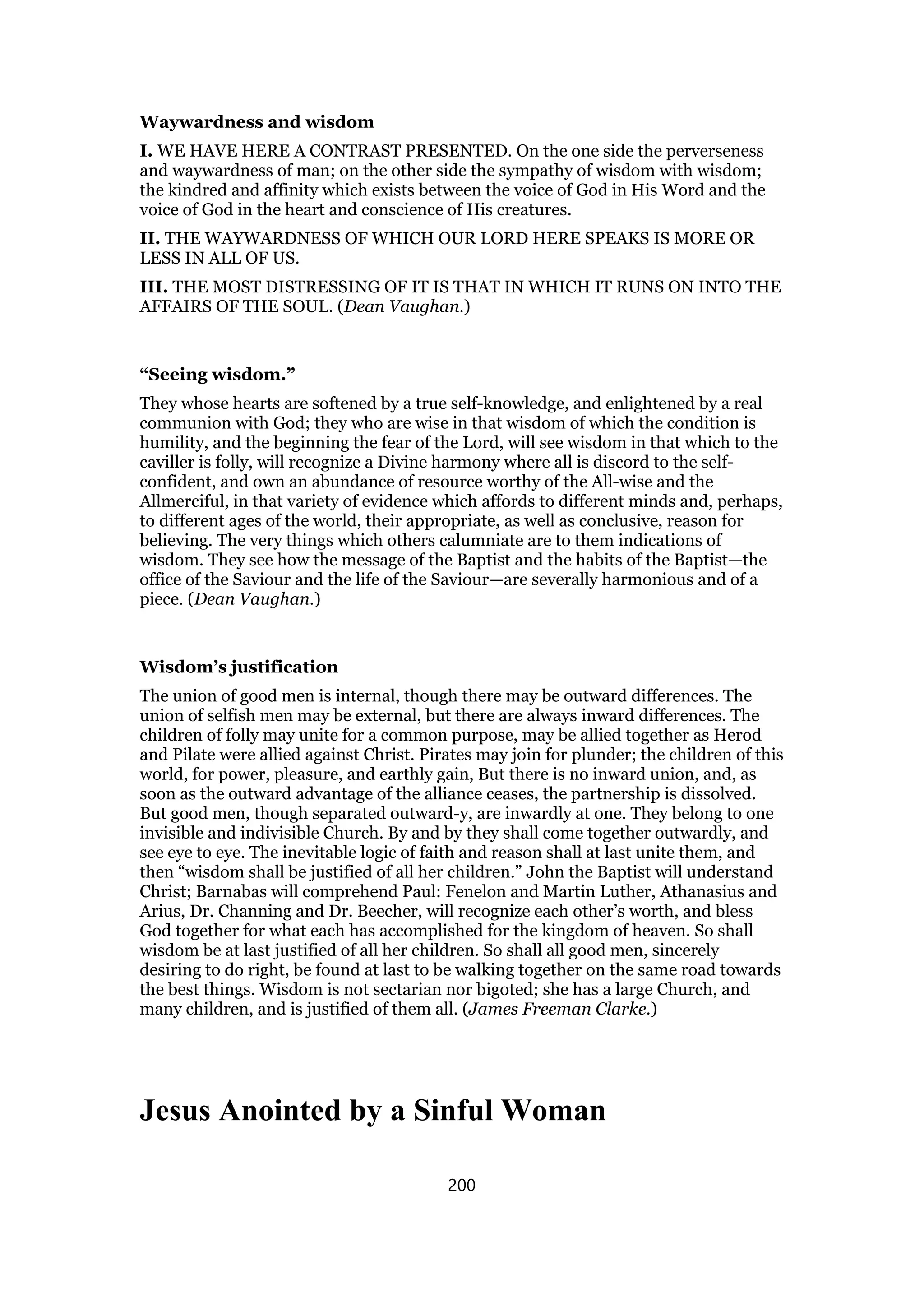
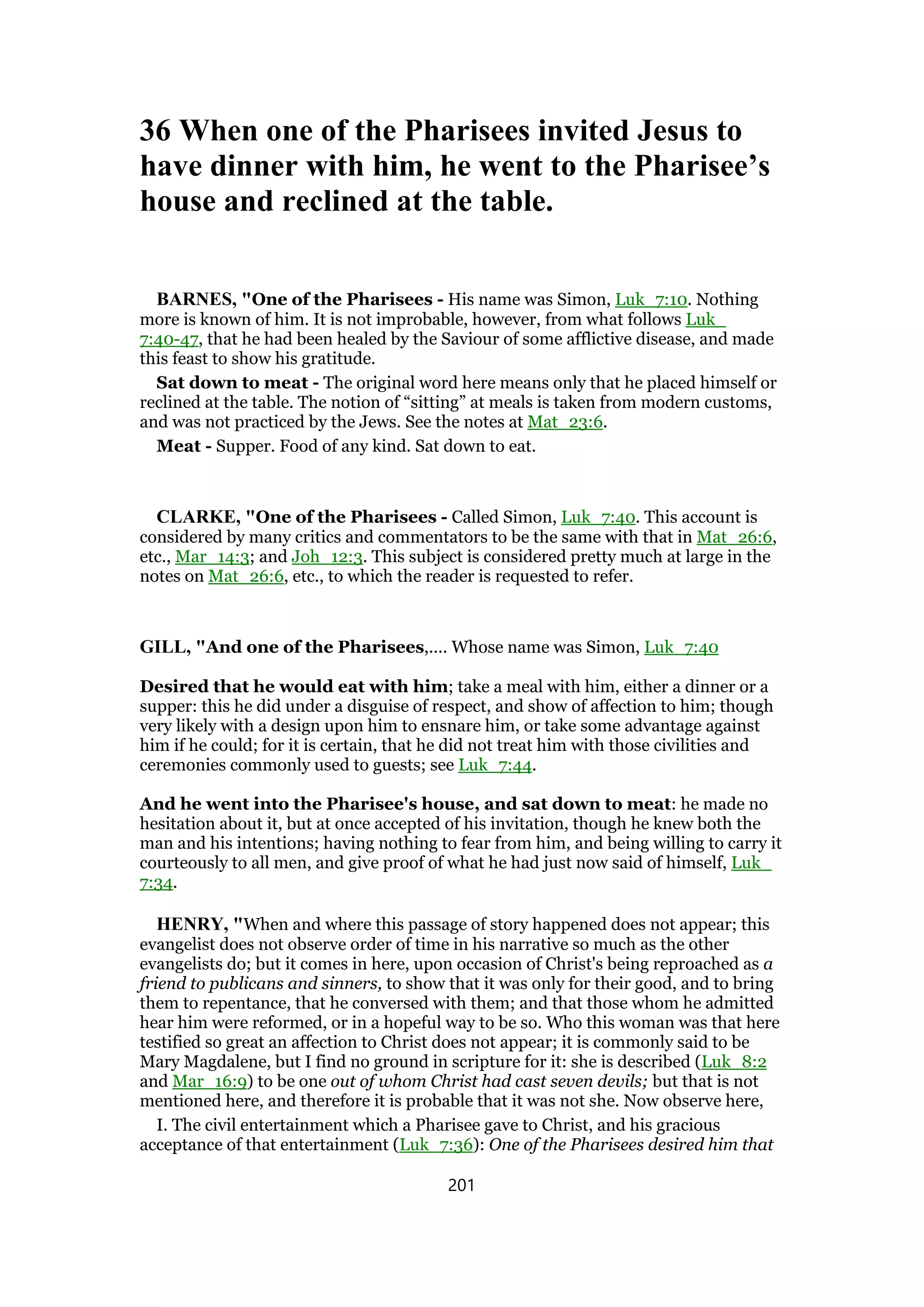

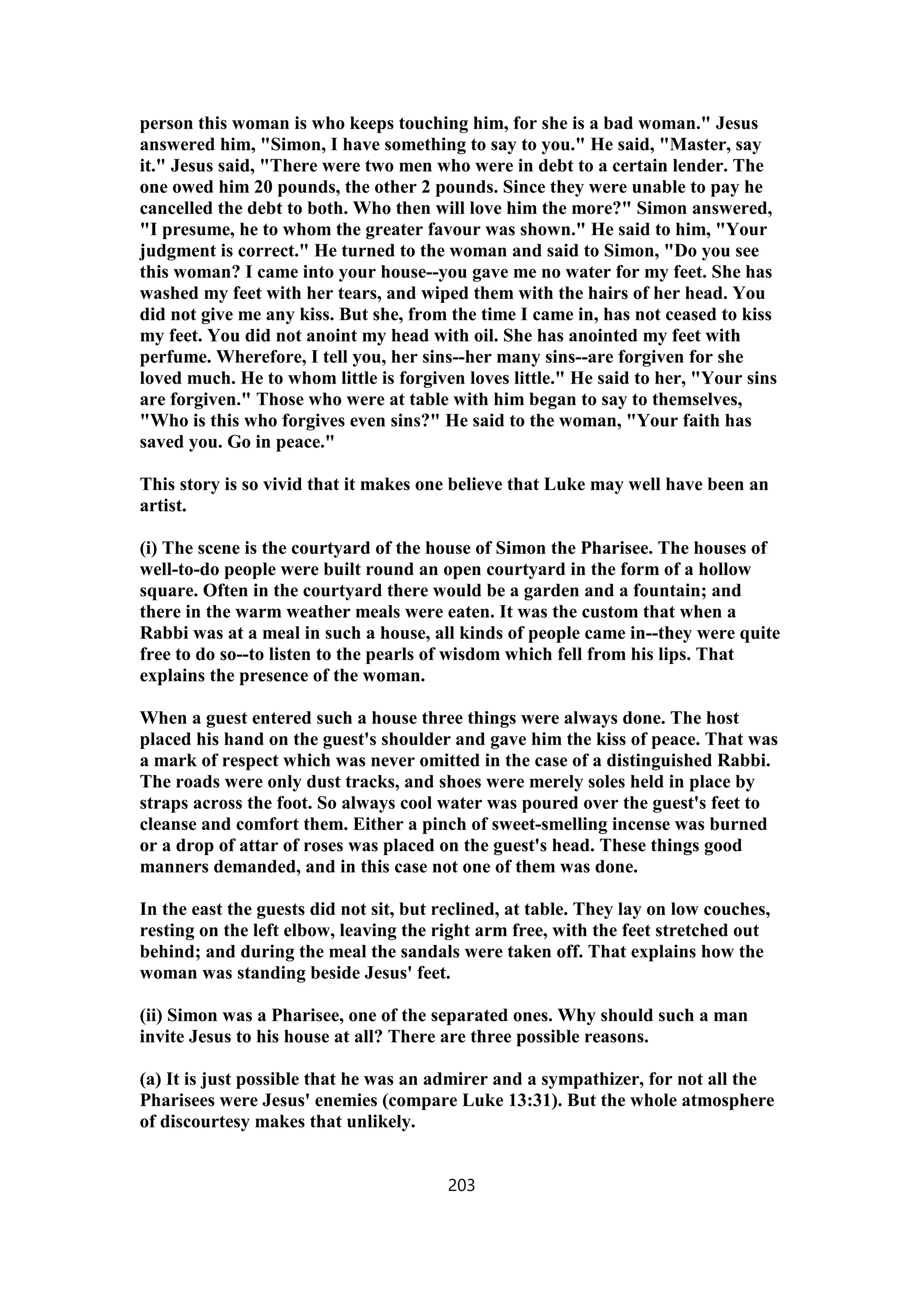


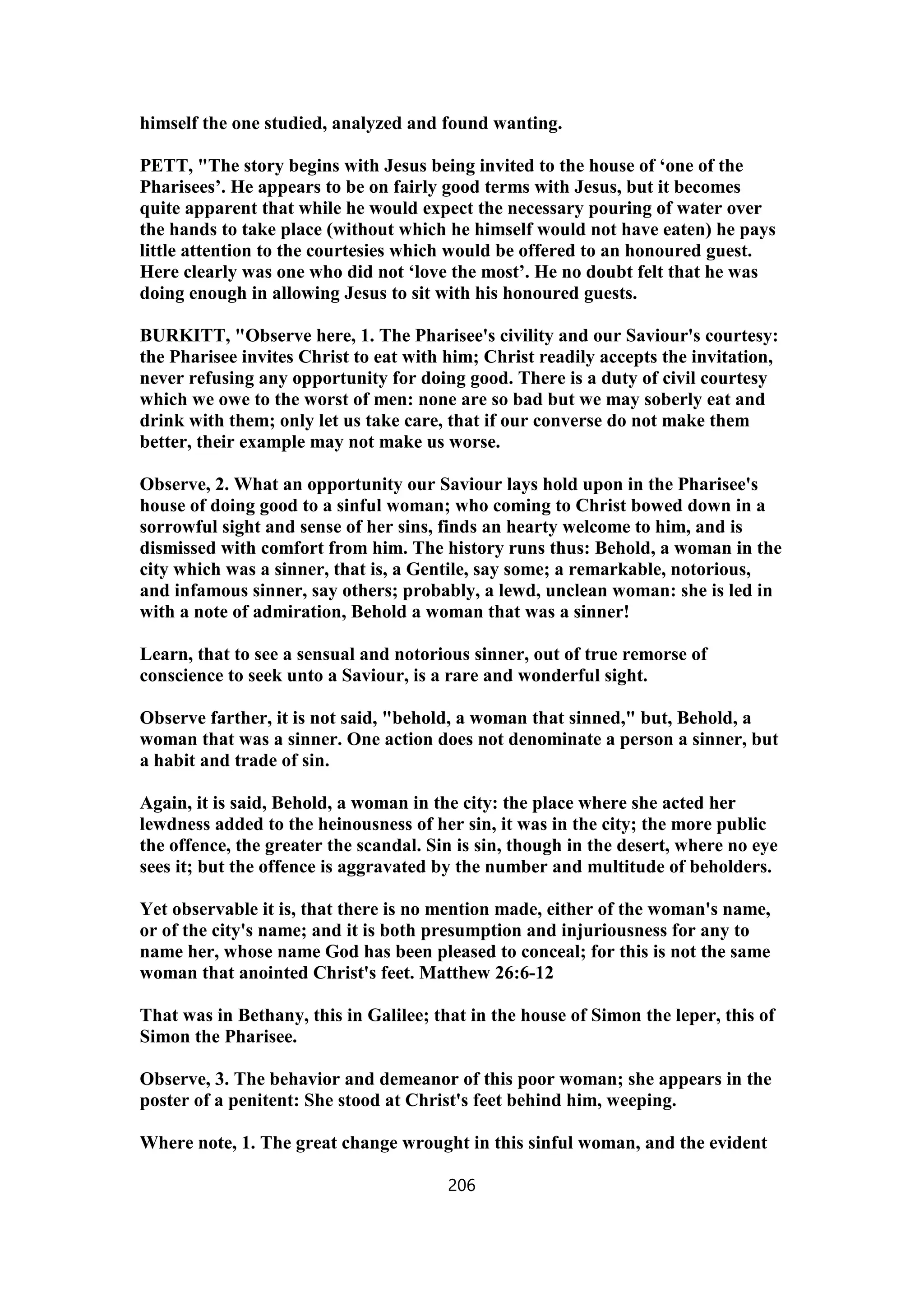
![effects of it: her eyes, which had been formerly lamps of fire by lust, are now a
holy fountain of penitential tears; her hair, which she had used as a net to catch
her fond and foolish lovers, does now become a towel for her Saviour's feet.
Verily, such a heart, as has once felt the sting and smart of sin, will make
plentiful expressions of the greatness of its sorrow.
Again, 2. She sits behind Christ and weeps: this proceeded, no doubt, from a
holy bashfulness; she that was wont to look boldly in the face of her lovers, dares
not now behold the face of her Saviour; she that was wont to end her alluring
beams forth into the eyes of her wanton lovers, now casts her dejected eyes down
upon the earth.
And behold the plenty of her tears, they flow in such abundance that she washes
Christ's feet with them. She began to wash his feet, says the text, but we read not
when she ended; never were our Saviour's feet bedewed with more precious
liquor than this of remorseful tears. Thus does a holy penitent account no office
too mean that is done to the honor of its Saviour.
CONSTABLE, "4. The anointing by a sinful woman 7:36-50
This incident, appearing only in Luke's Gospel, illustrates the truth just
expressed in Luke 7:35. Here is a case in point of what Jesus had just described
happening (Luke 7:34). Jesus reached out to a sinner only to receive criticism
from a fastidious Pharisee. The love that the woman lavished on Jesus contrasts
with Simon the Pharisee's lack of love for Him. The motif of Jesus' identity is
also significant in this story since Jesus had forgiven the woman's sins, and this
raised a question about His authority. Again Luke featured a woman in his
narrative showing Jesus' concern for women. There are some similarities
between this story and the one about Mary anointing Jesus' feet in Simon the
leper's house, but that was a different incident (cf. Matthew 26:6-13; Mark
14:3-9; John 12:1-8).
". . . the story of the sinful woman in the Pharisee's house reminds us of the
previous conflict over Jesus' authority to release sins, suggesting that this is a
continuing conflict. This reminder may also help readers to recall Jesus' basic
claim of authority to release sins in Luke 5:24." [Note: Tannehill, 1:106.]
SBC 36-50, “I. The narrative encourages sinners of every name and degree to go at
once to Christ. He will in nowise cast them out. There are no more touching stories in
the Gospels than those which tell how Jesus dealt with the most degraded class of
sinners. Recall His conversation with the woman of Samaria, at the well of Sychar.
Bring up before you once again that scene in the Temple, where the scribes and
Pharisees dragged in before Him the woman who had been taken in the very act of
sin. Then read anew this narrative, and say if the prophecy regarding Him was not
true, "A bruised reed shall He not break; the smoking flax shall He not quench."
Where man perceived no promise of success, and would have been tempted to give
up the individual as hopeless, He would labour on until the reed which had given
forth a note jangled and out of tune was restored to its original condition, and gave
207](https://image.slidesharecdn.com/luke7commentary-151222193000/75/Luke-7-commentary-207-2048.jpg)



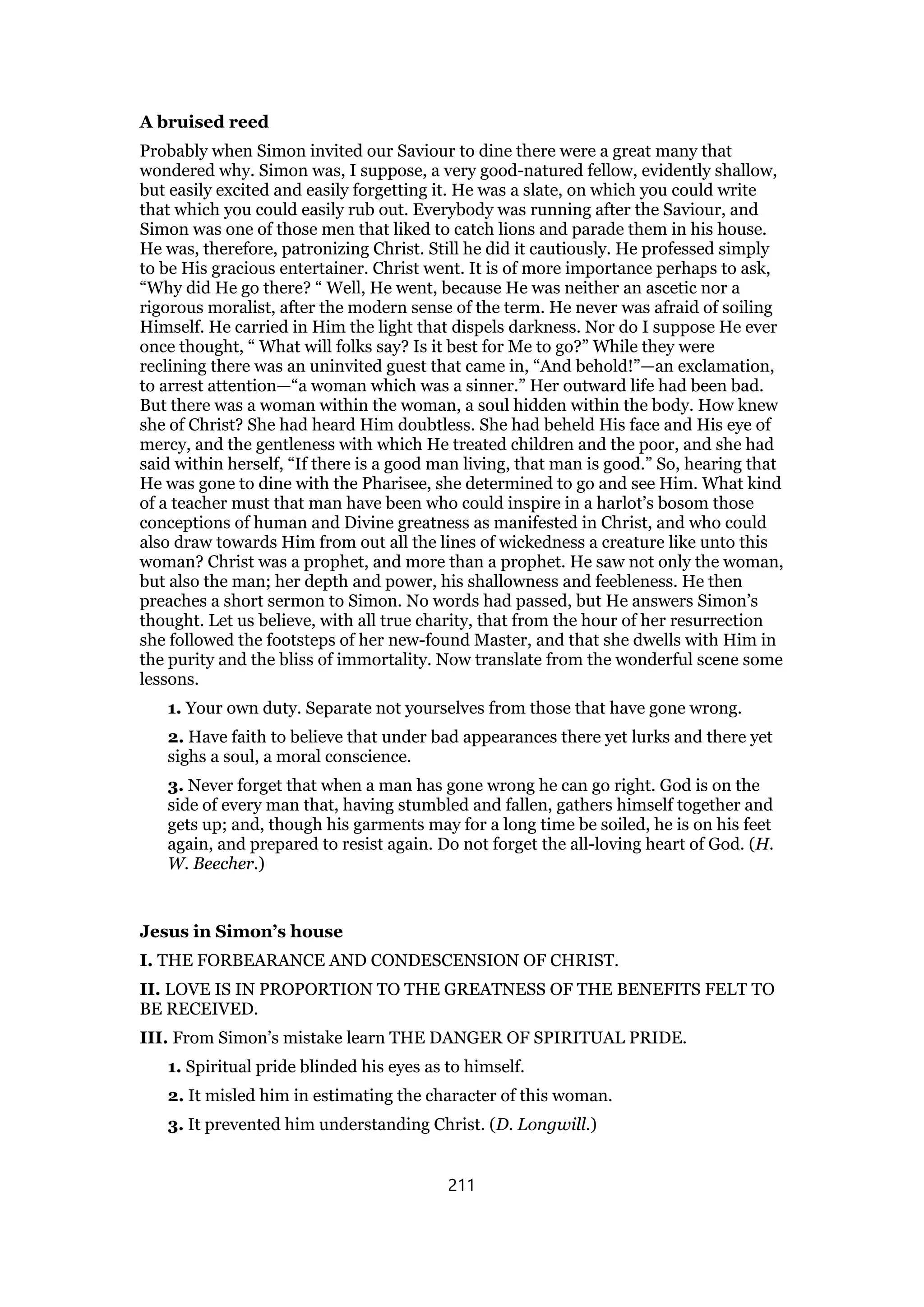
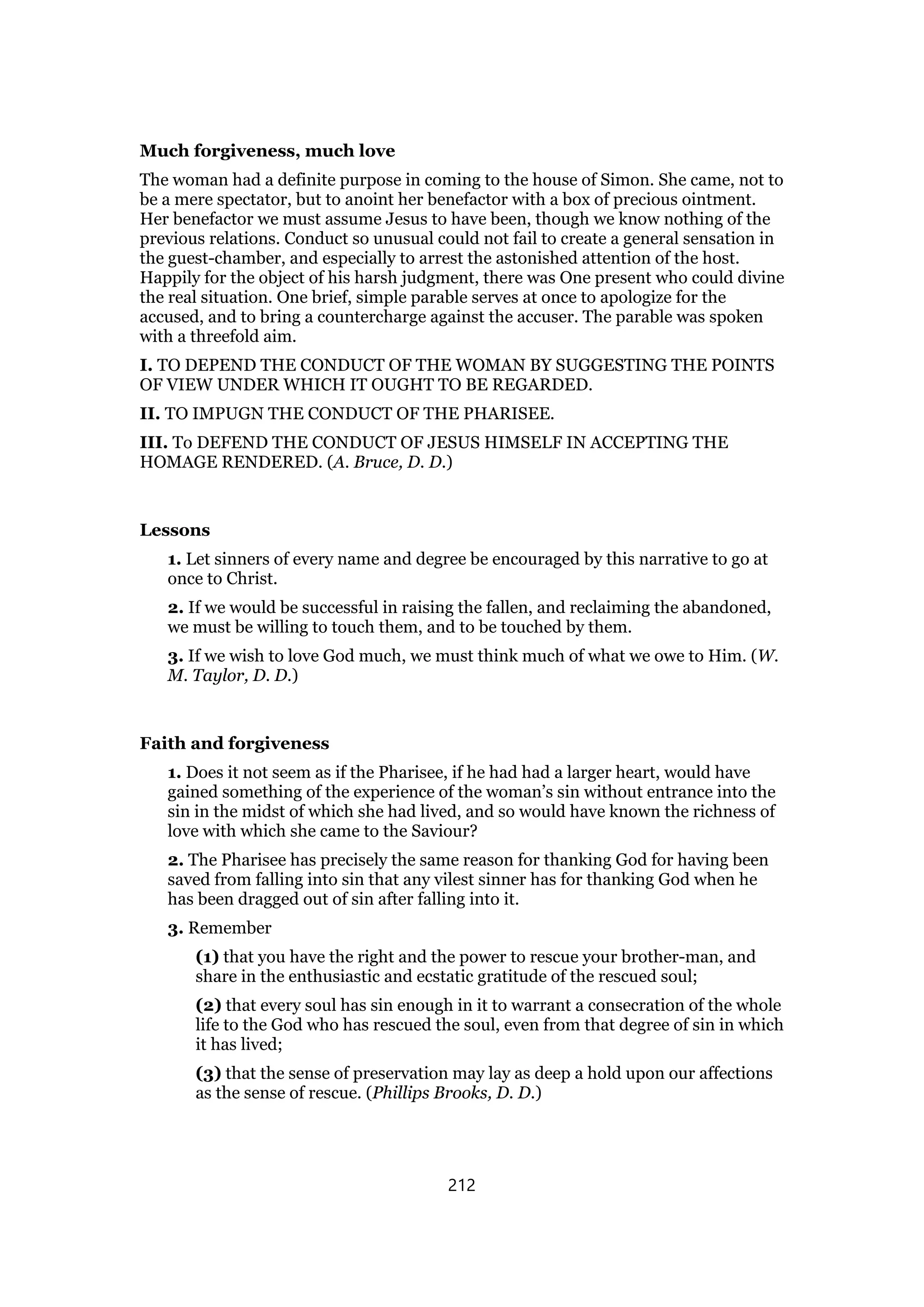
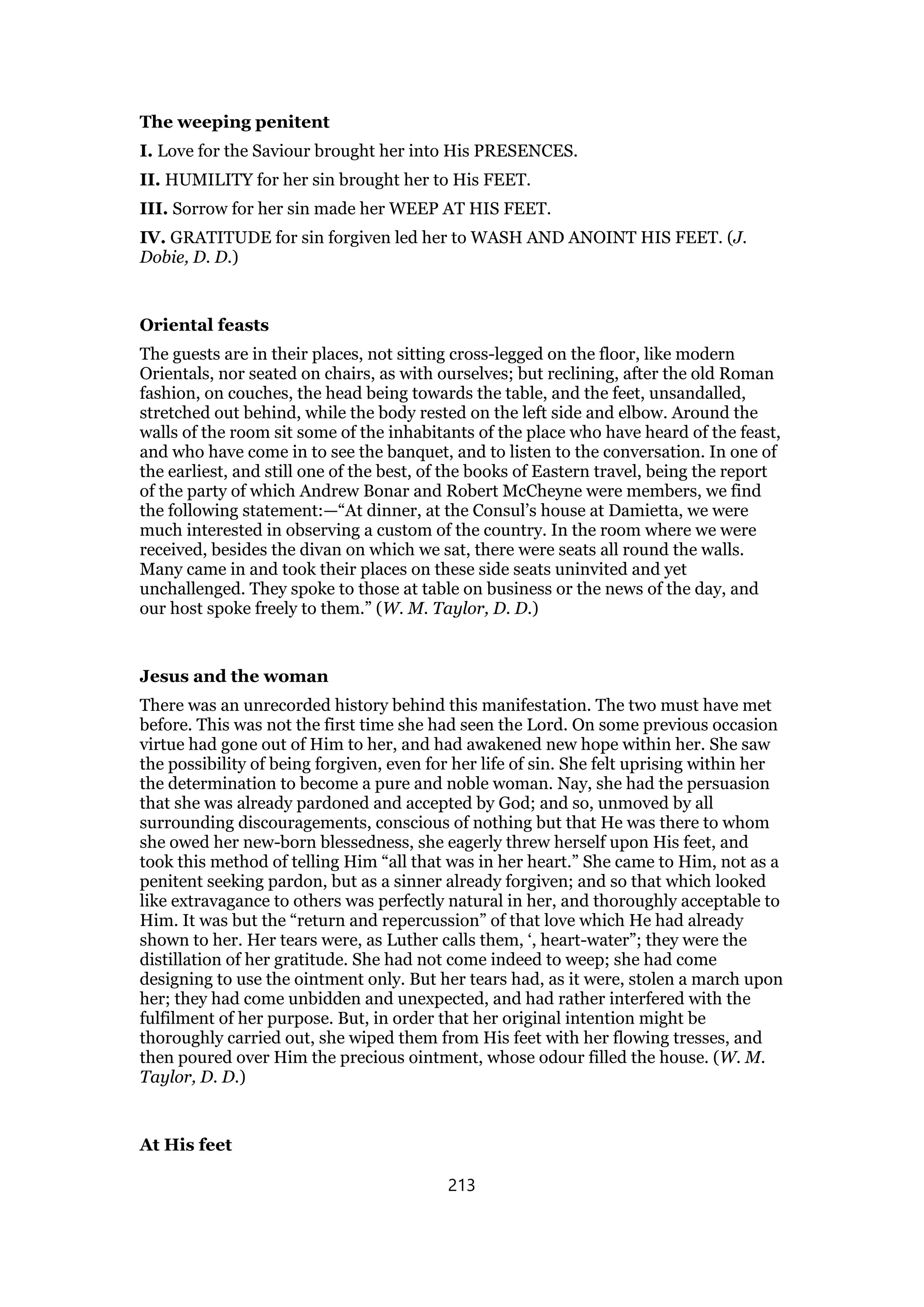







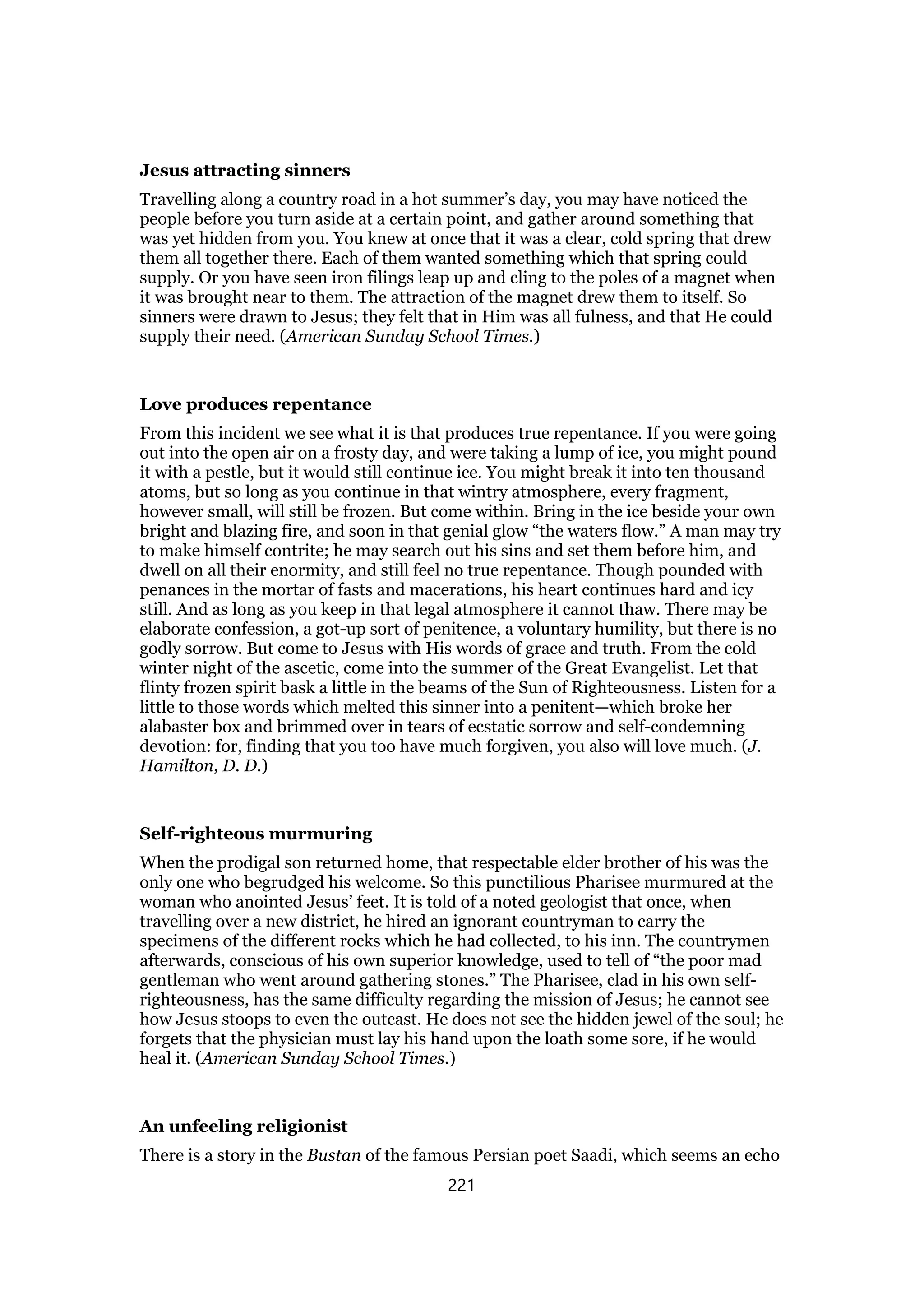

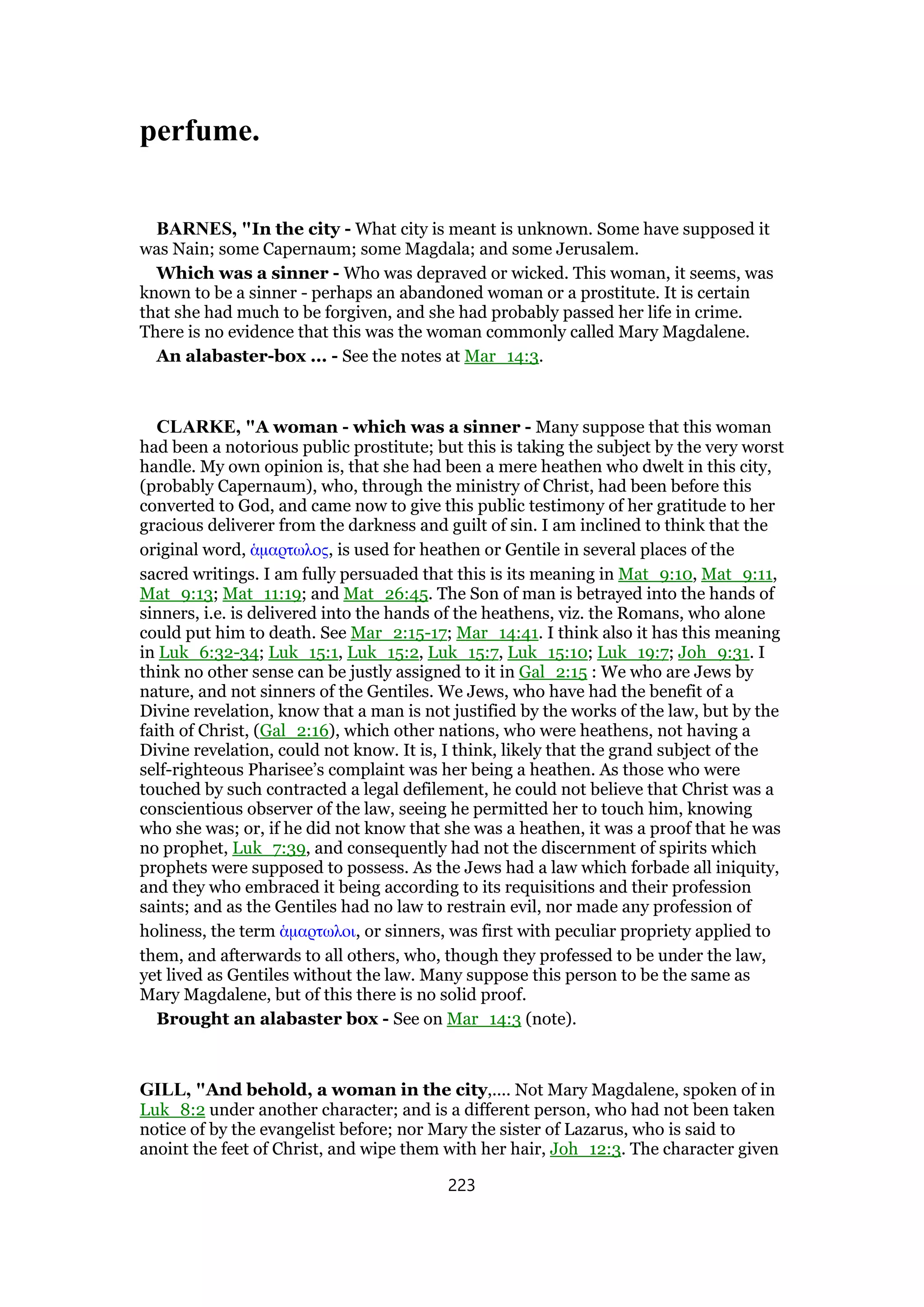
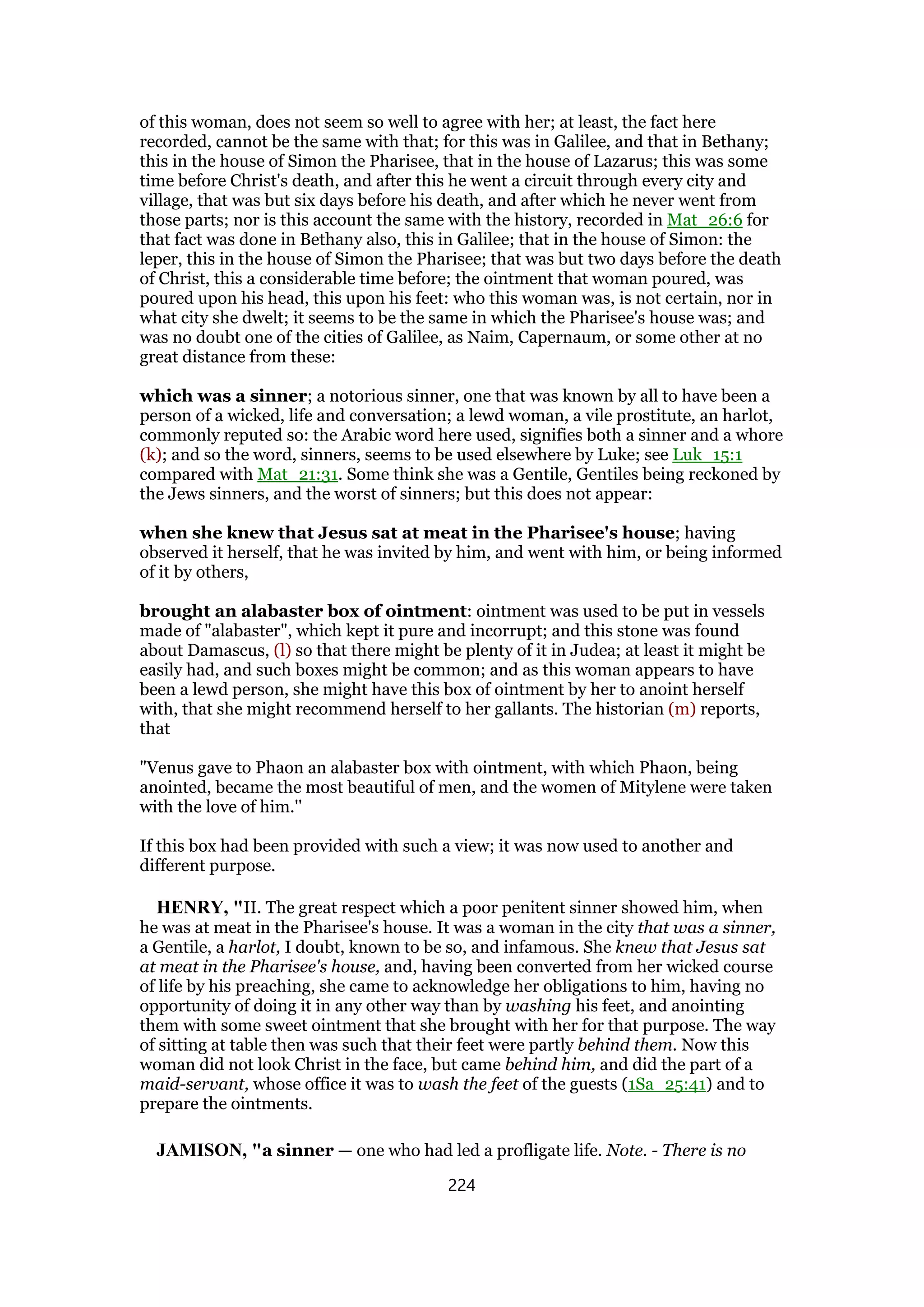
![ground whatever for the popular notion that this woman was Mary Magdalene,
nor do we know what her name was. (See on Luk_8:2.)
an alabaster box of ointment — a perfume vessel, in some cases very costly
(Joh_12:5). “The ointment has here a peculiar interest, as the offering by a penitent
of what had been an accessory in her unhallowed work of sin” [Alford].
CALVIN, "37.A woman who was a sinner The words stand literally as I have
translated them,( ἥτις ἧν ἁμαζτωλὸς.) Erasmus has chosen to take the pluperfect
tense, who Had Been a sinner, (241) lest any one should suppose that at that time
she still was a sinner But by so doing, he departed from the natural meaning; for
Luke intended to express the place which the woman held in society, and the
opinion universally entertained respecting her. Though her sudden conversion
had rendered her a different person in the sight of God from what she had
previously been, yet among men the disgrace attaching to her former life had not
yet been effaced. She was, therefore, in the general estimation of men a sinner,
that is, a woman of wicked and infamous life; and this led Simon to conclude,
though erroneously, that Christ had not the Spirit of discernment, since he was
unacquainted with that infamy which was generally known. (242)
COFFMAN, "It is hyper-ridiculous to equate this with the anointing by the
devout Mary, as recorded in the other Gospels. This person was a "sinner," and
her knowledge of what was going on in this Pharisee's house speaks volumes
about the Pharisee. Her free access to his house shows some affinity between
them, although it did not extend so far as a common attitude toward Jesus,
whom the Pharisee dishonored, and whom the woman honored. This
unfortunate daughter of Israel had fallen into a life of sin, but she recognized in
Jesus a holiness and love which opened up the fountain of her tears falling
inadvertently upon his feet, a fault (as she viewed it) which was quickly corrected
by her wiping them with her hair, and anointing them with the precious
ointment. Her kisses, lavished upon his feet, were a further expression of her love
for the Son of God.
COKE, 'Luke 7:37. Which was a sinner—box of ointment,— Who had been a
sinner—box of perfume. It is generally supposed, that the woman who anointed
our Lord in Simon's house, was she who in the Gospel is called Mary Magdalene,
for no other reason than because St. Luke, in the beginning of the following
chapter, mentions her as one of our Lord's attendants, and one out of whom he
had cast seven devils. Some indeed attempt to prove it out of the Talmud, which
mentions a lewd woman called Mary Megadella, or the plaiter, viz. of hair, an
epithet probably given to all prostitutes in those times on account of their nicety
in dress; but this has no relation to the name Magdalene. In truth Mary
Magdalene seems rather to have been a woman of high station and opulent
fortune,being mentioned by St. Luke, (ch. Luke 8:2.) even before Joanna, though
the wife of so great a man as Herod's steward. Besides, the other evangelists,
when they have occasion to speak of our Lord's female friends, commonly assign
the first place to Mary Magdalene, who was probably so called from Magdala,
the place of her birth, a town situated near the lake of Tiberias, and mentioned
Matthew 15:39. The character given to this woman, that she had been a sinner,
renders it probable that she had formerly been a harlot; for the word αμαρτωλος
225](https://image.slidesharecdn.com/luke7commentary-151222193000/75/Luke-7-commentary-225-2048.jpg)
![is frequently used in this sense: but her action on this occasion proves, that she
was now awakened to a just sight and sense of her sins. The city, in which she is
said to have lived, means Capernaum, the place of our Lord's ordinary
residence, which is often described in that general way. Probably she was
acquainted at the Pharisee's house, for she gained easy access even into the room
where the company was sitting. It may be necessary just to remark, that this is a
very different historyfrom that of Mary's anointing Christ's head alittle before
his death. See Matthew 26:6; Matthew 26:75 and the parallel places.
PETT 37-38, "And then there was a sudden interruption. It was clearly not a
large house, and there were apparently few servants, for through the doorway
there came a woman with unbound hair. It was in fact quite normal for the
doors to be left open as an act of charity so that people could enter the house
while the meal was going on, hoping either to receive a hand out, or some pearls
of wisdom from the learned men sat at table.But wa woman like this would not
have been welcomed. Unbound hair would be seen as a disgrace in a woman, and
would indicate her profession. She had heard that Jesus was sitting at a meal in
the Pharisee’s house, and she came bringing an alabaster cruse of precious
ointment.
Everything was against the woman, and she would know it. She had been dealing
with Pharisees for years. She knew that her touch was unclean, she knew that
her precious ointment had been bought with immoral earnings (or would be seen
as so), she knew that she should not enter a Pharisee’s house. But she was
determined. No doubt she wanted to anoint Jesus’ head with her ointment. And
she did so because of her faith in the fact that He would be her Saviour (Luke
7:50), and because of a consciousness of sins forgiven through her previous
contact with Him. It was because she knew that she was now clean that she felt
that she could do what she did.
So entering the house she made for where Jesus was lying on a couch by the
table. He would be lying on one elbow with His feet extended backwards. And
she took in the situation at a glance. It was clear that Jesus’ feet were still dirty
from the road. It would take her by surprise. To her he was the most important
person in the room, and she would not be able to believe that they had not had
the courtesy to arrange for His feet to be washed. Perhaps that was why she
began to weep as she realised how her beloved Master was being treated, or
perhaps she was already weeping. But it altered her whole approach. Reaching
down she wiped the dust of His feet with her tears, and then she wiped them with
her hair. Then she kissed His feet, and poured on them the precious ointment
that she had brought. How dared they treat her beloved Master like this? And to
everyone’s surprise Jesus appeared unmoved and made no effort to prevent it.
CONSTABLE, "Social custom allowed needy people to visit such meals and to
partake of some of the leftovers. [Note: Liefeld, p. 903.] Moreover it was not
unusual for people to drop in when a rabbi was visiting. [Note: Martin, p. 224.]
Luke gallantly omitted describing why the woman was a sinner, though the
commentators love to guess. Some have assumed that the woman was Mary
Magdalene, but this is pure speculation. The point was that she was a member of
226](https://image.slidesharecdn.com/luke7commentary-151222193000/75/Luke-7-commentary-226-2048.jpg)
![the social class called sinners that the Pharisees regarded as treating the law
loosely. The liquid perfume was in an expensive alabaster vial. Jewish women
frequently wore such vials suspended from a cord around their necks. [Note:
Morris, pp. 146-47.]
38 As she stood behind him at his feet weeping,
she began to wet his feet with her tears. Then
she wiped them with her hair, kissed them and
poured perfume on them.
BARNES, "Stood at his feet behind him - They reclined, at their meals, on
their left side, and their feet, therefore, were extended from the table, so that persons
could easily approach them. See the notes at Mat_23:6.
Began to wash his feet - The Jews wore sandals. These were taken off when
they entered a house. It was an act of hospitality and kindness to wash the feet of a
guest. “She” therefore began to show her love for the Saviour, and at the same time
her humility and penitence, by pouring forth a flood of tears, and washing his feet in
the manner of a servant.
Kissed his feet - The kiss was an emblem of love and affection. In this manner
she testified her love for the Lord Jesus, and at the same time her humility and sense
of sin by kissing his feet. There could be few expressions of penitence more deep and
tender than were these. A sense of all her sins rushed over her mind; her heart burst
at the remembrance of them, and at the presence of the pure Redeemer; with deep
sorrow she humbled herself and sought forgiveness. She showed her love for him by
a kiss of affection; her humility, by bathing his feet; her veneration, by breaking a
costly box - perhaps procured by a guilty life - and anointing his feet. In this way we
should all come, embracing him as the loved Redeemer, humbled at his feet, and
offering all we have - all that we have gained in lives of sin, in our professions, by
merchandise and toil, while we were sinners - offering “all” to his service. Thus shall
we show the sincerity of our repentance, and thus shall we hear his gracious voice
pronounce our sins forgiven.
CLARKE, "Stood at his feet behind him - In taking their meals, the eastern
people reclined on one side; the loins and knees being bent to make the more room,
the feet of each person were turned outwards behind him. This is the meaning of
standing Behind at his Feet.
Began to wash his feet with tears - Ηρξατο βρεχειν - τοις δακρυσι, She began to
water his feet - to let a shower of tears fall on them. As the Jews wore nothing like our
227](https://image.slidesharecdn.com/luke7commentary-151222193000/75/Luke-7-commentary-227-2048.jpg)
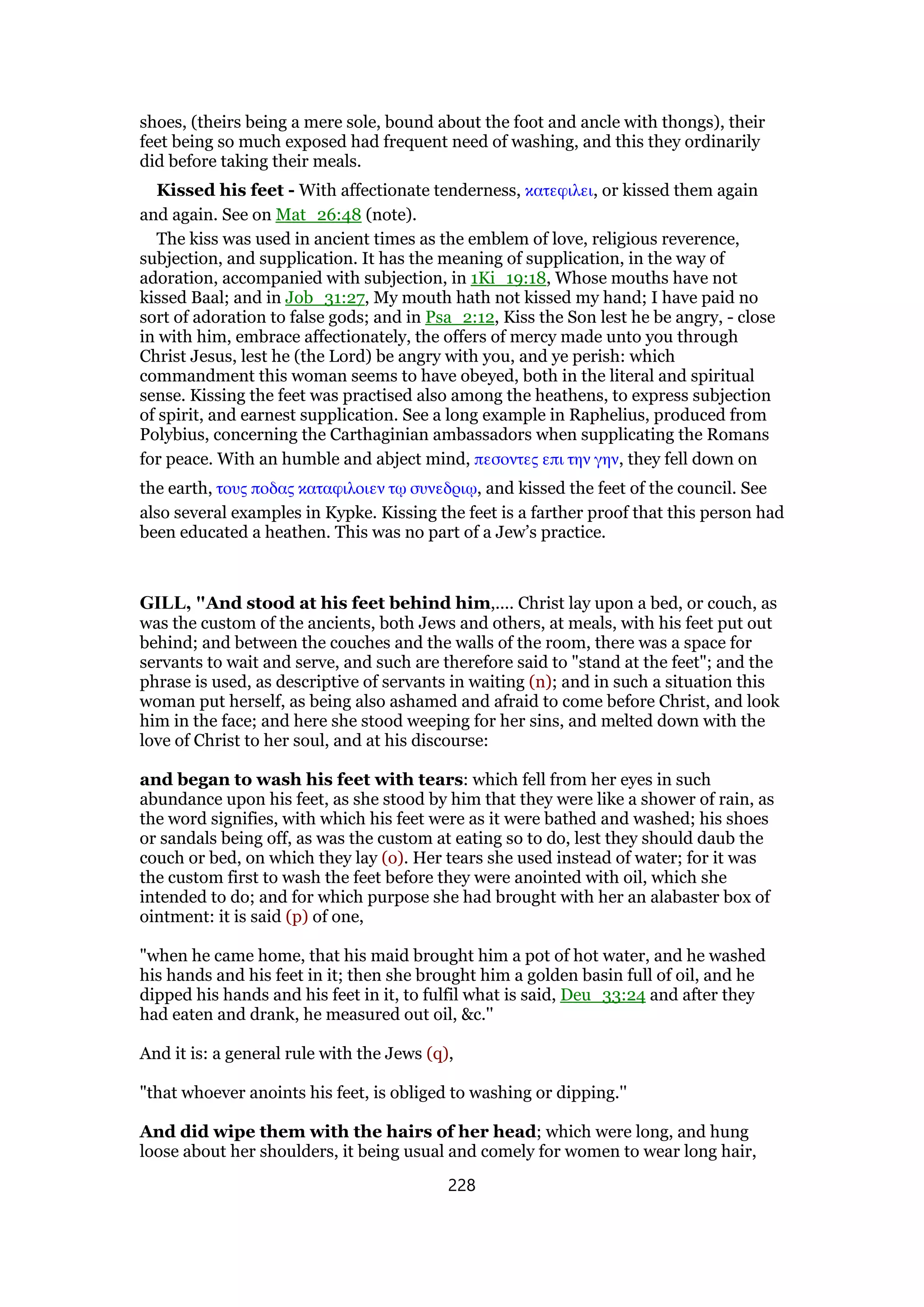
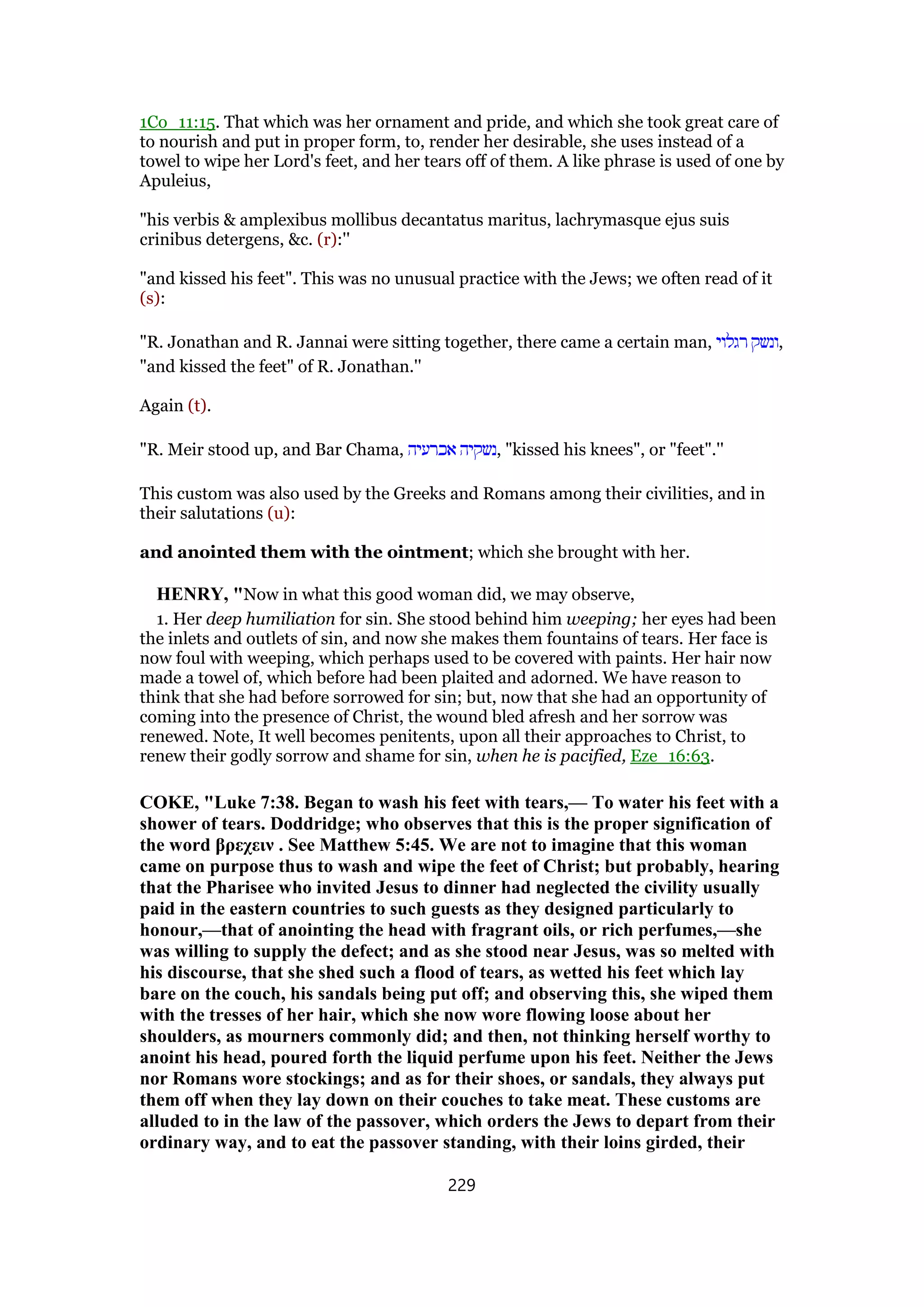
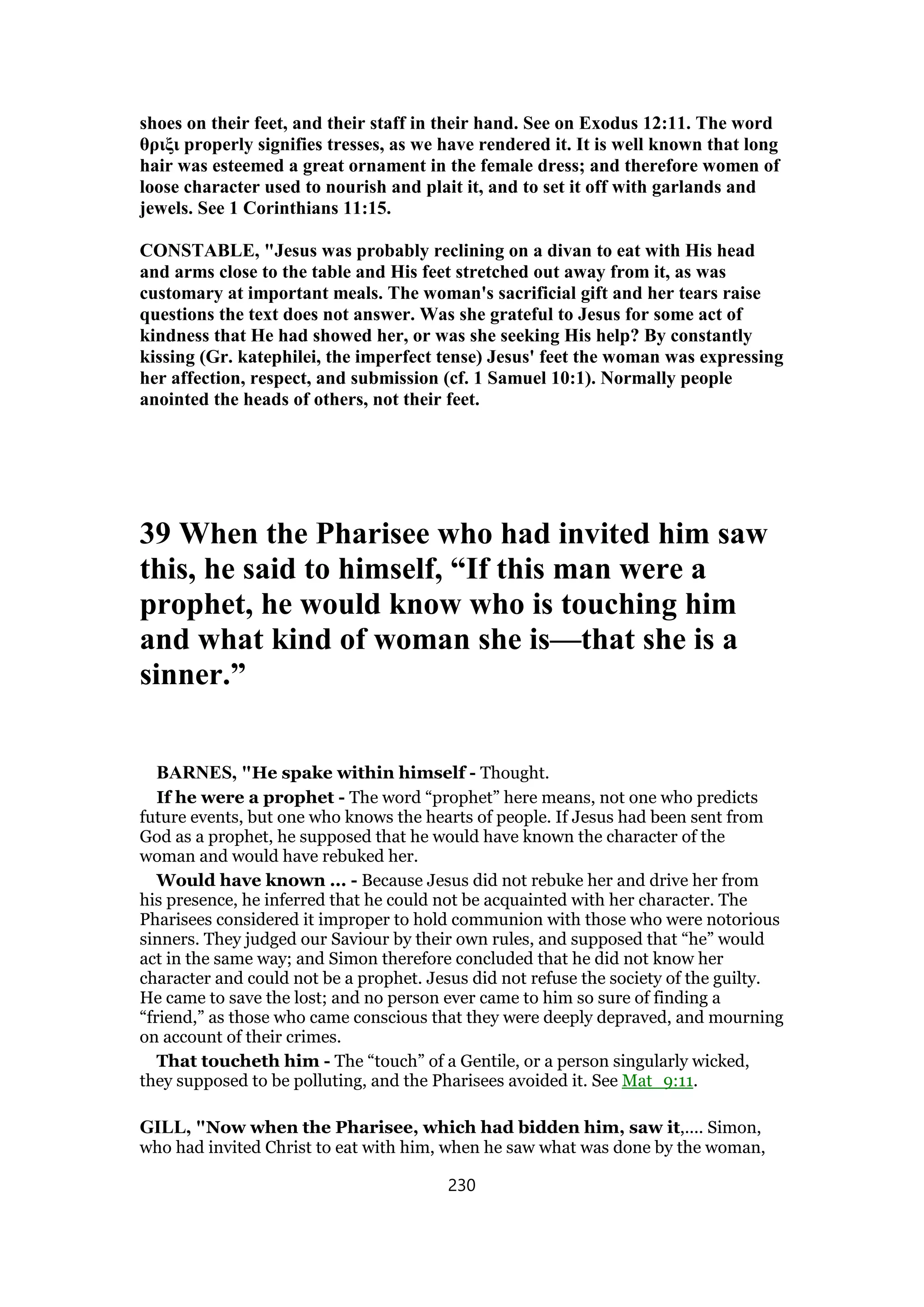
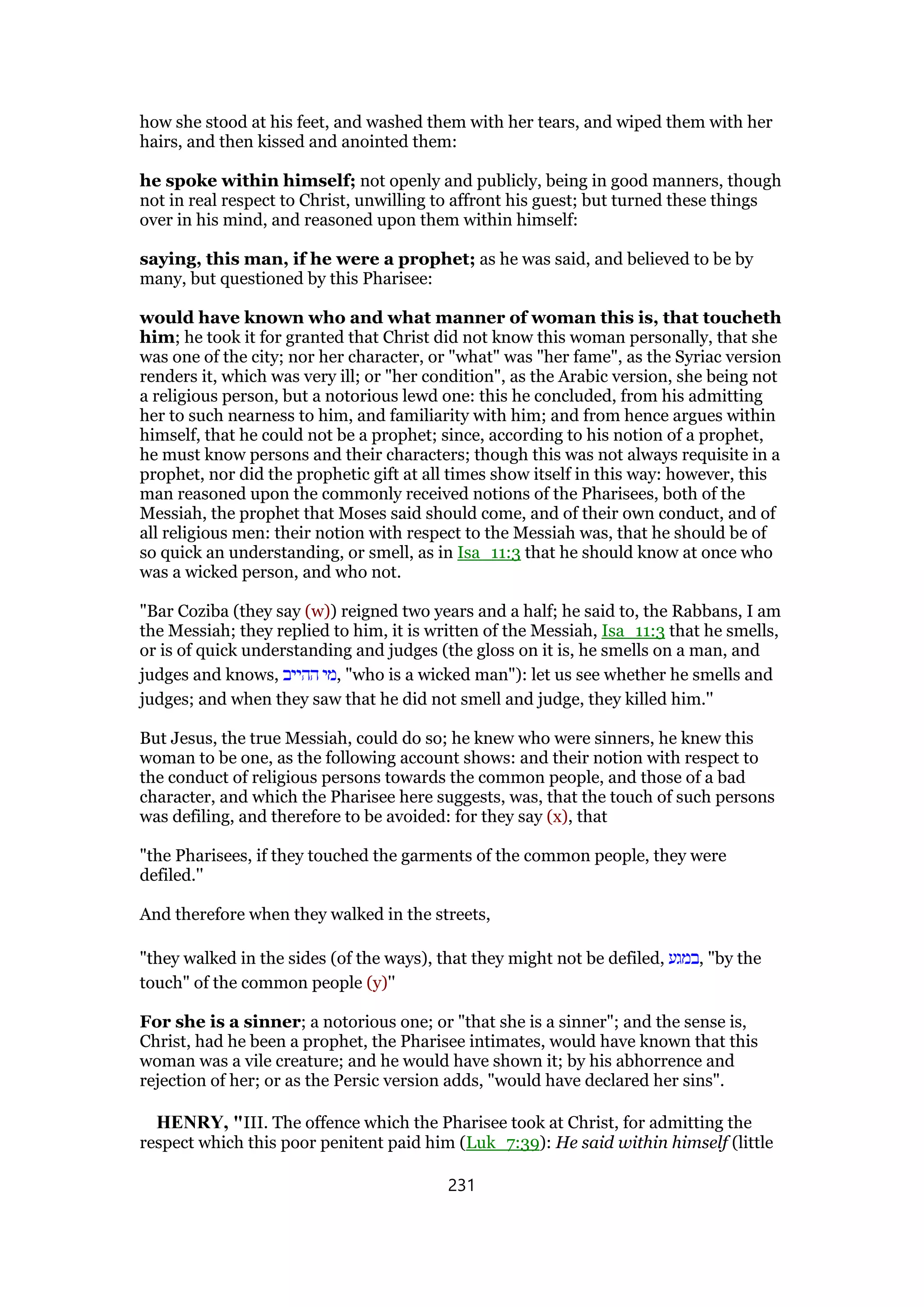
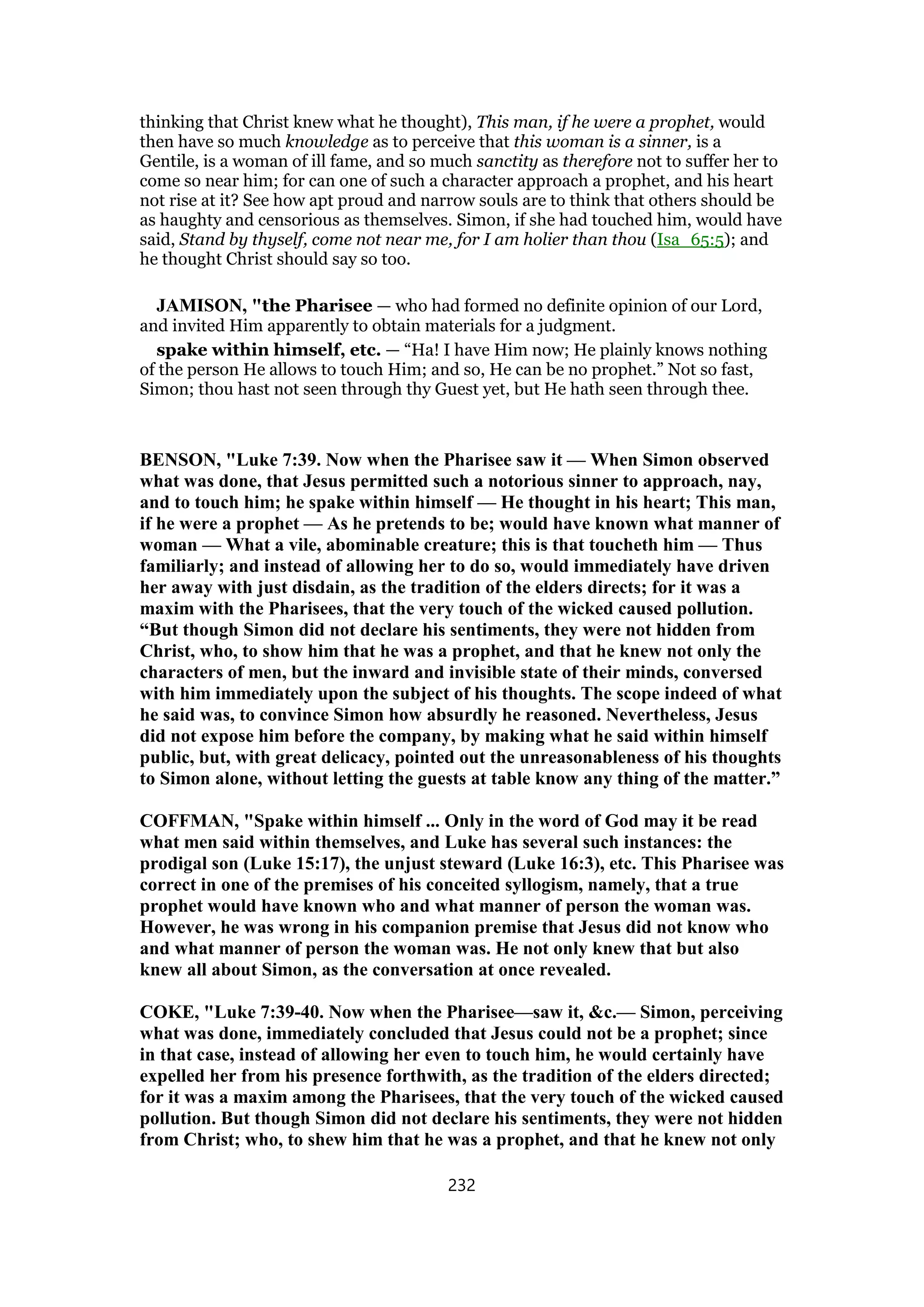



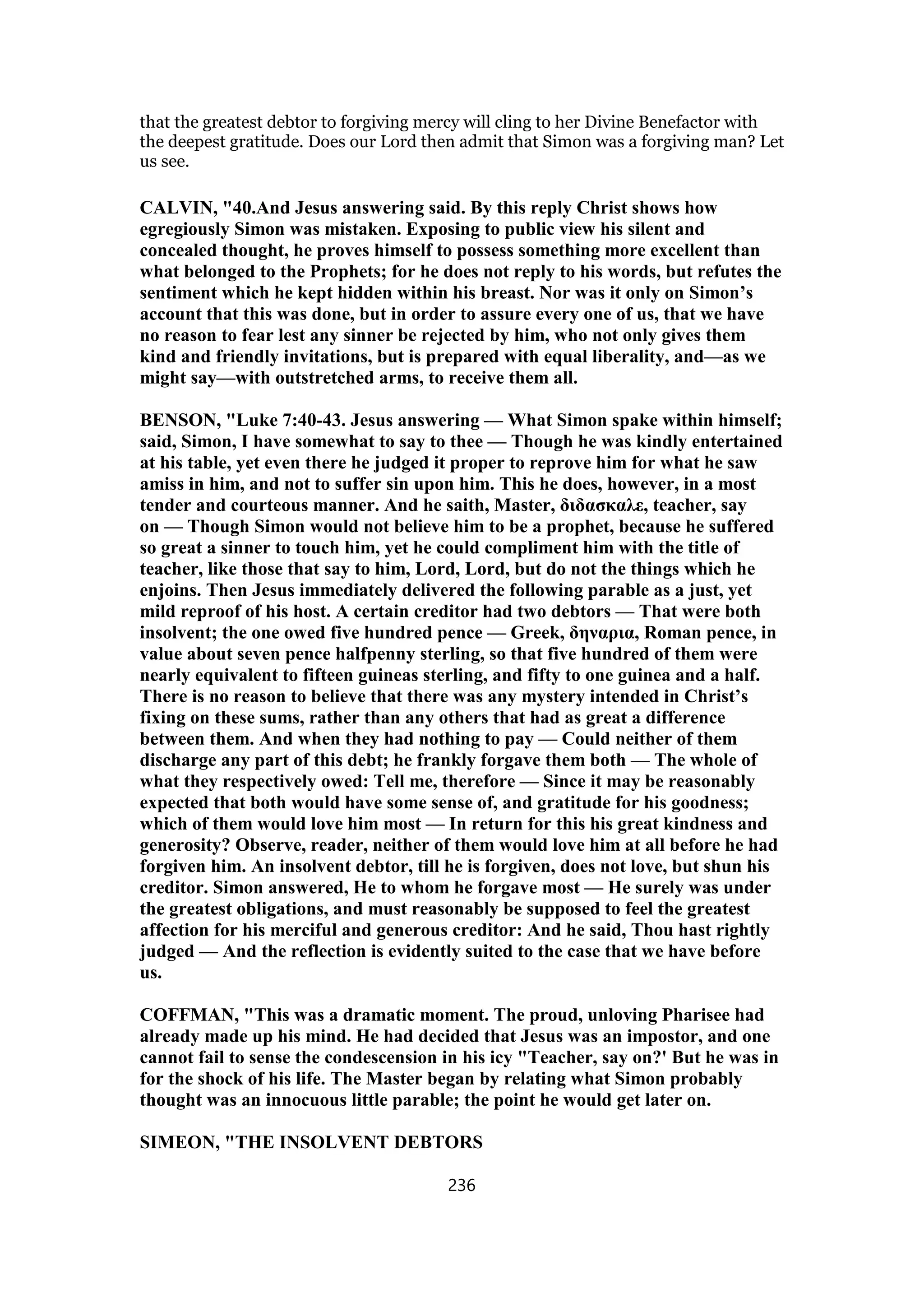
![Luke 7:40-42. And Jesus answering said unto him, Simon, I have somewhat to
say unto thee, and he saith, Master, say on. There was a certain creditor, which
had two debtors: the one owed five hundred pence, and the other fifty. And when
they had nothing to pay, he frankly forgave them both.
PARABLES are well calculated to convey reproof in the most convincing, and at
the same time in the least offensive, manner. Nothing could exceed the beauty
and efficacy of Nathan’s parable to David: that also in the text was admirably
adapted to the occasion [Note: Here the occasion should be briefly stated.].
I. The parable itself—
It presents to our view three important truths:
1. We all, though in different degrees, are debtors unto
God—
[There is not a man on earth who has not violated the law of God: but, though all
are guilty in his sight, some are far more so than others [Note: See the text.]. The
profane and profligate sinner is doubtless worse than the more decent moralist.
We must not, however, compare ourselves with others [Note: 2 Corinthians
10:12.], but try ourselves by the standard of God’s law; and if we bring ourselves
to this test, we shall find no cause for boasting, even though we may have been
preserved from gross offences.]
2. No man, however little he may owe, can discharge his
own debt—
[If we could obey the law perfectly in future, our obedience would no more
compensate for our past disobedience, than our ceasing to increase a debt would
discharge a debt we had already contracted: but we cannot fulfil all that is
required of us, or indeed perform any one action that is absolutely free from all
imperfection. How then shall we discharge our debt, when, with all our care, we
cannot but daily increase it? Nor will repentance obliterate our offences against
God’s law, any more than it will those committed against human laws. If
therefore neither obedience nor repentance can cancel our debt, we must confess
that “we have nothing to pay.”]
3. But God is willing freely to forgive us all—
[There is no such difference between one and another as can entitle any one to a
preference in God’s esteem, or procure him a readier acceptance with God.
Every one who truly repents and believes in Christ [Note: The parable was not
intended to set forth the doctrines of redemption, but merely the effect which a
sense of great obligations will produce. And, if we would infer that we have no
need of faith in the atonement, because the parable makes no mention of it, we
must infer also that we may be forgiven without repentance, since there is no
mention made of that.], shall surely obtain mercy: no recompence or composition
237](https://image.slidesharecdn.com/luke7commentary-151222193000/75/Luke-7-commentary-237-2048.jpg)
![is required to be offered by us [Note: Isaiah 55:1.]. On the contrary, an attempt
to offer any to God would absolutely preclude us from all hope of his favour
[Note: Galatians 5:4.]. None can be accepted who will not come as bankrupts;
nor shall any who come in this manner be rejected [Note: Isaiah 1:18; Isaiah
55:7.].]
Such being the import of the parable, we proceed to,
II. The improvement that is to be made of it—
Our Lord evidently intended to reprove Simon, while he vindicated both the
woman’s conduct and his own. Hence it seems proper to improve the parable,
1. For the conviction of self-righteous Pharisees—
[Persons who think their debts small, feel little love to the Saviour themselves,
and are ready to censure those who do love him. While they approve of zeal in
every thing else, they condemn it in religion. But this disposition shews that their
seeming piety is mere hypocrisy. If they had any true grace, they would delight to
see Christ honoured, and to honour him themselves.]
2. For the vindication of zealous Christians—
[We would not plead for a zeal that is without knowledge: but such a zeal as this
grateful penitent discovered must be vindicated, though the whole world should
condemn it. Are there any then who weep at the Saviour’s feet, and who seek by
all means in their power to honour him? Let them go on boldly, yet modestly,
fearing neither loss nor shame in so good a cause; and let them know, that he, for
whom they suffer, will soon testify his approbation of them before the assembled
universe.]
3. For the encouragement of all penitent sinners—
[Our Lord, both in the parable, and in his address to the woman, shewed that no
sinner, however vile, should be spurned from his feet: he even declared to her
accusers, and revealed to her own soul, that he had pardoned her sins.
Henceforth then let no man despair of obtaining mercy at his hands. Only let us
acknowledge to him our inability to pay our own debt, and he will say to us, as to
the woman, “Depart in peace, thy sins are forgiven thee.”]
41 “Two people owed money to a certain
moneylender. One owed him five hundred
238](https://image.slidesharecdn.com/luke7commentary-151222193000/75/Luke-7-commentary-238-2048.jpg)
![denarii,[c] and the other fifty.
BARNES, "A certain creditor - A man who had lent money or sold property,
the payment for which was yet due.
Five hundred pence - About 69 dollars 26 cents, or 14 British pounds, 11
shilling, 8d. See the notes at Mat_18:28.
Fifty - About 7 dollars, or 1 British pound, 9 shillings, and 2d.
CLARKE, "A certain creditor, etc. - It is plain that in this parable our Lord
means, by the creditor, God, and, by the two debtors, Simon and the woman who was
present. Simon, who had the light of the law, and who, in consequence of his
profession as a Pharisee, was obliged to abstain from outward iniquity, might be
considered as the debtor who owed only fifty pence, or denarii. The woman, whom I
have supposed to be a heathen, not having these advantages, having no rule to
regulate her actions, and no curb on her evil propensities, may be considered as the
debtor who owed five hundred pence, or denarii. And when both were compared,
Simon’s debt to God might be considered, in reference to hers, as fifty to five
hundred. However, we find, notwithstanding this great disparity, both were
insolvent. Simon, the religious Pharisee, could no more pay his fifty to God than this
poor heathen her five hundred; and, if both be not freely forgiven by the Divine
mercy, both must finally perish. Having Nothing to Pay, he kindly Forgave them
both. Some think that this very Simon was no inconsiderable debtor to our Lord, as
having been mercifully cleansed from a leprosy; for he is supposed to be the same as
Simon the leper. See the note on Mat_26:6.
GILL, "There was a certain creditor,.... All the Oriental versions premise
something to this. The Syriac version reads, "Jesus said unto him". The Arabic
version, "then he said". The Persic version, "Jesus said"; and the Ethiopic version,
"and he said to him"; and something of this kind is understood, and to be supplied in
the text:
which had two debtors, the one owed five hundred pence, and the other
fifty; these were, as the word shows, Roman "denarii" or "pence"; the former of
these sums, reckoning a Roman penny at seven pence halfpenny of our money,
amounted to fifteen pounds and twelve shillings and six pence; and the latter, to one
pound eleven shillings and three pence; the one of these sums was ten times larger,
than the other. This is a parable: by "the creditor", God is meant, to whom men owe
their beings, and the preservation of them, and all the mercies of life; and are under
obligation to obedience and thankfulness: hence: no man can merit any thing of God,
or pay off any old debt, by a new act of obedience, since all is due to him: by the "two
debtors" are meant, greater and lesser sinners: all sins are debts, and all sinners are
debtors; not debtors to sin, for then it would not be criminal, but lawful to commit
sin, and God must be pleased with it, which he is not, and men might promise
themselves impunity, which they cannot; but they are debtors to fulfil the law, and in
case of failure, are bound to the debt of punishment: and of these debtors and debts,
some are greater, and others less; not but that they, are all equally sinners in Adam,
239](https://image.slidesharecdn.com/luke7commentary-151222193000/75/Luke-7-commentary-239-2048.jpg)
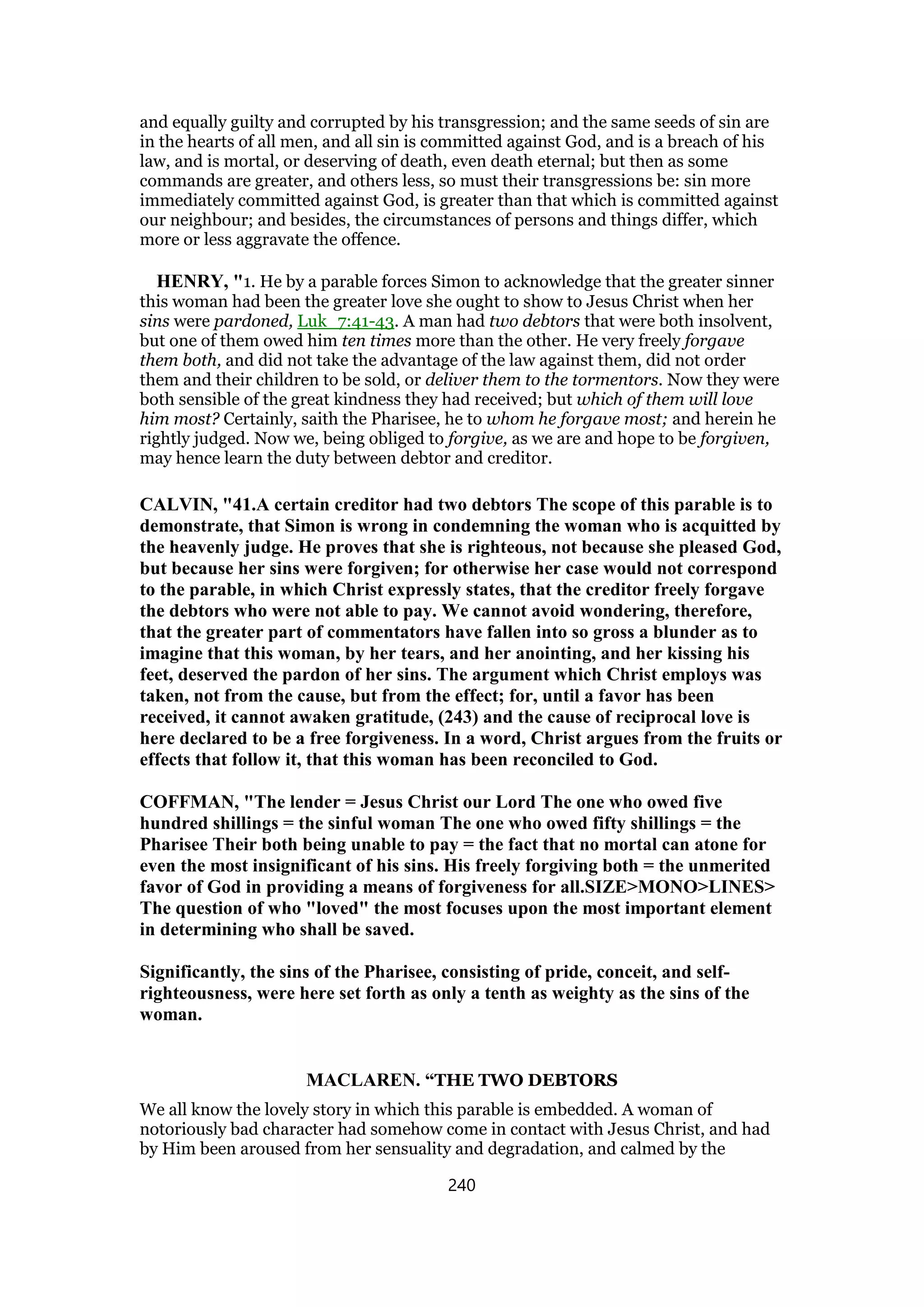

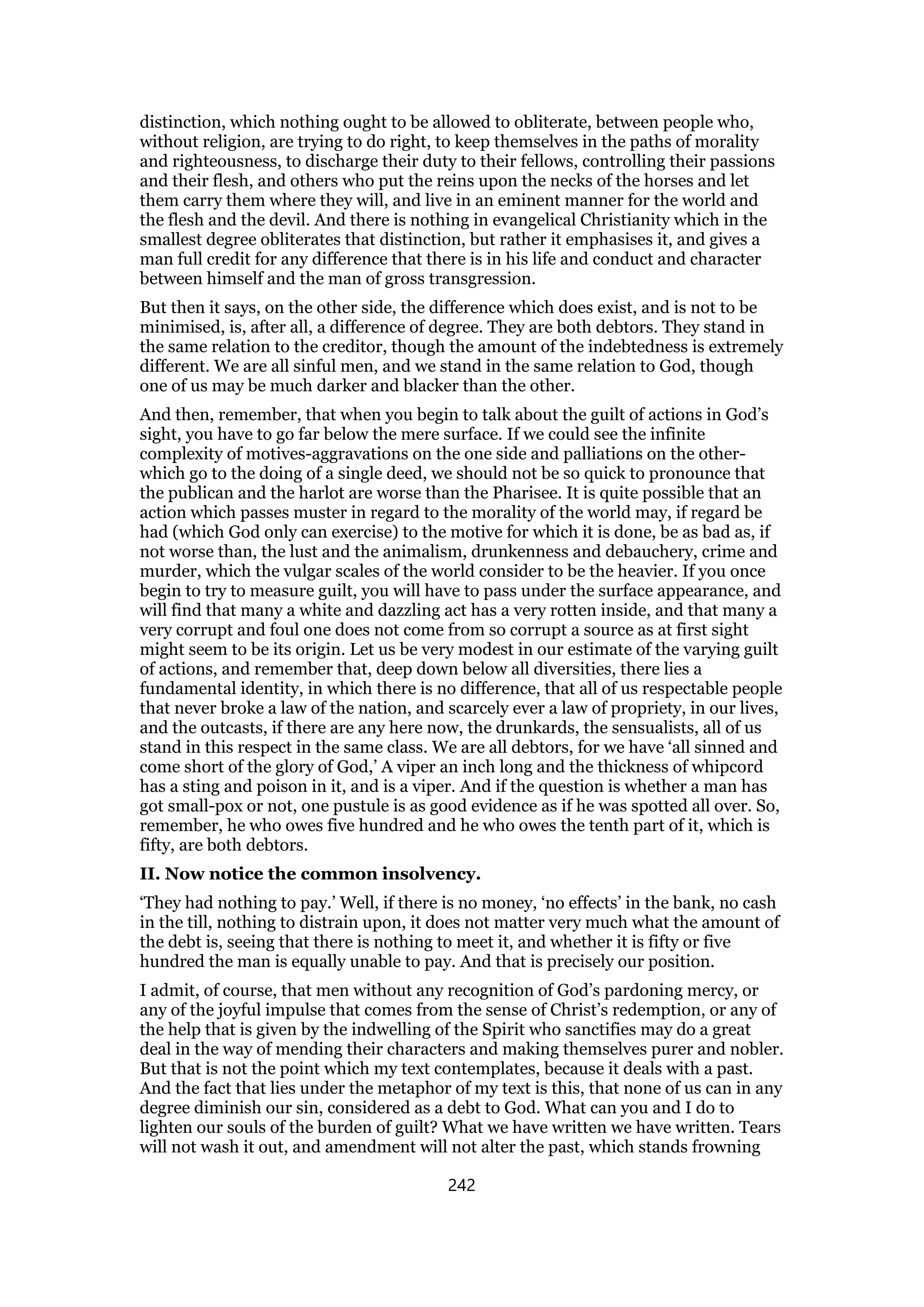
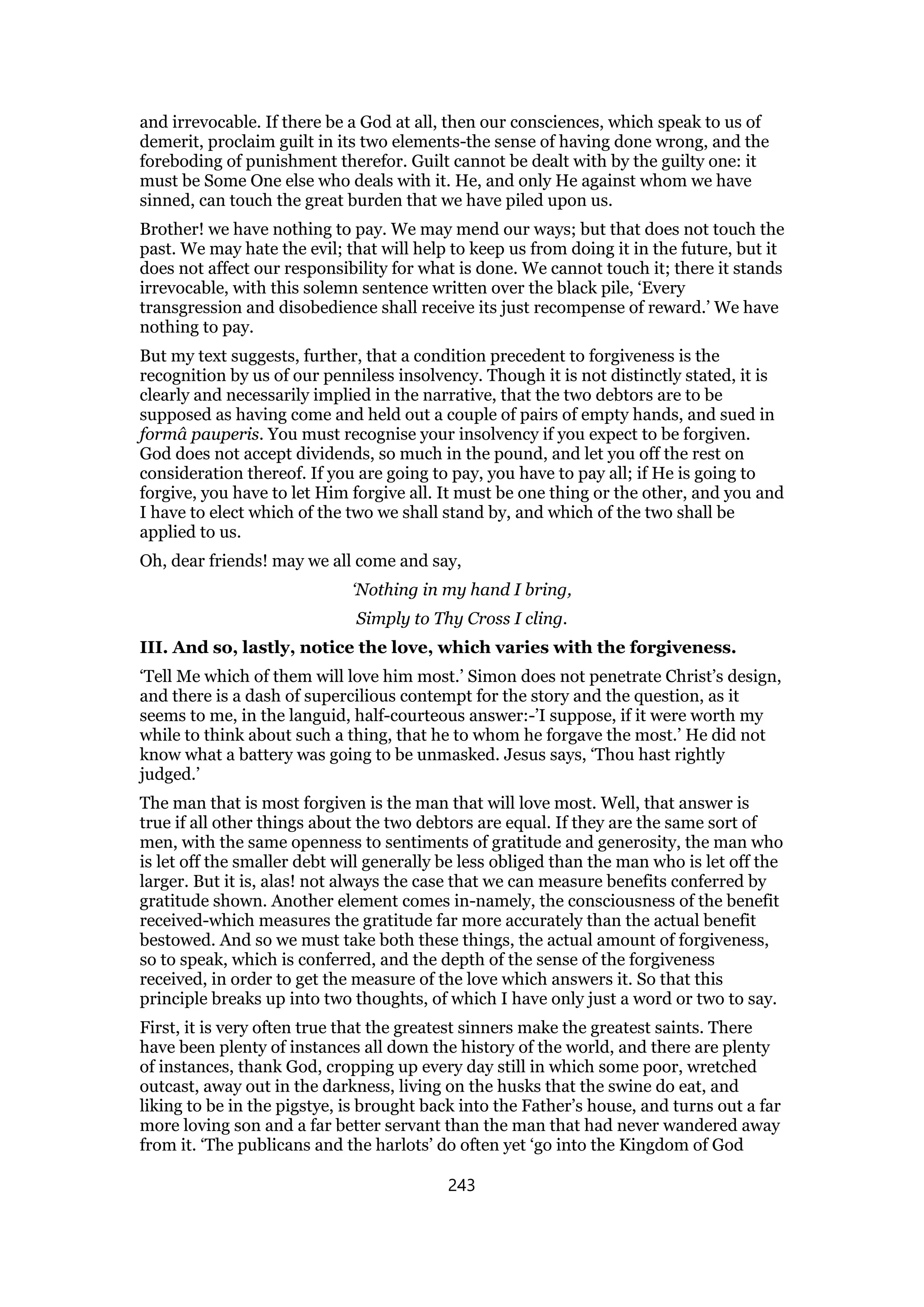



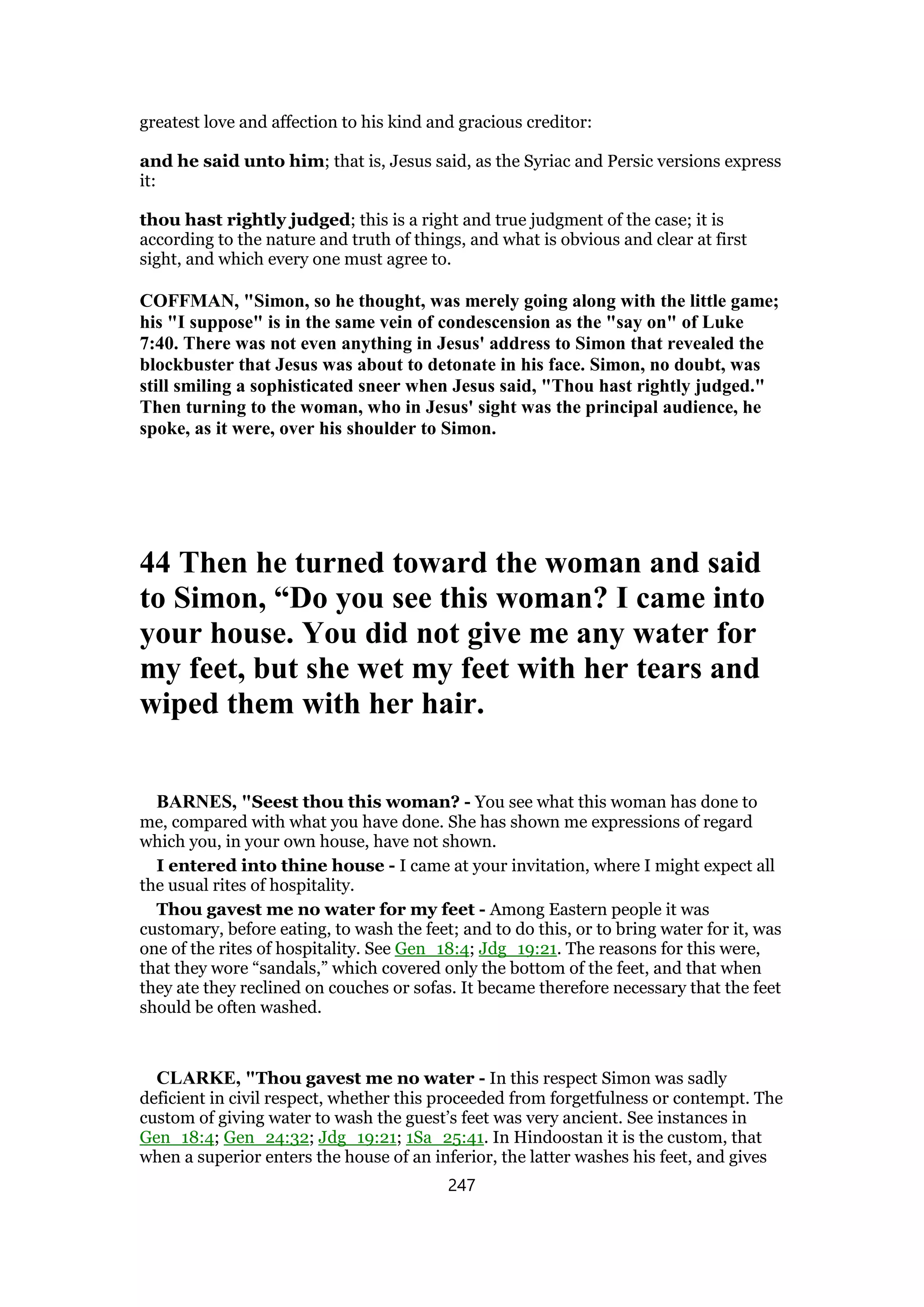
![him water to rinse his mouth before he eats. See Ayeen Akbery, vol. iii. p. 226.
GILL, "And he turned to the woman,.... That stood behind him at his feet,
and said to Simon, seest thou this woman? and what she has done? pointing to
her, and comparing him, and her, and their actions together, whereby he might judge
of the preceding parable, and how fitly it might be applied to the present case:
I entered into thine house; not of his own accord, but by the invitation of Simon,
and therefore might have expected the usual civilities:
thou gavest me no water for my feet: to wash them with, no, not so much as
water; a civility very common in those hot countries, where walking without
stockings, and only with sandals, they needed often washing; and which was very
refreshing, and was not only used to travellers and strangers, but to guests, and was
usually done by the servants of the house; See Gill on Luk_7:38.
but she hath washed my feet with tears. The Persic version reads, "with the
tears of her eyes"; which made a bath for his feet;
and wiped them with the hairs of her head. The Vulgate Latin, Syriac, Persic,
and Ethiopic versions read only, "with her hair", which she used instead of a towel,
when Simon neither gave him water to wash with, nor a towel to wipe with.
HENRY, "(1.) The debtor, if he have any thing to pay, ought to make satisfaction
to his creditor. No man can reckon any thing his own or have any comfortable
enjoyment of it, but that which is so when all his debts are paid.
(2.) If God in his providence have disabled the debtor to pay his debt, the creditor
ought not to be severe with him, nor to go to the utmost rigour of the law with him,
but freely to forgive him. Summum jus est summa injuria - The law stretched into
rigour becomes unjust. Let the unmerciful creditor read that parable, Mat_18:23,
etc., and tremble; for they shall have judgment without mercy that show no mercy.
(3.) The debtor that has found his creditors merciful ought to be very grateful to
them; and, if he cannot otherwise recompense them, ought to love them. Some
insolvent debtors, instead of being grateful, are spiteful, to their creditors that lose
by them, and cannot give them a good word, only because they complain, whereas
losers may have leave to speak. But this parable speaks of God as the Creator (or
rather of the Lord Jesus himself, for he it is that forgives, and is beloved by, the
debtor) and sinners are the debtors: and so we may learn here, [1.] That sin is a debt,
and sinners are debtors to God Almighty. As creatures, we owe a debt, a debt of
obedience to the precept of the law, and, for non-payment of that, as sinners, we
become liable to the penalty. We have not paid our rent; nay, we have wasted our
Lord's goods, and so we become debtors. God has an action against us for the injury
we have done him, and the omission of our duty to him. [2.] That some are deeper in
debt to God, by reason of sin, than others are: One owed five hundred pence and the
other fifty. The Pharisee was the less debtor, yet he a debtor too, which was more
than he thought himself, but rather that God was his debtor, Luk_18:10, Luk_18:11.
This woman, that had been a scandalous notorious sinner, was the greater debtor.
Some sinners are in themselves greater debtors than others, and some sinners, by
reason of divers aggravating circumstances, greater debtors; as those that have
sinned most openly and scandalously, that have sinned against greater light and
248](https://image.slidesharecdn.com/luke7commentary-151222193000/75/Luke-7-commentary-248-2048.jpg)
![knowledge, more convictions and warnings, and more mercies and means. [3.] That,
whether our debt be more or less, it is more than we are able to pay: They had
nothing to pay, nothing at all to make a composition with; for the debt is great, and
we have nothing at all to pay it with. Silver and gold will not pay our debt, nor will
sacrifice and offering, no, not thousands of rams. No righteousness of our own will
pay it, no, not our repentance and obedience for the future; for it is what we are
already bound to, and it is God that works it within us. [4.] That the God of heaven is
ready to forgive, frankly to forgive, poor sinners, upon gospel terms, though their
debt be ever so great. If we repent, and believe in Christ, our iniquity shall not be our
ruin, it shall not be laid to our charge. God has proclaimed his name gracious and
merciful, and ready to forgive sin; and, his Son having purchased pardon for penitent
believers, his gospel promises it to them, and his Spirit seals it and gives them the
comfort of it. [5.] That those who have their sins pardoned are obliged to love him
that pardoned them; and the more is forgiven them, the more they should love him.
The greater sinners any have been before their conversion, the greater saints they
should be after, the more they should study to do for God, and the more their hearts
should be enlarged in obedience. When a persecuting Saul became a preaching Paul
he laboured more abundantly.
2. He applies this parable to the different temper and conduct of the Pharisee and the
sinner towards Christ. Though the Pharisee would not allow Christ to be a prophet,
Christ seems ready to allow him to be in a justified state, and that he was one
forgiven, though to him less was forgiven. He did indeed show some love to Christ,
in inviting him to his house, but nothing to what this poor woman showed.
“Observe,” saith Christ to him, “she is one that has much forgiven her, and therefore,
according to thine own judgment, it might be expected that she should love much
more than thou dost, and so it appears. Seest thou this woman? Luk_7:44. Thou
lookest upon her with contempt, but consider how much kinder a friend she is to me
than thou art; should I then accept thy kindness, and refuse hers?” (1.) “Thou didst
not so much as order a basin of water to be brought, to wash my feet in, when I came
in, wearied and dirtied with my walk, which would have been some refreshment to
me; but she has done much more: she has washed my feet with tears, tears of
affection to me, tears of affliction for sin, and has wiped them with the hairs of her
head, in token of her great love to me.”
JAMISON, "I entered ... no water — a compliment to guests. Was this “much
love?” Was it any?
CALVIN, "44.And turning to the woman. The Lord appears to compare Simon
with the woman, in such a manner as to make him chargeable with nothing more
than light offenses. But this is spoken only in the way of concession. “Suppose
now, Simon,” he says, “that the guilt from which God discharges thee was light,
(244) and that this woman has been guilty of many and very heinous offenses.
Yet you see how she proves by the effect that she has obtained pardon. For what
mean those profuse tears, those frequent kisses of the feet, that precious
ointment? What mean they but to acknowledge, that she had been weighed down
by an enormous burden of condemnation? And now she regards the mercy of
God with fervor of love proportioned to her conviction that her necessity had
been great.”
From the words of Christ, therefore, we are not at liberty to infer, that Simon
had been a debtor to a small amount, or that he was absolved from guilt. (245) It
249](https://image.slidesharecdn.com/luke7commentary-151222193000/75/Luke-7-commentary-249-2048.jpg)
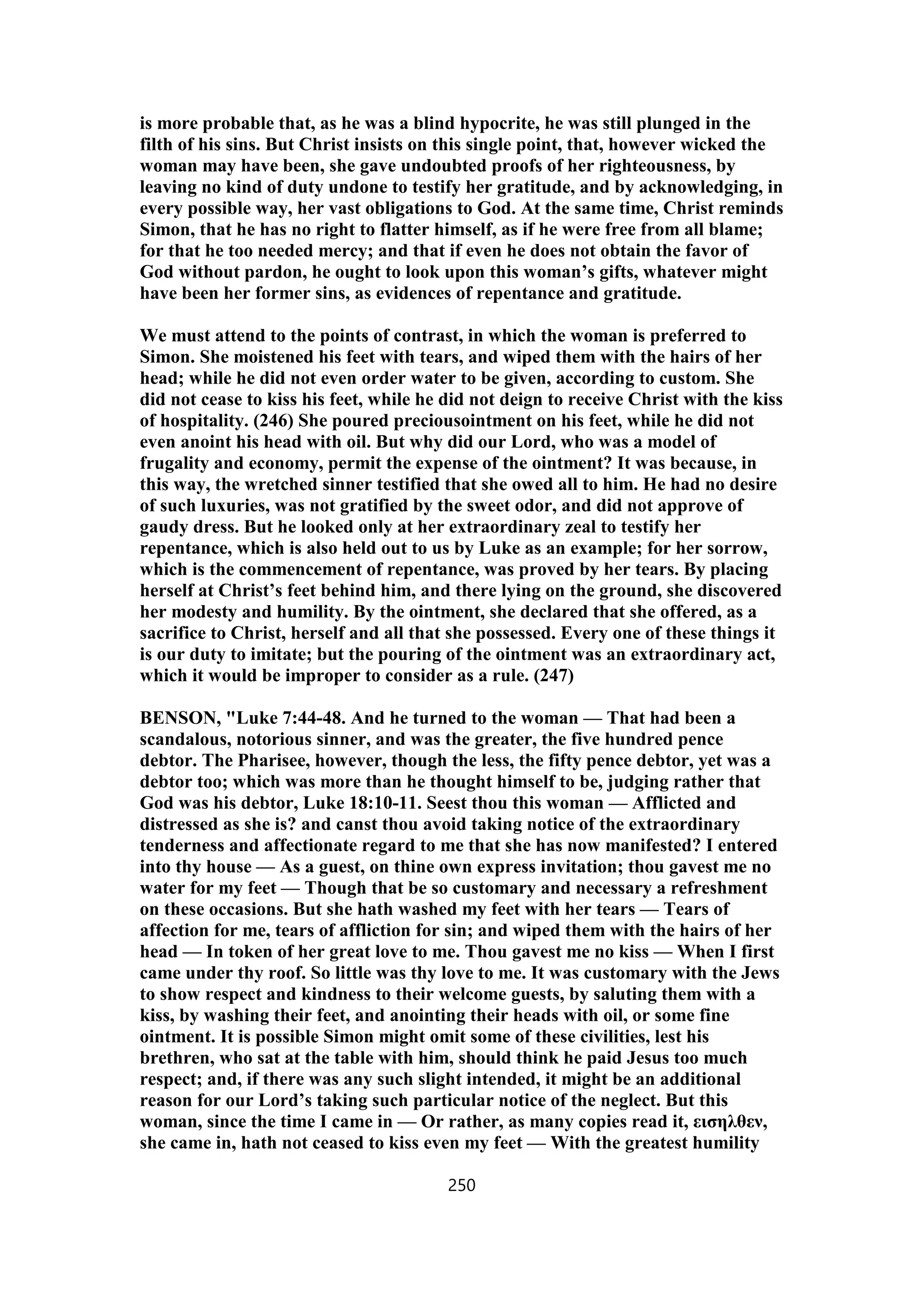




![performed any special acts of hospitality on Jesus. [Note: A. E. Harvey, The New
English Bible: Companion to the New Testament, p. 244.] The scented oil in view
would have been olive oil that was plentiful and inexpensive. The woman,
however, had gone far beyond courtesy and had made unusual sacrifices for
Jesus out of love. Simon appears in the incident as the greater sinner of the two.
45 You did not give me a kiss, but this woman,
from the time I entered, has not stopped kissing
my feet.
BARNES, "Thou gavest me no kiss - The kiss was a token of affection or a
common mode of salutation, and Simon had even neglected this mark of welcoming
him to his house. It was often used among “men” as a sign of salutation. Compare
Gen_33:4; Exo_18:7; Mat_26:49.
Hath not ceased to kiss my feet - How striking the difference between the
conduct of Simon and this woman! He, with all the richness of a splendid
preparation, had omitted the common marks of regard and affection. She, in
humility, had bowed at his feet, had watered them with tears, and had not ceased to
kiss them. The most splendid entertainments do not always express the greatest
welcome. There may be in such entertainments much insincerity - much seeking of
popularity or some other motive; but no such motive could have operated in inducing
a broken-hearted sinner to wash the Saviour’s “feet” with tears.
CLARKE, "Since the time I came in - Rather, Since the time She came in, αφ’
ᅧς εισηλθεν, not εισηλθον, I came in, for it is clear from Luk_7:37 that the woman
came in after Christ, having heard that he was sitting at meat in the Pharisee’s house.
The reading which I have adopted is supported by several MSS. and Versions.
GILL, "Thou gavest me no kiss,.... A token of civility among friends, when they
met together on any occasion. The Jews have a saying (b), that
"all kisses are foolish, excepting three; the kiss of grandeur or dignity, as in 1Sa_10:1
and the kiss at parting, as in Rth_1:14 and the kiss at meeting, as in Exo_4:27 (of
which sort this kiss may be thought to be), to which some add the kiss of
consanguinity (or that used by relations to one another), as in Gen_29:11'
but this woman, since the time I came in. The Vulgate Latin and Syriac
versions read, "since she came in"; and so two of Stephens's copies; which seems to
be the more agreeable reading, seeing Christ was in Simon's house before this
woman came; for she knowing that he was there, came thither after him:
255](https://image.slidesharecdn.com/luke7commentary-151222193000/75/Luke-7-commentary-255-2048.jpg)
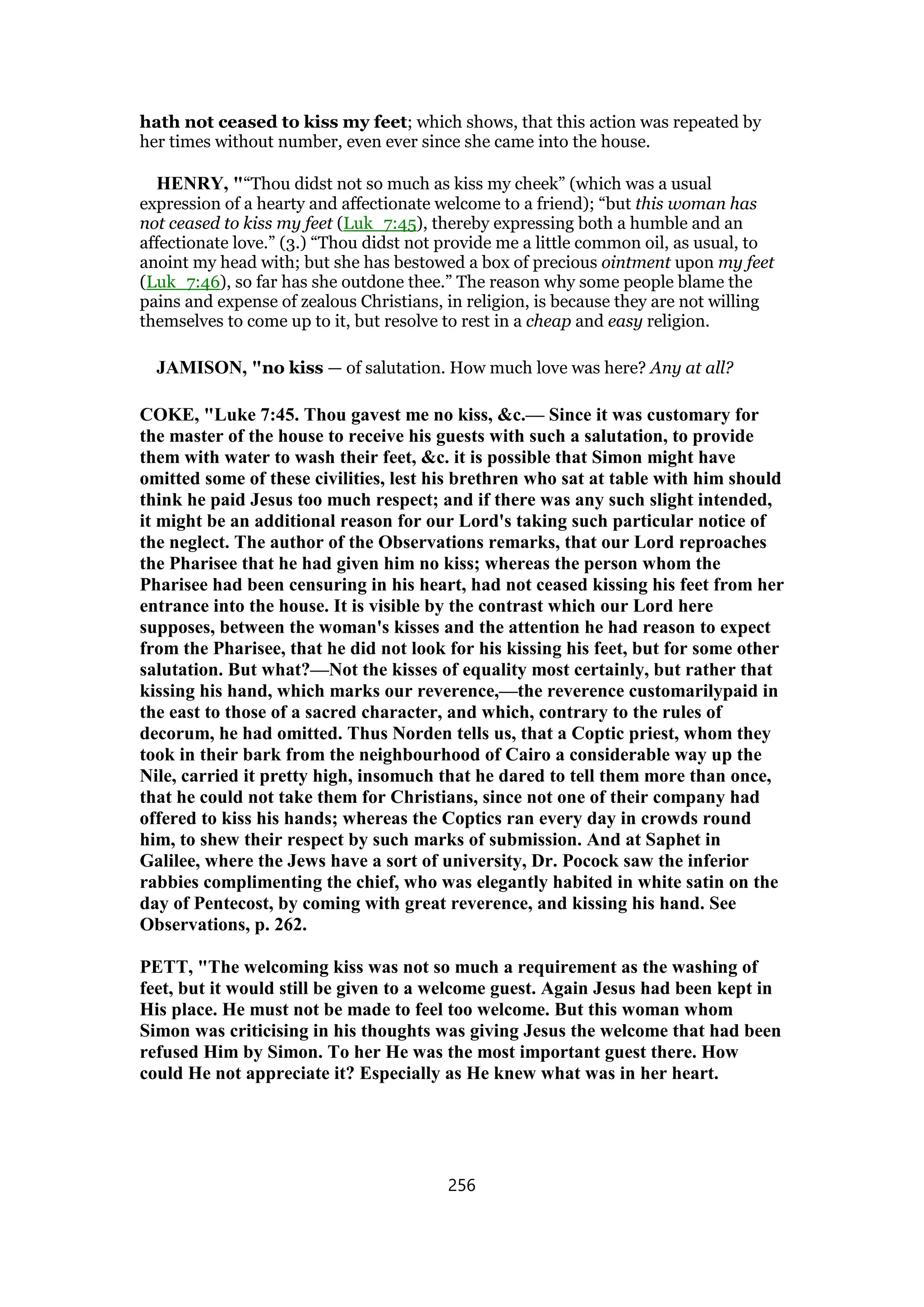





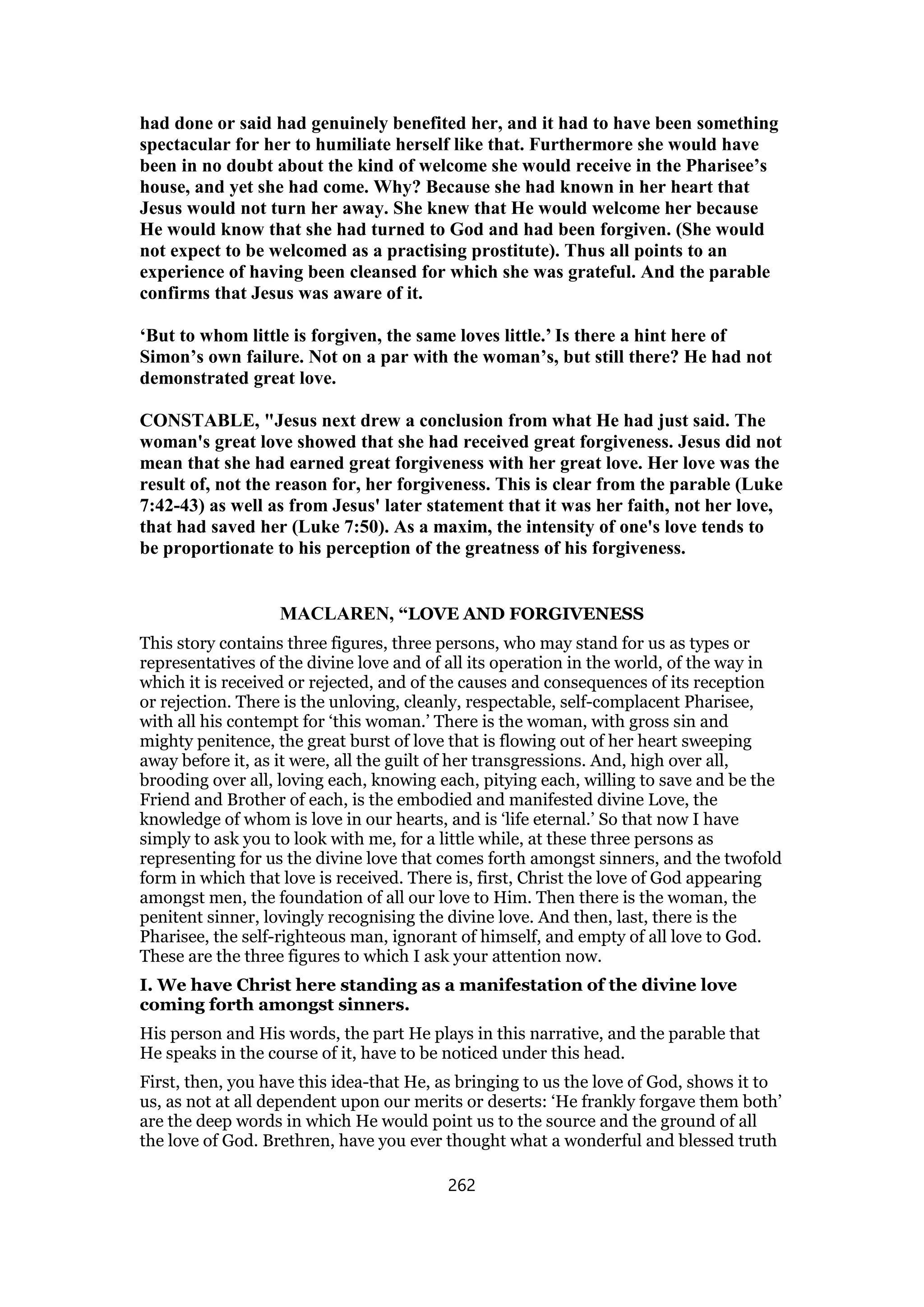
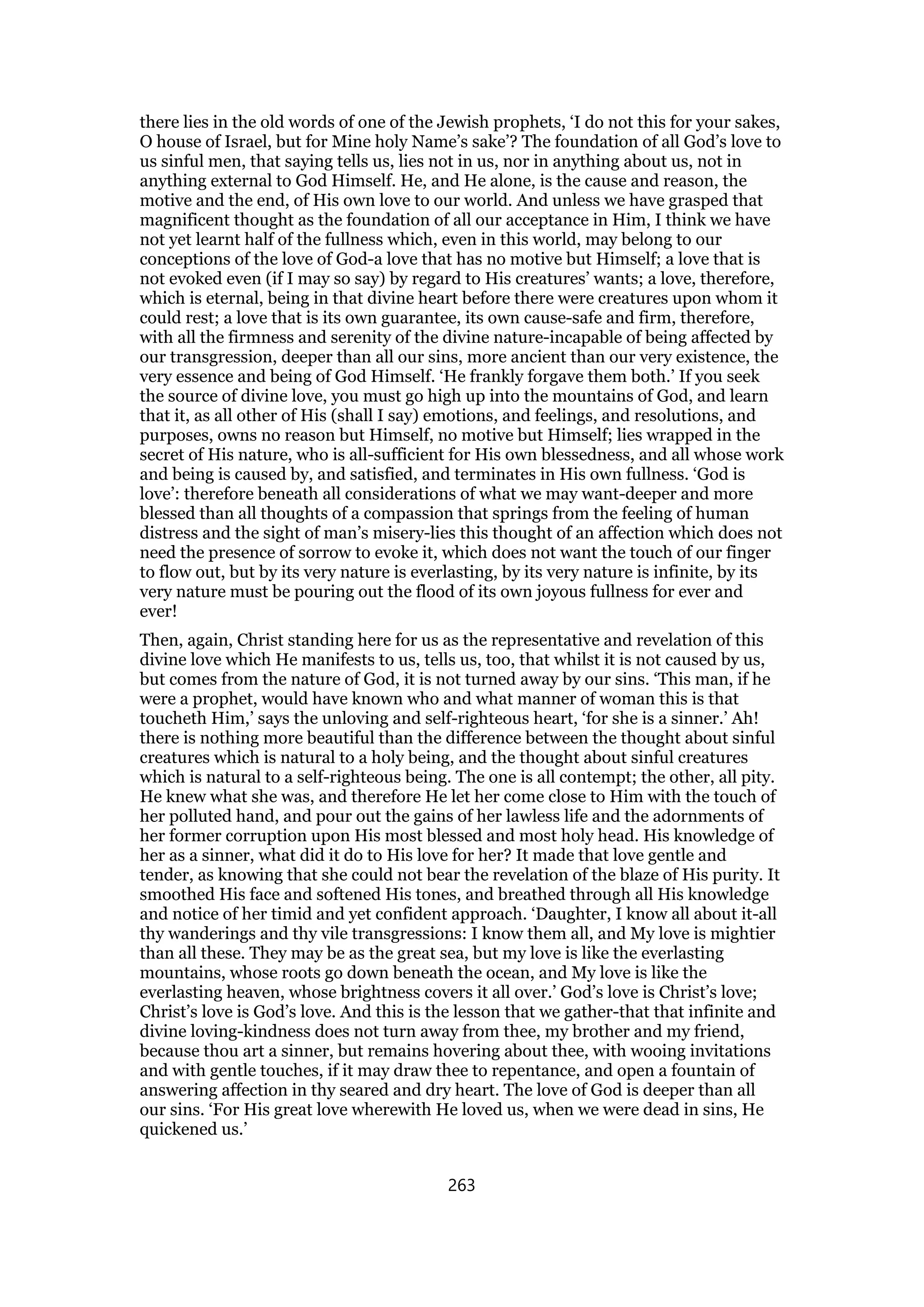
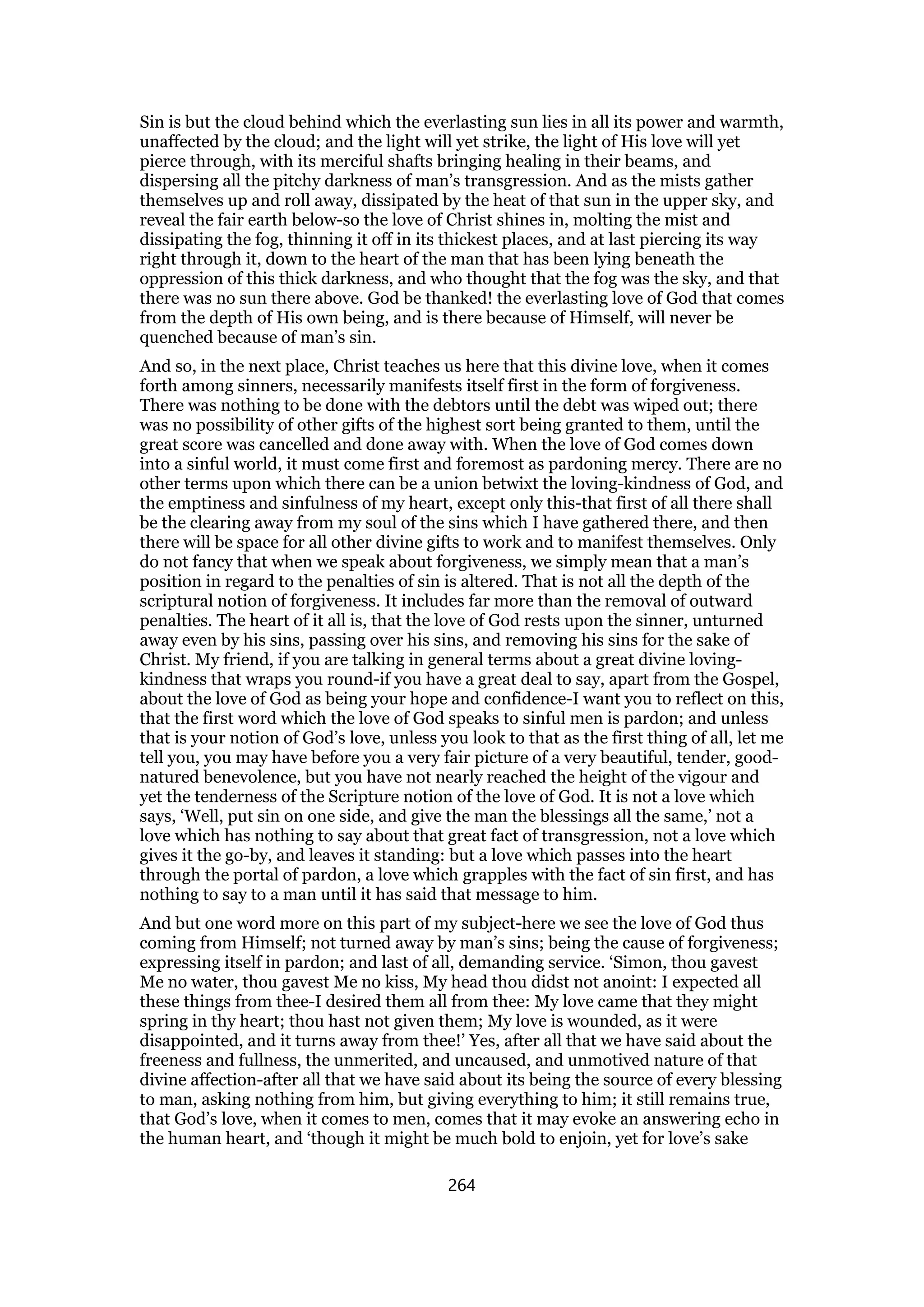







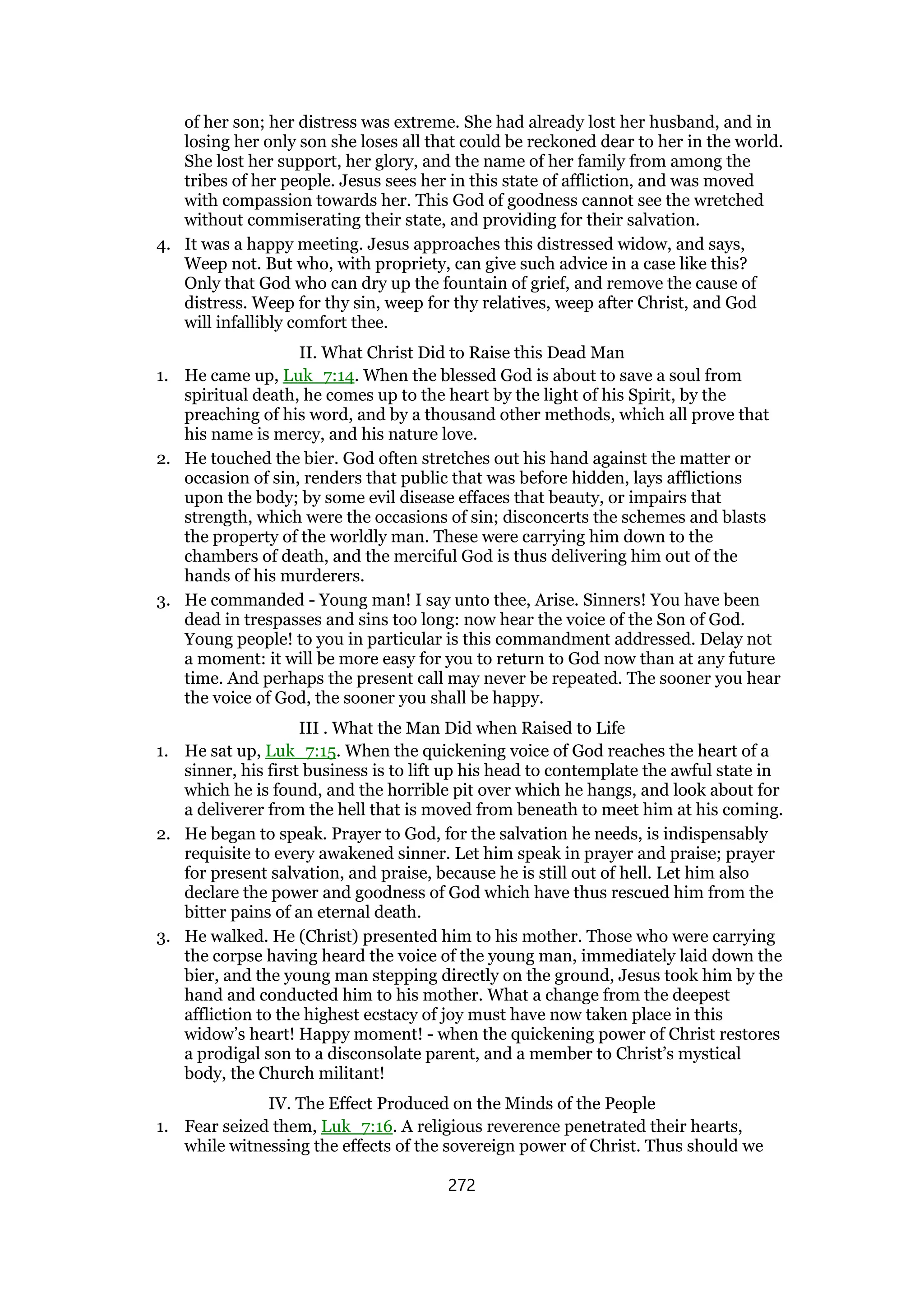

![reason for believing in Christ be, that God hath given him authority to forgive
sins, whenever faith is rendered to another, that honor which is due to Christ
must of necessity be taken from him. This saying refutes also the error of those
who imagine that the forgiveness of sins is purchased by charity; for Christ lays
down a quite different method, which is, that we embrace by faith the offered
mercy. The last clause, Go in peace, denotes that inestimable fruit of faith which
is so frequently commended in Scripture. It brings peace and joy to the
consciences, and prevents them from being driven hither and thither by
uneasiness and alarm.
COFFMAN, "Far more than forgiveness, salvation itself was thus extended to
Simon's impromptu guest. What about her obedience? It was assured. "If ye love
me, ye will keep my commandments," Jesus said; and here was one who truly
loved him. She was not saved by "faith only."
CONSTABLE, "Jesus concluded the incident by giving the woman a further
word of encouragement and clarification. It was her faith, not her love, that had
resulted in her salvation, of which her forgiveness was a part. Consequently she
could depart at peace about her condition even though others might continue to
regard her as a "sinner" (cf. Luke 8:48; Luke 17:19; Luke 18:42). Here salvation
has the larger meaning of spiritual deliverance. This is clear because of Jesus'
previous comments about forgiveness and the lack of reference to physical
deliverance (i.e., healing). Likewise the common Jewish farewell, "May God's
peace be yours" (Judges 18:6; 1 Samuel 1:17; 2 Samuel 15:9; 1 Kings 22:17; Acts
16:36; James 2:16), assumes a larger meaning when connected with spiritual
salvation. This woman was able to go into a lasting condition of peace because of
her faith (cf. Romans 5:1).
". . . Luke 7:36-50 is the first of three reported occasions (see Luke 11:37-54;
Luke 14:1-24) on which Jesus is invited to dine at a Pharisee's house, and each of
the three is a comparatively lengthy scene. This type-scene repetition suggests
that this is a characteristic situation during Jesus' ministry and one of special
interest to the narrator. Each of these scenes is an occasion of conflict." [Note:
Tannehill, 1:178.]
"Jesus' parable of the two debtors and His comments to Simon and the woman
teach a number of lessons: (a) Salvation is the result of God's gracious work
received by faith. (b) God graciously forgives the debt of sin that no one can
repay. (c) Peace with God is possible because of the forgiveness of sins. (d) The
more one understands forgiveness, the more love he will have for Christ. (e)
Humble service stems from a heart of gratitude for God's grace." [Note: Bailey,
p. 117.]
SIMEON, "THE SINNER’S FAITH
Luke 7:50. And he said to the woman, Thy faith hath saved thee; go in peace.
TO associate with the ungodly world is by no means expedient for those who
have been redeemed out of the world. Yet there is a certain degree of intercourse
with them which is both proper and desirable. There is a medium between an
274](https://image.slidesharecdn.com/luke7commentary-151222193000/75/Luke-7-commentary-274-2048.jpg)
![affecting of their society for our own gratification, and a contemptuous
separation from them. Our blessed Lord has exhibited, as in every thing else, so
in this also, a perfect pattern. When invited by a Pharisee to dinner, he accepted
the invitation with a view to instruct him and do him good: and when a woman
who had been a notorious sinner came to him at the Pharisee’s house, he did not
refuse her admission to his presence, but received with kindness the expressions
of her regard, and, commending her faith, imparted to her both the blessings and
the comforts of his salvation.
The particular notice which our Lord took of the woman’s “faith,” and the
reward he gave her on account of it, leads us naturally to consider,
I. The marks and evidences of her faith—
The first thing that calls for our attention is,
1. Her zeal—
[She had doubtless seen many of our Lord’s miracles, and heard many of his
discourses; and though she was not yet one of his avowed followers, yet, having
received good to her soul, she was desirous of honouring him to the utmost of her
power. For this purpose she sought him out in the Pharisee’s house, and went to
him with a full determination to shew him some signal mark of her regard.
Now this argued no little zeal. As being of the weaker sex, she was the more liable
to be condemned as officious, impertinent, and obtrusive. And being of a
notoriously vile character, she was particularly obnoxious to insult and
contempt. But unmindful of these things, she went uninvited, to the house of a
proud Pharisee (where she was least of all likely to meet with any favour) and
(indifferent to the construction that might be put upon her conduct by any
censorious spectators, or even to the treatment she might receive from any of
them) in the presence of the whole company expressed to him all that was in her
heart.
And what was it that enabled her thus to “despise all shame,” and to triumph
over the fear of man? Doubtless it was her faith: for the Apostle says, “This is the
victory that overcometh the world, even our faith.”]
2. Her humility—
[Though she was bent on executing her pious purpose, she was solicitous to do it
in as private and modest a manner as she could. She therefore went behind him
as he lay upon the couch [Note: They did not sit at table as we do, but lay on
couches.], and, having easy access to his feet, placed herself there, without
attracting the notice of the company, or interfering with the conversation that
might be passing at table.
This also was a strong mark and evidence of her faith. She knew his august
character, and felt herself unworthy to enter into his presence; yea, she
275](https://image.slidesharecdn.com/luke7commentary-151222193000/75/Luke-7-commentary-275-2048.jpg)
![accounted it the very summit of her ambition to be permitted to kiss his feet. It
was in this way that the faith of the centurion and others shewed itself [Note:
Luke 7:6-7. Mark 5:25-28.]; and though, through the remaining pride and
ignorance of their hearts, young converts often, like Jehu, seek the notice and
applause of men, humility will always be found to exist in the soul in exact
proportion to our faith.]
3. Her contrition—
[No sooner had she placed herself near the Saviour, than all her sins presented
themselves to her mind, and filled her with deep compunction. Instantly she
burst into a flood of tears, with which she bathed, as it were, the feet of her Lord,
while she embraced them, in hopes of finding mercy from the friend of sinners.
Now it is the property of faith to “look on him whom we have pierced, and
mourn [Note: Zechariah 12:10.].” Yea, the more lively faith any have possessed,
the more abundant has been their self-lothing and self-abhorrence [Note: Job
42:6. Isaiah 6:5. 1 Timothy 1:15.]. We cannot doubt therefore but that faith was
the principle from whence her humiliation flowed.]
4. Her love—
[While she wept over the Saviour’s feet, she wiped them with the hairs of her
head, and kissed them, and anointed them with odoriferous ointment. It was not
possible for her to manifest stronger tokens of her affection.
And was not this also an evidence of her faith? Had she been an unbeliever, she
would have seen “no beauty or comeliness in Jesus” that deserved her
admiration [Note: Isaiah 53:2.]: but believing in him, she accounted him “fairer
than ten thousand, and altogether lovely [Note: Song of Solomon 5:10; Song of
Solomon 5:16.];” according to that declaration of the Apostle, To them that
believe, he is precious [Note: 1 Peter 2:7.].]
5. Her confidence—
[She would not have ventured to approach the Pharisee in this manner, because
she knew that he would despise her in his heart, and dismiss her with scorn. But
she felt no apprehension of such treatment from the Saviour. She well knew his
condescension and compassion; and therefore without reserve, and without fear,
she cast herself upon his mercy.
In this too she shewed the strength of her faith. Unbelief would have suggested
many doubts; Will he receive me? Will he deign to look upon such an abandoned
wretch? But faith enabled her to approach him under a full persuasion, that
“whosoever came to him should in no wise be cast out.”]
It was not in vain that she thus approached the Saviour; as we shall see, while we
consider,
276](https://image.slidesharecdn.com/luke7commentary-151222193000/75/Luke-7-commentary-276-2048.jpg)
![II. The fruits and consequences of her faith—
Though despised and condemned by the Pharisee, she was well rewarded by her
Lord. She obtained from him,
1. The pardon of her sins—
[Numerous as her iniquities had been, they were all in one moment blotted out
from the book of God’s remembrance. Jesus, who “had all power on earth to
forgive sins,” pardoned all her offences, and “cast them, as it were, behind him
into the very depths of the sea.” What a blessed fruit and consequence of her
faith was this! Had she been subjected to all the evil treatment that could have
been shewn her, she would have had no reason to regret that conduct by which,
she had obtained so inestimable a blessing.
And was this peculiar to her? Shall not we also have our iniquities forgiven, if we
apply to him in humility and faith? Shall the greatness of our sins be any bar to
our acceptance with him, if we repent and believe? Let the word of God be
deemed worthy of any credit, and all such apprehensions will vanish in an
instant [Note: Acts 13:39. Isaiah 1:18.] — — —]
2. An assurance of her acceptance—
[Twice did our Lord repeat to her the joyful tidings, that her sins were
pardoned, and that her soul was saved; and to confirm it, he bade her depart in
peace. What a cordial must this have been to her drooping spirit! How
transported must she have been with the joyful sound! And what comfort must
she enjoy through life in a sense of the Divine favour!
But neither was this peculiar to her. It is true, that many real Christians never
attain to this high privilege: but it is owing to the weakness of their faith: if their
faith operated as her’s did, if it shewed itself in such humility, such contrition,
such love, such confidence, such zeal, they also should hear him say to them, “Be
of good cheer; thy sins are forgiven thee.” What though he should not utter it by
an audible voice from heaven, can he not reveal it to the soul by his Spirit, and
enable us to say, “My beloved is mine, and I am his [Note: Song of Solomon
2:16.]?” Yes: let us only glorify him to the utmost of our power, and he will give
us a peace that passeth all understanding [Note: Philippians 4:7.], and a full
assurance of hope unto the end [Note: Hebrews 6:11. See also 2 Timothy 1:12; 2
Timothy 4:8.].]
3. Everlasting happiness and glory—
[In the declaration of Jesus she received both a pledge and an earnest of her
eternal inheritance. Nor can we doubt but that, after waiting her “appointed
time upon earth,” she was admitted to the enjoyment of her Lord in heaven, not
any longer to weep at his feet, but to sit with him on his throne, and to
participate his glory.
277](https://image.slidesharecdn.com/luke7commentary-151222193000/75/Luke-7-commentary-277-2048.jpg)
![Thus also shall it be with all who truly believe: “they shall never perish, but shall
have eternal life [Note: John 3:16.]” — — —]
From this history we may learn,
1. The nature of faith—
[We cannot too carefully inquire into the nature of faith; for there is nothing
respecting which so many, and such fatal, mistakes are made. Faith is not a mere
assent to any doctrines whatsoever; but it is a living principle in the soul, which
evidences itself by precisely such a regard to Christ as this woman manifested on
this occasion. Would we then ascertain whether our faith be genuine and saving?
let us inquire whether it lead us to Christ, in spite of all obstacles from without
or from within, with humility and contrition, with love and confidence? For in
proportion as we abound in these graces, or are destitute of them, we either
possess, or are destitute of, a living faith.]
2. The excellence of faith—
[Admirable were the graces which this woman exercised; yet not one of them was
noticed by our Lord: he overlooked them all; and noticed that only which was
least apparent, and which every one else would have overlooked, namely, her
faith. He knew that this was the root or principle from whence all her other
graces sprang. It was this that led her so to honour him; and therefore he
determined to honour it. And must not that be excellent which he so highly
regarded, so studiously searched out, and so eminently distinguished?
But what is it that he here assigns to her faith? it is nothing less than the saving
of her soul: he passes by all her other graces as having no weight or influence
whatever in her justification before God, and specifies her “faith” as that which
“saved” her. Is it possible to bestow a higher commendation on it than this?
If it be asked, why faith is thus distinguished above all other graces? we answer,
it is because faith unites us unto the Saviour, and interests us thereby in all that
he has done and suffered for us: but this cannot be said of any other grace
whatever; and therefore, though every other grace adorns the soul, no grace but
faith will save it.
Let us all seek to attain right sentiments on this most important point, and pray
with the Apostles, “Lord, increase our faith.”]
3. The condescension of Christ to believing penitents—
[If a person of an abandoned character, however changed in his conduct, should
come to us when in the midst of company, and that company of a higher order
and Pharisaic cast, and should express such affection for us, our pride would be
apt to rise; and, while we blushed for the degradation we seemed to suffer, we
should be ready to condemn him for his unseasonable intrusion, or perhaps to
suspect that he was deranged in his mind. But Jesus accounted himself honoured
278](https://image.slidesharecdn.com/luke7commentary-151222193000/75/Luke-7-commentary-278-2048.jpg)
![by the testimonies of the woman’s regard: and, though he could not but know
what reflections would be cast upon his character on account of his kindness to
her, he vindicated her conduct, and richly recompensed her kind attentions.
Thus will he do to every believing penitent. He will compensate the scoffs of an
unbelieving world by manifest tokens of his approbation. He will not regard the
quantity or quality of a man’s past offences; but will speak peace to his soul, and
in due time “wipe away all tears from his eyes” for ever. O that we might all
consider this, and experience it to our eternal joy!]
COKE, "Luke 7:50. Thy faith hath saved thee, &c.— Our Lord, contemning the
malicious murmuring of the Pharisees, repeated his assurance, by telling the
woman that her faith had saved her, and bidding her depart in peace; that is,
impressed with a strong sense of the love of God, and filled with the divine
pleasure which arises from that attainment. Go in peace, was an usual form of
dismissing inferiors, and was an expression of the friendship and good wishes of
the person speaking. There is an evident propriety in the phrase here,
considering what had happened to discompose the spirit of this humble penitent.
See ch. Luke 8:48; Luke 2:29. Mark 5:34. James 2:16 and Genesis 44:17.
Inferences drawn from the history of the good Centurion, &c. Luke 7:1-16 of this
chapter, and Matthew 8:5-13 and the raising from the dead the widow's son. No
nation, no trade or profession, can shut out a simple honest heart from God. If
this centurion was a foreigner by birth, yet was he a domestic in heart: he loved
that nation which was chosen of God; and if he were not of the synagogue, yet
did he build a synagogue: (Luke 7:5.) where he might not be a party, he would
still be a benefactor. We could not love religion, were we utterly destitute of it.
We do not see this centurion come to Christ, as the Israelitish captain came to
Elijah on Carmel,—but with much suit, much submission,—by others,—by
himself. Could we but speak for ourselves, as this captain did for his servant,
what could we possibly want? What wonder is it, if God be not forward to give,
where we care not to ask, or ask as if we cared not to receive?
Great variety of suitors resorted to Christ; one for a son, another for a daughter,
a third for himself; I see none come for his servant but this one centurion: nor
was he a better man than a master. His servant is sick; he does not drive him out
of doors, but lodges him at home; and then seeks to Christ for aid with most
humble importunity. Had the master been sick, the faithfullest servant could
have done no more: he is unworthy to be well served, who will not sometimes
wait upon his followers. It behoves us so to look down upon our servants here on
earth, as that we may still look up to our Master who is in heaven.
There was a paralytic, whom faith and charity brought to our Saviour, and let
down through the uncovered roof, in his bed. Why was not this centurion's
servant so carried, so presented?—One and the same grace can yield contrary
effects. They, because they believed, brought the patient to Christ; he, because he
believed, brought not his servant to him. Their act argued no less desire, his
argued more confidence; his labour was less, because his faith was more; and
279](https://image.slidesharecdn.com/luke7commentary-151222193000/75/Luke-7-commentary-279-2048.jpg)




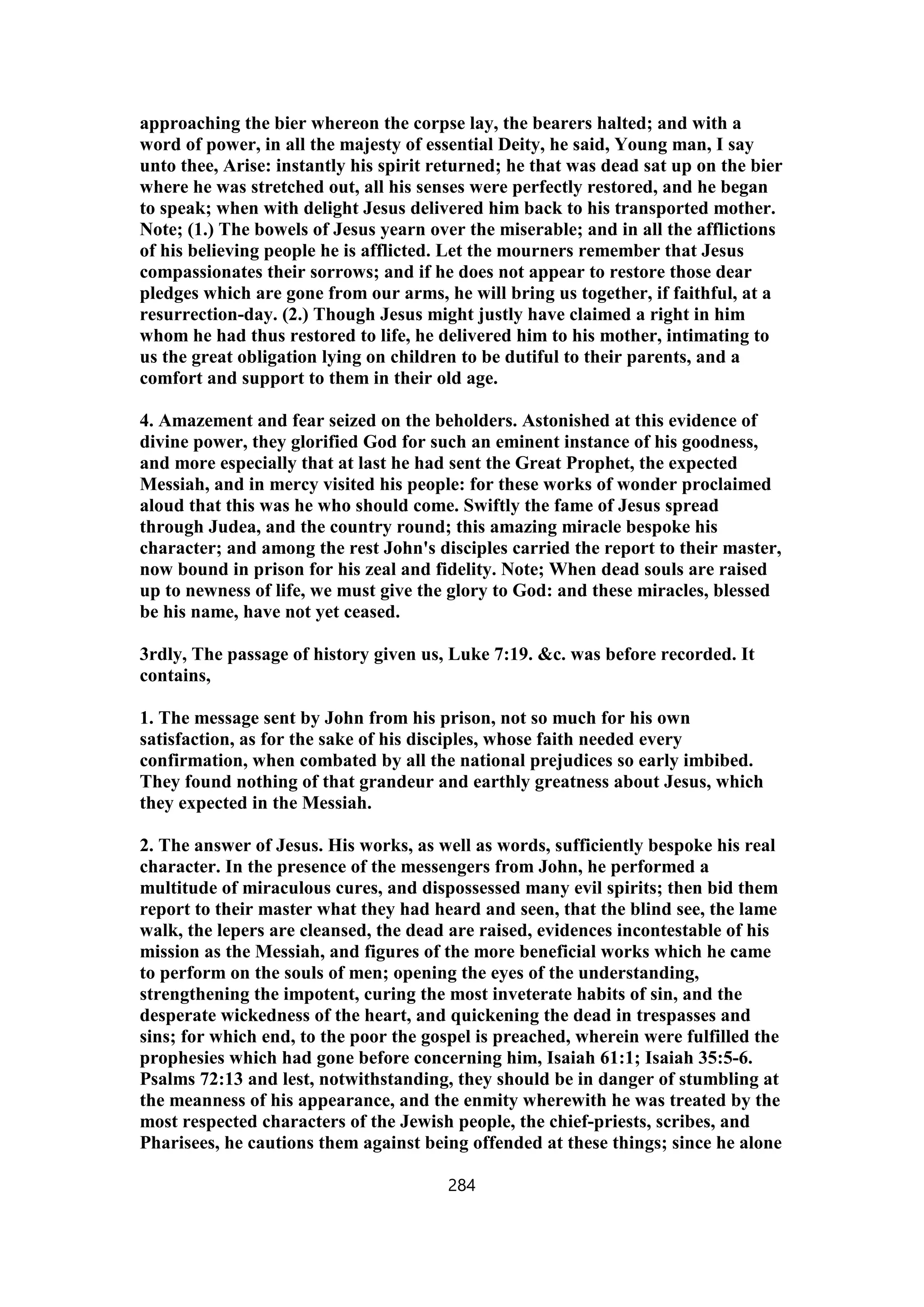
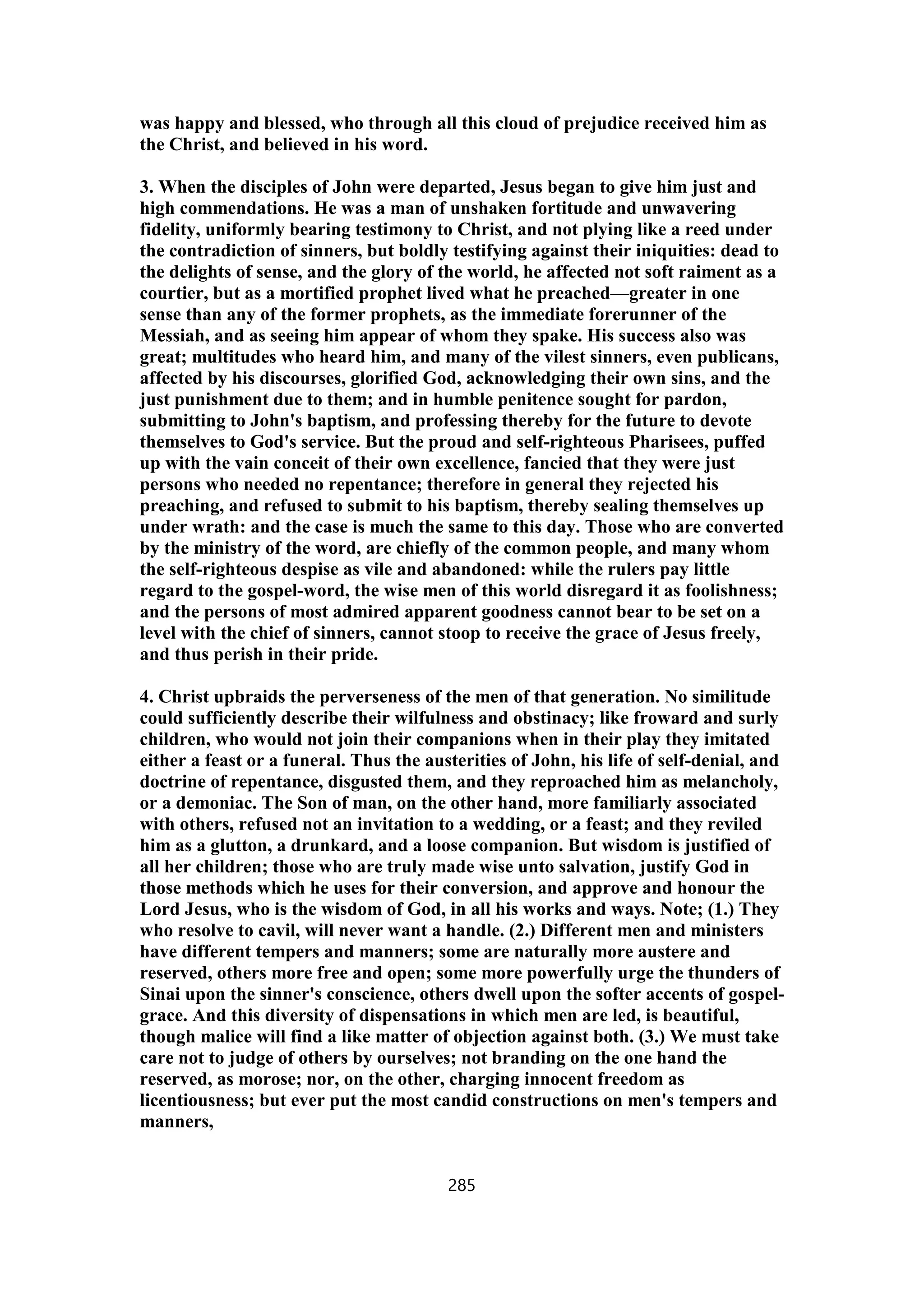
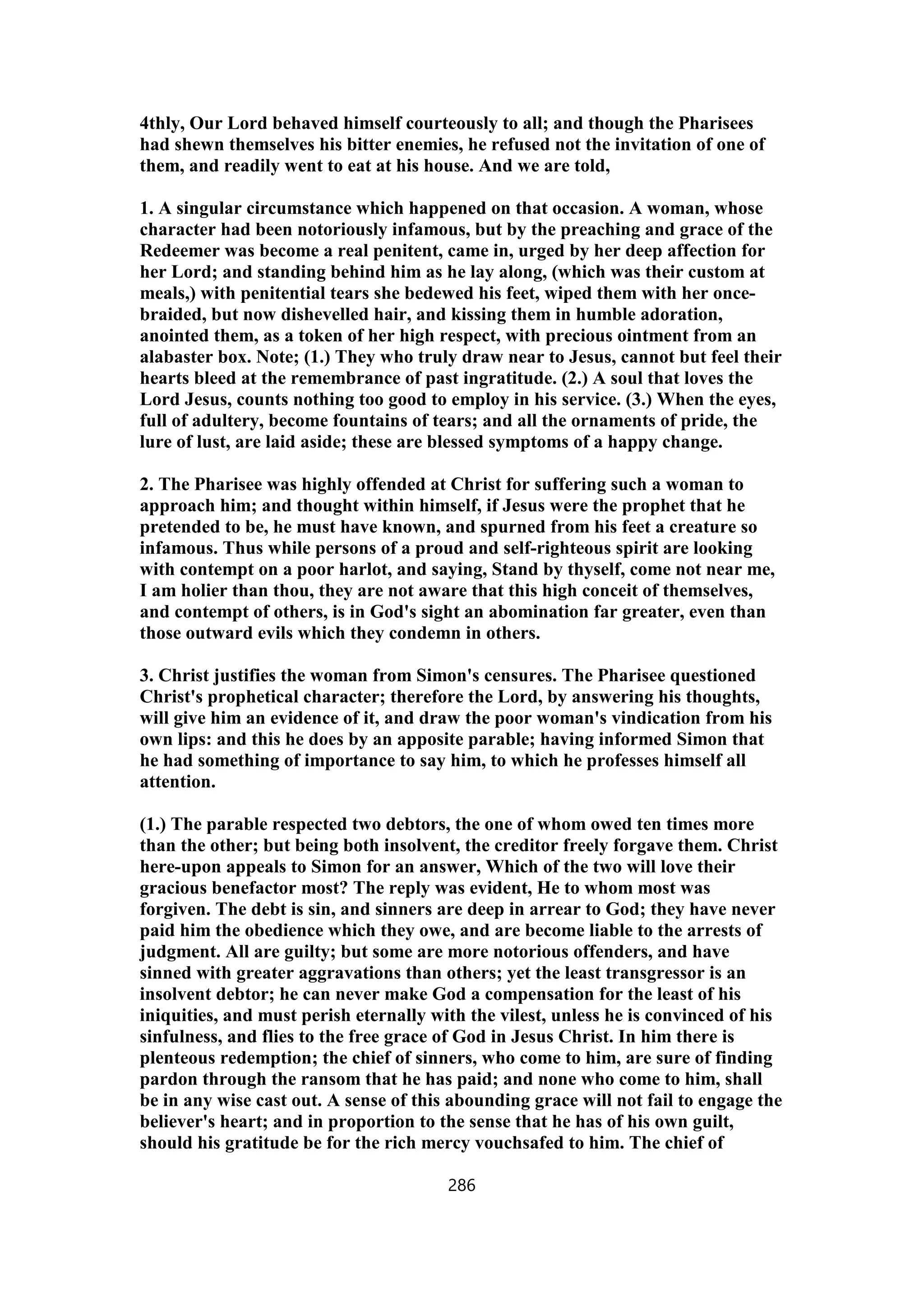


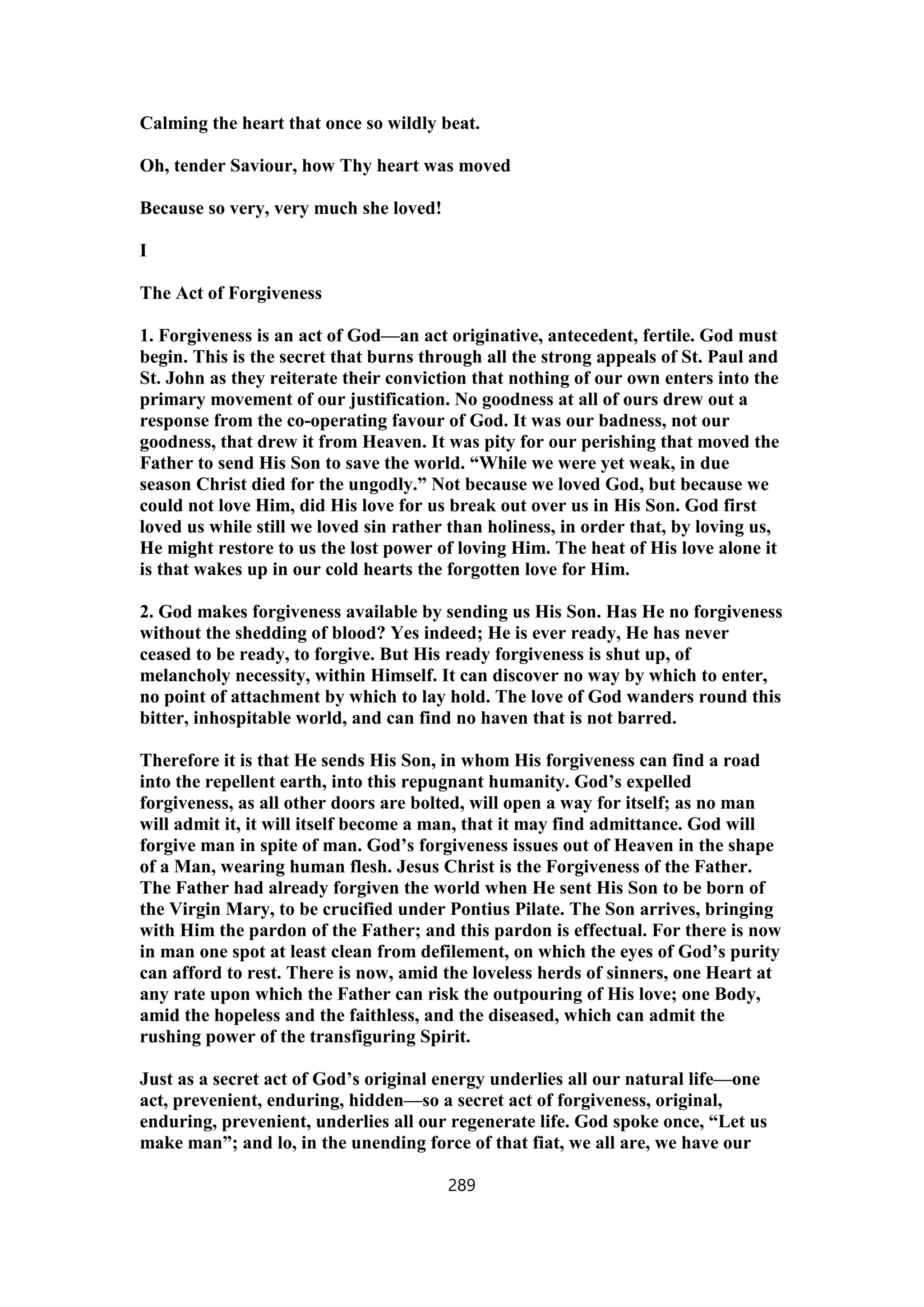
![being. God spoke once in Christ, “Let us work out man’s forgiveness”; and in
the everlasting power of that one word, so spoken and done, the new race of the
forgiven finds itself existing, the Church of the redeemed rises, grows, gathers,
swarming upward out of some hidden will, as clouds that make and build
themselves out of the very vacancy of air under the strong eye of the risen sun.1
[Note: H. S. Holland, Creed and Character, 225.]
3. Jesus gladly takes up the task assigned to Him. With Divine authority He says,
“Thy sins are forgiven thee.” He approaches the fallen with a boundless
sympathy, and draws them to Himself by the spiritual law of attraction. He came
from an infinite height into this world, that He might be near sinners, able to
touch them, and ready to be touched. It was to take their nature upon Him in the
very likeness of sinful flesh, that they might feel Him closer still, and that He
might not be ashamed to call them brethren. It was to become sin for them,
though He knew no sin; that He might bear it, first by pity, then by sacrifice, and
at last by pardon. This is the great and Godlike plan, the very heart of the reason
why “He lifted up His feet to the long desolations,” and touched the soil of our
sin-stricken earth. And now He is only carrying out His grand plan in one of its
applications when He draws the sinner near Him, and suffers her to clasp His
feet that she may feel she is in contact with God’s infinite and saving mercy. It is
a ray of the glorious Sun of Righteousness, whose going forth is from the end of
the heaven, and His circuit unto the ends of it, which He has made to glance into
this woman’s soul and to stray across this Pharisee’s threshold, that men may be
made to see how the Son of God came to win back their hearts, and may learn
that, while He hates the sin, He loves the sinner with yearning, quenchless
compassion. If the sinner’s heart is ever gained, thus it must be, when He who in
His character is “undefiled, separate from sinners” comes so close to them in
sympathy, and stretches out a hand to them, stainless in purity, but filled with
pardons. The Pharisee, when he sees it, sets it down as folly. But wisdom is
justified of her children, and God “hath abounded toward us in all wisdom and
prudence,” because He hath abounded “in the riches of his longsuffering.”
Once in old Jerusalem
A woman kneeled at consecrated feet,
Kissed them, and washed them with her tears,
“What then?
I think that yet our Lord is pitiful:
I think I see the castaway e’en now!
And she is not alone: the heavy rain
Splashes without, and sullen thunder rolls,
But she is lying at the sacred feet
290](https://image.slidesharecdn.com/luke7commentary-151222193000/75/Luke-7-commentary-290-2048.jpg)
![Of One transfigured.
“And her tears flow down,
Down to her lips—her lips that kiss the print
Of nails; and love is like to break her heart!
Love and repentance—for it still doth work
Sore in her soul to think, to think that she,
Even she, did pierce the sacred, sacred feet,
And bruise the thorn-crown’d head.
“O Lord, our Lord,
How great is Thy compassion!”1 [Note: Jean Ingelow.]
4. Forgiveness comes first to us, who have nothing, not even love, to pay with,
and it unlocks the flood-gates of the heart as nothing else will. We are not
pardoned because we love, but we love because we are pardoned. We are
pardoned because He loves us, and the knowledge of His forgiving love melts our
hearts. Jesus seems here to teach us that there must be this experience of
forgiveness before there is real and deep love. Certainly the principle involved in
these words has been proved true in all the history of Christianity since they
were spoken. Forms of Christianity which minimize sin, and have little to say
about pardon, have always been, and always will be, cold and stagnant. The one
power that set souls aflame with a holy and self-sacrificing love is the experience
of God’s pardoning mercy in Jesus Christ. The measure of our consciousness of
forgiven sin will be the measure of our love.
She sat and wept beside His feet; the weight
Of sin oppress’d her heart; for all the blame,
And the poor malice of the worldly shame,
To her was past, extinct, and out of date,
Only the sin remain’d,—the leprous state;
She would be melted by the heat of love,
By fires far fiercer than are blown to prove
And purge the silver ore adulterate.
291](https://image.slidesharecdn.com/luke7commentary-151222193000/75/Luke-7-commentary-291-2048.jpg)
![She sat and wept, and with her untress’d hair
Still wiped the feet she was so blest to touch;
And He wiped off the soiling of despair
From her sweet soul, because she loved so much.
I am a sinner, full of doubts and fears,
Make me a humble thing of love and tears.2 [Note: Hartley Coleridge.]
II
The Condition of Forgiveness
1. Some would regard love as a condition of forgiveness. And they point to the
text, “Her sins, which are many, are forgiven; for she loved much.” Love is
indeed the complement of faith. The expression “for she loved much” would
seem to favour the view that love rather than faith is the saving grace. But the
word “for” in this connexion is not causative but illative. Moreover Christ
Himself says presently, “Thy faith hath saved thee.” Faith and love—this is the
logical and chronological order. For, as Tyndale said, “Faith is the mother of
love.”
Faith is the first motion of the soul away from itself, away from its own interest
and self-seeking, back to God the Mighty Giver. Faith, then, is the germ of love.
Once let the current of the will be set running towards God in faith, and the
whole force of the passionate soul of man will be drawn into the stream, will
pour itself along the channel opened until it flows with the full, swelling flood of
love. In faith, the eye of the soul looks away from itself: in love, the entire heart
follows the direction of the eye. Faith must begin; there is no love without faith;
the soul’s motions remain locked, dammed, and barred, until faith gives them
free opening.1 [Note: H. S. Holland.]
Were not those sweets, though humbly shed—
That hair—those weeping eyes—
And the sunk heart that inly bled—
Heaven’s noblest sacrifice?
Thou that hast slept in error’s sleep,
Oh, wouldst thou wake in heaven,
Like Mary kneel, like Mary weep,
292](https://image.slidesharecdn.com/luke7commentary-151222193000/75/Luke-7-commentary-292-2048.jpg)
![“Love much,” and be forgiven?2 [Note: Thomas Moore.]
2. The text confirms the teaching of the whole incident in reference to the human
condition of forgiveness, which it plainly declares to be not love but faith. The
order is first faith, which has for its under side the consciousness of sin and
helplessness, and for its upper side trust in Jesus, the sin-bearer. On faith follows
pardon, to which we contribute nothing, and which we have but to receive
through our faith. To pardon received succeeds answering love, gratitude
blended with penitence, all the deeper because we know ourselves forgiven. To
such love are granted the acceptance of its poor offerings, a vindication against
the sarcasms of cold critics, a confirmation of the pardon received already, and a
calm peace, in which henceforward to abide and advance.
(1) How does faith save? It saves by bringing the soul into vital union with God.
A railway train is standing on the line. The engine has full pressure of steam; the
bell rings; the locomotive moves; but the carriages stand still. What is the
trouble? The engine backs up and tries again, but with the same result. What is
the trouble? The coupling has not been made. A link makes all the difference.
There are foolish people who are acting thus all the while, trying to reach heaven
without the coupling of faith. It is impossible. Faith is the sine quâ non because it
brings us into oneness with God through our Mediator Christ Jesus, so that our
destiny is bound up with His for ever and ever. When once we believe, our life is
for evermore hid with Christ in God.
The woman took Jesus at His word. Man though He was, somehow she felt that
when He spoke God spoke, and that He could do as He said. She felt that this
Man had the value of God. And, trusting Him, she felt in her soul the “rest” of
God’s forgiveness. And now
The opening heavens around her shone
With beams of sacred bliss.
Earth was Paradise Regained; freedom was hers and a clean soul, the peace of
God entered her heart.1 [Note: G. S. Walker, The Pictures of the Divine Artist,
72.]
When God, the ever-living, makes
His home in deathly winter frost,
And God, the ever-loving, wakes
In hardening eyes of woman lost,
Then through the midnight moves a wraith:
Open the door, for this is Faith.
293](https://image.slidesharecdn.com/luke7commentary-151222193000/75/Luke-7-commentary-293-2048.jpg)
![Open the door, and bring her in,
And stir thy heart’s poor fires that shrink.
Oh, fear to see her pale and thin,
Give love and dreams to eat and drink;
For Faith may faint in wandering by—
In that day thou shalt surely die.2 [Note: Edward Ellis.]
(2) Saving faith implies penitence. In the case of the sinful woman there was
penitence too deep for words—the broken and contrite heart which God will not
despise, a loathing of sin which this Pharisee cannot understand, and a glowing
love which made his frown forgotten in the irresistible attraction to a Saviour’s
feet. What worlds of emotion may be passing within, where man cannot look, a
bitterness of grief which the heart alone knows, and a joy with which no stranger
can intermeddle! He knows it who is its Author and its End. He sees the birth of
an immortal spirit, the glow and grandeur of a second creation better than the
first, and welcomed with gladder songs. But all the while the poor Pharisee, in
presence of its tokens, can understand it no more than he can hear the angels
who rejoice over it; and he complacently charges with ignorance Him who
searches the heart, and proudly condemns her who is being acquitted by the
Judge of all!
At the gateway of the Parthenon in Athens was an altar dedicated to Tears. No
sacrifices were consumed, no votive offerings placed upon it; but the sorrowing
bowed there and wept out their sorrows. It was the shadowing forth of a great
truth; to wit, “The sacrifices of God are a broken spirit; a broken and a contrite
heart, O God, thou wilt not despise” (Psa_51:17). Dearer to God than all the
misereres of the chanting Pharisees is the cry of the returning prodigal. He sees
him bowed with penitence, and goes out to meet him while he is yet a great way
off.1 [Note: D. J. Burrell, Christ and Men, 253.]
(3) The deepest penitence does not imply the greatest sin. The highest degrees of
sin-consciousness may be experienced by the man who is outwardly the most
correct in conduct, and who has ever been,
Thro’ all this tract of years
Wearing the white flower of a blameless life.
The greatest saint may know and feel himself to be “the chief of sinners.” It is
Paul—the man so conspicuously Christ-like, so unique in Christian excellence—
who so characterizes himself. It is the Psalms of David—the man after God’s
own heart—that are so blotted with tears, and so vocal with sobs of distress and
penitential prayers. It is that eminent saint, Francis of Assisi, of whom it is said
294](https://image.slidesharecdn.com/luke7commentary-151222193000/75/Luke-7-commentary-294-2048.jpg)
![that he wept so much over his sins that he injured his eyesight, and who, in reply
to remonstrance, said: “I would rather choose to lose the sight of my body than
to repress those tears by which the interior eyes are purified that they may see
God.” It was George Herbert who, when he lay dying, said: “I am sorry I have
nothing to present to my merciful God but sin and misery, but the first is
pardoned, and a few hours will put an end to the latter.”
One thing very remarkable during those last years must have struck all who
conversed intimately with Erskine—his ever deepening sense of the evil of sin,
and the personal way in which he took this home to himself. Small things done or
said years ago would come back upon him and lie on his conscience, often
painfully. Things which few other men would have ever thought of again, and
which when told to others would seem trifling or harmless, were grievous to him
in remembrance. “I know that God has forgiven me for these things,” he would
say, “but I cannot forgive myself.”1 [Note: Principal Shairp, in Letters of
Thomas Erskine of Linlathen, 378.]
There is no better test of spiritual growth than increasing sensitiveness to the
repulsiveness of all kinds of sin, and deepening consciousness of the constant
peril from it in which every human soul lives. In the greatest saint there are all
the possibilities which, being worked out, make the greatest sinner; and the truer
the saintliness the deeper the consciousness of this fact. The materials out of
which heaven and hell are builded are found in every life, and the man who
slowly builds heaven within him has constantly the terrible knowledge that he
has only to put his hand forth in another direction in order to build hell; both
are within reach.2 [Note: H. W. Mabie, The Life of the Spirit, 24.]
Amos Barton, in George Eliot’s Scenes of Clerical Life, had been an affectionate
husband … but now that Milly was laid in the grave he re-lived all their life
together, with that terrible keenness of memory and imagination which
bereavement gives, and he felt as if his very love needed a pardon for its poverty
and selfishness. What, then, must our love seem like when it is compared with
the Love Divine? If any man will bring his life—even the best part of it—to the
Light in which is no darkness at all, he will have enough discovered to be much
forgiven.3 [Note: G. S. Walker, The Pictures of the Divine Artist, 79.]
III
The Peace of Forgiveness
1. “Go in peace.” The phraseology employed is not the ordinary phraseology of
that familiar Old Testament leave-taking salutation which was the “good-bye” of
the Hebrews—“Go in peace.” But we read occasionally in the Old Testament a
slight but eloquent variation. It is not “Go in peace,” as out Authorized Version
has it, but “Go into peace”; and that is a great deal more than the other. “Go in
peace” refers to the momentary emotion; “Go into peace” seems, as it were, to
open the door of a great palace, to let down the barrier on the borders of a land,
and to send the person away upon a journey through all the extent of that
blessed country. Jesus Christ takes up this as He does a great many very
295](https://image.slidesharecdn.com/luke7commentary-151222193000/75/Luke-7-commentary-295-2048.jpg)

![it is no pillow for laziness, yet it is an anodyne for anxiety, when we remember
that if our “believing” grasps God in Christ, it is His business to look after us;
and we may leave ourselves in His hands. So there will come stealing into the
heart that trusts, just because it does trust, a strange calm like the centre in a
cyclone, where there is absolute repose, and the sail hangs lank and straight in
the windless air, however storms may rage madly all round about it.1 [Note: A.
Maclaren.]
4. At the very moment when one would have thought it would do this woman
good to be with the Lord for a little while longer, she is sent out into the harshly
judging world. Yes, that is always the way by which Christian men and women
who have received the blessing of salvation through faith can retain it, and serve
Him—by going out among men and doing their work there. The woman went
home. It was a home, if what they said about her was true, that sorely needed the
leavening which she now would bring. She had been a centre of evil. She was to
go away back to the very place where she had been such, and to be a centre of
good. She was to contradict her past by her present, which would explain itself
when she said she had been with Jesus. For the very same reason for which, to
one man that besought to be with Him, begged that he might remain, He said,
“No, no; go away home and tell your friends what great things God has done for
you,” He said to this woman, and He says to you and me, “Go, and witness for
Me.” Communion with Him is blessed, and it is meant to issue in service for Him.
One day Brother Masseo said to St. Francis: “I wonder why the whole world
runs after thee more than after others, and all men want to see thee and hear
thee and obey thee? Thou art not fair of body, thou art not deeply learned, thou
art not of noble birth—why does the whole world run after thee?” When St.
Francis heard this, he rejoiced in his soul and turned his eyes to heaven, and
stood a long time thus, with soul lifted up to God; and when he came to himself
he kneeled down and gave thanks and praise to God, and turned to Brother
Masseo and said to him with great spiritual power: “Do you wish to know why
this happens to me? Do you wish to know why the whole world runs after me?
For I knew that thing from the all-seeing God, whose eyes see the good and the
bad over all the earth. For these most holy eyes have nowhere seen a greater,
more miserable, poorer sinner than I; because in all the earth He has found no
more wretched being to do His wonderful work, which He wishes to have done,
therefore He has chosen me, so as thus to put to shame the noble, the great,
strength and beauty, worldly wisdom, that all may know that all power and all
virtue come from Him and not from creatures, and that no one can exalt himself
before His face; but he who praises himself, let him praise himself in the Lord,
for His is the honour and the power for ever and ever.”1 [Note: J. Jörgensen, St.
Francis of Assisi, 74.]
If one reads a book like the Confessions of Saint Augustine, one sees what an
intensely individualistic conception permeates it. The new light which breaks in
upon him only enlightens him as to his relations with God, it does not arouse in
him any impulse to the service of other men. It does not occur to him that to
arrange comfortably and securely for one’s own tranquillity and salvation, to
have, so to speak, a private understanding with God, is in the least a selfish
297](https://image.slidesharecdn.com/luke7commentary-151222193000/75/Luke-7-commentary-297-2048.jpg)
![conception. It seems to Augustine the most natural thing in the world. Then that
belief begins to alter insensibly, and the highest spirits begin to turn away in
shame from a conception of religion which is merely a desire for moral security,
a stoical ideal, a deliberate practising to become superior to pain and calamity by
avoiding the desires and designs which are quenched and marred by suffering,
an attempt at invulnerability. More and more do the highest spirits perceive that
their duty is to the brotherhood of man; that there is much preventible sorrow
and misery in the world, and that their work is to persuade men to prevent it.2
[Note: A. C. Benson, Thy Rod and Thy Staff, 140.]
MACLAREN, “GO INTO PEACE
We find that our Lord twice, and twice only, employs this form of sending away those
who had received benefits from His hand. On both occasions the words were
addressed to women: once to this woman, who was a sinner, and who was gibbeted
by the contempt of the Pharisee in whose house the Lord was; and once to that poor
sufferer who stretched out a wasted hand to lay upon the hem of His garment, in the
hope of getting healing-filching it away unknown to the Giver. In both cases there is
great tenderness; in the latter case even more so than in the present, for there He
addressed the tremulous invalid as ‘daughter’; and in both cases there is a very
remarkable connection hinted at between faith and peace; ‘Thy faith hath saved thee,
go in peace.’
Now, there are three things that strike me about these words; the first of them is this-
I. The dismissal of the woman.
One might have expected that our Lord would have flung the shield of His
companionship, for a little while, at any rate, over this penitent, and so have saved
her from the scoffs and sneers of her neighbours, who knew that she was a sinner.
One might have supposed that the depth of her gratitude, as expressed by her costly
offering and by her tears, would have spoken to His heart, and that He would have let
her stop beside Him for a little while; but no! Jesus said to her in effect; ‘You have got
what you wished; go away, and take care of it.’ Such a dismissal is in accordance with
the way in which He usually acted. For very seldom indeed, after He had gathered the
first nucleus of four disciples, do we find that He summoned any individual to His
side. Generally He broke the connection between Himself and the recipients of His
benefits at as early a moment as possible, and dismissed them. And that was not only
because He did not wish to be surrounded and hampered by a crowd of slightly
attached disciples, but for two other reasons; one, the good of the people themselves,
and the other, that, scattered all over northern Palestine, they might in their several
circles become centres of light and evangelists for the King. He dispersed them that
He might fling the seed broadcast over the land.
Jesus Christ says to us, if we have been saved by our faith, ‘Go!’ And He intends two
things thereby. First, to teach us that it is good for us to stand by ourselves, to feel
responsibility for the ordering of our lives, not to have a visible Presence at our sides
to fall back upon, but to grow by solitude. There is no better way of growing reliant,
of becoming independent of circumstances, and in the depths of our own hearts
being calm, than by being deprived of visible stay and support, and thus drawing
closer and closer to our unseen Companion, and leaning harder and heavier upon
Him. ‘It is expedient for you that I go away.’ For solitude and self-reliance, which is
bottomed upon self-distrust and reliance upon Him, are the things that make men
and women strong. So, if ever He carries us into the desert, if ever He leaves us
forsaken and alone, as we think, if ever He seems-and sometimes He does with some
298](https://image.slidesharecdn.com/luke7commentary-151222193000/75/Luke-7-commentary-298-2048.jpg)
